
Sincere Global - International News & Lifestyle

The Condition of the Remaining Cancer Center in Operation in Yemen, May 12, 2017
Every month over 600 come to the only up and running oncology center Al-Jumhuri in Yemen located in Sana’a, seeking treatment. The staggering number of patients has been on the rise since the start of the conflict between the in-country armed parties and external Saudi-led coalition forces. On January 16, 2017, the UN Office for the Coordination of Humanitarian Affairs stated that as a low estimate over 10,000 civilians had been killed since the start of the civil war. The war has triggered an economic collapse forcing Yemeni health staff to work without pay and undercutting patients' ability to afford their own treatment which eventually lead a lot of the patients to quit their treatment as their families couldn’t afford medication, transportation and all other related accommodations.
International - Middle East
The Condition of the Remaining Cancer Center in Operation in Yemen

A child's cancer medication(Photographer: Najat Mohd)
by Najat Mohd - Correspondent (Sana'a), May 12, 2017
Per request of the Center, there are no photos of patients
Every month over 600 come to the only up and running oncology center Al-Jumhuri in Yemen located in Sana’a, seeking treatment. The staggering number of patients has been on the rise since the start of the conflict between the in-country armed parties and external Saudi-led coalition forces. On January 16, 2017, the UN Office for the Coordination of Humanitarian Affairs stated that as a low estimate over 10,000 civilians had been killed since the start of the civil war. The war has triggered an economic collapse forcing Yemeni health staff to work without pay and undercutting patients' ability to afford their own treatment which eventually lead a lot of the patients to quit their treatment as their families couldn’t afford medication, transportation and all other related accommodations.
The Saudi-led coalition air campaign has increased the number of civilians in need of and seeking treatment inside Yemen. The center receives up to 60 patients a month which is over its financial capacity. The patients are treated for free and only have to cover supportive therapy on their own, which is still quite expensive and out of reach for most patients due to the shortage in pharmaceuticals and absence of pensions and monthly salaries. Many patients are seen on the curbs of the hospital or mosques seeking charity to cover treatment expenses. According to Dr. Ali Al-Ashwal, manager of the center and oncologist, the number of patients approaching the centre has increased due to the air land and sea blockade and economic situation as most cancer patients before the war used to travel abroad to Egypt, India, and Jordan for treatment, as for now, they head to the Al-Jumhuri cancer center from all over the country, thus, keeping the center under tremendous pressure.

A childs room for cancer treatment
2016 has been the start of a never ending crisis for the center’s staff and patients. The doctors and nurses operated on less than half of their usual wages for many months, and without wages for the past 6 months. Never the less, they honored their oath, walking miles from their houses to take care of patients, as they do not have enough to cover transportation. The center does not have the capacity to cover minimum necessities like syringes, cannulas, catheters, bed sheets, etc , since many donors stopped donating after the start of the current economic crisis and only less than 30% of the center’s needs are being met. According to the WHO, currently more than 14.8 million people lack access to basic healthcare, with less than 45% of health facilities still functioning.

Storage room with dwindling resources
The pharmacy at the oncology center has had bare shelves for months forcing desperate patients to scour the black market at higher prices , Ms. Fatima Jaffar, an international business management graduate and recovered patient described the difficulties she faced as follows,” I had to go through a lot of difficulties to get my treatment after I got diagnosed with Hodgkin’s lymphoma , because of the war there was a lack in one of the essential medications I had to take during every session of chemotherapy. We had to search in ever pharmacy in Sana’a till we eventually found it for ten times its actual price. I saw a lot of patients quit their treatments due to poverty, illiteracy and the absence of medications. Transportation was difficult sometimes as my sessions usually finished after midnight and it felt really dangerous to drive in the streets of Sana’a at that hour”. As for radiation therapy, it is a yet another tragedy. As described by Ms. Fatima, “there are only two places that offer radiation therapy in Yemen, one of them has more advanced abilities but was going through repairs as it had broken down. I had to wait for two weeks and waiting is not an option for cancer, so I turned to Al-Jumhuri hospital where I received my initial therapy. A lot of the patients had to wait over two months for the machine to be fixed. I can’t imagine the stress they went through during that time.”

Near empty in-hospital pharmacy
The air strikes on Sana’a have greatly affected the foundation of the oncology center, the second floor has been greatly affected by fragments of bombs dropped nearby, bullets from nearby firefights have ricocheted into the hallways through the ceilings leading the staff to evacuating and abandoning the second floor completely for the safety of the patients. One of the attending nurses that gave us a tour of the place said, ‘’we were very scared that the windows would explode on our patients due to the pressure exerted from the airstrikes, and the occasional bullets citizens fired to the air would harm them, so we had to evacuate the whole floor. We had a children’s playroom on the second floor, but it is on lock down now as it is unsafe, in short, we don’t have a source of entertainment to relieve the stress and distract our younger patients except for the TVs that are in the bigger rooms. Not to mention the shortage in the number of beds caused due to the loss of a whole floor, that put a limit in the number of patients we receive per day.”

Abandoned playroom on the second floor

One of many bullet holes in walls on the second floor
Health care and diagnostics have not been at their best in pre-war Yemen and the start of the current situation has only driven the system downhill and things to deteriorate. Amal, a 24 year old radio show producer and bride to be, was diagnosed with Hodgkin’s lymphoma stage I. Her condition needed quick surgical intervention (lumpectomy) but was put on hold for over four months which led her condition to worsen and develop to stage IV having had to undergo 14 sessions of chemotherapy and 15 radiation sessions. Had she been treated earlier, she would have been spared the unnecessary pain and side effects of her extended sessions and treatment. Ghadeer, a successful HR manager and a mother of young children, had breast cancer stage I but was misdiagnosed with breast lipoma after noticing a strange lump, which later developed to stage IV breast cancer. Fortunately her family were able to get her out of the country for treatment after her conditioned deteriorated to an extent she had to say her good byes to her loved ones, however she miraculously recovered. Saleh, a middle aged 46 years old family man, who worked in a water refinery he owned, as per his family member’s narration, he started coughing nonstop for a while before heading to a hospital for diagnosis, he was told he is healthy but upon further checkups outside Yemen he was diagnosed with lung cancer which unfortunately lead to his death. Sadam, a 15 year old teenager that lived under poverty was embarrassed to tell his family he is in pain so as to not cause them trouble since his father had already been going through dialysis due to end stage kidney disease. He silently suffered till he one day collapsed and got diagnosed with stage IV cancer, his doctors and family had given up on him but he fortunately recovered due to his persistence and strong will. The pain and suffering that the system failure has caused Yemenis is heart wrenching, many die in silence and unnoticed because of expensive treatments, unavailability of pharmaceuticals, and severe lack in multidisciplinary teams. Dr. Ali AL-Alashwal added on the subject, ”We use to be able to send our staff on scholarships abroad, conferences and a lot more events that could help us further develop our healthcare and diagnostics, but we don’t have that luxury any more after the land, air and sea siege”.

Optimism is an art made by those souls who trust in God - in remembrance of cancer children who had passed away
The lives of thousands of cancer patients remain at the brink of death unless the siege is lifted for medication to reach beneficiaries. Dr. Ali’s interview with us ended with, ”we need to find a way to fund the center and pay our staff as soon as possible before we get to a point of irreversible damage. We need a qualified team to maintain our machinery and we cannot attain that without further training and extensive courses for our staff members abroad. Initiatives must be taken to educate people in far away villages so as to reduce the rates of late diagnosis, social stigmas associated with cancer patients, and the importance of committing to the treatment. Cancer is a treatable disease if discovered early, and if the patient has a proper support system to continue the harsh treatment. As for the current situation, the siege contributes to more than half the problems the center is facing and I hope officials have the heart to lift it so we can go on carrying our jobs and saving lives.”

Exterior view of Al-Jumhuri Center
Comments
Government Employees Continue to go Unpaid in Yemen

Government Employee with Sign asking for Salary (Photographer: Fatma)
by Fatma - Correspondent (Taiz), April 12, 2017
The government employee lives a difficult situation in the city of Taiz, Yemen, after the financial institutions had failed in paying salary for government employees in both civil and military. A government employee is uncertain about their rights being caught between the opposing authority of the Houthi Militia in the capital Sana'a and the international recognized government in Aden.
The cessation of payment of salary to government employees is another traumatic humanitarian causes of Yemen, where more than 7 million people are living on state salaries in the civil and military sectors. The inability of the government to meet the salary obligations and regular payments is becoming a bigger reason for the lawlessness than the civil war.
The cash crisis has fallen on the average citizen, with higher food and fuel prices, a collapsed exchange rate, rising rates of unemployment, and the interruptions of salaries.
After two years of war, prices have increased by one hundred and fifty per cent or more, where price of a [cooking] gas cylinder before the war was 1500 Rial is now 3500 Rial.
Hamoud, 60 years old male, worked in the city water department and is retired. He said, "l was a staff member at the water department in Taiz city. After war broke out, l have only received a salary of two months". He added that, "l relied on my salary for educating my children and providing basic needs and l currently live only on the assistance of the good people to me".
Am Mohammed works in hospital in Taiz. She told us, in a bitter tone, her situation, "l work as a nurse in a government hospital and did not receive my salary for about 8 months, and then l only receive half of my salary this last month". She spoke to me with tears in her eyes, "foods are easy to get it from good people but l and my son are sick. l have a cancer and my son has epilepsy and l cannot afford the care for me and my son". She added, "l could not work in hospital and till now l was threatened that l would be fired. “
The stopping of payment of salaries caused work stoppages in many government establishments like schools. The second half of the school year was spent without education for many students. Mohammed is a teacher in one school in Taiz, he said to me, "We are looking for alternatives ways to get money for ensuring the minimum needs of our families". He added, "l started working in a market in middle of Taiz, but another fellow teacher could not find alternative work, but they both continue to teach at the school, so students have an education, for three hours a day only.”
A relief worker said to me, "the situation of government employees is similar to the poor and needy people. They stand in queue for a food basket that would save them from hunger.”
Some organizations and establishments have raised funds from businessmen for providing staff at the schools, but has so far only been a small benefit.
I toured Gamal Street where l saw a crowd of people engaging in peaceful demonstrations. They are asking government authorities to pay salary for every employee at end of every month. I talked to an older man, he's name is Abo Salem. He said, "We are waiting for our salaries and l have no other income to feed our children". He continued with tears, "No one has mercy on these grieving people. We ( he and his wife ) have begun to fast every day to have food for my children.” Another bystander added, "I have debt to pay and they demand their payment. I am a teacher and l look for another job but have not found one yet. l live in a rented house and many times the owner of the house has threatened to evict me.
This is story for some citizen in Taiz city and its situation cries the eyes of blood, not water and salt.
Tabat Village between Beauty and War in Yemen

Debris from shelling piled in the street, while in the background are buildings pitted with shell strikes. (Photographer: Correspondent #14)
by Correspondent #14 (Taiz), March 18, 2017
Tabat village where I found the beauty of nature, green trees, and fresh air, all of this beauty, the war has not had mercy. The armed conflict between the warring parties has not calmed down in this region, with continuation of exchanges of barrages of rockets and mortar shells.
The village of Tabat is based high on Saber mountain, which is one of the monumental mountains surrounding the city of Taiz. It extends from Sala and Hasanat on the east, to Aljehmalh to the north, and southward to Al-dim Mountain. The village of Tabat lies to the south overlooking Al-dim mountain, which is under continuous shelling.

Smoke residual from a shell strike on Al-dim Mountain
Tabat village is now controlled by the Popular Resistance, civilian militia, which is loyal to the internationally recognized government of President Abdrabuh Mansour Hadi. During the conflict to control the village, many government buildings were damaged or destroyed by the Saudi-led Arab Coalition airstrikes, such as the Radio building and the Red Crescent building.
Tabat village continues to be shelled by the opposing Houthi Militia forces. I can enter the village and walk around, with the permission of the local Popular Resistance commander, but taking pictures is restricted while the village is being shelled. What I can see, are most of the homes have been damaged from the shelling. I did see some damaged homes where a few individuals remained, but much of the village is vacated.

Homes in the village damaged by shelling that since have been vacated by those once living there.
I came across a group of people from the village who had been displaced from the shelling. I asked them how it was in the village and now after they became displaced?
A woman, Thoria, told me her story. She said, “On August 8, 2015, the village became under bombardment by Katyusha rockets and mortars. The people were trapped in the village of this massive armed exchange between the warring parties. We could not move out of our homes, to go to the market to buy basic needs. It felt like I was in an action horror movie, but this was real and was terrifying to the extreme. We lived in the horror and we were waiting death, all the while as another shell fell on the house of a neighbor, injuring our neighbor and damaging part of their house. When the shells were falling my heart would stop, as if my body was empty of the organ.”
Ahmed, a 24 year old resident of the Tabat village, said, “l saw young popular resistance fighters injured below our house, with their clothes soaked in blood. I saw very heavy destruction of homes. We then decided to flee our village, we could not take the pressure from the shelling. The entire village fled, but in some houses stayed a man or two to guard their home. We were as someone who went out of their body, but kept their heart in their home with who remains of one’s family".
Fatima is a 18 year old resident of Tabat village. She told us about her state of mind at those moments when the residents fled the village, “for me l will never forgot the day which l got out from my home because for the first time in my life l saw my father crying, for the first time l saw my father was weak. Then l comforted my father and l was crying, and his tears were dropping and his lips trembling and he behind stayed at the home. At that time l was afraid of his death and my heart was broken".
Marwa is a 30 year old resident of Tabat village. She told us, “we went out of our house and we didn’t know if we could came back, as we all gathered.” Then she added, “we are in Wadi Alkadi neighborhood [city o Taiz] now about a year and a half. We haven't seen our relatives and we heard from our neighbor who says our house has been damaged by rockets and in the end we say, Thank God we are in a safe place and she [neighbor] gave me this photo".

Photo given by neighbor to Marwa of her damaged home in Tabat village.
I have found some people remained in the village because they have not source of income to rent a house in safe place, how painful it is.
These are some of the stories from the families of Tabat village, which has become almost deserted for the exodus of its people in fear of death or disability that send it by missiles and rockets.
BFD: a local NGO to the aid of Yemenis

Mothers receiving medication and vaccinations of their young children and infants at the clinic (Photographer: BFD)
by Najat Mohd - Correspondent (Sana'a), March 3, 2017
Recent armed conflicts in Yemeni governorates and their districts have forced the health, nutrition and normal livelihood of local residents to drastically deteriorate, depriving them of their basic human needs and rights and putting the country into a full blown humanitarian emergency. Amran, a small city in western central Yemen, has had an increase in the rate of IDPs (internally displaced people) as well as a growing number of cases of acute water-born diarrhea and suspected cholera which have been reported by the Yemeni Ministry of Health. Local NGOs and medical teams have reported and treated cases of malnutrition throughout 2016, as well as prior to March 2015.The ongoing conflict and deteriorating economic conditions jeopardize access to sufficient food and medical care. Since the commencement of airstrikes and ground combat by all armed combatants involved in the conflict are conducting this inhumane act and carrying out indiscriminate attacks without respect for civilians or essential civilian infrastructure like local health clinics and hospitals. There is a desperate need for help of any kind, but due to the land, air and sea siege the only way help can reach those in need has become thriving NGOs like BFD.
Before the start of the current war in Yemen, the country was already one of the world’s poorest. Most of Yemen's food and basic goods were being imported from abroad, which led to critical shortages of both food and now medical supplies. In addition to the danger posed to companies attempting to import supplies, a land, air and sea blockade of the country has severely diminished the flow of goods to a trickle in many parts of Yemen, even though some businesses find ways to smuggle in goods or pay high prices. When they are available, prices for both food and fuel have skyrocketed. In turn, the pumping and transport of water, which requires fuel, has been severely crippled, leaving the country and its citizens under dire circumstances. According to MSF (Doctors Without Borders), large civilian populations remain without adequate supplies in towns and villages in Sa'ada and north Amran governorates, near the Saudi border. Many health facilities have been damaged or destroyed, medical staff has fled the region, and transport is extremely challenging due to high fuel prices and lack of security on the roads.
The impact of the conflict on people’s and physical health cannot be over stated. So, in response to the growing impact of medical and social needs, Building Foundation and Development (BFD) a local NGO that started to provide local help those in need of medical assistance in Amran Governorate since 2012. BFD has collaborated with the UNICEF to implement one of their biggest projects in Amran which was to support health facilities, distribute medical requirements, delivery kits, dignity kits and immunization throughout districts and villages who are deprived of basic human needs, with a special focus on those most vulnerable (women and children). It is currently estimated by the UN, that over 14 million people lack sufficient access to healthcare, 3 million children and pregnant or lactating women require malnutrition treatment or preventative services and over 1.8 million children have been out of school since the beginning of the ongoing war.

Supplies brought in by mobile team

Gathering of locals with children to mobile health team.

Health care check of young mother at clinic

Health care check of another mother at clinic
According to Mr. Ahmed Yahya, the WASH and C4D officer at BFD, ”women and children have suffered the most since the start of the ongoing turmoil” . Pregnant women have faced the trouble of traveling far distances through the rigid mountainous terrain to get their prepartum medication ,which made the idea of home delivery seem better and less strenuous than a hospital one ,which in turn caused the mother infant mortality rates to sky rocket due to complications. As for children, the rates of malnutrition and malaria like diseases have increased. When asked about the measures taken to combat this, Mr.Ahmed replied with, “BFD has recruited MTs (mobile teams), the greatest obstacle they faced among others was access due to the geographical distribution of villages in mountains. These teams work with local women in the awareness and correction of basic potentially fatal child care procedures that were being carried out by the local mothers, such as cauterization to cure diarrhea and other easily curable illnesses”.
The current situation and the low awareness in those communities led to the locals refusal of help from foreign sources. According to Mr. Ahmed, ”Those issues were dealt with by sensitizing leaders of those communities to provide their support, as well as providing mobile teams to be able to reach those areas which are inaccessible with normal transportation. The teams traveled across the villages providing all the help they can give and distributing medication to each household that contains a pregnant woman or a new born. They employed citizens from within the community, mostly women, to have a greater access and be more influential to those targeted communities. Volunteers from within the community were trained on how to teach and perform healthy activities. All of which was done under the supervision of specialists experienced in the specific fields”.

A young infant receiving care by a mobile health team.

Another young infant receiving care by a mobile health team.

A health information meeting with locals in their community.

A young child receiving a health check
Mr. Ahmed added, “Though most of the locals were excited and happy to receive immunization since it was free, quite a few kept refusing any kind of help what so ever claiming it came from an unknown outside source. Our medics were relentless and didn’t give up until they convinced each individual to get help as well as vaccinate their children after they showed them how important it is. Before BFD attempts to immunize the children of this area they have had a long history of battling easily preventable diseases like the measles and polio.”
Mother and child health care remains the top priority in areas with high illiteracy rates like that of Amran and Huraib. Huraib district is located in Mareb governorate with a population of 43,214 people. BFD focused support on the Al-Otair hospital with its infant and young child feeding (IYCF) program. The mothers were taught the correct methods of breast feeding infants, the importance of lactation, and the significance of proper nutrition for infants above 6 months by staff members that were trained effectively to work for 6 months.

A gathering of local mothers receiving education and health information by a mobile health team.

A young child receiving aid for severe malnutrition.

Another young child receiving aid for severe malnutrition.
Samah, a 25 year old obstetrician and one of the members of the program, narrated a personal experience she encountered while working, “A woman holding an infant of about 6 months of age approached us, the woman looked irritated and helpless to the babies constant crying. She asked me if the baby is sick as she didn’t seem to know the problem. On further questioning she said the baby doesn’t stop crying and refuses to breast feed so she started him on the bottle but that didn’t help much as it caused him constant diarrhea. The child looked malnourished and underweight, so I asked her to show me how she breast feeds him and it turns out the way she makes the child latch on during feeding was wrong, so I taught her the correct way and asked her to stop the formula as it was the cause of the diarrhea”. Those simple yet effective ways of raising awareness among locals have decreased fatal errors among mothers and helped to reduce the infant mortality rates drastically. Quoting Mr. Ahmed on the strategy of operation for the awareness campaign, ”meetings were set among women at BFD offices and within their homes on proper lactation and feeding methods for infants and on the importance of deliveries being done by specialists only. The guidance that was provided to the mother changed the perspective of whole families. It’s true that people don’t always accept your message and it might take time, however, it is considered a radical change, this was proven in Al-Otair hospital which is considered one of the best IYCF centers “.

A child being weighed.

– A childs height being measured.

Another child receiving health care by the mobile team.
More than 22 months of conflict have devastated Yemen and left over 18 million people in need of dire help, the humanitarian catastrophe needs to be contained as soon as possible. The UN says more than 7,270 people mostly civilians have been killed and 38,280 others injured since the conflict between forces of parties in the conflict, while 7 million people do not know where their next meal will come from. Yemen has been plagued by instability, poor governance, lack of rule of law, under-development, environmental decline and widespread poverty as well as internal displacement. The widespread endemics and epidemics like malaria cases that were spread in Amran and other governorates are now contained due to the quick response from local NGOs like BFD, established to deal with the situation, rapid tests were commenced and drugs were distributed. The spread was contained and 338 cases were treated. In BFDs WASH and C4D officer’s own words regarding the current situation, ”The war must stop because no matter what the NGOs do they can only slow the deterioration of the health and financial situation which caused diseases and epidemics to occur”.

Mothers and their children awaiting turns for health checks, medications and vaccinations.

A mother receiving health care by the mobile team.
Yemeni refugees' health suffering in Ethiopia

Patient being transported from Camp for Health Care (Photographer: Husam Al-Ziyadi)
by Husam Al-Ziyadi - Correspondent (Sana'a), Feb. 24, 2017
Providing health services for Yemeni refugees in Ethiopia continues to be a challenge for the UNHCR authorities operating the refugee camps. The health care services are not sufficient to provide all care within the camp, particularly lifesaving services. In these cases, patients are being transported to the Antina Tabia health center. The facility was original setup for vaccination programs, and does not have the medical equipment to provide immediate or emergency care in some cases, where some patient deaths may have otherwise been saved.
Due to the lack of medical equipment, medicine stock and available staff, the health center will try to transfer patients to the government hospital in need of immediate or lifesaving care, which poses an additional challenge for refugees to pay upfront for the government health services.
To obtain health services at the government hospital, refugees must pay upfront the administrative costs, medicine and tests. The UNHCR provides each refugee with 2100 Ethiopian Birr (~ $100 USD) each month, to assist in covering expenses. When a refugee receives treatment at the government hospital, they can afterwards submit the medical invoices to the UNHCR for reimbursement, but this still leaves the refugee challenged to have sufficient money from the monthly assistance to pay for the expenses upfront.
In July 2016, a Yemeni refugee seeking assistance from the UNHCR died of kidney failure. Another refugee, Abdulwahab Zabiba, sought assistance from the UNHCR without follow up on his health status by the organization. He died on Dec. 10, 2016 in Addis Ababa from liver damage. He had been taken by one of his friends to a governmental hospital but it was too late and he died there without the initial knowledge of his family. The health officials in the UNHCR provided the costs of burial services afterwards.

Unidentified refugee being buried who died in the camp
In January 2017, a 15 year old Yemeni refugee child died, whom been suffering from a chronic disease since birth. Unable to get health assistance from the UNHCR, the child had been transferred several times between government hospitals without receiving services.
Prior to the current period, the UNHCR had a contract with a hospital for providing health care services for the refugees, in which there were few problems and no recorded treatable deaths. The UNHCR ended the contract, attributing the reason to lack of budget.

Another unidentified refugee that died in the camp
Since, many of the refugees, including Yemeni, Sudanese and Syrian, a bewilderment over the UNHCR’s policy for health services in Ethiopia when compared to UNHCR operations in other parts of the world. They say, “if we do not die in our home countries of war, we will die in Ethiopia from disease.”
Displacement of Asalo Village, Yemen

The abandoned house that the Saber family now lives in after fleeing the violent conflict in their village. (Photographer: Fatma)
by Fatma - Correspondent (Taiz), Feburary 16, 2017
Yemen has witnessed during the current war a displacement of an estimated three million people, and the Taiz city has the largest concentration, because of the impact between the Al-Houthi militia and army forces loyal to the former President Saleh surrounding the city against the Popular Resistance civilian militia and armed forces loyal to international recognized President Hadi inside the city. The surrounding province has seen an estimated displacement of 692,000.
Displaced people suffer at a level that l cannot described with my words in this article. Abu Saber’s family is one of the displaced people in the Taiz city from neighboring Asalo village that witnessed the violent armed clashes, to Asalo and Qadis villages. His family was displaced by the shelling of the villages and crossed the rugged mountain roads to reach the city of Taiz.
His family consist of three daughters and baby son. After two days from being displaced and a curfew in villages, they found an old abandoned house.
When l approached his house, l could readily see their suffering, where not available in the house any basic services as water nor electricity, as if they were from old era. Abu said about his situation, " l am day-laborer and l do not have my home anymore for my family and children. I took my kid's clothes and looked for a safer place for them.” He added, "when we left from my house, l had not taken the blankets that protected us from the cold. Neighbors in this area then gave us some blankets. The kitchen [abandoned house] is absent of basic tools. l have a small gas stove and gas cylinder, l bought after two weeks from working.

The kitchen inside the house with gas cylinder visible.
When l asked him how you live, he said, "the work is mostly stopped for daily work. Some days l got out early to look for work and l went back to my home bleak, and then l say to my daughters and l want to provide all means of comfort but with business stopped it is difficult to make money to live on.”

Another view of kitchen with makeshift gas stove.
I approached his wife, Am Saber, and held her hand and l ask her about her health and her children and how do they live in this home. She said to me, "l came out of my home as lost and l did not know where to go, after my village is damaged and the safety of the mountain road was unknown. My children, husband and I were caught in shelling and rocket fire between the two sides. The only option for the residents of the village was to flee and abandon our homes. There were dozens of families displaced. We decided to go out now better than delay because l heard that the people that could not get out, were stranded in the village, hungry and subject to sniper fire when they came out. It is for that, we hurried out of the house.”
I ask her what she knew about her village and about news of her neighbors. She said, "l stand on this mountain, and look at the distant mountains to see my village and stricken by heartbreak. My friend contacted me from the nearby village and told me our house was hit by a Katyusha rocket. And now the crisis to get housing has multiplied because of the massive destruction of residential buildings. “
I ask her when they decided to escape with their kids from her village? She said with sadness, "shells fell on our neighbor's house in my village, during an exchange between the warring sides. That day the screams of women and children filled the village as if the day is doomsday. The next day, those that survived the day before, started to exodus the village, until it was almost empty. We too felt scared to stay in the village, and moved to this place after searching and finding this abandoned house, who the owner offered us to stay in it.”
And she continued, "I miss my village and l fear a long duration of displacement because the region is exposed to mortar and tank fire once in a while, and the ferocity of the clashes there."
I asked her how she manages the needs in this home. She said, "the access to water is the biggest concern here. In this mountain village l get up in the early morning and hire a donkey from the neighbors and go to the well in another village close by to fetch water", and she added, "the getting of 80 litres by donkey you have to walk for half an hour".
I ask her how do you describe your condition now living in this house? She said to me, "our situation is better than many of the rest of the displaced villagers because we found this house to protect us from the cold. But this house is not safe, because the house’s roof is porous and poisonous reptiles and mice can enter through it, so l fear for my children from it." She added, "the cold in this region is frigid and when we saw the house and knowing other displaced villagers were living in tents, I say thank God we found a house for our children".

A picture of the house's roof
I asked her about food and relief aid. She said to me, "thank God relief materials provided by King Salman are adequate for fighting hunger and the neighbors in this village give me some food when we had not. We went through a very difficult situation and my husband and I endured all these situations for my children".
I let go of Am Saber’s and her daughters’ hands and then left their house with great pain in my heart. I took a final photo from outside the house, and in this photo her daughters display a goodbye and they returned to their lives in this house.
Thousands of families have been displaced from their homes to escape the violent conflict and to search for safe places to live. Facing the reality of being driven from her village and home, Am Saber and her daughters are not the only family in Yemen to face this. But they are model for many Yemeni families. I can only fail in this article to truly describe the case of Am Saber in my words and her memory will continue to be a witness to the hideous and horror of war here in Yemen.

Am's daughters waving goodbye
Taiz University Condition in War

Destroyed Tank in the University's Garden (Photographer: Fatma)
by Fatma - Correspondent (Taiz), January 11, 2017
Taiz University closed its doors for a year and a half after the war between resistance loyal to the international recognized president Abdo Rabbo Mansour Hadi, and resistance loyal to the forces of former president Ali Abdullah Saleh and the Al-Houthi militia, turned the university, which is the basis of science and light, into the military barracks and minefields. The University’s contents were looted, stalling the educational process which has deprived students of education. With the end of clashes on the west side of the city, the University has now reopened and returned to the educational process. Taiz University students make their way through wreckage of tanks and buses. It has been opened for admission and registration of those who want to attend it, and complete their next educational chapter, after it had been stopped a year and a half ago. The students finally returned to their university in spite of the widespread damage to the university. The local authority and the University of Taiz are facing a big challenge of normalization of university life and the creation of the university halls to complete the replacement program which where denied to them by the war.

Taiz University
The university will remain a witness to the destruction caused by the war. The university is currently clearing of mines and the creation of the university halls out of the dust of the war.

A University bus that has been damage by shrapnel
Saeed, one of those working in the rehabilitation of the University, told us, "Everyone was afraid of the remnants of war, mines, but local authorities took over and removed all the mines in the university and the university is now opened its door and become safe."
Ahmed, a student we talked to, said, "Now, thank God after the end of the clashes around the university, we back to studying. I was desperate and thought that the studying in my university would not return. "

Another cview of the damaged university bus

Another university bus destroyed during the fighting
We talked to a Professor of Commerce at the University. He said to us, "the students intend to complete their studies and want to normalize the academic life at the university after a year and a half shutdown."
Currently the number of students in the university that have returned has declined compared to the level of attendance in previous years.
Dr. Mohamed, another professor in Taiz University, said, "Taiz deteriorated to people just finding food and water to drink. You should not let anyone stop the education of students, professors must return to the university for the normalization of life and return to the educational process."

One of the classrooms in the University
University students residing in Hawban area or who are in out of town, continue to suffer getting access to the university. The students residing in areas outside whom their home is destroyed and those that live in Hawban area, in once was an hour and half, is now six hours of travel due to the blockade of the city from the east side. They are forced to stop their studies until either the end of the war or the lifting of the siege on the city from the eastern side.
Salwa, a student, told us, "I was so excited to return to complete my study with my friends who are in my age, but I live in Hawban area that is still a separated sector for Taiz. Perhaps the following year, the siege will be lifted and I can go back to my university".
Salim, another student, sighed when told he could return to study in his university. He had lived in Alhsb are,a but fled now to the countryside. He said to me, "Our home is destroyed in Alhsb neighborhood and my dad is a professor and his salary was stopped being paid about four months ago. My family cannot enter to the city and rent a house in order to complete our study". He added, "I was hoping to complete this year and graduate from the university, but I expect this has become impossible now."
Samira lives in Hawban area but rented a house in the center of the city to be able to complete her study at the university. She told us, "It is true that the rent in the war and cutout salaries is very expensive. In addition to the bus Increased its price by one hundred percent to 0.5$ for one ride, and the city is still under threat from time to time shelling by artillery and mortars, but I want to complete my study."
Taiz University students memory will continue to bear witness to the extent of the ugliness of war and its crimes and the pain they have lived in the under of war.
Yemen’s Psychiatric Catastrophe

Black gravel yard in front of male ward at Al-Amal Hospital (Photographer: Najat Mohd)
by Najat Mohd - Correspondent (Sana'a), January 7, 2017
People forced to leave their homes and move to villages, people pulled out from under debris, and people who watched and heard jets and missiles during the Coalition vs Houthi militia war that began in 2015, are among thousands if not millions suffering from trauma and psychological distress amid a chronic shortage of mental healthcare services in Yemen. While the death and physical destruction caused by the airstrikes, shelling, blockages and siege are immediately apparent, the psychological scars are less visible and neglected due to social and traditional norms. Putting an end to atrocities such as bombarding civilian inhibited areas and cities would be a first hand solution that would decrease the ongoing mental health crisis.
The nearly absent mental health care is only covered by Al-Amal psychiatric hospital, one of if not the only prominent psychiatric ward in Yemen. The majority of the patients that come to the hospital are frequents in the emergency room; mostly, they are given antipsychotics and sedatives to calm their agitation and discharged. While a handful remain in the hospital as inpatients for a period of time ranging from a month to a few years depending on their families financial condition, since a night at the hospital costs 1500YR (approximately 5$ per day, 150$ per month which is above the daily average wage ). Though the hospital tries to offer discounts to patients in desperate need. Among the consequences of war, the impact on the mental health of the civilian population is one of the most significant. Vulnerable groups have increased to include young women ,men, the elderly and even children with daily cases at the Al-Amal hospital increasing from 30 patients per day before the war to 100 patients per day there by increasing the financial burdens on the hospital.
We met with the hospital’s manager Dr. Sami and this is what he had to say about the history of the hospital “Al-Amal psychiatric hospital was built in 1995 under the order of the Ministry of Health with the coordination of Al-Islah Association, along of members of the same business consortium. The decision was made and backed up by the fact that psychiatric patients were and still are treated in a degrading manner which leads their conditions to worsen. After realizing that, the majority of people with mental health conditions likely did not need to spend time in a hospital or treatment center, an individual may need to be hospitalized so that they can be closely monitored and accurately diagnosed, have their medications adjusted or stabilized, or be monitored during an acute episode when their mental illness temporarily worsens”.
The current financial situation of the hospital much like any other corporation has been negatively affected. Right now the hospital is housing around 250-300 patients. The hospital has been running on the same budget since 1995 despite the economic ups and downs Yemen has gone through for the past 21 years. They can barely afford to keep it running for the 250-300 inpatients they have right now facing the danger of closing down every day as are short of resources and funds. Right now, Al-Amal is majority financed on donations from businessmen, foundations, local and international NGOs in the form of medical supplies, food, and clothing.
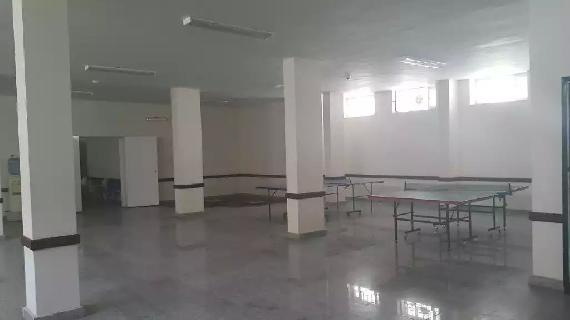
Main hall in hospital
The complete unpredictability of psychiatric patients remains a huge concern as some get so aggressive and agitated that they start damaging things including beds which are made of metal, they tear down mattresses and their own clothes, which mean there is a constant need to replace them with new ones. The male patients all wear a dark green uniform, Some patients suffer from involuntary urination, calling for the need to keep them and their surroundings clean, to do that, cleaning detergents are required which the hospital is also short of. A philanthropist built the hospital a padded cell for the aggressive patients to prevent them from hurting themselves but it was soon put to shreds by one of the female patients who has an aggressive habit of tearing down and breaking everything in her way and due the financial situation they were unable to rebuild it.
The air, land and water siege has prevented the delivery of medical supplies to all hospitals and pharmacies , when we asked how and where from the hospitals medical supplies were coming from Dr. Sami replied, ”We depend on donations from NGOs, but there are times where we really have to work with what we have so we are forced to cut down on doses from 3 times a day to 2, and from 2 to one daily and sometimes we divide the daily does into two just to get by and help the patients stay stable. Of course this is medically wrong but we have no other choice. The schizophrenic patients suffer the most as their medication and dosage must be stable to acquire results”.
The financial situation and absence of funds has affected employees of all sectors, Dr. Sami commented on the condition of his staff saying, ”The government has taken responsibility for paying the salaries of 25 doctors and nurses out of the 150 total employees we have, the rest are the hospital’s responsibility. Sometimes we all must wait a few months before receiving our wages as times have become very hard”.
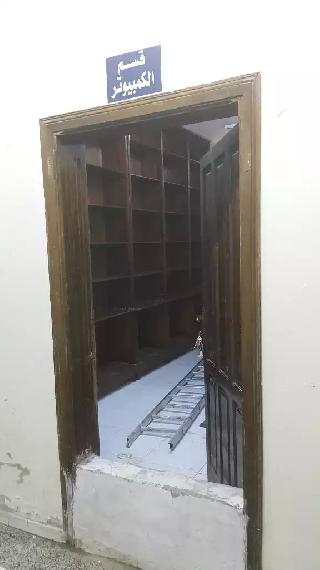
One of many empty rooms in the hospital
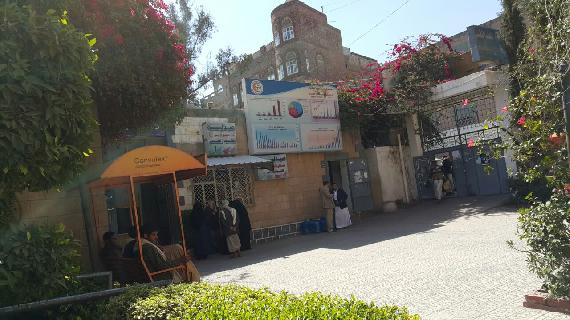
They rented a space for the pharmacy to run
Since the Yemeni culture is very conservative the hospital has 2 adjacent buildings separated by high walls, separately the male and female gender. Most of the patients are either schizophrenic, bipolar or suffer from chronic depression. The severity of the cases has increased due to the war. The male patients have mostly been triggered by the increase in the rate of unemployment, inability to pursue their education due to financial issues, and some due to the use and abuse of drugs that have started getting popular after the war.
The male ward entrance is an empty black gravel yard instead of a green grass space where the patients can spend leisure time but that is farfetched and wouldn’t be possible since the hospital barely has funds to feed the patients .The laundry room is run by a pleasant elderly man who has been in charge of the service for quite a while despite the financial situation he keeps the patients clothes and blankets clean and fresh. The dining area is a large room lined with white tiles convenient for easy cleaning, the patients clean up after they are finished eating, “they are taught to help around and be productive” , says Dr Sami. However the recreational area of the patients which really lacks in equipment, only has a pool table, a stationary bicycle, a foosball table and a whole lot of empty usable space that has gone to waste due to the lack of funds. As for the main area it is comprised of the TV room followed by a group of empty rooms that have not been put to use due to the lack of funds. In Dr. Sami’s own words, ”If we had enough funds we would have put those rooms to use, but we unfortunately don’t. I hope someday we can fill them up with books, computers and other recreational and educational equipment for our patients.”
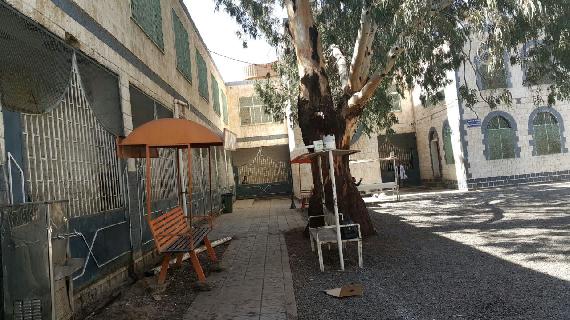
Male ward entrance
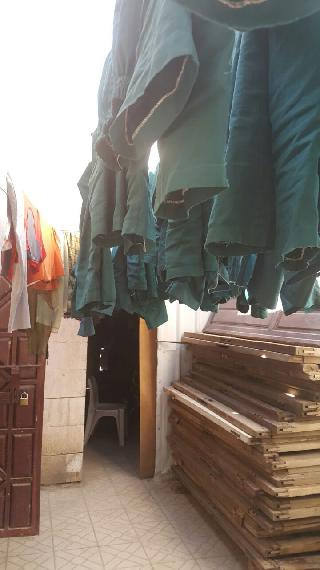
Laundry room
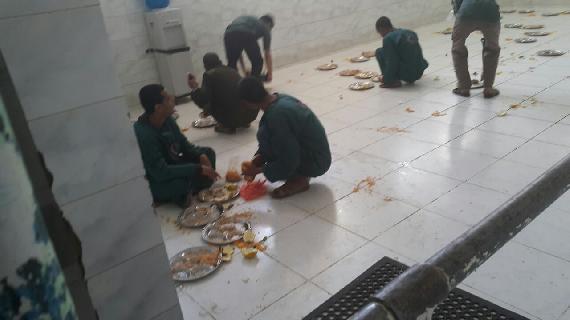
Patients cleaning up after lunch
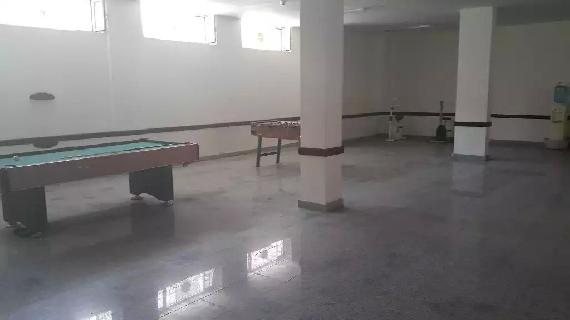
Recreation room
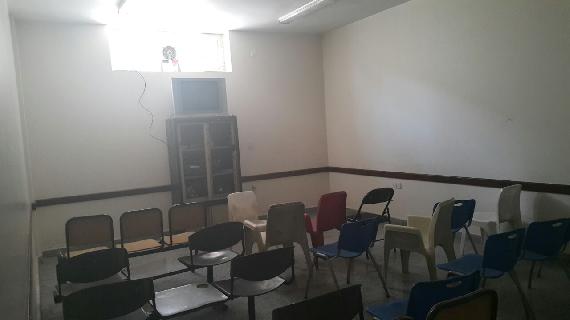
TV room
The women’s ward is a much smaller area, yet has the most chilling stories. The female patients are usually triggered by domestic abuse or traumatic events. The hospital recently admitted a patient that was brought from one of the villages by an unknown person, she was chained up in a cattle’s stable for over 20 years, she lost the ability to speak and could only communicate in sounds and gestures similar to that of cattle, she had to be rehabilitated and taught communication skills for the past 2 months. The oldest residing patient has been at Al-Amal for the past twenty years, another patient was brought here by her family because she exhibited signs of extreme narcissism, while another has been admitted due to the ill treatment of her in-laws which drove her to the edge.
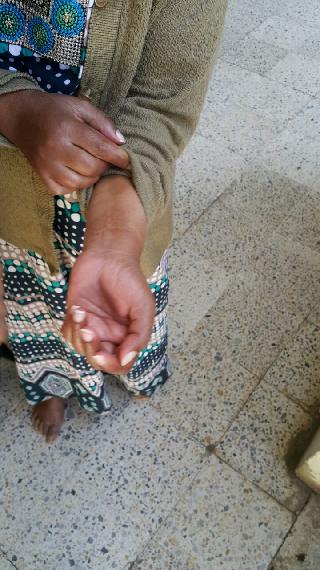
She was chained for 20 years in a cattle stable
Dr Sami expressed his concern on the drug use and abuse problems that have increased due to the war as follows, ”After the war the price of drugs has decreased by over 300% and since the rate of unemployment has increased and the youth have nothing to do to take their minds of off things, so they resort to the use of drugs. Our rehab helps them get clean and get back on the right track but we lack specialists and funds to support the rehab center.”
The war has also affected the IDPs (internally displaced people). The institution has visited the camps that have been designated for the IDPs and the cases of bipolar, schizophrenia and chronic depression they witnessed were in tragic and frighteningly high in number. The most common symptoms included children and women imagining the sounds of drones, jets and explosions which would induce panic attacks. Women who were healthy said that their children suffer from Nocturnal enuresis (involuntary urination) and inconsistent sleep patterns due to night terrors. The visits included one of the most famous schools in the capital to evaluate the mental health of the children through draw therapy. Mentally healthy girls and boys of primary schools draw flowers, houses ,rainbows, cars and colorful things ,but to our surprise the kids drew gunmen, bloody knives ,missiles and debris of houses.
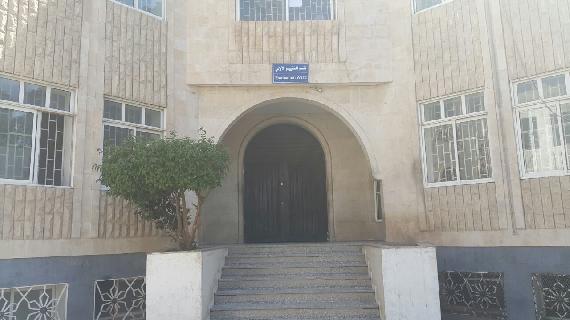
Evaluation ward
Dr Sami urged the world to help and save the hospital from closing down, he warned of a humanitarian catastrophe if the hospital closes down .The 250-300 inpatients will have not have a place to embrace them since they are considered a burden on their families, thus causing a humanitarian crisis of another kind. We quoted his message, ”Yemen’s Al-Amal Psychiatric hospital needs the help of international humanitarian aid and advocacy organizations, we are under severe pressure and are barely able to provide for our patients, we can use all the help we can get, those patients have nowhere else to go, and no one else to take care and look after them, we appeal to you not to fail us”.
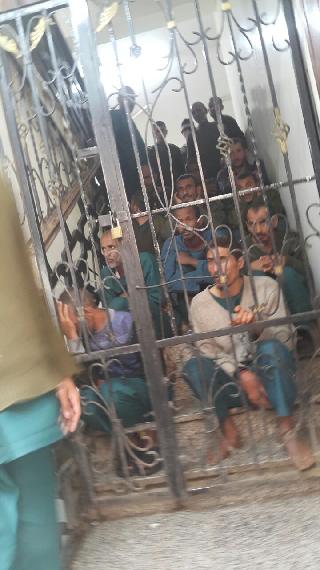
Patients waiting their turn to have lunch
Almattar Al-Qadeem Neighborhood, Tiaz Continues to Suffer from Random Shelling

View of Al-Qadeem Street (Photographer Correspondent #14)
by Correspondent #14 (Taiz), January 2, 2017
The suffering of the residents of Taiz, Yemen has not stopped since the outbreak of the war. Missiles and rockets still fall on the neighborhoods. Although some the life has returned to the center of Taiz city, but for the neighborhoods which are near to the clashes, their families afraid to return to their homes.
Almattar Al-Qadeem (Old Airport) neighborhood is located on the western side of Taiz city in Yemen. It is considered the western gate to the heart (center) of Taiz. The 35th armored brigade is located in it. The 35th armored brigade is situated in the Almattar Al-Qadeem (Old Airport) neighborhood, between a margarine and soap factory, and near Mafrq Shrab and Alrubaie neighborhoods, which are the most important places in the west of Taiz.
The Air Defense camp is also located near the Almattar Al-Qadeem neighborhood. It is a series of interconnected mountain tunnels and protect the Al-Qadeem neighborhood from the south and south-east.
Almattar Al-Qadeem are controlled by the Popular Resistance and armed forces loyal to international recognized government of President Hadi, but the surrounding areas such a Sixty Street (Shareh Alsteen ), Gurab area and Mafrq Shrab are controlled by armed forces loyal to the former president Saleh.
When I went to the neighborhood , I found it almost empty except for a few people that have not exited from the neighborhood which has been under bombardment and siege, or people who have been displaced but find difficulty in finding a place and simple return back to the neighborhood. The neighborhood now has become safer from clashes, but from time to time shells fall on it.
Motahar is a 50 years old resident we interviewed. He told us his story throughout the war. He said, “At the start of the clashes in the neighborhood, I fled with my family to the countryside. I went to my father's house. It is very old and not suitable to live in it but we not have another solution. We collect firewood to prepare food and use a donkey to fetch water. We tired from this primitive life in the countryside. I could hear the whine of my children about the living in the countryside, but I said for them soon we will come back to our home. After the clashes subsided in our neighborhood, I came back to a neighborhood. I found my house uninhabitable. It was bombed. I took my children to the countryside again and come back to Taiz to search for a job but most of the businesses are shutdown.

Motaha's home is destroyed by shelling
Mazen, a 21 year old resident of the neighborhood, told us, "When the war started on the first day of the clashes, the neighborhood's families ran away with their children. Neighborhood become almost empty. Just a few steadfast families which do not have another home or relatives outside the neighborhood. Neighborhood was drear."
Tariq, a 35 years old resident, said , “My house is next to the neighborhood's mosque, when the warring parties shelled my house, the mosque suffered from significant damage as well."

Interior Damage to Mosque
Um Salma, wiping her tears, told us, "We are tired of war. Every day we hear the sounds of rockets and missiles. I think I get used to it, but with every sound I was very afraid. I fear for my family. I wondered: When will the war end ? I can not answer and left my home to move to another.”
Muhannad, is 10 years old. We meet him in the neighborhood playing in the street. When I asked him how the war has affected him, he told us, “I miss my friends who died when they played in yard and a shell fall on them. He said to me some words which is greater than his age " the war is not forgiving to anyone ".
The features of Abu Ahmed show the grief. When I approached him and try to talk to him, he told me that, “My child Ahmed is 8 years old, killed by a shell two months ago. He went to play in the yard and when the shell fell it killed many children and women. His sister Nahed, when she heard the news of the death of her brother, she went into a coma. She die the next day. I buried two of my children in one day. I do not have the strength for revenge from whom is killing my children. I pray to Allah (God) to revenge them for me.
Mohammed, 39 years old, told us, “the neighborhood's citizens are still too afraid to return to their homes. They are afraid to return because of clashes in their neighborhood, because the air defense camp is near to our neighborhood where clashes break out suddenly from time to time. Some aspect of life has begun to emerge in the neighborhood. Some families have returned to the neighborhood but more families don't return because they are afraid from missiles that rained down on the neighborhood.”
Salwa , a mother of two children, said, “My husband goes to bring food and drink to us. My heart becomes afraid until he returns to house. When one of the shells fall in neighborhood or near I feel more scared, especially when my husband was out of house."
I left the neighborhood and I'm sad for Taizian civilians in who do not have the guilt of this war, only they are residents of Taiz and don't have another place to move to it.
Yemen: As Taiz Sinks in Mountains of Garbage, an Environmental Disaster Looms

Scene of hills and mountains of garbage become familiar appearance in the Taizian streets (Photographer: Fatms)
by Fatma - Correspondent (Taiz), December 30, 2016
Unfortunately, in a country of political differences and conflicts the citizens are the first and last victims. Yemenis have already been suffering from an economic and security issues as a result of the conflict, and now suffer today the safety of their health from the growing garbage problem in the city of Taiz, which continues to be under siege.
We were afraid from missile and rocket strikes, afraid from food that became spoiled, aged medicines that had gone bad, and the increasing pollution in the Yemeni's cities specifically in Yemen’s third largest city, Taiz. The waste crisis has increased into a bad situation. What is happening in Taiz today is a collective death. Yes, it's a collective death. Smells of waste and its toxic emissions threaten the health of the residents of Taiz and is exposing them to high risk and the world is watching this catastrophic and tragic scene. While the waste crisis at times tops local headlines, little if any is written about it in the international media.

Piles of waste accumulating in the streets
Crisis Births Another
What many feared has happened, where the streets have become in some areas of Taiz a river of trash bags, as a result of the warring conflict, the blockade brought about by the siege, and crumbling infrastructure resulting in accumulation of water. With the political differences in the country, local environmentalists and health experts refer to the accumulation of waste in Taiz as another unfolding disaster.

Garbage and accumulated water flowing through a street
The Focus of the Problem
The beginning of the waste crisis started with the outbreak of war in all parts of the city of Taiz in May 2015. All government facilities have been disrupted including offices of sanitation and street cleaning, which had been collecting and transporting waste for disposal to the Maphrak Sharhab area outside the city. In some cases, waste trucks and tankers were confiscated or looted by warring militias and eventually the Houthi militia, which has the city under siege, blocked the carriers from transporting garbage outside of the city.
This accumulation of waste is causing a serious health situation and the government agencies and civic organizations have not found a solution.
Citizen's Complaints
The main street in Al-Masbah neighborhood, the problem is particularly bad. This district is in the center of the city of Taiz and is lined with residential and commercial buildings and government institutions. Hills of waste have been accumulating along the street as a result of using the main street as the waste depot from neighboring areas.
Jamel, a resident of Al-Masbah neighborhood, spoke to us and said, "We made warnings for more than nine months, after the disaster started, demanding Hadi's government [controlling warring party in the city] to facilitate the transport of garbage from the city to the outside. But they [Hadi government] does not listen to us so we have gotten to this health disaster. “ He added, "People in the city are now reporting falling sick to cholera.”
Mona, another resident of Al-Masbah neighborhood who spoke to us, said, "The diseases have begun to appear, and most of the residents of the neighborhood are suffering from respiratory problems, rashes and diarrhea ... we started to hear doctor's warnings from disease such as cholera and dengue fever ... Do they want to kill us by their political differences ? "

Unhealthy fumes emitted from garbage rotting in the streets
Warnings from the Danger of the Status Quo
Local environmentalists and health experts warn that the continuation of the waste crisis threatens serious repercussions on the health of residents. Dr. Mohammed warned of the projected health risks in light of the waste crisis in his interview with us. He explained, "The situation would take to do a lot of procedures to avoid the worst health. There is irreversible damage can no longer be avoided, but mitigate the harm.”
Dr. Yaser said, in response to a question on the expected risks of the continued waste crisis, “What is happening is health disaster in every sense of the word. The accumulation of waste in itself involves a health risk, as we have seen over the past months that some citizens burn the waste, which pollutes the air with heavy metals and toxic chemicals.” He further pointed out that, “rainfall will make the situation more toxic by increase in the pollution in the groundwater and surface water. The rain make ponds and swamps in the streets which become an incubator environment for insects and rodents that carry diseases including fever and cholera as well as the absorption of soil for contaminated water by waste, which will lead to a risk on the agricultural crops.”

Image of waste being burned in the streets
Local environmental activists protested to Hadi's government to announce an "environmental emergency in Taiz" because of their fear from the repercussions of waste disaster which political forces continue to impede it being dealt with. Activists warned that, "Risks of environmental catastrophe will not have limits, if the political forces do not take positive attitude lead to a solution to the waste crisis urgently."
Jimmy Mack Juldrick, the resident representative of United Nations and Coordinator of United Nations for Humanitarian Affairs, visited Taiz recently and is quoted as saying, "The scenes are very shocking to see accumulated piles of garbage in the surrounding streets of Taiz where landfill sites are not accessible, which poses serious health and environment risks which need to be deal with it."
The European Centre for Disease Prevention and Control Dec. 23, 2016 weekly bulletin, cited for Yemen: 10,148 cholera suspected cases of cholera, including 92 deaths, had been reported. Of these cases, 1,173 had been reported since 6 December 2016. The number of laboratory-confirmed cases of Vibrio cholera 01 has risen to 156.
The Government Inaction
Despite these risks, the internationally recognized government of President Hadi is still unable to find a solution to the problem of waste. The United Nations Development Programme held evaluation of waste's risk in the month of August 2015 to verify the impact of the crisis on the waste management cycle. The main results of the evaluation showed reduction in the capacity of local authorities to provide funding for waste management services as well as a lack of human resources and means of transport for the movement of the waste. Additionally, fuel shortages have led to the accumulation of waste in the streets, and reduce the frequency of waste collection and the use of alternative temporary disposal sites.
Volunteer Initiatives
From Muzaffar directorate, in the heart of the city of Taiz, a group of volunteers known as "first step" cooperated to finding solutions to the crisis in Al-Qubah neighborhood suffered it in the midst of the ongoing conflict in Yemen. A group of volunteers led the initiative in order to deal with the mountain of garbage beside the Al-Uginaat cemetery. They succeeded in removing garbage from their neighborhood and remove it to temporary disposal site.
Mohammed, a young adult resident of Taiz, spoke to us, and said, “We have formed a team of volunteers and collected money to buy hygiene items and hire a tanker to transport the garbage to a temporary place. After we've cleaned up the mountain of garbage we faced the problem of the desire of some people throwing garbage again and that's what we rejected. We instead asked residents to throw garbage in the main street "Jamal Street," a street which the government agencies clean it with each visit to one of the officials or international organizations. Some altercations began with some residents. So we decided to guard the neighborhood day and night in order to prevent them from throwing garbage and after a week of the guard had passed, our neighborhood has become clean. You can see Al-Uginaat cemetery and the street next to it a nice view, but many neighborhoods still in the city suffers from the mountains of garbage.”
Food Aid in Taiz, Yemen

Food Allotment Distribution Location (Photographer: Fatma)
by Fatma - Correspondent (Taiz), December 22, 2016
The livelihood of people is destroyed in Yemen because of war. The suffering for employees in government increases after they have not received their salary for about 4 months now. This is very disastrous for them, as they depend on it. Since the beginning of the war, international organizations have attempted to provide relief and charitable support to Yemeni people in many humanitarian ways like food and water and shelter.
Today l will talk about food aid.
The city of Taiz has been suffering under siege and constant shelling. Access to the city by aid organizations is limited, while the conditions of the residents continue to deteriorate, without means of income from employment or salaries paid to government workers.
As a result of the limited access, aid organizations are challenged to determine the needs of the city’s residents to provide aid effectively.
Recently, aid made it into the city and was divided into food allotments, one per family. Each food allotment consisted of:
1) 6 cans of beans
2) 5 liters of oil
3) 25 kilogram of flour
4) 6 bags of pasta
5) 10 kilogram of rice
6) 10 kilogram of sugar
7) 10 bags of tomatoes
Ahmad, a 46 year old resident, got the food aid allotment and he told us, "There are hundreds of families in our neighborhood that didn't get a food aid allotment because they didn't know the arriving time", so he divided his share in half for his neighbor and half for his family.
Adham, a 39 year old resident, was in an angry mood when we ask him about the food aid. He told us, "Yemeni people do not want humanitarian aid, we want the war to end!"
Khaled is a 22 year old resident. He told us, "The food aid allotment is not sufficient for my family , it is sufficient only for a week, because my family is large ."
Ahlam is a 31 year old resident. She told us, "My family depends on the food aid allotment, since the beginning of war. My father worked in city water supply. Thank you aid organizations".
Mona is a 28 year old resident. She told us, "Since the beginning of the war, jobs have been cut. We were afraid how we would get basic meals. Now thank God, the food aid allotment is enough for my family.
Abkar is a 60 year old teacher in a government-run school. He told us, "I continue to teach, but l have not received my teacher salary in the last four months and l have not another job to get money to live in Yemen. l want to leave my country to another country for safe and comfortable life. "When l asked him about the food aid allotment, he said, "l do not want food aid, as it is not sufficient for my family". In the end he said in tone of sadness, "l need home not food aid" .
Water Aid in Taiz, Yemen

Children stand in queue for getting water in the city of Taiz. (Photographer: Fatma)
by Fatma - Correspondent (Taiz), December 16, 2016
Many organizations work in Yemen in supporting Yemen's people without differentiating between them. These organizations provide humanitarian aid, like food and water for Yemen's people.
In the city of Taiz, the humanitarian aid has recently arrived. Today l will talk about water aid.
The city of Taiz has been without a regular water supply for about two years, and the aid organizations are trying to solve the problem .

Tank for safe drinking water
The organizations brought in many water tanks and distributed them in many neighborhoods. And are now filling the water tanks twice a week .

Tank is for household use (non-drinking)
Every house in neighborhoods getting assistance get 80 liters, 40 liters of safe drinking water and 40 liters for household use, and people stand in long queue to get water. This is the suffering each household must go through to get their allocation of water.
When l saw the long queues, l was sadden because of the suffering of the people of the neighborhood are going through.
Every morning, some people go to get water and stand in the long queues. There are two queues, one of them is for safe drinking water and the another is for household use (non-drinking). Most of the people in the queues are women and children. This is the life for most people in Taiz.
Ahmad is citizen in Taiz , he is 46 years old. He said, "l am free , l have not had a job for two years because of the war. l get up early every morning to get water for drinking and household use.”
Fatma, a 11 year old girl, said, "Getting water is very hard. l stand in queue for two hours every day, and l carry 40 liters . It's very heavy. And my home is far from the water tank . Also my brother stands in another queue for getting water for household use.” She adds, “Some days the tanks are empty.”
Om Ahmad is 50 years old. She said to us, "the water supply in Taiz was cut about two years ago. l am very tired of bringing water for my home. l hope for the day this is finished and we have water supply again.”
Sami is a teacher. He has been buying water for about two years. He said, "l am a teacher in institute and my salary is $75 USD monthly. My salary is only enough to buy water and cooking gas cylinders.”
He continued, “I bought 2,000 liters of water at $15. And that's just enough for me and my family for about two weeks. I buy water twice a month only, while for food I buy some of the basic needs only and the rest we get from food aid. I hope the war will end soon.”
At the beginning of the war, there were some shells that fell in the middle of a queue waiting for water, Abu Ahmed told us, “some children, and my neighbors were killed in a queue waiting for water. Since this time, I barred my kids from standing in water queue and instead we buy water twice a month.”
Berbasha Neighborhood Pinned between Shells and Cholera

Berbasha neighborhood (Photographer: Correspondent #14)
by Correspondent #14 - Correspondent (Taiz), November 10, 2016
Since the beginning of the outbreak of war in Taiz city in March 2015, the western neighborhoods of the city have a large share of destruction and vandalism. Actually Berbasha neighborhood "in southwestern of Taiz" saw large massacres and incidents where its impact and effect spread in all of Taizian citizens and Yemenis.
Because Berbasha neighborhood presence is located in the vital and important area, two sides (Al-Houthi militia and armed forces loyal to President Hadi) tried to control it to control the ongoing war which led the Berbasha neighborhood to become the yard of a raging battle and violent clashes.
Berbasha neighborhood is sandwiched between the Alhseb neighborhood on the eastern side and the Wadi Al-Dahi neighborhood on the western side, and all these neighborhoods are no lesser importance than Berbasha neighborhood.
The three neighborhoods are pivotal and important neighborhoods in Taiz because important government centers and facilities in addition to the presence of a series of mountains that overlook the western city of Taiz and make it easy to control the city.
When we roamed in the alleys of this neighborhood, we saw monuments that still bear witness to the brutal and abomination of war which had happened between the corridors of the neighborhood. Berbasha neighborhood is one of the densely populated neighborhoods and is one of the largest markets in the city which meant people from all over the city went to it to buy their basic needs.
Witnesses that spoke to us, said that, In August 2015 there was a heavy presence of Houthi militia troops and armed forces loyal to the former president Saleh. The militants were concentrated in high apartment buildings and the overlooking mountains to govern control of the western region and cut off the western road to tighten the siege on Taiz.
Suhaib, 29 yeaes old, told us that there were many militants who entered into citizens homes which caused coalition forces to bombed the homes and become quite destructive.

Building damaged in the Berbasha neighborhood
Abu Mohammed told us, “I was asleep in my room, on a quiet night. Suddenly, two mortar shells entered to my room and injured both my legs, which took months for me to recover.”

Damage from a Shell that fell in Abu Mohammed's house

One of Mohammed's legs still healing today
Samia is mother of two children and a daughter told us her story and said, “We were living in Alhseb neighborhood, when heated battles forced us to flee to the Berbasha neighborhood. But then the intense fighting in Berbasha neighborhood forced us to leave the city and move to live in the village.”
Mohammed talked about his neighborhood said in a bitter tone, “The only way we could buy food is when the gunmen [militia fighters] opened the port for a few hours, with citizens standing for hours to cross over to the opposite side.
When we got back, sometimes they [militia fighters] might not let us pass which caused us to sleep in the street for days until it opened again. Even a person who was suffering from a disease and in the final breath could not pass. We would beg to them to help him to the hospital, but they refused. I have seen with my own eyes how there were gunmen beating people with the butts of their rifles and shouted at with obscene words.”
Um Hani told us, “We were very happy and joyful when we heard that the clashes and war ended in this neighborhood and we can return to our homes. Finally, we thought we will live in peace, but unfortunately there are still shells and rockets falling from time to time, and there are many wounded and dead who fall without any reason.”
Reem, 21 old years, told us, “We lived nights filled with dread and fear. My mother would pray to Allah and my brothers and sister cried and screamed when they heard the sound of artillery and machine guns. My brother and siste,r age 7 and 4 years, have become pee involuntarily every time they heard the sound of bullets and shells. Their psychological condition became very bad. We were hiding in the bottom floor for days for fear of the shells were falling randomly. The news of deaths came to us daily with the deaths of some neighbors because of the shells. When the relenting shelling was quite for hours, we would look out the window and see the destruction and devastation of homes. The neighborhood was crowded population and visitors but with the war did not see anyone.”

A building damaged in the Berbasha neighborhood
Rami wipe his tears and said, “in the war, I have lost my father, my cousin, an uncle and two of my friends. I thought that the war was over but the war still exists. On Oct. 16, 2016, a Katyusha rocket fell on the neighborhood and two days earlier two shells fell on a mosque and another shell fell in the house next door. There are still a lot of victims. But we are no longer concealed from the sounds of missiles and machine guns. I fear for my family of cholera that is not only widespread in the neighborhood but in all of Taiz. Many have died because of it, and still others suffer. Unfortunately no health facilities and medicines are available.”
Condition of Hospitals in Sana'a, Yemen

A man with a foot illness is laying in front of Al-Thawra Hospital begging passers-by for money, most of the times he is ignored. (Photographer: Yasser Mohammed Rayes)
by Yasser Mohammed Rayes - Correspondent (Sana'a), October 28, 2016
The UN estimates that 600 health facilities - more than a fifth of the total in Yemen - have been put out of action by the fighting, leaving 14 million people with no access to adequate healthcare.
Public hospitals in Yemen are in a state of absolute chaos and misery. All of them are facing severe shortages of everything from X-ray, CAT scan and dialysis machines to IV fluids, basic medications and disinfectants.
These hospitals are overcrowded because more and more Yemenis can no longer afford private sector hospitals because since the beginning of the Saudi-led Arab coalition campaign in Yemen the economy and in turn the public-sector salaries have been slashed and ultimately stopped for the past three months, at least for most public-sector employees.

A child sitting on the floor of the Emergency Department in Al-Sabeen Maternity and Child Hospital, there are no available beds, he has to wait. (Photographer: Hemiar Alazab)
On top of the new patients who are coming daily into public hospitals, new patients come in suffering from malnutrition, dengue fever, cholera and gunshot wounds.
Most of the local and foreign experienced staff have left the country and the few doctors and nurses remaining are overwhelmed by the large number of patients.

Plastic containers originally used for cooking oil, but they are also used for storing and transporting water and fuel. This is free water distribution point, it is provided as a form of philanthropy, they are spread all over Yemen, which indicates the scope of the water crisis. (Photographer: Yasser Mohammed Rayes)
Malnutrition:
According to the UNICEF Seven million children have no access to adequate healthcare they include children in camps for internally displaced people (IDP) and in war-torn provinces such as Saada and Taiz.
Additionally, UNICEF estimates that 2.6 million children are at risk of contracting measles, and 1.8 million are at risk from diarrhea.
If these numbers are realized, the level of disaster for the children and the Yemeni health system would be catastrophic. When considering that countless number of children have already died due to malnutrition and the 370,000 more are at risk who are severely malnourished and an additional 1.5 million more who are malnourished, the burden it will place on the health sector will be catastrophic.
According to UNICEF, 10,000 more children will die this year alone from preventable diseases, because public hospitals are currently incapable of dealing with most basic illnesses and patient needs. While there are some private hospitals still operating, they are extremely expensive to the general population who are now mostly without income and/or displaced.

A baby in the Malnutrition Ward in Al-Sabeen Maternity and Child Hospital with an IV drip attached to his left foot.

A mother feeding her infant child with a syringe in the Malnutrition Ward in Al-Sabeen Maternity and Child Hospital (Photographer: Hemiar Alazab)
For instance, a cesarean section operation would cost YER 360 thousand ($1200 USD) in the private University of Science and Technology Hospital, the same operation would cost YER 15000 ($50) in a public hospital. A very affordable price indeed but it also means that thousands of mothers would go to public hospitals putting even more pressure on them.
Kidney Failure:
Kidney failure is widespread in Yemen and requires continuous and expensive treatments leading many Yemenis to go to public hospitals and register to received it for free.
In some provinces, there are very few centers that could perform dialysis procedures forcing them to work around the clock and quickly run out of supplies.
In the two major public hospitals in Sana’a Al-Thawra General Hospital and Al-Jumhori Teaching Hospital various cases are being treated but the most in-demand department is the Dialysis Center which is so overcrowded and so badly needed that when the unit run out of supplies or temporarily shuts down patients start dying one after another.

Al-Thawra Hospital, people are pushing each other to get their lab results in the front the first (laboratory) window, while another farther group people are crowded in front of the second (cashiers) window trying to pay for medical services, a man complained to me about the thieve who stole his phone when he was at that window. (Photographer: Yasser Mohammed Rayes)
Cancer Medications:
The National Center for Cancer Control announced last week it will launch an appeal for funding in order to buy new cancer medications and supplies adding that if it did not receive enough funding it will have to close down.
This center along with Al-Amal Cancer Hospital are of great help to cancer patients if one of them closed down it would be a disaster for cancer patients in Yemen.
Usually financially secure Yemenis go to Egypt or Jordan to get better cancer treatment than that available in Yemen, but the poor people’s choice has always been the local cancer treatment facilities, consequently the poor majority of Yemenis will be most affected by the closer of cancer facilities in Yemen.

Two doctors inspect a box of disposable syringes in the Emergency Department in Al-Sabeen Maternity and Child Hospital (Photographer: Yasser Mohammed Rayes)
Dengue fever, cholera and other acute, watery diarrhea:
Due to numerous reasons including lack of access to clean water and accumulation of trash piles in street corners and free water distribution tanks, several types of diseases have immerged during this period of war, the last of which was Cholera.
Cholera cases are currently being treated in Al-Sabeen hospital, and according to the World Health Organization there are 644 Suspected cases of cholera, 31 laboratory-confirmed cases as well as 3 dead including two in Sana’a and one in Aden.
As usual diseases mostly hit the most vulnerable categories including the IDPs in Yemen which are currently more than three million.

A child waiting to be examined by a doctor in the Malnutrition Ward in Al-Sabeen Maternity and Child Hospital (Photographer: Hemiar Alazab)
Injured fighters:
Injured soldiers who fought in various battlefields inside Yemen and on the Yemeni-Saudi border are a great burden on Yemeni hospitals in general and on Al-Askari and 48 Model Hospitals in particular because even if soldiers and other fighters were rushed to the nearest hospitals they will eventually be transferred to these two hospitals who are currently overcrowded and underfunded and their staff have not been paid for the last three months.
There are no known official numbers of the soldiers and civilians who died fighting for the Houthis but one can have an idea especially when the number of those who died fighting for the Houthis exceeded 3000 men, from one area called Bani Hushaish.
Airstrikes Victims:
According to data surveyed by the Yemen Data Project, one in every three airstrikes on Yemen have hit civilian sites such as school buildings, hospitals, markets, mosques, homes and factories.
The most egregious attack against such sites took place in an events hall during a funeral session killing and injuring about 700 civilians and top military members of the Houthi militia who were not engaged in combat at the time.
Knowing that the local hospitals have no supplies to treat the victims the UNICEF distributed about 70 tons of first aid supplies to several hospitals in Sana’a within hours of the attack.
Even if a military target is hit as opposed to a civilian one, innocent by-standers are always hurt. A few weeks ago, an airstrike against the Military Logistics water reservoirs in Sana’a caused shrapnel to fly in several directions, a few of them hit a civilian transport bus killing a man an injuring 8 women. Incidents such as these are becoming commonplace and the coalitions strikes are still frequent.

A worn-out an Oxygen tank in the Emergency Department in Al-Sabeen Maternity and Child Hospital (Photographer: Hemiar Alazab)
Outro:
“If a peace agreement isn't signed this month, I don't think the health system can be saved” UNICEF's Meritxell Relano” said in a BBC report published on October 14 of 2016.
The fact of the matter is that the Yemeni health sector is being largely operated by international organizations such as the UNICEF, WHO, MSF and ICRC who themselves struggle to meet the increasing demands in Yemen. While the Yemeni Ministry of Health and Population provides the staff, facilities and equipment.
However, if the war continues and diseases keep on spreading neither parties will be able to save the Yemeni healthcare system.

A father holding his sick child in the Malnutrition Ward in Al-Sabeen Maternity and Child Hospital (Photographer: by Hemiar Alazab)

A child waiting to be examined by a doctor in the Malnutrition Ward in Al-Sabeen Maternity and Child Hospital (Photographer: by Hemiar Alazab)

A child waiting to be examined by a doctor in the Malnutrition Ward in Al-Sabeen Maternity and Child Hospital
Start of 2016-17 School Year in Yemen in the Capital Sana’a

Morning queue in Muadh Bin Jabal Elementary School (Photographer: Yasser Mohammed Rayes)
by Yasser Mohammed Rayes - Correspondent (Sana'a), October 7, 2016
According to Amnesty International briefing published on December 11, 2015, “Saudi Arabia-led coalition forces have carried out a series of air strikes targeting schools that were still in use, in violation of international humanitarian law, and hampering access to education for thousands of Yemen’s children”.
On Saturday, October 1 of 2016, the school year in Yemen begun, six million students were heading to their schools to start the new school year. I visited Muadh Bin Jabal Elementary School in Sana’a the capital, as early as 7 AM elementary students were flocking to the school wearing their new school bags and their green school uniforms. The female teachers were doing their best trying to organize them for the morning queue, while the school principle who used to be one of the teachers in the school is at the gate supervising the arrival of students and talking to their parents.

Muadh Bin Jabal Elementary School, in Al-Raqqas Street – Sana’a, last year it was used as a refugee center and as storage area for aid
Everything seemed fine, until the sound of strike aircraft scared students and teachers alike. The sound was so loud but the strike aircraft were not visible, no explosions were heard and few seconds later the sound was gone and everything seemed normal again.

Muadh Bin Jabal Elementary School; an Instagram photo on which the words “we want to live in peace” were written.
Teachers in the public sector had not received their salaries for the past month, but that did not stop any of them from attending in the first day of school. When public sector salaries have been delayed for several months they have so far always got paid in full.
Schools however, are facing another problem, other than teachers’ salaries, it is school books. Since last year, due to numerous problems the Yemeni economy, the education ministry is unable to print school books. Millions of Yemeni students are facing one of two options: to buy books from the black market or to borrow old books from anyone who no longer needs them.

School books on the sidewalk in Tahrir Square - Sana’a, the central black market for school books
Buying books from the black market adds to the financial burdens that families face when trying to send their children to school, most families in Yemen are already poor due to the private sector lay-offs and salary cuts and public sector salary delays and deductions.
The price of a single school book in the black market ranges between YER 200 ($ 0.70) and YER 600 ($2) depending on several factors including availability and level of education.
As for borrowing books as opposed to buying them, most students would give their old books to their brothers, sisters or other relatives, that is if they had not return them upon the ministry of education’s request, meaning most people cannot borrow books and their only option is to buy them.
I visited Hayel Saeed Anaam high school and spoke to the Undersecretary of the school, Mohammed Al-Haamzi.
“We have about 2000 Students in each school year”, said Al-Hamzi, adding “We have 86 teachers in the morning and 80 in the afternoon”.

Broken chairs in the backyard in Hayel Saeed An’am High School
Al-Hamzi said that more than the average number of students might register in this school due to the large number of IDPs (Internally Displaced People) who came to Sana’a and the number of schools destroyed.

Returned books from students in Hayel Saeed An’am High School

Returned books from students in Hayel Saeed An’am High School, but are unusable and torn apart, they are gathered in flour sack and put aside
A total of 2108 schools across Yemen can no longer be used because they were destroyed, damaged, are hosting IDPs or were used for military purposes, according to UNICEF estimates. UNICEF is also supporting a return to school campaign which includes restoring about 700 damaged schools while providing school furniture and stationery as well as bags. Another part of the campaign is training teachers on how to provide psychological support to help students deal with the hardships of war.
UNICEF is asking for $34 million from donors to rebuild damaged schools and provide the necessary education tools for students and train teachers and community specialists to provide psychological support and continue the return to school campaign.
Private Vs. Public Schools:
Private schools are a good alternative for many families in Yemen especially because they include a lower number of students compared to public schools, in addition to better playground, activities and studying materials.
However, since all Yemenis are facing various economic hardships, many of them can no longer afford to send their children to private schools. Instead, many whom were sending their children to private schools, are now registering them in public schools, adding to the strain those schools are already under.

Second year high school books, to the right the unorganized pile, they are organized and ready to be handed over to students

Unorganized pile second year high school books
When parents send their children to public schools they risk more than just dense classrooms, used school books or the rough treatment their children might be subjected to by teachers who fear that their salaries may not come for the second consecutive month. They risk their children being subjected to the mobilizations and recruitment efforts by the various warring parties in Yemen, which could have a bigger impact than any other complications found in public or private schools.
I spoke to Ahmed Al-Qurshi, head of Seyaj Child Protection Organization, about the situation of children during this period. Among the things he told me the most important thing are about how schools are used to politically indoctrinate children them and recruit them into militias.
“Almost all schools in Yemen are used to spread hatred and to prepare children and teens to participate in armed conflict [this happens] almost in all Yemeni schools”, said Al-Qurshi. He continued, “whether under the control of the Houthis, AQAP, or the Popular Resistance and others… all warring parties in Yemen use schools to spread their teachings and their military and warfare agenda with the aim of recruiting these young children. This will greatly complicate Yemen’s problems in the future”.
Until this date most public sector salaries for the past two months have not been paid, most families are barely holding together. Philanthropists are doing their best to gather money from inside and outside Yemen to buy school uniforms and other supplies for children of families who cannot afford to buy them.
Sadly, during school hours, I see children in the streets, some wearing school uniforms begging for charity or selling small items such as tissues, iced water, or any number of things. This is expected since most families in Yemen are living in poverty and they feel they need to send their children to work, even as beggars, as opposed to sending them to school.

A teenage boy selling lime at Al-Rowishan Roundabout in Hadda Street, maybe he will go to school next week or will prefer to work and support his family
Saudi Arabia Military Objective in Yemen Put to the Test
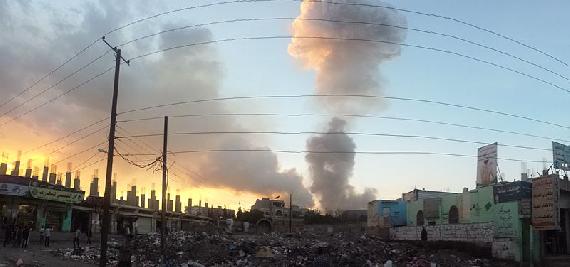
Saudi Airstrike in Sana'a, May 11, 2015 (CC-BY-SA 4.0 / Ibrahem Qasim )
by Khalid Al-Karimi - Correspondent (Trivandrun), Sept. 10, 2016
Once full of life, the people and business of some Saudi border areas with Yemen are ruined and deserted. It is not a natural calamity which has created this anarchic scene. Instead, it is a man-made catastrophe. It is a war.
It has been 18 months since Yemen began to experience a mad wave of fierce infighting and ferocious airstrikes. War is infectious. It did not freeze in Yemen. Instead, it spilled over Saudi border, reaching into Saud territories.
In March of 2015, Saudi Arabia led a coalition of eight Arab countries in a military intervention to swiftly restore the international recognized government of President Hadi and dislodge the Houthi militia from the capital Sana’a, the southern seaport Aden, and other areas. So far, this has not been fully accomplished, and Yemen continues spiraling into the unknown.
The Saudi-led coalition named its military intervention Operation Decisive Storm. Up to date, the storm has not abated. It is just raging until victory is accomplished. This is Saudi Arabia’s first foreign military intervention, and has put the kingdom and its military at a challenging test.
"What is certain, not questionable, certain, they will not be allowed to take over Yemen," said Adel Al-Jubair in a press statement, late last month (August 2016), referring to the Houthi armed group that has been in control of large swathes of Yemen's north.
Saudis have been paying a high price as the battle has been escalating on their border with Yemen. Houthi militants and forces allied with them continue their hit-and-run attacks and incursions into Saudi territory, creating complete mayhem.
Early in August, Saudi Arabia's Ambassador to the United Nations, Abdullah Al- Mouallimi said the Houthi shelling and missile attacks have claimed the lives of over 500 civilians in Saudi territories since the beginning of cross-border attacks last year.
In spite of human and material losses, the Saudi-led Arab coalition countries are willing to sacrifice more for the sake of winning this decisive war. These countries believe losing in Yemen will be a prologue to a series of future losses to Saudi Arabia's arch rival Iran, which is expanding its influence in the region. The growing power of Iran in the Middle East makes Saudi Arabia more worried about its national security as well its future influence in the region.
Nowadays, the Houthis, allegedly backed by Iran, are at the helm of the capital Sana'a, controlling the state authorities and running all the government institutions. The situation is provocative for Saudis, driving them and their allies into continued military action.
Since the sudden breakout of the Operation Decisive Storm, thousands of sorties have been carried out. Currently, the UN has raised its estimate of the number of civilians killed to 10,000. Three million people have been internally displaced. Dozens of bridges and roads have been destroyed. Numerous factories have been flattened. Hundreds of fundamental institutions have been obliterated.
In spite of this, neither the Saudi-led Arab coalition think of disengaging nor the Houthis and their allied forces are willing to give up. Saudi Arabia is not hesitant to engage in a long war rather than leave Yemen for Houthis and Iran. And Houthis are struggling to continue the war, preferring death over their perception of Saudi control of the country.
"Saudis have no interest in Yemen"
For decades, Yemen has been struggling with a variety of troubles such as poverty, unemployment and some security issues. In 2013, the UN ranked Yemen 140th of 183 in its poverty index of countries. According to the World Bank, the average per capital income in Yemen is $1,500/year before the war, while the per capital income of it’s neighbors Saudi Arabia and Qatar is $90,000 a year.
Last year, the Kingdom woke up to what it say as a new threatening reality. It cannot tolerate its southern neighbor under the influence of Iran.
“We have no interest in Yemen… We are just responding to the attacks on our land,” said Al-Jubair early last month. “Saudi Arabia has been providing, and will continue to provide, Yemen with humanitarian aid. Saudi Arabia has been the largest contributor of humanitarian aid to Yemen.”
Now, the Kingdom is leading two fronts, political and militarily. It has been pushing the UN-sponsored peace talks, and its military activities continue unabated.
Saudi Arabia is considered the center and protector of Sunni sect in the Arab world . Yemen's exiled government, after nearly being pushed out of its refugee in Aden in March of last year, requested military intervention from Saudi in Yemen, and until today government officials call for the continuity of this intervention.
On Thursday, September 9, Yemeni Foreign Minister Abdel-Malek Al-Mikhlafi called on the international community to continue its support of his government in its fight against the Houthi militants
Speaking in Berlin, Al-Mikhlafi was quoted as saying, "We are grateful for the international support for Yemen and the legitimate government, but we need more, of course. Above all, we need more pressure on the militias so that they take part in the peace process."
Saudi Arabia is deeply immersed in Yemen. It has been given the green light by the Yemeni government to launch the war against the Houthis. It also enjoys the support of the United States and United Kingdom.
Notwithstanding what has been the immense support for Saudi intervention in Yemen, their goal remains arduous. The war in Yemen has become a trap, a war they are neither able to bring to a military conclusion or exit.
Escape from Death in Yemen: A Journalist Turned Refugee

Smoke Billowing from Active Combat in Sana’a (Photographer: Husam Al-Ziyadi)
by Husam Al-Ziyadi - Correspondent (Addis Ababa), September 1, 2016
My story started on Thursday, September 24, 2015 at 5:00 am in Haddah Street, Sana’a, Yemen when I was covering press news about domestic gas crisis , and there were about 400 people who have been waiting for getting a gas cylinder for three days. I started taking photographs using my camera when a Karaseda car came toward me and three gunmen got out and started asking me to which [warring] party I work for? I told them I work for the US Sincere.Global media site. After that, they tooked my camera and took me with them in their car to an unknown location that I discovered later that it is a headquarter for the Houthi militants.
They covered my eyes, bond my hands, and started asking me several questions and accusing me of false accusations that I am providing the Saudi forces with images of bombing targets for the Saudi-led coalition aircraft to bomb their sites and that I am a traitor to the homeland. I denied these accusations but one of them hit me with his rifle on my back and kicked me on my head. One of them asked me,"do you know Hesham Ziyadi"? I said, “yes he is my brother” . They hit me severely and one of them spit on my face and said, “if he was a man, he [Hesham] would have come to the front line and fight instead of talking on T.V.” (editor’s note: Husam's brother Hesham is also a journalist)
They held me for four days without eating or drinking, and someone told me, “If you want to be released, you have to acknowledge and confess about all the accusations against you”, and I refused. They brought dogs barking strongly next to me, and my eyes blindfolded and threatened me with being killed. On the third day, someone came to me, closed the room, removed the bond off my eyes and hands and offered me something to eat and drink. He told me he was a broker and will try hard to release me in the conditions of : paying the sum of $1000, I must forget what happened and never ever talk with any media about it, and my camera will be forfeited. I agreed then he gave me his mobile phone and I called my wife and told her to sell what she could of her jewelries to provide them the $1000 and they are to take the money and do not tell anyone of what is happening. She did and I was released the fourth day.
Friday's evening; March 3, 2016, I received a phone call from an unknown number to start a conversation with me , saying, “Are you Husam Al-ziyadi?” I answered: "yes".
The unknown caller replied, “Tell us about the press report , which you wrote about the organization of the Islamic State (ISIS) in Yemen and what you said about the province of Hadramaut and the information you obtained. You and the ones like you [Independent Media] must be killed due to the fact that you stand against the establishment of God 's law and applying it on earth. The objection of what we do is an infidel and an apostate and should be killed.Your days are numbered and we know that you have, who provides you with the information from our men, and soon we will know who he is and will be liquidated , too, Allah Akbar and Glory to Allah and His Messenger, and he hung up the phone. “
I contacted one of my Yemeni friends who is a refugee in Ethiopia and explained to him what happened. He advised me to flee to Ethiopia via Aden - Somali and then to Ethiopia by smuggling. I took my wife and son to the home of a friend of mine, fearing for their lives.
On Sunday morning; March 10, 2016, I headed to the province of Taiz after the mass transport companies refused to issue me a ticket to Aden because I'm a citizen of North Yemen, so I am not allowed to enter Aden in South Yemen. Therefore, I changed my flight to Taiz after my journalist friends told me that they would get me a note from the head of the military command in Taiz which is under the control of the resistance forces opposed to the Houthi militia. The note would be directed to the southern resistance to cooperate with me and allow me to enter the city of Aden. When we arrived to the entrance to the city of Taiz, we were prevented from entering by armed Houthi militia fighters under the pretext that the Howban road is full of snipers and there are active clashes going on, and they ordered us to go back to Sana'a.

Road conditions traveling from Sana’a to Taiz
There was with me on the bus a group of residents of Taiz who told me that there is another road we can enter Taiz through by smuggling and it would take us about three hours and I went with them with the knowledge that the distance from the place where the Houthis prevented us to enter into the city takes no more than a quarter hour. We went through several villages, and walked the bumpy road out of the mountains. At the same time there was heavy shelling on the front lines between the areas controlled by Houthi militias and the areas controlled by the resistance.

A vehicle on the street in Taiz destroyed by the fighting
I arrived to the home of my aunt at 26th Street and then stayed two days until the note of the head of the military command was released. I received the note and it stated that Husam Al-ziyadi is a member of the resistance and he deserves to be cooperated with.I left the city of Taiz on Wednesday; April 4, 2016 heading to Aden. My journalist colleagues told me that I must delete everything related to the resistance or the press; both videos, pictures, or letters, or numbers, and to hide the note obtained at the miltary checkpoints of the Houthis, so that I do not get arrested by Houthis.
When I left Taiz, I came out through another way different from which I entered through. Along the way I saw rotting corpses with stinky smells in the streets. And when I arrived the first checkpoint of Houthis, who laid siege to Taiz, they let us get out of the bus and they searched in our bags, mobile phones, and clothes and they kept cursing us with bad words and telling us, “you are dogs and we will kill you. If you are members of the resistance heading towards Aden to fight there against us, we will kill you and throw your bodies as food to our dogs."

Road conditions traveling out of Taiz to Aden
The drive normally takes about two hours but due to the closure of the road between the two cities in Karash area due to violent clashes, shelling, and the mines planted on the road, we had to divert our way through Hivan area and reached Aden after eight hours through rugged roads, villages, and mountains. I finally arrived to Aden and gave the note to the authorities at the entrance of the city of Aden and I was welcomed and allowed to enter Aden. I stayed at the house of one of my friends for 12 days waiting for a ship heading to Somalia. During that period I wrote a news report on the destruction and violations practiced by the Houthi militias in the city of Aden.

Widespread destruction of buildings inside the city of Aden
During the filming of the devastation in the streets, I came to know one youth was named Omar Mohammed Bataweel at the age of 17 years old. He realized from my accent that I am a citizen of the city of Sana'a (north). He told me that he frequently visits Sana'a and asked me about the reason for my presence in Aden, I explained to him my story and he told me that he also received threats from the same group and told me that they accused him of atheism and blasphemy because of posts he wrote in the social media, and that he did not care about their threats , and he will continue his writings. We separated I never find him again.
Sunday evening, April 24, 2016, I received a call from one of my sources that I must leave Aden immediately. I told him that the ship to Somalia will leave in two days. He said to me, “Save your life to anywhere.” So I went the next morning to the port of Aden waiting for a ship to anywhere. I found one heading to Djibouti and I got in it. We waited to five o'clock in the evening and then departed the port. We arrived to the Rabkh island of Djibouti and several Djiboutian soldiers got in the ship and removed any passenger who has no documents or travel transactions to another country and held them in the refugee camp. I was one of those who did not have documents or travel transaction sheets, but the captain came to. The captain told me that I if pay him $50 he will take care of the soldiers, giving them a bribe. I gave him the money after I saw several other passengers doing the same, and then we continued on our way to Djibouti. When we arrived in the city, we were given a visa, and entered.

Our correspondent's arrival at Djibouti port.
After my arrival, I reserved a hotel room and opened the internet and I was shocked by the news of the murdering of the young man who I met him in Aden- Omar Mohammed Bataweel. He has been kidnapped on Sunday evening; March 24, 2016, and was found dead on Monday, March 25, /2016. At the time, I knew I was targeted with him, and wrote a report about him.

Widely distributed image of the killing of 17 year old Omar Mohammed Bataweel
I stayed for a whole month and did not know anyone. I tried very hard to find a way to enter Ethiopia but did not find a way. Then I came to meet the Yemeni ambassador there and I did both television and press reports about the conditions of the Yemeni refugees in Djibouti and also worked as a volunteer for the embassy as a representative in the port of Djibouti to receive the Yemeni refugee arrivals and I was honored by the Ambassador for the effort I put.
After that I spent my money because of the high living expenses in Djibouti , where I spent the amount of $ 2,500 a month for the rent of the hotel room at $70 a day, and the cost of the food and drink expenses. So, I decided to take a chance and enter Ethiopia without knowing the risks of the trip. I got in several cars to reach the Djiboutian customs building at the border with Ethiopia. I got out of the car and continued to walk behind the customs of Djibouti and Ethiopia for three hours on my feet until I got to the highway having no money or food. I stopped a truck driver who allowed me to get in with him and fortunately he spoke Arabic. He gave me food and drove me to an area called Khamisa and got me on a bus and gave the bus driver 200 francs (~$1.25 USD) , and so I arrived to Addis.

Image taken by our correspondent on initial arrival in Addis Ababa
When the hungry find no leftovers in Refuse

A side of the damages in Al-Aqil factory in Sana'a after being struck by an air raid on August 9 of this year. Photo by Reuters
by Khalid Al-Karimi - Correspondent (Trivandrun), August 28, 2016
(editor's note: interviews obtained from local contacts)
A man in his fifties was searching for leftovers in a large pile of garbage in Hadda neighborhood of the capital city Sana'a of Yemen. Standing in the middle of litters and refuse dump, the man was earnestly attempting to find little fractions of bread, vegetables or fruit or anything edible.
Yemen has been engulfed by civil war since March of 2015. This strife is coupled by a blockade by Saud-led Arab coalition as well as airstrikes that have obliterated many vital institutions. Such a chaotic situation has its fallout on the living conditions of the people and economic status of the entire country.
The skinny man is not alone struggling with hunger. Millions of Yemenis are facing a huge difficulty in putting food on table. Famine has become a menacing threat for millions of people in this war-riven nation, and this dire humanitarian situation continues to worsen in line with mounting fighting.
A recent report by the UN Office for the Coordination of Humanitarian Affairs said that 14 million Yemenis are food insecure. Another recent report by the UN's Food and Agriculture Organisation and the World Food Programme said "At least seven million people - a quarter of the population - are living under Emergency levels of food insecurity." These estimates are alarming, and they are representative of the gravity of the humanitarian situation in the country.
Currently, work opportunities in Yemen are hard to find. Numerous businesses have shuttered. Lots of people have lost their jobs, joining the queues of the jobless. Though some people manage to cope with the tough circumstances, finding alternative ways to make a living, many others have been out of work.
Mohammed Abdu Rahman, a 40-year father, lives in Houthi-controlled Sana'a. It has been six months since he stopped working as taxi driver. The taxi was not his. He used to pay a rent for the taxi owner. Due to fuel shortage and deteriorating economic conditions, he quit working as a taxi driver. "It was unprofitable," he said. However, he found another option. He borrowed some money and bought a motorbike. Since then, he has been struggling daily to make a living through the motorbike.
Kamal Jameel, a 24-year old university graduate, used to work in the private sector as a security guard. He landed the job two years ago. Three months ago, the company he worked for decided a work force reduction. He lost his job. "I do not know where to go. Work opportunities are scarce. I have done my utmost searching for another job. All my attempts have been in vain," said Jameel.
Whether job seekers are holding university degrees or not, the market labor has no opportunities for both. The economy has stagnated, and investors have been discouraged due to the security situation and uncertainty about the future of the country.
Mistaken airstrikes contribute to economic crisis
On August 9, an airstrike hit a food factory in Sana'a, leaving a tragic scene that moved the people and world media. Al-Aqil potato chips factory was turned into rubble by an air raid during office hours. 20 were reported dead besides at least 20 injuries, and some bodies were charred beyond recognition. The factory became out of order. "It is a chips factory. People in the factory work throughout the day to earn a living. You simply come and strike it," one of the injured said in a statement to Al-Masira TV channel after the attack.
Obviously, targeting such factories make the economic condition tougher in an already impoverished country which has been polarized by politics. The Houthi militants and allied forces who took over Sana'a in September of 2014. Early 2015, they ousted president Abdu Rabu Mansour Hadi. Fleeing to Saudi Arabia in March, Hadi called for foreign intervention. The Saudi-led Arab coalition immediately launched an air campaign against the Houthis and allies.
Economic losses in Yemen
It has been one year and a half since the war breakout in Yemen. The country's infrastructure has sustained huge damages because of ground fighting and thousands of air strikes in several parts of the country. A recently published joint report by the World Bank, United Nations, Islamic Development Bank and European Union put the economic losses of Yemen at $14 billion. "The conflict has so far resulted in damage costs (still partial and incomplete) of almost $7 billion and economic losses (in nominal terms) of over $7.3 billion in relation to production and service delivery," the report said.
Yemen's future is obscure. The battles are in full swing, and the peace talks lie in tatters. Though negotiations were said to resume in coming days, it is not clear what the future holds in store. Yemenis continue to lead a tough life, waiting for exit from the dark tunnel. "We[the people] pay the price, and politicians play the game," said Jameel.
Conditions in Al-Manakh Neighborhood in Taiz

Al-Manakh neighborhood (Photographer: Taiz Correspondent #14)
by Taiz Correspondent #14 - Correspondent (Taiz), August 13, 2016
The majority of the population Al-Manakh neighborhood are supporters of the Popular Resistance, a civilian militia, and Al-Eslah Party - one of the political parties most loyal to Hadi, the internationally recognized president of Hadi. The party oversees several adjacent neighborhoods where the opposing forces loyal to former president Saleh and the Houthi militia have barricade it in on three sides. The western side of the neighborhood (Al-Haseb , Al-Moror and the Wadi Al-Duhi neighborhood) and the south side (the military intelligence center) and the East (Cairo Citadel) which was formed to place the neighborhood under siege before siege of the entire city.
Also, it also overlooks the many areas held by the Popular Resistance loyal to Hadi.

A street in Al-Manakh Neighborhood
Hisham, a resident of Al-Manakh neighborhood talked about the tragedy on the people in the neighborhood. He said, "people in this neighborhood are always oppressed because any conflict happens the neighborhood is the first affected by its position. The Al_Manakh neighborhood is located on a mountain, peak which makes it a targeted place where all parties in conflict are trying to control it.”
He continued, “At the beginning of the conflicts it has been under siege. People are no longer able to move and remained in their homes for days so we had to drink unsafe water and some of the young smuggled some food to us through the narrow lanes of the eastern side of the neighborhood. We walk beside the house's walls, and in certain areas we run very quickly, so as not to be exposed to a sniper in Mountain Akhawah from forces loyal to Saleh. The bombs that hit the neighborhood have killed and injured many people. Some of the leaders and elders intervened with the warring parties to get a ceasefire agreement (‘The Truce’) in order to allow families to get out and survive. The Truce lasted 12 hours, where most residents left the neighborhood on foot.

Building damaged in the Al-Manakh neighborhood
Salim, 17, a resident of Al_Manakh neighborhood said, "after the outbreak of war, we can no longer go out anywhere. I had meet with my friends for several hours playing soccer, chess and talked them about everything and most of our conversations were about the war and the high prices, and suddenly one of the shells fired hit one of the houses. We all went to check on the house and rescue the injured and while we were there around the house, another shell fell. I felt a strong voice and wind approaching. We all fell on the ground. We were 17 people, ten young men and seven elderly. Those who were wounded were screaming loudly. Women and children came out of the house and started crying and screaming. No one was around to take us to hospital. The women went thru the neighborhood and screamed for men in the neighborhood to come and take us to the hospital. My friend died after a piece of shrapnel pierced his heart and wounded many of my friends as well. Today, after more than nine months after the incident, as like many of my friends I cannot walk and I am still waiting for granted a visa to obtain a therapeutic care in foreign nation to rehabilitate my limbs. I will not be able to play football again.”
Abu Mohammed (not his real name) said, “I still remember the scene well. The child was screaming my father is not Houthi. My father is not Houthi after the Popular Resistance shot his father. The main road was cut off by the Al-Houthi militia because of the clashes and conflicts that forced citizens to pass through the road which passes Al-manakh neighborhood. I saw a large bus and some furniture and cartons were inside it and two men and a child. The Popular Resistance stopped the bus. The bus driver was carrying a weapon and when resistance wanted to the driver to hand it over, the bus driver, who was the father of the child, objected. He told them that he needed the weapon to protect himself and his property from theft. One of Popular Resistance fighters tried to get the weapon by force and bus driver resisted during the fight. He was hit by a bullet and fell to the ground. After a few seconds some more of the Popular Resistance fighters hurriedly came and when they saw the scene, they believe that the man is Houthi and they opened fire on him and on the bus directly. The bus driver, father of the child, was killed and injuring a second man, while the child was crying and screaming my father is not Houthi - My father is not Houthi.”
Dr. Ahmad, a pediatrician, told us, “Daily mortar and anti-aviation comes from the air defense center, which was controlled by the al-Houthi militia after Popular Resistance retreated to the military intelligence center. The al-Houthi militia shelled the military intelligence center and some houses which were controlled by the Popular Resistance, often missing their target and injuring civilians.
There is no other choice only to stay inside the besieged neighborhood without the availability of the living necessities of life and face our destiny, risk our lives to bring the necessities of life, or the evacuation of homes and displacement.”
Yahya, 31 years old, said, “The time was 2:30 in the morning when I woke up to a very strong voice. I felt dust falling on me. I screamed My god, My God, Allah. I did not see anything and smoke was covering the place. When I went out, I saw our neighbor’s home was burned and another neighbor was hit by shrapnel in head.”

Yahya's neighbor home damaged by shelling and in Al-Manakh neighborhood
Soliman, 34 old year, said, “I was advocate for the intervention of the coalition led by Saudi Arabia and when I heard on television for the victory of the resistance I was joyful, but my opinion completely changed after I saw the devastation. War destroyed us.” He added, "my brother died and his family in the artillery bombardment". What was his sin and guilt of his children in this war? I'm not with one of parties but I want to live in peace with my children, enjoy the grace of God. We left the family home and my brother remained in it, but we came back after our house burned, my brother and his family was killed!"

An interior view of a room in Soliman’s home where a shell pierced through the ceiling.

Another interior view of a room in Soliman’s home where a shell pierced through the ceiling.

Another interior view of a room in Soliman’s home where a shell pierced through the ceiling.
Abu Mohammed, talked to us, "It was a very tough days, I've reached the age of more than 80 years, I have seen a revolution of 26 September 1962 and the liberation of the south Yemen from British occupation and witnessed the Gulf War and the war of secession in 1996 but they were not as absolutely violent and brutal as this war. After three months of calm, we returned to our homes after the popular resistance freed most of the western neighborhoods, and added air defenses for the rockets and missiles that come to us, but still from time to time some missiles drop on us. The situation is much better than the status quo ante. Food is available. At the beginning of Ramadan month we got food aid from King Salman Center and a few days ago we got food aid from the Royal Charity Association - Bahrain. It has eased a lot of the suffering of the people but we are still suffering from drinking water, electricity outages and lack of medicines or our inability to buy them, especially for chronic diseases, and still lacking medical staff qualified to deal with the legacy of war.”
Indiscriminate Airstrikes and Shelling in Wadi Al-Duha neighborhood, Taiz

Street view of damage to residential and commercial buildings in Wadi Al-Duha neighborhood (Photographer: Correspondent #14)
by Correspondent #14 - Correspondent (Taiz), June 20, 2016
Taiz, was known for calm, culture, and sense of security. Taiz was known as place of peace and a civil city in Yemen. It is not today as all! Here in Taiz no voice is louder than the voice of bullets and rockets. Taiz's neighborhoods groan under the weight of shells, guns and even rockets. The neighborhoods of eastern and western Taiz have had the largest share of massacres against unarmed civilians.
Wadi Al-Duha neighborhood, in the west of Taiz, is one of the first affected neighborhoods on the western side of Taiz. It is located in line of hot clashes between Al-Houthi militia and armed forces loyal to the former President Saleh, on one side, against the Popular Resistance civilian militia and armed forces loyal to international recognized President Hadi, on the other side. Citizens of this neighborhood divided among loyalist to former President Saleh and loyalist to President Hadi, while many youths have joined one of the parties for the need to get money and aid.
Wadi Al-Duha neighborhood in Taiz, the largest Yemeni city in terms of population density, suffered after the outbreak of war from the siege of the population before the Al-Houthi militia surrounded the entire city. Snipers have taken high places around the neighborhood to control the western port of Taiz, which forced citizens to stay in their homes but, food, drinking water was running out and forced many parents to risk, and at times lose, their lives to bring water and food.
According to the report issued by the Humanitarian Center for Human and Development in December 2015, 89 residents of the Wadi A-Duha neighborhood were killed including women and children. The report identified 38 civilian infrastructure facilities had been totally destroyed and looted.
On May 11, 2015, after two months of Yemen's war outbreak, the Saudi-led coalition aircraft bombed a building where Al-Houthi militia were stationed in west of Taiz at six in the morning. Some of rockets missed their target and fell on civilian houses on that black day as western Taizian families call it. On the black day 13 civilians were killed, including eight children and three women, and injured six others, including three children and three women. The Traffic Police Department headquarters, along Al Morur Steet/60th Street, is the nearest location where Al-Houthi militia had occupied and controlled. It is far about 500-700 meters from the civilian house which was destroyed and most of the occupants killed.

Ariel view of Traffic Department and surrounding residential houses (Google View)
According to witnesses, there was a proliferation of Al-Houthi militia's fighters in the Wadi Al-Duha neighborhood and surrounding neighborhoods. A witnesses said, “Coalition fighter bombed several sites in which the Al-Houthi militia in the morning of black day before pounding Abdulqawi Al-Gabri home by mistake, which has killed 10 members of his family and three people from neighboring houses.”
Yassin Abdulqawi Al-Gabri , 24 years old young man, was sleeping in a room above his father’s room with a colleague from his university, a two-story home, when the bomb hit the home. Yassin survived from death but 10 of his relatives died. Yassin said, "When the explosion occurred, my brother died directly, and pushed my sister 50-100 meters outside the house which resulted to exposuring her to more injuries and suffered from a coma. My colleague and I did not know at first what happen around us. We waited in a state of shock for more than an hour and we almost suffocated because of choke from smoke. Ten of my family died that day (my father, mother, brothers and sisters). They were not spared, just me and my severely injured and comatose sister. Also, my neighbor whose house is located just 20 meters from our house died, a young child. A large stone had fallen over a teacher's head in neighborhood because of force of the blast and died. The force of the blast caused devastation to five or six nearby houses to our house. I saw the victims' bodies and body parts. The process of searching about people took three days because of a lack of fuel and adopting of parents of using simple tools in the rescue operation”. He added, "civilians are victims of the war, unlike the fighters who know how to prepare and protect themselves during war."

'Al-Gabri's building after having been “mistakenly” targeted by the Saudi-led coalition

Another house next to Al-Gabri's home destroyed by the Saudi-led coalition airstrike

Another view of the destroyed house next to Al-Gabri's home

An interior view of a damaged room in house next to Al-Gabri's home
Ammar,21 years old, is another witness to the air strike that day. His father was killed in the blast. He spoke to us about the conditions of the incident, "shrapnel littered everywhere in the neighborhood. My father was walking in neighborhood to come back to our home and was carrying in his hands a breakfast for me and my brothers and sisters When the blast happened I fled into the street with that I was injured by shrapnel, and I found my father with his right hand separated from his body and bleeding severely. He was still alive. Then a large stone fell on his head in the second blast. When the residents of the neighborhood came to take the wounded to hospital, another 3rd bomb fell in the neighborhood adjacent to our neighborhood so people fled and left us. I took my dad by my car but I did not find any hospitals to received him. Hospitals were still closed so I take him to a small health center in a place much further away. It was a clinic for the care of pregnant women. My father died in my arms that day with me. After the death of my father, we were left without a breadwinner. My father had a large family of nine members and I do not work yet. My family fled to the safe area after destroying a large part of our house, and now we live in a relative’s home ".
Jihad, 20 years old, is another residents of the neighborhood who spoke to us. He works as a driver of a minibus, he said that, “ a violent explosion at six in the morning awakened me from my sleep. I rushed to the scene before the second bomb fall next to the Al-Sunah mosque.” He continued, “I saw our water truck was turned into metal parts due to the explosion, and I saw a woman who has her head separated from her body, and her three children were in pieces."

Al-Sunah Mosque in Wadi Al-Duha

Remnants of Jihad's water truck after being struck by shrapnel from bombs
Jamal , another resident that spoke to us, said, “We could not get out of our homes because of indiscriminate shelling At four o'clock on the afternoon of Saturday March 12, 2015. Our neighborhood and others had been shelled by heavy weapons from the mountain overlooking the Habil Salman and overlooking the CID and Al-Moror. Five shells fell on our building which we were staying in it with seven other families. Shells caused serious damage to our building.” Jamal added, “the water tanks on the roofs of houses were hit, women and children were afraid, along with pregnant women. This bombardment led to a state of terror in the children and women. We could not stay so my family fled with the other seven families and escape through the alleys to other areas."

Gamal's building where a shell pierced through the ceiling.

The roof of Gamal’s home where you can see where shells struck, pierced into the interior and exploded

An interior view of a room in Gmal’s home where a shell pierced through the ceiling.
Destroyed homes and hearts of their owners is more destructive. Hearts full of oppression, weapons traders and great countries continue to spread the smell of death and destruction everywhere.
Omar Bataweel, Murdered for Critical Postings of Islam

Omar , photo taken from his personal facebook account
by Husam Al-Ziyadi - Correspondent (Sana'a), May 17, 2016
“I see Allah in flowers but you see him in graves, that is the difference!”, Omar Mohammed Bataweel, a 17- year-old, said before he was killed by religious extremists in Aden, Yemen. He had been receiving death threats for his critical posting in Facebook on Islam, and was abducted Sunday April 23, 2016 from his home and his body was found Monday afternoon.
Facebook and other social media websites are teeming with postings related to the crime committed against Omar Mohammed Bataweel. The cruel killing a young man in the prime of his life, has raised the uproar and controversy among the youth in Yemen.
He only wanted to get his rights of freedom, security, intellectuality, and life. Therefore, he refused to follow the flock and chose to live only as a human. To seek for freedom, and peace; to call for an intellectual and moral revolution that returns our minds, lives, and humanity back to us regardless of one's religion or race; and to raise the slogan of humanity in a community ruled by extremist Islamic groups and militias, where raising the slogan of humanity, is a blaspheme and atheism that deserve execution.
In a community having such culture and beliefs, it is so easy to make someone a criminal worthy of death just by attributing your will to Allah's. You can commit any felony by any means because you do it in the name of Allah and Islam, and because you call yourself the defender and protector! And when you refuse this point of view and say Allah and his religion do not need any protector or defender, you are an atheist who must to be murdered.
They claim they believe in Allah, the single creator, who donates the life to all of us including disbelievers and atheists, they give themselves the divine right to deprive others from this divinely donated life in the name of the donator God!
Dear Omar, knowing all these facts about the situation in our community did not stop your courage from manifesting and standing up. It is only from the moment of your murder, you can rest in peace that you have always wanted for us, and you will enjoy it forever. Millions of prayers for peace and goodness are being sent to you and will continue to be sent by millions of us. And after all, what happened to you will hopefully make a revolution in youth mentalities. Your impressive words like "You accused me of atheism. Well, I see Allah in flowers but you see him in burials, that is the difference" are stuck in millions of youth minds more than ever, and I hope they will apply these words in to their life.
Ignition Fuse: Resurgence of Secession in Aden

A public school in Aden with the Southern Yemen and Emirates flag (Photographer: Husam Al-Ziyadi)
by Husam Al-Ziyadi - Correspondent (Sana'a), May 14, 2016
Aden , a governorate in southern Yemen, doesn’t raise Yemen’s flag; however, Southern Secession flag placed instead is seen everywhere. The Southern Secession flag is the south Yemen flag before Yemen unified on May 22nd, 1990. The armed conflict in Yemen is driving a resurgence of a desire for secession, where the flag is now seen above houses, on private cars , on governmental facilities and even on police stations all over Aden. Additionally, the Saudi Arabian and Emirates flags are also raised besides the secession flag in Aden; which is now the temporary capital of Yemen and the headquarters of the government of the international recognized president of Yemen, Hadi.

A large South Yemen flag wavering on a building in Aden
Southern civilians and leaders started calling for secession as long as they have suffered from the current armed conflict, took the lives of civilians, and destroyed the city’s infrastructure. Worsening the situation, is the expelling of innocent displaced civilians days ago, whose only reason for expulsion was that they are originally from north Yemen ( Ibb, Taiz, Alhudidah, and other governorates). These civilians that are being expelled to northern cities that are controlled by Houthi militias and armed forces loyal to former president Saleh. On May 7th, 2016, the Governor of Aden, Shalal Shaiea instructed the militias allied to him to expel any civilians from the north. It’s been reported that they expelled over 250 citizens from the north in the last few days. This and other practices are occurring under the confusion that is experienced by the international recognized government in-exile in Saudi Arabia, and its inability to maintain rule and order in cities under its military control. Instead, local officials and influential people make decisions that undermine the Hadi’s government’s ability to maintain consistent authority in Aden, and ferment divisions among Yemenis instead of unity.

Photo believed to be of a militia patrol escorting truck expelling citizens from Aden (Photo Courtesy of Mohammed al-Sharabi)
Nowadays, only southern citizens are being allowed to enter the city of Aden. For those who have north identification, they must find a sponsor or guarantor with authority in the south in order to be allowed to enter the city.
On the other side of the country, in the northern governorate of Sa’ada no one is allowed to enter the city until they have permission from local Houthi militia leaders. In other northern governorates, such as Sana’a, Damar, Ibb, Al-hudaidah, Taiz and others everyone is allowed to enter that cities without any obstacles.

Photo believed to be of citizens detained and questioned in Aden by local militia (Photo Courtesy of Abas al-Thailey)
The citizens in the middle areas are the most affected, where those from the northern areas see them as citizens of the south, and those in southern areas see them as citizens of the north. They are treated as s strangers by the militias, subjected at times to being expelled, kidnapped or killed and their freedoms violated.
So, where is the government role to protect civilians from this violations? Is it possible to see Yemen Unity flag ( Red-White- Black) waving again in southern cities? And Yemenis wondering if they could see a legitimate government again controlling the country?
Continually Suffering in Hawd Al-Ashraf neighborhood, Taiz

Building damaged by shelling in the Hawd Al-Ashraf neighborhood (Photographer: Correspondent #14)
by Correspondent #14 - Correspondent (Taiz), May 13, 2016
The withdrawal and retreat of in April of the Al-Houthi militia and armed forces loyal to the former president Saleh from the neighborhoods inside Taiz to the outskirts of the city, revealed the enormity of impact from the mutual shelling and coalition-led air strikes on Taizian families who have been living a real tragedy.
Many neighborhoods in Taiz, like Alhseb, Wadi Al-Duhi, Almoror, Al-manakh, Al-Berarah, Kelabah, Aljahmalia, Al-Askari, Al-Jamhori, Al-madinah Al-Qadimah "old city" and Hawd Al-Ashraf, appear fully devastated. Houses and apartment buildings scorched in what had become ghost homes, as the residents fled their homes to escape from missiles, shells and rockets rained down indiscriminately on the neighborhoods. These poorly or unguided projectiles do not discriminate between civilian and fighters.
Hawd Al-Ashraf neighborhood, in the east of Taiz, is considered one of the important neighborhoods in Taiz. It is most affected from armed conflict inside the city because of its strategic location and presence of provincial government buildings, including the Governor’s residence. The residential neighborhoods became areas of fierce battles for control of Taiz.

Street view of damage to residential and commercial buildings in Hawd Al-Ashraf neighborhood
According to the report issued by the Humanitarian Center for Human and Development in December 2015, 85 residents of the Hawd Al-Ashraf neighborhood were killed and 660 wounded, including women and children. The report identified 27 public/civilian infrastructure facilities had been partially or totally destroyed and looted, disrupting the work of these institutions and organizations and their services to the public.
Local reports estimated that about 95% of the residents of Hawd Al-Ashraf neighborhood fled towards the countryside and other safer areas.
Along the road which leads to the center of the Hawd Al-Ashraf neighborhood one sees dozens of buildings destroyed either fully or partially and sees fighters from the Popular Resistance, who control the neighborhood now, spread out and patrolling. These neighborhoods bare the scars of destruction, indiscriminate raids, and violent street battles.

Another house in Hawd Al-Ashraf neighborhood totally destroyed
Mazin, a mother, is one of the residents of Hawd Al-Ashraf neighborhood. She spoke to us and said, “The shelling and rockets which affected neighborhood's homes and carried out by Al-Houthi militia had the largest share in the making of the destruction of neighborhood.” She referred to the militia fighters as ‘invaders’ who did not stop with the destruction of the neighborhood and institutions, but they terrorized the local population and killed dozens of men, women and children by deliberate sniping, the launching of indiscriminate projectiles, and by denying people access medical to treatment.

The remnants of Mohamoud's House in in Hawd Al-Ashraf neighborhood
Mahmoud, a resident of Hawd Al-Ashraf neighborhood said, “After a tough night for the neighborhood's families in the month of May (2015) in which the residents of the neighborhood spent under the mercy of the shells, we all fled our homes the next day and drove to the countryside. In spite that nour neighborhood is now under the control of the Popular Resistance and the withdrawal of Al-Houthi militia toward outskirts of the city, the streets of our neighborhood are still empty and our residences are destroyed and is not suitable to live.
We spoke with Hamid, who joined the Popular Resistance civilian militia early on. He told us, “I could not believe what I saw at first glance. The destruction and devastation in the neighborhood, where was I born and grew up, is big. The bombing were violent and it is destroyed and many of the buildings obliterated.”
Kalid is another resident of Hawd Al-Ashraf neighborhood, whose house was shelled by Al-Houthi militia. He told us is that it take him several years to build it and now it's down to this, pointing to his severely damaged home.

Khalid's home damaged by shelling in Hawd Al-Ashraf neighborhood

Another view of Khalid's home damaged by shelling in Hawd Al-Ashraf neighborhood

The roof of Khalid’s home where you can see where shells struck, pierced into the interior and exploded.

An interior view of a room in Khalid’s home where a shell pierced through the ceiling.
Al-Saeed Library of Science and Culture in the Hawd Al-Ashraf neighborhood is considered the primary cultural library in Taiz, and was frequented and enjoyed by many residents of Taiz. The library became progressively looted of equipment, valuable manuscripts and historic are coins. The library was set ablaze on Jan 11, 2016, which was attributed to Al-Qaeda militants, and burned into the next day and was completely decimated.
In the month of May 2015, families in the neighborhood got up and saw the slaughtered bodies of three soldiers belonging to security government forces in Taiz, in which no party took responsibility.
Abu Salem, another resident, described the experience to us, “I went out 5 in the morning to perform the dawn prayers and we saw three headless bodies. The scene was very painful to us. We are Muslims and our religion forbids us to kill any innocent person. I do not know the guilt of the soldiers had done to be killed in such a manner.
The Al-Thawrah Hospital in Taiz issued on August 4, 2016 a distress call to donate blood after what was reported as a massacre of civilians resulting from a volley of Katyusha rockets on Hawd Al-Ashraf and Akhwah neighborhoods, which left more than 16 dead and wounded.
Reem, mother talked to us about when children were massacred collecting water. She said, “The water had been cut off since the outbreak of the war and is still cut off yet. Children and women were gathering around the barrels of water for water filling. I survived miraculously from death. After I filled 40 liters of water and left the place, two mortar shells landed among a group of children. The sound of the exploding shells was intense. I can remember the children's sound from the pain and fear and the sound of the children's mothers. Blood was everywhere. The situation was very painful. It [mortar shells] fell on 14 children among the dead and wounded in addition to the men and the elderly.”
I hope the peace delegates in Kuwait pay attention to the suffering of the people and the population, and chose peace to save all Yemenis.
Hawd Al-Ashraf neighborhood today appears as a neighborhood containing only piles of buildings and devastated institutions. This "Ghosts's neighborhood" is absent of its population. The destruction spread in everything in the neighborhood and with the continuation of indiscriminate shelling of civilian houses in Taiz even under the truce talks in Kuwait, the suffering of the people in Taiz continues. There is no day without the report of casualties or death, and the rainy season has contributed to an increase in the suffering of the people still living in partially destroyed buildings.
Refugees Escaping from Armed Conflict in Yemen

Refugee Smuggler boat from Yemen to Djibouti (Photographer: Husam Al-Ziyadi)
by Husam Al-Ziyadi - Correspondent (Sana'a), May 10, 2016
Last week, I boarded a small migrant smuggler’s boat from Yemen’s southern seaport city of Aden to the capital of Djibouti. I was surprised that there were lots of children, women and elderly people travelling aboard that small boat; we were 68 passengers.
I was shocked by the passengers’ stories as I have asked each one of them about the reasons behind their exodus from the armed conflict in Yemen.
I meet Ali al Hubaishi, a 32-Year-old man from Ibb province, who could not find work anymore. He had previously attempted to illegally enter Saudi Arabia to find a job that could provide for the needs of his wife and daughters. That attempt, however, failed and he was detained for a month and then was deported back to Yemen.
Al-Hubaishi told me that he got a chance to work for the militants with great amount of payment, but, “my wife and my children rejected that and prefer my safety than the money.” After a while, he borrowed some money to travel again into the unknown with a hope of another country could give him the chance to work.

Picture of Yemeni refugees on the smuggler’s boat fleeing armed conflict in Yemen
The other person that shocked me to see traveling was a 65-year-old man named Saleh Ali from Lahj province.
Saleh Ali said, “I am heading to India to have a heart medical treatment and the only way to travel is to escape through the sea.” He explained to me that Aden airport is closed and it is much harder to travel from Lahj to Sana’a because of the ongoing armed conflict.
This elderly man was forced to travel by sea for 24 hours in spite of his bad health condition. Traveling in such a boat is a state of despair; the boat was small and outdated, with an annoying engine and lots of smoke; passengers were crammed into it so that they could only sleep as they were sitting down.
Another passenger, Saead Mohammed described himself as a student heading for India to catch up his studies. Other passengers, who have American passports, needed to finalize their visas at the United States’ embassy in Djibouti to escape from the hell of a civil war in Yemen.
Before we entered the capital of Djibouti, we were taken to the island of Obokh to check our passports. In the island, three Djiboutian soldiers took our passports. We were being asked about our destinations and the reasons behind entering Djibouti. They only allowed passengers, who have papers proving either they needed medical treatments or those who have visa paperwork at any embassy, to enter Djibouti. The remaining passengers with no identification or visa papers were sent to the refugee camp on the island.

Our correspondents amongst other refugees
One of the Djiboutian soldiers appeared to have a secret agreement with one of the boat workers that each person with no identification papers could continue to Djibouti in exchange for $50 per person. Several of the people with documentation or visas were able to continue. The remaining three people were taken to the refugee camp. One of the passengers, Hubaishi was one of them.
There are more and more tragic stories that show the sufferings of the Yemenis; so, when this war will stop and let the Yemenis live in peace again!
Aden Is A Symbol Of Victory for Popular Resistance

Our reporter being shown by a resident the damage done to buildings in Aden from the armed conflict (Photographer: Husam Al-Ziyadi)
by Husam Al-Ziyadi - Correspondent (Sana'a), May 9, 2016
In the middle of March 2015, Houthis militia and armed forces loyal to the former president Ali Abdullah Saleh entered the Aden governorate in southern Yemen. Prior to the entry of rebel and allied armed forces, residents in the city of Aden reported observing rebels from the north individually infiltrating, along with their families, concealing their presence as residents.
At the beginning of Saleh and Houthis military campaign into Aden, these rebels whom had prior moved into the city, reappeared positioned as snipers and urban street fighters, setting up checkpoints, engaging in urban gun battles, pinning down existing forces in the city, and protecting the entry of the fighters of the Houthi militia and heavy weaponry of the armed forces loyal to the former president Saleh.
Chaos ensued during the rapid advanced of the militia into the city, capturing and looting government facilities, and the armed forces loyal to Saleh captured and took control of the Aden International Airport. Residents fled or hunkered down amidst the sniper fire, gun battles and heavy weaponry exchange between the advancing armed forces loyal to Saleh and the retreating armed forces loyal to the international recognized president Hadi. Eyewitnesses said that 39 brigade units, that were defending the airport, defected to the Houthi militia.
The armed forces of Saleh and Houthis militia entered the city of Aden from along the Abyan coastline and by Lahij- Taiz road. Then, they spread and took most of the public and government facilities as their command and control and as weapon stores. The Houthi militia imposed a blockade on the ports, preventing goods and aid from entering both the city and parts of the country north of Aden.
The militia controlled a seven story building in the Ship Street at the entrance into Aden. They used the vault as a store for their arms and weapons while their snipers took positions in the building’s main floors. The snipers targeted everyone walking in that street. Subsequently, upon entry into the conflict, the Saudi-led Arab coalition launched an air strikes on the building. Residents reported that the building was struck by two missiles. One missile remains today unexploded on the second floor, and the other missile exploded causing extensive damage to the building.

Our reporter looking at the unexploded missile on the second floor of the 7-story building previously occupied by the Houthi militia as a command post

A close up view of the unexploded missile

Interior view of damage inside the 7-story building

Exterior view of the 7-story today showing exterior damage from air strike
After the city was occupied, young adult residents started a resistance forming a civilian militia lightly armed against the heavier arms and heavy weaponry of the Houthi militia. Subsequently, the Saudi-led Arab coalition started air strikes against positions held by the Houthi militia and armed forces loyal to the former president Saleh.
In the midst of the bombardment, blockade and sniper fire, many residents fled (refugees of war) by sea to Djibouti by fishing boats.
On May 6th 2015, the Houthi militia shelled the al-Taj barge as it left the al-Thawahi port while it was evacuating civilians fleeing the armed conflict, reportedly killing 45 including women and children.

Our reporting discussing with a resident damage done to the city during the armed conflict.
The militia kept the city under a complete blockade, preventing food, water and medicines from entering into the city, seizing and destroyed aid and essentials.
Moreover, the electrical power stations were attacked by the militia that led to widespread loss of power and blackouts, contributing to heat strokes and starvation. Because of the city’s hot weather, uncollected garbage and explosion in sewage, the city was hit by an outbreak of Dengue fever.
Dr. Abdulnasser al-Wally , the head of Popular Resistance’s medical committee in Aden, said. “More than 8036 cases of individuals infected by Dengue fever.” He added, “around individuals perished by Dengue fever.”

Another view of buildings damaged in Aden during the armed conflict
Sustained battles between the Popular Resistance civilian militia and the Houthi militia resulted in lots of dead and causalities on both sides.
On July 14, 2015, the Popular Resistance, Yemeni soldiers loyal to the internationally recognized president Hadi and freshly trained by the Saudis, along with Saudi-led coalition aerial arms drops and air strikes, recaptured the city. Local media reports showed a column of armored vehicles entering the city, and the Houthi controlled Maseera TV reported the retreat as a voluntary exodus from the city after cleansing it of Al-Qaeda and ISIS militants.
Upon the recapture of the city, the Popular Resistance placed a captured Houthi armored tank at the entrance to the city as a symbol of victory.

Captured Houthi Militia Tank as Victory Symbol at City Entrance into Aden
Cafes In Yemen Between Needs And Luxury

Our correspondent interviewing a patron of the cafe (Photographer: Husam Al-Ziyadi)
by Husam Al-Ziyadi - Correspondent (Sana'a), May 6, 2016
Cafes are considerable more calm and comfortable places for the young and old generations. Many see them as places for friends to gather as a result of the lack of public parks and gardens with all the services provided by these cafes. This is in addition to the level of the cleanliness and organization compared to other places.
The spread of cafes has dramatically prevailed in Sana’a in the past few years making them almost a daily destination for all age categories, mostly youth are making it the best way to take a stroll.
Is this high demand for cafes by the youth, boys and girls alike a positive or negative? Are cafes becoming the most appropriate alternative to escape from reality, which has worsened since the year 2011? To answer these questions, I went through some cafes’ customers opinions.
These cafes are no longer limited to boys but also girls have become regular customers in an unprecedented manner. Perhaps the main reason for the boys to frequently go to these cafes was the political crisis since 2011 that led to occurrence of several problems notably the power outage. This led many of the them to resort to such cafes in order to spend most of their time due to availability of electricity and internet services.
Samar Abdulaziz, 26- year –old a social media activist, said “ I am a blogger, and I need daily internet connection to access and update my blog to the latest event that we face in Yemen.” She added “ as the conflicts raises, the need of internet increases”.
Some of the old generation and boys see cafes necessary specially these days with the lack of electricity and the limited access to the internet; however, they don’t be tolerant to see girls gathering in such places.
Abulkareem Yahya, 24-year- old a college student, said “ our tradition prevent girls from hanging out with their friends in open places that contain both genders, girls and boys.” He added “ it is not important for them to have internet connection or electricity as well.”

Exterior view of Internet Cafe in Sana'a
Samar Abdulaziz confirmed that Yemenis should think positively, and deal with girls as the same as boys. She pointed out that nowadays girls study, work ,and inter the social activities , so girls need cafes, internet access, and electricity as boys need.
Mohammed Salem , 39- year- old a waiter the café, said “ most of our costumers looks for their comfort and entertainment.” He added that our high classes customers spend time in our café to gather with friends, while other customers can offer the high prices that we provide in order to have electricity and internet access.
Young Internally Displayed People (IDPs) In Yemen Caught In Difficult Condition

0 Remnants of building destroyed by air strike in al-Gail district (Photographer: Zaid Alawy al-Shareef)
by Sara Al-Gaamani - Correspondent (Sana'a), May 4, 2016
“I buried my father, mother, all my 5 brothers, and my one-year-old son and I moved to Sana’a unconsciously, Ebrahim Abdullah Sultan spoke to us trying to hid the tears in his eyes.
Ebrahim, a 32 year old originally from Taiz who now lives with the remaining survivors of his family in Sana’a. He has a secondary school degree and worked in construction on daily payment. He had gone with his wife and son to the hospital in Taiz when they went back home they didn’t find the house and all what they found was rubble instead. Within and under the rubble they found 8 dead bodies that were of his family members. That is the image that he will remember as long as he lives.
Zainab Ibrahim Mohammed, an official in Adventist Development and Relief Agency (ADRA) origination spoke to us about Ebrahim, “Ebrahim Sultan came two weeks ago and in each day he stayed on the chair not saying a word and all what he did was trying to help so he managed for me the registration of the newly displaced people”. She added, “I have been asking myself what is this man’s problem until I finally knew about his story.” She said that Ebrahim is that kind of a person who feels it is hard to ask for a help without giving anything in return.
“In Sa’ada, the majority of people are under educated and work as farmers and the air strikes left nothing to work in after most of the farms were targeted and burned to the ground”, said Yahia Mohammed Madar, a 50 year old. He also said in tears, “one of my brothers lost his mind and threw himself from the third floor”. The elder man moved with his family from Sa’ada to Sana’a for the second time after their home was completely damaged. The 18 members of his family rent a home now in Jader for YR15,000 ($60 USD) a month. This big family has six young adults between the ages of 18 and 20 years old. They had to quit their schools and university because of the moving without any of their official documentation which was destroyed by Saudi air strikes in Sa’ada.
Taleb Mohammed Taleb, 38 years old, is another person displaced by the conflict who spoke to us. He said, “me and my two brothers moved with our families from Sa’ada to Sana’a and I take the responsibility that our children continue studying”. They are 25 persons living together in a rental home on Airport Street as he further explained. Taleb and his brothers are spending the money that they have collected but after that they don’t know what to do since they are unable to find a job.
“Everything in al-Gail district, al-Jawf governorate is totally damaged by Saudi-led coalition air strikes such as the water project, public facilities, and even mosques. Therefore, all our transactions and documents are stalled”, said Zaid Alawy al-Shareef, a 36 year old solider who spoke with us. He has a high school degree and was working as a solider in the army. Al-Shareef quit working after he moved out from al-Jawf to Sana’a with his family. He has 15 mouths to feed, an elderly mother, a divorced sister with her three kids, and his eight children.

Image taken by Zaid of homes full destroyed by air strikes in al-Gail
Most displaced families are reportedly living with relatives or friends, many of whom are struggling to survive. Others had no choice but to settle in public buildings, makeshift structures, in caves or in the open, under extreme heat or extreme cold weather. Overcrowding, lack of safe water or proper sanitation services, and the suspension of waste collection are some of the problems that expose thousands of IDPs and host communities to major public health risks.
“About 4,000 families were recorded by the ADRA office in 2014 and as the war began in 2015 an additionally 25,000 families were recorded by the Executive Units for Managing IDP Camps in Sana’a with the average for each family is 7 persons. The current facilities were bombed unexpectedly, so we tried as we can to help internal displaced people that fits the budget that United Nation Office led by Coordination of Humanitarian Affair (OCHA) are providing us. Since 2015, 3650 families have received humanitarian aid as assistance,” said Abdullah al-Jaifi a social consultant in ADRA.
ADRA is providing counseling services, training team, field visits, awareness sessions, non-food items distribution, PN training, recreational activities for children, visitors, and financial assistance.

Personal belongings scattered around home completed destroyed in al-Gail
“More than one out of every two people in Yemen now struggles to find his or her next meal for the day; eight out of ten people wonder if they will find safe drinking water or adequate sanitation and six out of ten people cannot access health care, including half a million pregnant women. More than 2.2 million children are suffering or at risk of malnutrition. One in eight, or 537,000 children under age five, are at risk of severe acute malnutrition. An estimated 1.6 million children did not have access to schools even before March 2015 and now an additional 1.8 million children have lost the possibility to receive an education, with more than 3,500 schools closed across the country”, the United Nation Office for the Coordination of Humanitarian Affair (OCHA) reported.
OCHA further reports, “Many of the internally displaced people (IDPs) have experienced multiple displacements by now, as the current violence follows years of turmoil in Yemen. Now 21 out of 22 governorates are hosting displaced people, with the majority of them coming from Aden, Al Dhale’e and Sa’ada”.
Lack of water and sanitation and in some cases overcrowded shelters, expose displaced people to serious risks of disease and sexually-based violence. Civilians are bearing the brunt of the violence in Yemen, with the conflict posing grave risks to their safety and psychosocial well-being. More than half the population or 14.4 million people need protection and assistance, including 7.4 million children. The most affected category by displacement are children and women as they are the most vulnerable.

Buildings in al-Gail district still standing have doors and windows blown out from shock waves from air strikes
During 2015, humanitarian agencies increased their presence in Yemen and assisted millions of people in need across 21 conflict-affected governorates and on the Island of Socotra. From March to December, at least 8.8 million women, children and men received some form of humanitarian assistance, including in areas of increased conflict such as Taiz governorate. Continued hostilities and actions by the parties to the conflict, however, imposed serious challenges and obstacles to the delivery of humanitarian assistance during 2015. Ten humanitarians were killed while delivering assistance during the year. The number of checkpoints increased, delivery of assistance was delayed by lengthy movement notification procedures with all conflict parties, roads, ports and airports were destroyed, and continued air strikes and ground fighting restricted access to people in need, according to OCHA.
There are varying and different reports on the exact number of internally displaced people in Yemen; with the UN now estimating the number to be 2.8 million, with the number is likely to increase due to the continuity of the war and internal clashes.
Yemeni Girls - A Future Chained By Traditions

Hisham Tawfiq sits down with our correspondent to discuss women's issues (Photographer: Sara Al-Gaamani)
by Sara Al-Gaamani - Correspondent (Sana'a), May 2, 2016
"Yemeni girls have to stay home until they get married or die.” said, 54-year-old Husain Ali, a father who works as a bank accountant. The father said he can’t let his daughter travel alone because he can’t stand to be a disgrace to society.
Young women traveling alone, without a companion from their families, are considered to be a big shame in a conservative society such as in Yemen. The Yemeni society has huge limits to female issues in its culture and traditions. Yemeni girls must have the right to be equivalent with men; they have ambitions to be qualified leaders. But they struggle to even have the opportunity to study and work abroad - an important issue that continues to be under reported.
Samira Hamed, a 23-year-old law student at Sana’a University, explained to us that she has lost many scholarships and partnership programs because of the constant rejections by her family. She ultimately decided to apply again and manage a way to escape from home if she gets accepted.
“Since I won’t do anything wrong and my main goal is academic studying, I will come back as an affective person to Yemen and make my family proud,” Samira said.
Another university student who spoke to us, who asked not to be named, said that because of her family and the conservative society she used to live in back in Yemen she went through bad circumstances. She got a government scholarship to study medicine in Egypt more than 8 years ago; her family renounced her as a family member, after she travelled to Egypt. She became a victim of poverty as she didn’t receive the funds from the government to cover the university’s costs and fees. According to her, she didn’t have a job, she couldn’t continue studying, and she can’t go back home because she doesn’t have a family anymore. She is still living in Egypt on her own since 2007.
Sara Gamil, a 28-year-old psychologist, expressed that family and society should, “give their girls the right directions and trust, so they can help build their girls’ into confident personalities; girls will be strong, responsible, and successful; they won’t do anything wrong.”
There are some male youth who support woman’s rights. Hisham Tawfiq , a 25-year-old presenter at al-Hiwar TV channel, said that “it is a trust matter, so families in Yemen should trust their daughters and let them have chances to achieve their goals."
Tawfiq explained that there are some obstacles a young woman may face in a foreign country such housing problems, living and studying transactions, and dealing with some bad people with bad intentions.
“For these obstacles, independent trusted young women with strong personalities will not have any difficulties to live abroad. Another obstacle is the young women being unfairly judged by unscrupulous people in their homeland,” he continued.
Sabah al-Kishani, a female academic student at the Mass Media college, said that “the environment has changed since decades ago. Now, facilitation in many fields such as transportations, housing and friendship, makes possible young women traveling without a male custodian easier and safer.”
“Young women will face challenges in their own conservative society where families reject the idea of their traveling and wonder how their daughters would adapt in the new society they will travel to,” she said.

Picture of Sabah al-Kishani
Maen al-Najree, a 38-year-old a Secretary Editor at al-Thawra Newspaper, said “according to the women’s upbringing, the traveling without custodian will not be a problem and women will not face serious difficulties, especially in foreign countries.”
Ahmed Ibrahim, a retired government employee, told us he agreed with Maen, saying that foreign countries are safer than Arab countries. He explained that foreigners are more accepting than Arabs. Foreigners respect your religion; accept other cultures, and other personal freedom and rights. As a father, he trusts his daughter and allows her to study abroad in such countries.

Maen Al-Najree discussing women's issues with our correspondent
While the men we interviewed were divided over this, some fathers and husbands support their daughters’ choice to build their personalities and have their own future. Many proponents said women are not different from men and must have the same rights to choose whether in their homeland or abroad.
On the other hand, some young women refuse the idea of being alone in a foreign country and still support girls to be only housewives. In their perspectives, it’s more than enough for girls to have elementary school to help their children in future. Other young women said that the only obstacle is the families’ fear and distrust.
Saber Ariqi, 32 year old husband who spoke to us, said, “I had to convince my wife it’s okay to travel alone to take our child for urgent medical treatment.” He believes that the only obstacle is the language. He continued, “So, if women decide to travel abroad, they must know the language of the destination country.”
Samia Yahia, a 24-year-old political science student, joined in the discussion, agreeing with Saber and added that, “women should have the same chances as the men do in our society, and achieve their local and international goals.”
Mohammed Zaid, 28-year-old male told us that he applied abroad with his fiancée for a Master Scholarship. When she was accepted, but not him, he encouraged her to travel and waited for her to come back. He said, “she would do the same, if she was in my shoes.”
Peace Talks in Kuwait - Yemenis' Last Glimmer of Hope

Choir of Orphan Children from Al-Rahma Foundation Singing as part of Carnival Festivities in Sana'a, Yemen, March 31, 2016 (Photographer: Husam Al-Ziyadi)
by Khalid Al-Karimi - Correspondent (Trivandrun), April 27, 2016
People in Yemen have been glued to news regarding the peace talks, held in Kuwait, between the warring parties in the Yemen conflict. They have nothing to offer except sincere prayers for and calls on the negotiators to return to Yemen with peace and peace only.
Optimism is strong at this time, but pessimism also has a place particularly when people remember the previous peace talks in the Geneva that reached a dead end.
Currently, people in Yemen are crying out for a consensus amongst the warring parties. Once consensus dominates, the country will be closer to stability and recovery. Yemen stands in ruins nowadays, and persisting to continue to ruin it will be absolutely catastrophic.
Many in the country see the Kuwait peace talks as the final chance for rescuing Yemen. This is correct. Further wars would make the country uncontrollable. Persisting spread of the militants is making Yemen a breeding ground for terror. Now is the time for seeing reason. Time is ripe for stabilizing Yemen. The Yemeni people deserve to lead a dignified and prosperous life.
It has been six days since the kickoff of the Yemen UN-sponsored peace talks in Kuwait. Reports have been varying. Some say the negotiators are on good terms, and others state they are at loggerheads. It is better to terminate disputes on the table than shed blood on the battlefield.
Thus far, our hopes have not been shattered. Hopes will only vanish when the two parties head to the airport in Kuwait, leaving for Sana’a or Riyadh empty-handed.
The social media activists in Yemen have launched a campaign over the past six days, urging the representatives in Kuwait of Yemen warring sides to come back to Yemen with peace. Yemenis are thirsty for peace. Yemenis are not only in need of life basics, but they are also hungry for stability.
This last year war has claimed 6,400 lives, according to the UN. The war also has wounded about 30,000 and displaced 2.7 million. This tragedy has to stop. Violence has to cease.
Pondering over this misery, the negotiators should have realized that one-side winning is unattainable. However, they will be all unequivocal winners as well as the nation if they earnestly negotiate for sake of peace, not for the purpose for narrow-minded political interests and war tactics. Blood of Yemeni innocent people is more precious than any other interests.
Peace matters, not the red carpet
When the plane that transported the delegations of the Houthi group and former president Ali Saleh touched down in Kuwait city last Thursday, the delegations got off the plane, walking on the red carpet. This sparked a big debate on the Yemeni social media. Pro-government Facebook and twitter users felt it as a shock. According to them, how can the "rebels" be received with the red carpet? It has been said the government delegation did not enjoy such an honor. This is really funny and saddening.
It is funny because the red carpet has turned out a controversial debate. It is saddening that such a trivial matter sparks divides among Yemenis, let alone serious things. The red carpet should not be an issue. The genuine issues are the millions of people who are famished in the country, the thousands of injured and millions of homeless.
It does not matter who walked on the red carpet. It does not matter who came to talks on a special plane. Only peace matters.
Obviously, Yemen peace talks are in full swing now. People are waiting for good news and positive sweeping changes. They are awaiting to breathe peace and live in safety. If the negotiators help the people satisfy such an urgent need, they would survive all. If not, all are at risk of an unending war.
About the Writer Khalid Al-Karimi is a Yemeni scholar at Kerala University, India. He is a former newspaper journalist, Yemen. Twitter handle @Khalidkarimi205
UNICEF Photo Exhibition of the Suffering of Yemeni Children in Conflict

Our Correspondent talking to a Visitor at the Yemen Photo Exhibition for Children in Conflict on April 8, 2016 (Photographer: Husam Al-Ziyadi)
by Husam Al-Ziyadi - Correspondent (Sana'a), April 25, 2016
The Yemen Photo Exhibition for Children in Conflict was opened on Friday April 8 in Sana’a, Yemen. The photos in the competition were jointly organized by UNICEF and the Wujoh Foundation for Media and Development. The competition asked representatives from all of Yemen’s provinces to choose the best picture that expresses how children suffer in war and conflict. The exhibition opened from 8-11 April in Coffee Corner in Sana’a.
Around 400 participants with more than 450 pictures applied for the competition. The judging committee chose the best 50 pictures, and then reduced to 40 pictures that the judges agreed meet the competition standards.
To be mentioned, the competition had three voting sections. First, the committee chose the best five pictures by adult section and two pictures that were taken by children section. Second, there were three pictures that was chosen by social media users voting for their favorite picture on Facebook and Twitter.

A picture in the exhibition of two children overlooking the burial site of a family member whom perished in the conflict
To be sure that children have their chance in such event, the judging committee contained three children and two adults who are active with photography. The event organizers trained the judging committee how to choose professional pictures elements and how to differentiate and evaluate pictures.
The reason behind this event is to show the conflict’s warring parties in Yemen and to show the world that Yemeni children in this war are suffering from the displacement, lack of security and health, stopping their education, and facing many dangerous situations. The pictures display the children needs and suffering.

A photograph in the exhibition of a young Yemeni boy
“We hope to do this event every year to focus on children care because they are the most affected part in the world conflict,” said Monsour al-Garadi, Wujoh foundation chairman.
Jamal al-Tweti won the first prize with his picture that shows an 8 year-old displaced child from the city of Sada’a passing through Sana’a to find anything useful for his family. The second prize went to a picture that shows a little girl staring to Attan massive explosion. The third winning picture shows a shocked kid looking to his destroyed home in Arhab area.
Taufeq al-Janad, one of the exhibition visitors, told us, “this event is one of the most important activities in such hard circumstances,”. He added, “ the society should care about the children and focus on their needs.”

A picture in the exhibition of a young man weeping over the loss of his home
Al-Haseb Neighborhood, Taiz: A Witness on War's Destruction

Former Al-Houthi checkpoint at Al-Moror Ride in Al-Haseb neighborhood (Photographer: Correspondent #14)
by Correspondent #14 - Correspondent (Taiz), April 21, 2016
Since the beginning of an attempt of Al-Houthi militia to gain control Taiz, 3rd largest city Yemen, in March of 2015, the first militia check point was in Al-Moror Ride in the Al-Haseb neighborhood. Also the first battle of Popular Resistance in Taiz against Al-Houthi militia and forces loyal to Saleh was in this neighborhood.
Throughout the year, the Al-Haseb neighborhood witnessed violent battles between Al-Houthi militia and army forces loyal to the former President Saleh against the Popular Resistance civilian militia and armed forces loyal to international recognized President Hadi.
Once the Al-Moroe Ride check point was held in the Al-Haseb neighborhood, high buildings where taken for snipers, as well as government facilities such as Al-Shaheed Al-Hakeemi School and Technical Institute and private facilities, such as the High Class Hotel and Shabko company. The militia then proceeded to cut off the main road blocking passing cars from the Berbasha area to center of city in the beginning and then blocked the passage of civilians on foot, turning the neighborhood into a military site for militia.

Wide street view of Al-Haseb neighborhood in Taiz
Sealing off the Neighborhood
Residents of the neighborhood were steadfast in light of the continuing harassment of militia. The Al-Houthi militia setup a curfew in the neighborhood from 6pm to 6am, preventing people from entering or leaving. Anyone moving about during this time was exposed to direct sniper fire.
According to local medical sources in Taiz, a total of 11 people were killed by Al-Houthi sniper fire in Al-Haseb neighborhood. According to local eyewitnesses, the residents were killed trying to return to their homes during the curfew hours. According to human rights organization, another 63 residents were injured by sniper fire or shrapnel. Of the 74 documented cases of residents killed or injured, 12 were children.
Mohammed is one of residents of Al-Haseb neighborhood. He talked to us about about the suffering endured by the local residents. He said, “First the Al-Houthi militia prevented the passage of cars and we used to go walk to work or buy our needs. Then the situation got deadly when the militia issued a curfew from six in the evening to six in the morning and those who denied the order the militia shot. After a few weeks, one night they announced over loudspeakers that we have to leave immediately from the neighborhood. It was humiliating for us and terrifying at the same time.”
Forced Exodus from Neighborhood
Despite all the suffering which residents of the neighborhood have been exposed to it as a result of the bombing by coalition air forces and artillery, anti-aircraft shrapnel and sniper fire by al-Houthi militia, they initial maintained steadfast staying in their homes. Until November 2015, when the Al-Houthi militia started the expulsion of residents at 2am in the morning. One of militia members asked everyone to get out of their homes through a loudspeaker.
Abdul-Bari, another resident, said, “All the people in our neighborhood went out from their homes in a degrading manner. Militia ordered them to leave the neighborhood on foot in the direction of Berbasha area.” Abdul-Bari added, “I am an employee in the insurance company and they denied me even from taking important work-related papers. Everyone came out but were not allowed to carry anything, only their clothes which they were wearing and personal belongings. The militia also took everyone’s mobile phones."
Farouk is owner of a grocery store in Al-Haseb neighborhood. He told us about how Al-Houthi militia shot at our homes that night sometime after midnight. He said, “In that time my small child was wounded. They asked everyone in homes to go out quickly from neighborhood. The families go out under the yells of the militia and their intimidation of children and women. They said to us ‘You are being spies for ISIS’.” Farouk added, “I went out with my children, my mother, my father and my brothers and we were in a horror situation.” He continued after a sigh, “I watched our neighbor and an elderly person which is a diabetic and suffers from heart disease was carried in the darkness in a very hurt sight.”
Saeed is another resident of Al-Haseb neighborhood that spoke to us. He told us, “The Al-Houthi militia prevented me from taking my car and went out with my children with our clothes only. They insulted the people and treated them brutally.”
During that night hundreds of families had to get out of their homes at gunpoint in a degrading manner.
Devastation of the Neighborhood
The devastation which occurred during the war in the neighborhood during a year was terrible and massive. Local organizations confirm that there are more than 532 shops were destroyed, including over 100 shops were destroyed completely and more than 223 homes were ruined as well as five governmental institutions.
The devastation included the burning by the Al-Houthi Militia of Hazza Taha Plastic Factory which contained hundreds of barrels of raw materials and oil derivatives where it continued burning for four days. The toxic fumes which emanated from the fire caused scores of children to chock in neighboring neighborhoods, especially for people which suffer from asthma.
Yamin, a married mother who was a resident of the neighborhood, talked to us about that tragic night, “We got up afraid. There were sounds of bullets and speakers over loudspeakers ordered us to leave our homes without taking anything. We were 6 members (I , my husband and our four children). We had to walk for 1:30 hrs until we got to the Bab Mosa. We arrived at one of the mosques and we sat in it at that night. Then my husband rented us a house to live in. After the siege I went to check our house and the car. They had become rubble, nothing, everything is gone and will not return."

Interior view of home of Ali Nouman Al-Qadsi family destroyed in coalition air strike in Al-Haseb neighbhorhood in August, 2015

Another view of the damage to the family home of Al-Qadsi family

Exterior view of damaged residential building containing the Al-Qadsi family home
Sarhan is owner of an Internet cafe in Al-Haseb neighborhood. He talked to us about the neighborhood being bombed, “About 2:30am in the morning, the [Saudi-led] coalition aircraft bombed a building where Al-Houthi militia were stationed. It was the first time we heard bombing. It was scary and so frightening. Our homes were vibrating from the intensity of the blasts and door of my cafe broke opened from the severity of blasts and later the contents were looted."
Sarhan added, "one of the missiles from the plane missed the target that night and fell on a house where two whole families who lived in it perished. We searched through the rubble until midnight of the second day for the people, without finding anyone alive. The war was not satisfied with all the suffering that was caused to us. The shells from the Al-Houthi militia hit our neighborhood and cause a lot of damage, injured and dead. Likewise, shells from the [opposing force] Popular Resistance hit our neighborhood in error as well. The war made us homeless, without a job, without parents, no friends. This war is absolute evil. We lost our loved ones and friends and caused us a lot of psychological problems."
He continued, “I cannot forget, when I was looking for bodies in the rubble of homes and found only parts either one leg or one hand of a person. We were looking for bodies a long time and in the end we have to bury the parts which we found. I cannot forget the women and children screams when they were forced to go out of their homes in the dark of night. I cannot forget one of the women embracing her dying child and crying. The child went to bring water and suddenly the child was shot by a militia sniper. I will not forget my friend’s smile before he died after being shot by a Al-Houthi militia sniper, when he returned to his children with food and water. I cannot forget our neighbor who died with his family because of a missed shell of the Popular Resistance. I hate war and I hate all the warring parties. Leaders here are fighting for positions and money where innocent people are paying the price."

Abdullah Qaeid Al-Sharabeei family home in residential building in Al-Haseb neighborhood destroyed by coalition air strike
Yemen Conflict: Civilians Trained in First Aid and Rescue

Dr. Ala'a Al-Khadeeb discussing First Aid and Rescue programs for Civilians (Photographer: Husam Al-Ziyadi)
by Husam Al-Ziyadi - Correspondent (Sana'a), April 19, 2016
Since March 2015, the Saudi-led Arab coalition has targeted populated residences causing an estimated 6,400 dead and 30,000 injured civilians. The Yemen population suffers from lack of adequate knowledge in medical assistance and first aid. Many of the hospitals were targeted and medical supplies can’t easily enter cities in armed conflict. Moreover, the gas crisis has badly affected the access of available ambulances. In order to solve such problem, some of Yemen society’s civil society institutions have launched free training programs for First Aid and raising civilians awareness about the importance of the First Aid, and how to deal with war causalities.
Dr. Ala'a Al-Khadeeb, head manager of the first solution for the Human Development Center in Sana’a spoke to us about the First Aid training programs. He told us, “since the war, the center has completed 22 training programs for 660 trainees."
The center opened in 2011 in order to fight illiteracy and to improve the society. The center targets youth to train them in human development, management and first aid.
Recent training programs are about how to save lives in war, armed conflicts, and disasters. They are also trained how to face their fears and perform rescues of casualties during air strikes.
Many of the programs contained dealing with and treating broken bones, burns, gas asphyxia, poisoning, and transferring the war causalities from targeted areas to safe places.
Therefore, such activities help to keep souls out of danger. According to Dr. Al-Khadeeb, “We hope to have more institutions and similar programs to create at least one person trained in rescue in each household especially in these days”.

Our correspondent sitting down with Dr. Al-Khadeeb as they talk about the programs at the Human Development Center in Sana'a
Kareem Al-Jaber, a local in Sana’a, told us as a Facebook user he saw an advertisement for free first aid training in the war and conflict areas, so he contact their page and they welcomed him to participate.
"I really get lots of benefits in this training to encourage me to be helpful for people in need", said Kareem.

Kareem Al-Jaber in a First Aid training session
He added, "being a rescuer in armed conflict and war time, raises the humanitarian self-aims and be the reason of saving people’s lives."

Group of students learning rescue techniques
Protests Vary on One Year Anniversary of Yemen War

A Protester in Seventy Square (Photo Courtesy: Aref al-Gabobi)
by Husam Al-Ziyadi - Correspondent (Sana'a), April 16, 2015
On March 26, 2016, hundreds of thousands of Yemenis protested across the country in the first year anniversary of Saudi-led Arab coalition war in Yemen against the Houthi Militia ("Decisive Storm"). In 2015, suffering by Yemenis was extensive throughout the country. The war resulted in over 6,400 civilians killed and nearly 30,000 more injured according to United Nation Office for the Coordination of Humanitarian Affairs (OCHA). It’s been a year of enduring an economic blockade, civilian infrastructure targeted and destroyed by Saudi-led Arab coalition. A year where major cities such as Taiz have been under siege by the Houthi Militia (‘Ansar Allah’) allied with army forces loyal to former president Saleh, with civilians enduring kidnappings, killings, displaced from their homes, and many facing at times near famine.
Yemenis didn’t expect that in many major cities there would a total loss of electrical infrastructure and power, lack of oil for automobiles and gas for cooking, many thousands lost employment, with many private companies and public institutions shut.
The General Popular Congress (GPC) and the head of GPC, the former Yemeni president, Ali Saleh asked his supporters to gather in Seventy Square in the capital city Sana’a on the anniversary of the war to protest against the coalition air campaign and show Saudi-led Arab coalition and their allies that he still has strong support and popularity.

Mass Gathering in Seventy Square (Photo Courtesy: Aref al-Gabobi)
Aligned with Saleh, the leader of the Houthi movement and rebellion Abdul–Mallek Al-Houthi, gathered his supporters in Sixty Street with banners and posters against the war in Yemen, protesting the Saudi-led Arab coalition’s air campaign and showing their continued loyalty to the Houthi movement in front of the world.

Mass gathering of Houthi supporters in Sixty Street (Photo Courtesy: Karar al-Moa’aid)
An expected appearance of GPC members and supporters gathered in Seventy Square from diverse provinces, holding posters of Yemen and the former president Ali Saleh. They were calling for Yemen safety and unity. Surprisingly, Ali Saleh appeared on the stage and made a public speech that he is here standing with his people. During his speech, Saudi-led coalition aircraft flew over his presentation and broke the sound barrier, terrifying some of the attendance.
With Saleh’s participation, his supports say it as a direct challenge and his message to the Saudi-led Arab coalition was that he is still strong and ready to continue the war. Abdul–Mallek Al-Houthi, Houthi leader, the night before (Friday March 25) appeared on Masira TV directing all people of Yemen that defending Yemen from Saudi aggression is a moral religious duty, while citing war statistics.
When asked, the reason behind those who gathered in both gathering was to show the world that Yemenis are suffering from the Saudi-led air campaign and demand an end to it. People said they wanted to show also their resistance against continued foreign military intervention in Yemen.

Civilians heading into Sanaa from different cities to participate in protests (Photo Courtesy: Aref al-Gabobi)
However, in the province of Taiz, where the 3rd largest city Taiz has been under siege by the Houthi Militia, thousands of civilians gathered to protest against the Houthi leader and former president Ali Saleh, while welcoming the Saudi-led Arab coalition. Protesters help up posters thankful to the Saudi-led Arab coalition, and celebrating the recent breaking through the siege of Taiz by army forces loyal to the current president Hadi, Popular Resistance Militia, supported by the Saudi air campaign. The city of Taiz has been substantially damaged by shelling, mortars and rocket strikes from the Houthi Militia. Many residential areas are uninhabitable as a result. Saleh’s armed forces and the Houthi Militia kept the city encircled under siege, blocking humanitarian aid from entering, causing much suffering of the civilian population.
Civilians in the province and city of Aden also protested the same day. There were many who raised signs for secession and anti-slogans against foreign countries that are participating in the war.

Protests in Aden (Photo Courtesy: Ahmed Shehab)
Yemenis wonder if this war will continued or will this war anniversary will finally be the last?
As of April 10, air strikes, shelling, mortars, and heavy weaponry have subsided in most of the country, as the warring parties participate in a cease fire prior to political talks in Kuwait scheduled for April 18 at bringing the combatants to a political settlement.
This is the fourth attempt at a cease fire and settlement talks. Failure to reach a resolution would likely result in re-igniting the conflict at even a greater level with each combatant determined to achieve final resolution by military force. With the country almost totally devastated and much of the country near or at a state of famine, a renewed conflict would likely make Yemen the first country in the 21st century eliminated and non-existent, left barren and scorched with the remaining civilians whom had yet perished awaiting for their turn at death.
Happy Together - A Carnival for Yemeni Orphans in the Midst of an Armed Conflict

Choir of Orphan Children from Al-Rahma Foundation Singing as part of Carnival Festivities (Photographer: Husam Al-Ziyadi)
by Husam Al-Ziyadi - Correspondent (Sana'a), April 13, 2016
Al-Rahma Foundation For Human Development (AFHD), in Sana’a, Yemen, launched an entertainment carnival coinciding with Orphans International Day March 31. In cooperating and coordinating with youth initiatives, around 150 volunteers and approximately 500 orphans participated in this event that named "Happy Together".
“Since my parents died, Al-Rahma Foundation has been my only home,” Asma Al-Anisi, a 10 –year-old orphan, told us.
Commenting about the Orphans International Day, Asma said, “this was my best day. I had a great time with my friends and I meet other orphans who share the same tragedy.”
Faisa Abad, a public relation coordinator for AFHD, explained to us about how their responsibility toward these children led them to organize this carnival.
“We made it an extra ordinary entertainment carnival and avoided the official ordinary speeches”, Abad said. She added, “we care about children having joy and fun, so we prepared many entertainment activities.”

Exterior view of the carnival
The activities in the carnival included horse-riding, a doll theater, drawing, completions, prizes and many games. Many children loved it and broke their daily routine as Hanen Yahia, a 13-year-old orphan, explained to us.
“Sharing Orphans’ Day with others in attendance was the best thing. Being surrounded by people from different ages makes us live a normal day as children with their families,” Hanen said.

Our Correspondent talking to several orphans in the carnival
Al-Rahma Foundation for Human Development is a non-profit organization. It was founded on 10/23/2001 as an orphanage under the name of “Dar Al-Rahma for Orphaned Girls’ Care”. The working mechanism in the orphaned evolved and on 30/12/2003 the orphanage received its license from the ministry of social affairs and become “Al-Rahma Foundation for Human Development.” The foundation has also received the ISO (9001:2008) certification.
The foundation provides an array of services in humanitarian work and childcare for orphans and rehabilitation. It provides a safe haven in the form of a reception and care shelter for urgent humanitarian cases.
Admitting orphans, full and comprehensive accommodation, foster care and educational care, training and rehabilitation, health care and psychological care, and distribution of monthly stipends are being offered by the AFHD.

A young orphaned girl enjoying face painting and crafts
War Destroys Taiz’s Most Historical Sites and Heritage

Image of the Bombing of Cairo (Al-Qahira) Castle on May 21, 2015 (cell phone image from citizen)
by Fareed Al-Homaid - Correspondent (Taiz), April 7, 2016
It has been a year since the Saudi-led Arab coalition started bombing the military camps and barracks of the army forces loyal to the former president Ali Abdullah Saleh and the Houthi militia in Sana'a, Taiz, Aden and many other Yemeni cities. Airstrikes along with the ongoing conflict on the ground between Saleh forces and Houthi militia in one hand and some military formations and armed groups loyal to the internationally recognized president Abdu Rabu Mansour Hadi on the other hand have left a large number of casualties and a great amount of damage in a number of Yemeni cities such as Aden, Taiz, Al-Baidha and Mareb. Houses, markets, military camps, government headquarters, schools and historical monuments and places were fully or partly damaged.
Important historical and cultural places in different cities were negatively affected by the conflict. Cairo (Al-Qahira) Castle, Taiz National Museum, Al-Ashrafya Mosque, and Sala Palace and Museum, are some of the country's historical monuments and places that were fully or partially destroyed by the conflict.
Thought to be built before the appearance of Islam, Cairo (Al-Qahira) Castle is the most important historical destination in Taiz. It was bombed by airstrikes from the Saudi-led coalition as the Houthi militia used it as barracks to shell parts of the city controlled by the popular resistance. As a result, it was partly damaged. The airstrikes stopped when the popular resistance seized the castle after bloody battles in August 2015. Afterwards, the Houthi militia and pro-Saleh forces shelled the castle again using tanks and heavy machine guns, damaging it even more.

Widely published image of the castle being shelled on May 21, 2015 (Taken by Yalwasat News)
According to some historical sources, Cairo Castle was restored more than four times since it was built in the 5th or 6th century (Sulaihi era). It was restored in the Rasulieen era, Ayyubid era, Othmanete era in the 12th and the 13th and the14th centuries and in modern time. In the 1950s, the castle was used as a jail for political prisoners.

Aftermath of airstrikes and shelling on the Castle on June 8, 2015 (Taken by Yemen Post)
"I can't stand this war anymore. Innocent people get killed everyday. Houses, markets, roads, factories, and schools are damaged. This war is the worst disaster that has ever happened to Yemen. I am afraid everything in the country is badly affected.", said Ahmed Saeed, a resident living few meters away from Cairo Castle.
He continued, "I haven't imagined that one day Cairo Castle will be bombed. Historical monuments should be dealt with in a responsible way. Fighting parties shouldn't use them for military purposes."
Not far away from Cairo Castle, Al-Ashrafya Mosque and religious school was also shelled by pro-Saleh forces. As a result, the mosque was partly damaged. The Al-Ashrafya mosque was built in the 15th century, and had been recently restored by the Social Fund in 2007.
According to local historians, what happened to Taiz National Museum located in the eastern part of the city is worse than what happened to Cairo Castle. Taiz National Museum was shelled by Houthi and pro-Saleh forces on January 31, 2016, after the Houthi militia alleged the Popular Resistance was using it to shell their positions. The resultant fire engulfed the museum reducing it to ashes. Hundreds of old unique manuscripts along with old historical items including swords were completely burned.

Widely published image of the Taiz National Museum after the devastating fire (Taken by MEE/Taha Saleh)
One of the employees of the museum told us that what Yemen in general and Taiz in particular have lost in Taiz museum is beyond description. He said, "everything now is gone. Hundreds of valuable and unique old manuscripts and antiques are lost forever. This war is killing our present and for sure it will affect our future. What is horrible is that this war destroyed our past, our history. The world must put an end to the wars everywhere."
Taiz National Musem is not the only museum in Taiz. Sala Palace and Museum is the other one located in Sala area. Sala Palace was built by the Mutawakkilite kingdom of Yemen. Imam Yahya hamid ed-Din built it as a house for him in Taiz. Like Cairo Castle, it was alleged that the Houthi and pro-Saleh forces used Sala Palace and Museum to store weapons and supplies. The Saudi-led coalition bombed it three times damaging most of it. The museum used to host valuable unique belongings of Imam Yahia and his family.
In addition to the aforementioned historical monuments, tens of old historical houses in Al-Jahmalia neighborhood and the old city of Taiz were partly or fully damaged. According to some locals most of these houses were built more than 100 years ago.
Living thru a Siege – Taiz a City Barren of Trees, Stripped for Cooking Fuel
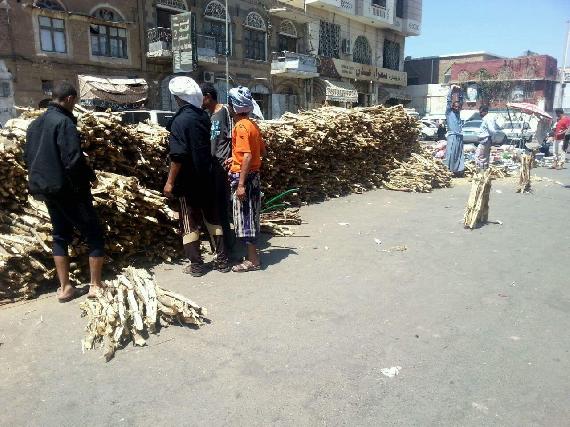
Firewood sold in the City, Oct. 2015 (Photographer: Husam Al-Ziyadi)
by Fareed Al-Homaid - Correspondent (Taiz), April 5, 2016
"I don't want to cut trees but there are no options. I can't afford buying a cooking gas cylinder for my family. Cutting trees is too bad for the environment beside it's a very tiring process", said Sami Ahmed, a resident of the besieged city of Taiz.
The besieged parts of Taiz are residential areas with very little green spaces. The siege made most of the families cut trees for cooking fuel. Women spend most of the day looking for trees in neighborhoods and public places.
Um Ahmed who lives with her small family in one of the besieged neighborhoods said that residents of the besieged city of Taiz live a very miserable life.
She continued, "I am sick of this. Many people including myself go out every morning to look for trees for cooking fuel. I spend three to four hours just to go home with some wood so I can cook for my kids. I only cook once a day. We barely have two meals a day. It's very tiring, time consuming and harmful process. Sometimes I get some luck and got helped to find and cut small trees or small branches of big trees by some young male neighbors but most of the time I do that only with my husband and kids."

Bin of Firewood cut from street trees in Taiz (Photographer: Fareed Al-Homaid)
The high price of the very few cooking gas cylinders ($30 to $60 a cylinder) that are smuggled into the city have made the bakeries and restaurants owners turn to wood for cooking fuel, as well.
According to Abdusalam, who has a restaurant downtown, buying wood to be used for cooking in the restaurant costs less than buying cooking gas cylinders.
"Restaurant and bakery owners find many difficulties keeping their business in the city. Most of the restaurants and bakeries of the city are closed.
Everything is too expensive. Wheat, corps, vegetables, and fruits are too expensive. What makes it worse is that most people are jobless and can afford to eat out or to buy cooked food from restaurants. The toughest part for us and for the people here is getting cooking gas. As you know it's expensive which made everybody turn to trees. It's very tiring and bad for the environment but it's cheaper”, Abdusalam said.

Larger tree from public place cut down for cooking.
The large number of young unemployed people in Taiz have lead some of them to cutting trees to sell them for bakery and restaurant owners as a job. They have cut almost all of the trees from neighborhoods and public places. Most of the trees, if not all, of the yards in public places like schools, hospitals, gardens and even backyards of houses have been cut.
Khalid Ahmed is one of the unemployed youths who cut trees to sell them. According to him, cutting trees is very bad but it's necessary in such circumstances.
He said, "I have no source of income. Before the ongoing conflict I used to work as a taxi driver and barely could make living but now I am jobless. When I knew that trees can be sold, I told my jobless friends and together started looking for trees in the neighborhood. Unfortunately, there are no green spaces in the city. Some of the guys cut trees from their own backyards and some broke into backyards of schools and hospitals and cut the trees there".
Some jobless young people cut trees but they don't sell them or use them. Saif Abdulgalil cuts trees with the help of some of his friends. He said that the cuts trees to help the innocent besieged civilians.
Saif continued, "We have agreed with an owner of a closed bakery to reopen his bakery and use it to help people by selling cheap bread. We volunteered to run the bakery by ourselves. We don't make any profit. That's why we cut trees. We use them to bake cheap bread for the people of two neighborhoods."

A Pile of Cut Wood from Trees in Public Places
Some helpless civilians had to cut street trees for cooking fuel. Most of the streets trees have been cut. According to Abdulla who lives in another besieged neighborhood, street trees are important for the environment but feeding his kids is more important.
He said, "I have to choose between watching my family starving or cut trees for fuel cooking. That's the reason I cut trees. Who to be blamed are those who besiege the city not the helpless and hungry innocent civilians. This madness must stop."
Local Activists say that this phenomena along with tons of garbage on the street of Taiz will certainly lead to an environmental disaster very soon. They think that the amount of trash on streets along with the smoke resulted from using wood for cooking have already caused health problems to the residents of the besieged city.
From Lebanon with Love: Volunteering in Bekaa Refugee Camp

Nicole with young Syrian refugee child (Photographer: Nicole Malmedé)
by Nicole Malmedé - Refugees Foundation e.V. Volunteer from Cologne, April 4, 2016
We have had an amazing time, learned, seen and experienced a lot about humanitarian work in Lebanon. As time comes we will answer all the questions you may have.
For now we just want to let you know that volunteers are urgently needed here. For at least a month or two, that would be best and no shorter than 2 - 3 weeks. If you're interested please contact me via PM. Arrival should always be planed for the first or the 15th of the month.
March 17th
Sophia and I had our first official "case". We were asked to bring 12 year old Omar, blind on one eye to the doctor to see if anything could be done to save the eyesight of his other eye.
He and his family are from Syria, they arrived in the Bekaa 3 years ago fleeing war in Syria. He had no medical treatment since.
We were hoping for his second eye to be saved, but the doctor told us, that his eye problems are most certainly due to a toxoplasmosis infection during pregnancy and it was/is lost irreparably.
Better nutrition may help Omar on the long term to walk more securely and make his live better.
Here in Lebanon we are cooperating with our partner organization Salam LADAC. Cases like Omar's is just one out of many, that's reported to Salam.

Omar and his family
March 19th
We have spent the day playing with the children of settlement #32. Brought them joy and happy memories.

Volunteers playing with young Syrian refugee children

A child's smile says more than 1000 words

Drawings of 2-6 year old Syrian children. They were either born in the settlement or arrived at a very young age.

No child should have such sad eyes!
March 20th
We distributed cake and flowers for mothers day to about 100 families living in apartments.

Volunteers distributing flowers and cake to moms
March 25th
We were called to a case in Baalbek by the vice mayor of Baalbek himself.
He had learned about a family in a very precarious situation through the TV just a few days before and hoped, that we could be of some sort of support for him.
We found this family in such an unbearable situation that we will not show or say anything more about them but instead show you some pictures of our visit of Baalbek.
We do believe that we will be able to help in some way. It is a Lebanese family with no small children, that's as much as I can say. It is and will always be our mission to help, when and where ever our help is needed. No color, religion or race matters.
If you want to know a bit more about Baalbek, click the following link:
https://en.m.wikipedia.org/wiki/Baalbek
March 28th
We had a blast painting children's faces at an event organized by Syrian volunteers.

A Syrian child with face painted
Taiz: An Open Market for Arms Trade

Bullets readily available for sale in arms market in Taiz (Photographer: Correspondent #14)
by Correspondent #14 - Correspondent (Taiz), April 2, 2016
There is no place that fancies weapons such as the Yemenis. They are fond with weapons. The number of weapons outnumbers the population of Yemen. From a cultural perspective, the weapons are considered pride in the tribal areas. It defines the social status for the weapon's holder, where the weapon is considered an important part of the major attire and outer appearance for each Yemeni. Weapons represents the most important decoration which men in Yemen decorated themselves , just as the women take their adornment of the kinds of ornaments and powders, where it is ranked first in the men's accessories . Also Yemenis also hold weapons in weddings and events. As a Yemeni sees in holding of a weapon, a manifestation of the decorations, he see in it a symbol of strength, heroism, honor and manhood and the weapons are considered a means to express joy or welcome by the guest. In weddings, and when the guest reached to bride's house, he has been greeted by fired the shots in the air to express joy and pleasure and with a weapon the Yemeni practiced his target shooting and hunting.
The weapon is linked to the Yemeni personality, which is in the hands of uniformed soldiers and other ordinary citizens. There is no type of weapons in Yemen you cannot get it. The war has made it easy for anyone to buy any type of weapons from well-known markets throughout cities in Yemen. You can also purchase weapons from any person or active dealer in the trading and sale of weapons, which resides near your home or neighborhood. Despite the blockade, imposed by the Saudi-led Alliance on Yemeni ports since the start of military operations which launched against Al-Houthi militia and their allies in March 2015, weapons smuggling to Yemen it is still continuing. Additionally, the incidences of robbery and looting of military camps and weapon warehouses have resulted in an increase of weapons trade and huge profits for traders, but threatens the present and the future of Yemen and world, especially with the absence of an effective government.

A silhouette of an armed Yemeni
An international report spoke that for a long time the possession of weapons by Yemenis was upwards of 60 million weapons, but local observers believe the current war dramatically increased the number of weapons among the citizens. The report ranked the Yemeni businessman Faris Mnna'a as one of the top ten arms dealers in the world, while the former Yemeni government , former President Saleh, put him at the top of the list of arms smugglers in Yemen. According to the Interior Ministry report, the number of crimes involving a firearm during the past three years, resulted in 42623 murdered or wounded.
Dreamy city 'Taiz' was known as the peace and culture capital and its citizens felt radiated by civilized behavior. Taiz was considered one of the most civilized and civilian cities in Yemen, where the weapon's possession phenomenon is least compared to other Yemeni governorates and cities, such as Sana'a and Marib. Taizian families were known by civilians for their awareness and cultures and they always take the peaceful path to resolve their problems, a far from of the use of weapons. In January 2015 the weapon's possession phenomenon was expected to disappear totally, especially after Taiz's local authority had issued a decision to cancel all weapons carry permits in the province, months before the outbreak of the war. But the situation has changed a lot with the outbreak of the conflict between forces loyal to Hadi and forces loyal to Saleh. The peaceful city became packed with many of the fighters who have all kinds of weapons.
Weapon's Trade becomes Vogue after the Start of the War
Abu Hani (not his real name) is weapon trader in Taiz. He began working in selling of weapons after the outbreak of the war in March 2015. He told us in his interview that, “I was fighting with one of the militias in rivalry with the authority when I decided to engage in the arms trade market after I had established relationships with leaders and people in the armed groups". Abu Hani can sell you any weapons despite the recent reign in this trade.
"It's easy for us to work as weapon traders under the conditions of war. There are no legal obstacles, no control on trade and possession of weapons after the collapse of country". This what Abu Feras (not his real name) said, who is another weapons trader in Taiz. He continued in his speech,"my business was limited to the sale of a limited types of weapons such as Russian and Chinese guns, pistols and some military supplies previous to the war, but with the war, I was able to provide different types of weapons, including Israeli machine guns and others like explosives. The weapon trader added, "the number of citizens and fighters who are wanting to buy arms dramatically increased in the period of war, despite the tenfold rise in the price of weapons. I've sold over the last half year (so far) thousands of pieces and I have made many gains despite the intense competition between weapons traders, and hundreds of new traders entering the market”.
We spoke with another weapons trader in Taiz, Abu Nagi (not his real name). He said, “This is not my real profession but since the war began I started working in the repair of some of the pieces of weapons and with the passage of time I am able to buy what is being offered to me and then I sell it and earn a profit.” He added, “Most of the weapons that I purchased are from fighters of both parties. The situation in Taiz is tragic and when fighter does not find food for his children or money to pay their rent of his home, he finds himself forced to selling his gun or mortgaging (loan) it. This was in the beginning of the months of the war, but after the discovery of leaders of fighters the order has been tightened on both sides and no longer the fighters are able to sell their weapons, because their fate will be prison and interrogated, but they still sell us the bullets. The value of bullets differs by country who made it. Chinese bullet are sold by 130 YR = $ 0.5, while Russian bullet price is more expensive than that. Citizens and fighters looted stores during the conflict and then sell them to us."
But Abu Nagi and other weapons traders on the black market will not reveal the identities of the main suppliers, which provides them with weapons, because of reasons to avoid problems that may occur if revealed the sources of their trade.
Weapons are Sold to Anybody Who Pays Highest Price
The weapons trade and possession is a phenomenon which has been roiling Yemen over the past decades, but this phenomenon is exacerbated and escalated in the shadow of this scary war and weapons have become accessible to everyone. This real dilemma will face Yemen and world.
When we asked Abu Nagi: to who he sells weapon? He replied that, “the weapons trade in Yemen is like any other business, and I do not distinguish between any of the warring groups. Anybody who pays money, I will sell to him any of the available pieces. He noted the weapons traders who funded me and provided weapons do not ask me or required the sales for a particular party.” Abu Nagi believes that the war has provided him with a commercial activity that is much better than it was the time before the war. He continued, “When I see the horror of war and the tragedies that occur daily due to infighting, I hope for an end of this war, albeit on my trade account."
Weapons trade in Yemen is active in the era of peace and in the era of the war and this is what is not available in most other countries.
Did Weapons Reached it’s True Intention
In beginning of war, especially in April 29, 2015, the Saudi-led coalition air dropped weapons in big boxes, destined for resistance forces loyal to the current president Hadi, to number of neighborhoods in Taiz, including Wadi Al-Qadi , Al-Ugynat, Seteen Street and others. But the weapons mostly reached the hands of citizens and Houthi militia fighters according to witnesses we spoke to whom saw the first landings of the air drops in Taiz. Abu Mohammed is a Taizian citizen. He said thta, “In the mid of night I felt the strong air and then I saw the plane in the sky. It dropped some boxes and a number of citizens and fighters set off to these places and began to collect those weapons that were inside the big boxes. What was said by the leadership of Saudi-led coalition, that there was an error in coordination between them and the leadership of the popular resistance, aligned with current president Hadi, in Taiz."
Abu Mohammed, who is one of the fighters in the popular resistance said, “It is natural that some errors occur in first landing of weapons. The weapons were small arms in the big boxes but poor coordination between the resistance and the coalition make it fall into the hands of citizens and Houthi militia fighters, but we avoided repeating that mistake in the following airdrop of weapons.
AQAP and ISIS Ghosts In North Yemen
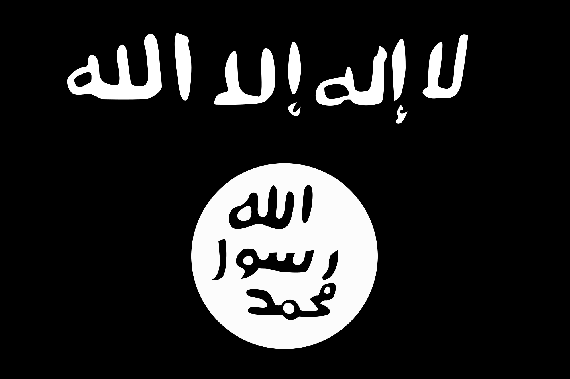
the Black Standard flag used by both AQAP and ISIS
by Husam Al-ziyadi - Correspondent (Sana'a), March 31, 2016
Once you enter Hadramout governorate and other northern Yemen’s governorates, you will find yourself surrounded by armed men and check points everywhere. Those armed men and their check points are considered al-Qaeda in the Peninsula (AQAP). According to some international estimates, AQAP may control upwards of 90% of the more rural (tribal) governorates.
After securing the north governorates, AQAP has been making attempts to take control of the second largest city, Aden, and until recently had check points in some neighborhoods and controlled the al-Mansoura residential district (editor’s note: the district, checkpoints and central prison where cleared by armed forces loyal to current president Hadi on March 30, 2016).
However, AQAP has achieved a total control of Hadramout. With disapproval of local civilians, AQAP spread their armed men in all governmental facilities and military’s facilities in absence of the military.
ISIS (Daesh), while not holding any significant towns or territory as AQAP, is now becoming more present with training camps and check points in the rural governorates. In addition, they have forced civilians to apply their sharia laws such as prohibiting education of girls, gender separation, forced women to cover their faces by veils, and punish those that are disobedient. ISIS also bombed old graveyards, churches, and ancient places in order to do the same as what happened by ISIS in Syria and Iraq.
During a year, the country’s collapse provided a vacuum for ISIS to expand in the area and conscript youth in the Abian governorate’s Gea’ar district . A source from Hadramout, who doesn’t want to use his name for safety reasons, said, “Youth have to be trained with using a weapon and enter their mind ever increasing some religious excessive thought."
He added, “they encouraged youth to fight, then they disengaged the youth from their friends and families by making them hate anyone outside the organization.” He continued, “the desire of killing increased by daily watching of jihad videos. After that, they would be ready for assassinations and suicide missions.”
President Hadi and his government are wanted by ISIS. They want them dead. ISIS targeted the Castle Hotel in Aden by missile on Tuesday 6th of October 2015. As Aden was a temporary capital city, they targeted the internationally recognized government by this attack killing 18 persons while the Prime Minister Bahah escaped from the assassination attempt, which was claimed by ISIS. On early morning of Sunday 6th December 2015, ISIS assassinated Aden’s governor the general Jaafer Mohammed and six of his guards by car bomb. Moreover, they committed many crimes against the leaders and officers of the popular resistance from the northern cities.
The most heinous attack was targeted at the retirement home run by Catholic nuns in Aden by ISIS. Armed men broke into the residence killing 16 people including four Indian nuns, two guards, and ten residents.
This attack is similar to al-Oradi Hospital attack in Sana’a on Thursday 5 December 2013 by AQAP. Twelve armed men broke into the hospital inside the Defense Ministry, along with a suicide car bomber. They gained entry into the Defense Ministry building by killing four guards, followed by a suicide car bombing. They proceeded directly to the hospital killing 56 civilians and 215 causalities. Those killed included two Germany doctors, two Vitamin nurses, one Indian nurse, and the rest were Yemeni doctors, nurses, patients and civilians. The twelve AQAP armed men were all killed in this attack.
Many other AQAP and ISIS operations have targeted headquarters of the presidency in Aden and of the Emirates Red Cross in order to drive the coalition and current government out of Aden. They consider the internationally recognized government and its allies as an occupying force.
The US continues its drone air attacks against AQAP, with a Feb. 4, 2016 drone strike in Shawba governorate killing six AQAP leaders, and another drone strike in Hadramout governorate on Match 22, 2016 against AQAP training camp, claiming 40 militants killed.
Where Yemen Stands Today (A Year of a Forgotten War)

Yazen, a young boy injured by Saudi airstrike on residential building where he lived, which killed his mother (Photographer: Ahmad Jumaa, Oct, 2015) .
by Andrew Martin (Seattle) - Staff, March 30, 2016
Famine
The UN estimates 82 percent of the population is now in desperate need of humanitarian aid. The World Food Program (WFP), cites 10 of the country's 22 provinces are classified as near or at the verge of famine (Mar 2016).
According to the WFP, estimated the number of people considered “food insecure” at 13 million, and the number of "severely food insecure (face near famine)" at 7 million.
The UNICEF report, "Childhood on the Brink" (Mar 29, 2016), warned that an estimated 320,000 children face life-threatening malnutrition.
UNICEF said that nearly 10,000 children under five may have died in the past year from preventable diseases, as a result of the decline in access to vaccines and other key health services.
"The scale of suffering in the country is staggering," UNICEF said in the report, and the violence "will have an impact for generations to come."
The UNICEF report described the distribution of food, fuel and other supplies that do make it into the country is difficult because trucks struggle to avoid battle zones, fear airstrikes or need to scrounge for gas.
Children Casualties
The UNICEF report, "Childhood on the Brink", reported 900 children have been killed and more than 1,300 wounded, with 61 percent of them in airstrikes.
"Children are paying the highest price for a conflict not of their making. They have been killed or maimed across the country and are no longer safe anywhere in Yemen. Even playing or sleeping has become dangerous," said Julien Harneis, UNICEF's representative in Yemen (Mar 29, 2016).
Displacement (Internal Refugees)
The UN estimates 2.3 million people have been driven from their homes. Strikes have destroyed civilian infrastructure, roads, bridges, schools, power / water stations, utility grids, factories, farms and schools.
Ahmed, 27 years old, told our reporters, "Perhaps we cannot come back to our homes. They are completely devastated. My father worked for years for building our house and they come to destroy it in moments. I went to check on it. I was scared of possible looting, but I found it completely destroyed.”
Devastation of Taiz
The human rights report issued by the Yemeni Group for Development and Reconstruction, said that the war and siege of Yemen’s 3rd largest city Taiz, since April / 2015, caused the destruction of 2158 facilities between public and private, in whole or in part, with the assessment not final.
According to witnesses who spoke to our reporters (Mar 2016), the areas Thabat, Aljehmlaiah, Kelabah, and Zahra (east of the city) , Alhsb and Al- Duhi (west of the city), have been largely destroyed, with private and public facilities are out of service.
Salem, 37 years old, said to our reporters, "the presence of Al-Houthi militia in Taiz was a tragedy. The siege put Taiz and its families in the event of unspeakable situations", further saying, "massive destruction, the Houthis have used all kinds of weapons against us. Electricity has been cut off from several months ago, as well as uninterrupted.”

Ahmad, local young man, outside of destroyed residential building in Daboa area, Taiz left uninhabitable by Houthi shelling (Photographer: Correspondent #14, March 2015)
On Feb. 4, 2016, the National Museum in Taiz was completely destroyed by fire after being shelled by the Houthi miltia. On May 12, 2015, a Saudi airstrike against Houthi artillery positions partially destroyed the UNSESCO heritage site al-Qahira Citadel on a hilltop overlooking the city.
The Belligerents (Combatants)
Al-Houthia (Muslim Shia minority) militia, assumed Iranian backing. Former President Saleh, along with loyal armed forces, including the Republication Guard (elite) aligned with the Houthi militia.
Current President Hadi, along with loyal armed forces. Saudi-led (Sunni Arab) coalition airstrikes, UAE ground troops and contract (Latin America) mercenaries, and Popular Resistance civilian militia aligned with Saleh. USA providing logistics and air tanker refueling, and UK arms supply.
Al-Qaeda of the Peninsula (AQAP) and Yemen branch of ISIS.
A Hopeless Dream in Yemen

Zain discussing his dwarfism condition with reporter (Photographer: Husam Al-ziyadi)
by Husam Al-ziyadi - Correspondent (Sana'a), March 28, 2016
The armed conflict in Yemen and the Saudi-led coalition is effectively dramatically increasing of the official authorities’ absence towards people with special needs. Zain Ali, a 21-year-old who suffers from dwarfism in Sana’a, Yemen, explains his own story. His hands are too short to hold anything and his disability prevents him from basic dreams such as studying, working, or even getting married.

Zain shows how dwarfism affects the size of his hands
“I am from a poor family and I used to get $50 (USD) every three months from social insurance, but since the war, the special needs authorities cannot offer essential life needs”, said Zain.
He added, “I am the oldest of my brothers and I need to find a job to help my father. I had hoped that I can complete my studying but students, teachers, and the majority of the community can’t accept me as I am.”
“Once I fell in love. I went to the girl’s house to propose. Then, her father asked a huge amount of money that would be impossible for me to offer, in order to send me politely away,” said Zain.
He also explained that he wished to have rights as any person in his age.While young people have friends to hang out with, he doesn’t have any!
He continued, “I didn’t find any financial or psychological help from anyone, and when I think of my future, some questions come up in my mind. Will I get a job? Will I get married ? Will I have kids? Will I be accepted in my society? Then the answers obviously appear when I look up to my mirror. The answer is just one- it is a hopeless dream”
In many countries, societies and governments take care of people with special needs. Dwarfs, as an example, have many rights, have many special treatment as well.
In addition, in Gulf countries, dwarfs have special schools, transportation, and government’s subsidies. They assist them in living in the community and help them participate in many social activities as possible as dwarfs can do.

Another picture of Zain
Hopelessly, he thinks if one day Yemen can be an accepting place that lets him and people with the same condition live as a normal person who has dreams to accomplish.
Dwarfism is a genetic or health condition that results in short stature. Dwarfism is generally defined as an adult height of 140 centimeters (4 foot, 7 inches) or less.
In Taiz: Wounded Joy After A Year Of War and Siege

Damage to Residential Building in Taiz from Shelling, Mortars and Sniper Fire (Photographer: Correspondent #14)
by Correspondent #14 - Correspondent (Taiz), March 25, 2016
The Yemeni province Taiz began to breathe again after a suffocating siege that lasted eleven months by the Al-Houthi militia and army forces loyal to the former President Saleh. Residents of Taiz province woke up on the news of success of the popular resistance (civilian militia) and army forces loyal to the President Hadi on Friday, March 11, 2016, of breaking the siege of Taiz, Yemen’s 3rd largest city, when they captured the western crossing into the city at Al-Duhi.
Government forces, with supporting airstrikes from the Saudi-led coalition, regained control of southern and western suburbs leading into the city and re-opened the roads which were closed by the Houthi militia for the previous eleven months. Army forces loyal to current president Hadi and the popular resistance forces managed to break the siege from the southwest entrance in the Al-Dabab area, which the Houthi militia had controlled. A military source said, "Our troops seized control entirely on Al-Dabab area, including the central prison, Saleh's gardens and other areas from the grip of Al-Houthi militia after a night of violent battles". The source explained that, "the troops partially broke the siege on Taiz, where the road became passable from center of Taiz, through Al-Dabab area, Al-Turbah area, along to the city of Aden, the provisional capital of Yemen.
Celebrations and Joy by Partially Breaking the Siege
The proclamation of liberation of Taiz city have bloomed hope and happiness of many Yemenis, especially the citizens of Taiz city, which they were besieged for nearly a year under the weight of the repercussions of the war. The situation changed totally in Taiz totally, because Taiz is a city which has very symbolic value on the national level. It was a big event to break the siege. It is rebuilding of the spirit that was racked by the war. The people of Taiz were not alone in celebrating the liberation of their city, as they shared the joy, with the people of the different cities and provinces of Yemen. Manifestations of joy had not disappeared completely. People were handing out sweets and cakes there and children wore feast fashions.
Ahmed Yousfi, a young man in his twenties, is from the Alhsb area of Taiz. Ahmed was displaced from Taiz with his family to the surrounding village since the war began. Most residents of his district were displaced also, especially those that were close to the demarcation lines with the Houthi. On March 11th, the situation changed for Ahmed. Amid a festive atmosphere, the Taizian young man said, "My joy is indescribable, I remembered myself when I was a child and wait for the feast in the morning, even the children around us happy because they will return to normal life, go to school and park and sleep safely".
Saida'a, an older woman in her seventies years, expressed big delight and chanting by prayers to the popular resistance. She was distributing sweets to children around her.
Taizian youths and men which were loyal to popular resistance did not hide their joy, they light fireworks in the night amid the dancing and singing to celebrate the breaking the siege.
The Markets are Crowded with Citizens and Foodstuffs
The life returned reiterated to the central market of Taiz. Residents of Taiz began to flock to the city's central market. Trucks of food, fruits and vegetables also began to gradually enter into the city, through the newly captured entrances, and we noticed the food prices were significantly reduced.
Mohammed, a 55 year old Taizian citizen, began his speech, "Thank for God. Thank for God.. We prayed a lot and raised our hands to pray and God responded to us. As you see, the market became crowded with people and food. Prices fall and soon will return as it was."
Waleed, a 21 years old Taizian citizen, told us, “Centeral market become crowded. All things you can be found at small prices, even aid you can find it in market. I bought this oil's carton for 4000 RY only.”
Detection of Fear and Destruction
The Al-Houthi militia left behind them considerable damage in the Yemeni city Taiz. Manifestations of the level of destruction could only be seen after Yemeni popular resistance and armed forces loyal to president Hadi managed to partially lift the siege, which stands out clearly the human suffering that was experienced by the people of the region during the siege.

Collapsed Residential Building from Shelling in Taiz
According to the human rights report issued by the Yemeni Group for Development and Reconstruction, said that the escalating war in the city of Taiz, in the center of Yemen, since April / 2015, caused the destruction of 2158 facilities between public and private, in whole or in part, with the assessment not final.
According to witnesses who spoke to us, the areas Thabat, Aljehmlaiah, Kelabah, and Zahra (east of the city) , Alhsb and Al- Duhi (west of the city), have been largely destroyed, with private and public facilities are out of service.
Salem, 37 years old, spoke to us, "the presence of Al-Houthi militia in Taiz was a tragedy. The siege put Taiz and its families in the event of unspeakable situations", as explained, further saying, "massive destruction, the Houthis have used all kinds of weapons against us". Electricity has been cut off from several months ago, as well as uninterrupted water constantly, and the food had to come to the city from the mountains and by primitive ways of smuggling, where the prices were very expensive.”
There are still clashes on the outskirts of the western areas of Taiz and Houthis trying to reclaim the areas they lost. Salem did not hide his fear of the restoration of these areas damaged by the Houthis and their attempts to lay siege again to Taiz. However, he does not hope so but in this moment he says, “I cannot return to my home. It is totally destroyed."
With the fear and sadness still gripping his thinking, Ahmed, 27 years old, told us, "Perhaps we cannot come back to our homes. They are completely devastated. My father worked for years for building our house and they come to destroy it in moments. I went to check on it. I was scared of possible looting, but I found it completely destroyed. We will need a great time to re-build and return to live in it."
The time was 5:36 PM while I was present to do interviews in the center of Jamal Street, when a rocket landed near the oil company. It has raised fear in the hearts of the citizens, which has been called. Ahmed made a sad laugh and added, “The war still exist and shells and rockets still fall on us suddenly. It is wreaking fear on our women and children and claiming the lives of innocent people. The fear still lives within us. We are afraid from of waking up and hearing Al-Houthi forces regain the control and tighten the siege on civilians or wake up to shells, rockets and loss of those who we love. There was no solution by violence. I hope all parties return to their senses and come together at the dialogue table."
Mohammed,38 years old, told us, “I lost my home, car and work. Everything became ashes and will not return. Citizens whom pay the price of war while the parties of conflict live in five star hotels.”

Typical scene in residential neighborhoods throughout Taiz of streets now strewn with ruble from damage done to surrounding buildings
Um Bra'a, mother of 3 children, told us about her suffering, “My children and I go to visit my mother. Suddenly my mobile phone rang and my neighbor told me that a shell fall on my house. I left my children with my mother and I went to get my important things and jewelry. When I reached my house the battle was heated and two more shells fell and heavy bullets were firing. I kept in the basement from five o'clock in the evening until six o'clock in the morning, and then I go out speeding from my house and did not take anything. My thinking was how I saved my life from certain death. Now, after eight months of leaving my house I return to it. It has become debris. I did not find anything. I lost my jewelry and precious things. Thank God for my children, mother and I are alive.”
It is now a daily scene known to the people of Taiz, with the forces of the national army and the Popular Resistance trying to advance further on the west side and lifting the siege on the eastern side of the city, held by the opposing Republican Guard, in the hope of lifting the siege completely on the city. Houthi forces are trying to retake areas lost and regain control of provisioning an embargo on Taiz, while the government makes territorial advances and is bringing in relief convoys after partially opening the siege on the city. Taizian citizens live in the hope of the end of the war.
Thula, Yemen - Life in a War Economy

People struggling to obtain water in Thula (Photographer: Sami Alzuhairi)
by Hisham Khalid - Correspondent (Sana'a), March 22, 2016
Some years ago, Yemen was in the track of development. People were busy with their jobs whether private business or government occupations. The majority were managing their lives. However, things changed. Companies are letting people go. Moreover, people, with private businesses, are barely keeping them working while many have had it worse. They have lost everything: their jobs, their homes, and for some their loved ones, while living in a state of armed conflict. Some were forced to move to a new city to start over. Others are trapped between armed conflicts and poverty. On the other hand, a few have found a way to keep living by establishing small businesses within a war economy.
Abdullah, a Yemeni citizen living in Sana'a, was a computer and networking technician. He had lost his job and was obliged to stay at home, after armed conflict started. However, that did not stop him from seeking methods to earn an income that could support his family.

Abdullah's Internet business: the controlling room, satellites and servers. (Photo courtesy of Abdullah)

Abdullah's Internet business: the controlling room. (Photo courtesy of Abdullah)
Mohammed is an electrician. He opened a small store and started fixing electronic devices. He worked for the ministry of tourism, too. Nowadays, he is jobless. He has nothing to do as long as there is neither electricity nor tourism.
He said, "I have a family to support. They need me, and I do not know what to do. We are only living under the mercy of time. We cannot guarantee the tomorrow."
Due to the lack of electricity, people stopped using the internet on a regular basis. Thus, making them seek a new way to access the internet, which led Abdullah towards a profitable new business in a war economy. He thought providing a constant internet access to the people around the neighborhood would produce a good income. He made his own network and created a stable income for him and his family.

Abdullah's Internet business: satellites and servers operated by the solar power. (Photo Courtesy of Abdullah)
Mohammed Algubari, another victim of unemployment due to war, had a good job as an executive manager of a private company for trading and services in Sana'a Airport Customs. He was fanatically satisfied; he could support his family composed of two sons, a wife and his parents. He said, "I used to work as a customs broker and customs statements typist, an expert in the field. We used to clear more than one hundred and twenty goods each day either imported or exported, but, now! Everything has changed. Once the Airport was targeted by Saudi-led coalition air strikes, work stopped, there were no more shipping flights, and I as well as my peers lost our sole source of income."

Mohammed Algubari, in his neighborhood, while selling some qat. (Photographer: Hisham Khalid)
He and his peers had to either flee back to their villages seeking tribal support and work on fields or establish their own private business.
Mohammed was obliged to manage his way earning a stable income. Selling qat (khat) was the only choice available, as he said to us. He goes in the morning every day to the main qat market to buy some and comes back selling them in his neighborhood.

Mohammed Algubari, in his neighborhood, while selling qat. (Photographer: Hisham Khalid)
Two months back, the Airport customs recommenced its function but with limited access.
Mohammed said that now, comparing to how the customs was working in the past, it only deals with no more than hundred statements either importing or exporting. He said, "The imported or the exported goods must be first checked in the Saudi Airport in Bishah. The imported goods are usually medicines and medical equipment, which belong to two giant medicine companies Ard Al-ganatain and Algabal. The goods that are exported are mostly fish."
However, most of the Yemeni citizens are unemployed nowadays. With the successive air strikes by the coalition and the stubbornness of the meaningless war between the pro-Hadi fighters and the Houthi Militia and their ally, the former Yemeni President Ali Abdullah Saleh, Yemen is descending into the moving sands of economic stagnancy, merciless poverty and more bloody deeds.
Traveling to one of the most historical and beautiful sites in the world is a main goal of any tourist around the world. However, if this beautifully stimulating site ended up being in a conflict zone, no one would risk it. Thula is one of five towns in Yemen on the UNESCO World Heritage Tentative list. Dating to the Himyarite period (110 BCE–525 CE), the town is very well preserved and includes traditional houses and mosques. Its people's lives relies mainly on tourism and handcrafted jewelry and traditional as well as historical masterpieces.

Thula City’s Great Fort (Photographer: by Haitham Khaled))

Thula city, five years ago, showing some pools with water. Taken from the top of the mountain. (Photographer: Haitham Khaled)
Mohammed Hasan, a Yemeni citizen living in Thula, said, "Most of the people here are living a miserable life! We used to have some tourists in our city, and that was in some way profitable enough to support a family. We had our own small tourist businesses. Some of us were handicraftsmen making jewelry out of silver and some precious stones then selling them to either local or foreign tourists."
Those people were obligated to close their stores since the beginning of the armed conflict in Yemen due to the absence of tourists. As a result, they have been gradually suffering until a year ago in which the suffering has increased to a point for many that it is unendurable.

People were obligated to close their stores since the beginning of the conflict (Photographer: Sami Alzuhairi)

More images of closed stores in Thula (Photographer: Sami Alzuhairi)

More images of closed stores in Thula (Photographer: Sami Alzuhairi)
Mohammed is an electrician. He opened a small store and started fixing electronic devices. He worked for the ministry of tourism, too. Nowadays, he is jobless. He has nothing to do as long as there is neither electricity nor tourism.
He said, "I have a family to support. They need me, and I do not know what to do. We are only living under the mercy of time. We cannot guarantee the tomorrow."

Mohammed Hasan's former store for fixing electronic devices (no longer operating). (Photo Courtesy of Mohammed Hasan)
Some families depend on farming. They rely mainly on rain to water their lands and crops. However, these days, lands are almost dry. No rain, no water!

People sharing water with farm animals (Photographer: Sami Alzuhairi)
The city has its own water collecting system with some water collecting channels drain carefully through the small city and lead to pools in the center. The need for water the locals and their crops have can be satisfied for up to four to five months. Thus, without rain, the city would suffer.

The city's water collecting pools are now dry (Photographer: Sami Alzuhairi)

Another view of the dried water collecting pools (Photographer: Sami Alzuhairi)
In the present, the pools are empty; people are queuing up for some water and walk distances to get to some wells. The people are struggling for obtaining only 20 liters of water each day, and sometimes they quarrel.

The people are struggling for abtaining only 20 liters of water each day (Photographer: Sami Alzuhairi)
Prices of food and fuels are too expensive that the average citizen cannot afford buying all that is needed. While the poor ones are obliged to settle, only, for some flour.
Mohammed said, “There are some generous rich people who help the poor, but that will not last for long.” He said that there is some humanitarian aid too, yet they do not reach to the truly afflicted ones, only to those who support the authority controlling the area.
Month following another, the situation in Yemen is being exacerbated by the stubbornness of the world inside and the ignorance of the world outside. Yemen, as its peers, is dramatically suffering from severe pain and discomfort. Its people had enough of the game being played; moreover, they feel that they are like no more than a number of characters in a tragic play with an open ending!
The Luxury of Celebrating Mother’s Day in Yemen

A Yemeni Child of Today
by Raghda Gamal - Correspondent (Doha), March 21, 2016
Since the mid-fifties of the last century; the Middle East’s countries have been celebrating Mother's Day on the 21st of March. Therefore, as the spring begins; we keep listening to the argument about the importance of this kind of celebration. Throughout those years, we used to hear the stereotypical point of view which believes that the Islamic religion praised mothers and encourages us to obey and respect them all year round, not only one day in a year! As if the others Muslims who celebrate this day don’t take care of their mothers except this one and only day!
With the start of the Arab Spring; everything changed and every one forgot about the above argumentative dialogue due to the fact that celebrating Mother’s Day or any other day become a luxury for people who ask for the simplest rights of a decent life, even for mothers who only want to keep their children alive, which could become their biggest gift they may receive this year.
It is said that there is no single word that could describe the particular feeling of a woman who has lost her child, because nothing else could feel the pain that a mother feels in such a tragedy!
I'm a new Yemeni mother living in relative safety; yet I feel some shame of celebrating this important day, while knowing that hundreds of other mothers and their children lost their lives by the violence of armed conflict that continues to this day across all of Yemen.
This year, Mother’s Day will pass on some of Yemeni’s mothers who lost their children on a daily basis, as a result of the war, or as recruitment as child fighters, whether under duress of abduction or under the desperation of money.
This day will pass on some Yemeni’s mothers whose stomachs are griped in hunger in an attempt to feed their children who lost their fathers due to the ongoing war for more than a year by now.
In Yemen, many young mothers find themselves confronted by their children’s questions about the reasons of the shells, rockets, the odor of fire and the daily funeral receptions which became in every neighborhood. Yet, the most difficult question they faced is about the causes of the death, which has been surrounding all Yemeni families.
In Sana'a, mothers used to justify the sounds of the missiles and explosions throughout the capital by the Saudi-led coalition as weddings’ fireworks which is how people in my country used to celebrate weddings. But this justification doesn’t convince the children anymore, because there is no wedding that lasts for more than a year causing them this panic they are suffering from every night!
In Taiz, mothers keep their children at homes due their fear of the Houthi militia shells that fall on all over densely populated neighborhoods; those shells who already took the lives of their husbands and sometimes even the lives of mothers themselves in a city where many mothers and children have been killed since the beginning of the siege there a few months ago. Besides that, Taiz suffered the blockade that forced mothers to send their sons to look for water which was deliberately cut off from their city.
Mothers all cross Yemen share the pain and suffering of every painful aspect that is caused by the war. Yemeni children must become responsible as adults along their mothers in search of food, that when found is sold at double price!
Mother’s Day passes this year on the Yemeni mother while she sees her children have grown up ahead of time, and her ultimate dream becomes to not see their lives end ahead of time whether from an artillery shell or a raid from the sky!
My mom is still in the city of Sana’a, occupied by the Houthi militia and under near daily bombardment by then Saudi-led coalition. When my mom and I wonder about the chance of meeting again in Sana’a, all what comes to my mind as a daughter and new mother is the poetry of Mahmoud Darwish when, he said:
“She says: When are we going to meet?
I say: After a year and a war
She says: When does the war end?
I say: When we meet!”
Happy Mother’s Day to you Mom, and to all great Yemeni mothers.
Taiz, Yemen: Journey of Getting Food into the Besieged City

Men with a donkey breaking the siege (cell phone image from citizen)
by Correspondent #14 - Correspondent (Taiz), March 10, 2016
This is what Taiz's citizens are experiencing while under siege. They are confronted by two options, where both of them compound their suffering during this war in our country since March 2015. The option of staying within the besieged city without the availability of the living necessities of food and drinking water or they will face their fate and risk their lives to bring the life's necessities by smuggling through Al- Duhi crossing in Taiz, which has become under the control of Al-Houthi militia and army forces loyal to the former President Saleh. The Al-Houthi militia and the pro-Saleh forces had closed all the city's crossings for nearly 11 months, (the eastern crossing: Hawban, the western crossings: Berbasha and Al-Duhi). They imposed on Taiz and its citizens a complete blockade and prevented the entry of food, water and medicines while subjecting the citizens to armed clashes in various areas of the city.
Amnesty International, on Feb. 9, 2016, reported “The Houthi armed group and forces allied to it are endangering the lives of thousands of civilians in the southern city of Ta’iz by blocking the entry of crucial medical supplies and food over the past three months, in blatant violation of international humanitarian law, said Amnesty International.”

Two of the biggest shopping malls "Al Saeed Center " & 26 street" , are closed today because of bombs (Photographer: Correspondent #14)
Results of a survey conducted by the UN’s World Food Program (WFP), in conjunction with the United Nations Children's Fund (UNICEF) in 2014, it noted that, there are more than 10 million Yemeni - or more than 40 per cent of the population - were already suffering from food insecurity. The survey found that nearly five million people are severely suffering from absence of food's security, and suffering from hunger to degree that entails a need of providing them with external food aid. This comprehensive survey of food insecurity, which is usually conducted every two years, also pointed out that acute malnutrition rates in Yemen had reached to danger level in most parts of the country. This is what the World Food Program had reported in 2014, before the onset of the war more than a year later.
The WFP now indicates “In Yemen, millions of people are on the brink of famine.”, and reports “Almost 13 million people in Yemen are food insecure. This includes more than six million people in desperate need of food assistance; that is one in five of the country’s population.”
This indicates that the statistics will be very scary after the outbreak of the Yemeni crisis and the continuing siege of Taiz by the Houthis and spells disaster for a city with a pre-war population of 600,000.
Al-Duhi is the Death Road in Taiz (Journey to get food from outside of Taiz)
Al-Duhi road is in the western crossing into Taiz and is the only crossing that Al-Houthi militia allows citizens and residents to cross through it from time to time . Al-Duhi road reveals the daily stories of the suffering of the besieged people of Taiz whom must move through the Houthi checkpoints, subjecting themselves to attacks, to bring food into the city. Voices of despair from Taiz's citizen are from the ill-treatment which they are exposed to, and the presence of snipers who prey on civilians in highlands in the vicinity of the Houthis's checkpoint.
Saeed, 26 years old, described to us his a journey to find food, “I buy food from Berbasha every three days. I go early in the morning to Al-Duhi crossing. Sometimes the Al-Houthi militia allowed us to go to Berbasha and sometimes stop us, all that depended on the mood of Al-Houthi militia. Often the Al-Houthi militia stop us from entering until noon and then open the Al-Duhi crossing. When we bought food and went to return to the city we stand in a long queue. The Al-Houthi militia authorized us to enter to city usually late after 6:00 pm and during the queue we are subjected to various insults, and kicked with rifle butts.
Qasm, 38 year old man, told us, "I buy my needs from Berbasha. A journey of bringing the food is disturbing. I go toward Berbasha in early morning (5:30 am) and stop at the Al-Houthi militia's checkpoint until they allowed us to enter into Berbasha and at return to the city the real suffering begins .They stop us from entering with natural gas or more than 3 kilos of any vegetables and fruits or anything. Some days they don't let us cross and after a waiting all day we have been forced to sleep on street or in a mosque to a second day.” Qasm added "we are being insulted and beaten with sticks or guns by militants from Al-Houthi and if someone tries to communicate with them they imprison and beat him. That is happened with me when I murmured and one of Al-Houthi overheard me. They hold me in private security room for two hours and investigated with me.”

An old man falls asleep beside a gas cylinder after he get tired from carrying it (cell phone image from citizen)
High Prices
The process of getting food for citizens of Taiz in the inner city is also another suffering. People who avoid the death road (Al-Duhi) – as many here call it, they suffer from incredible high of prices in inner city, which the city had not seen before the siege.
A resident of Taiz we spoke to said to us, "Taiz has seen over the past months, a big rise in food and natural gas prices, which is forcing Taizian families to be sufficient with at most two meals a day, only for their inability to buy food and household items."
Taiz's citizens, who preferred anonymity for fear of reprisals from militia, being detained in secret prisons or prevent them from entering food, said that, "Price of a kilo of tomatoes rise to 800 YR [$3.75 USD] (pre-crisis price 50-200 YR) and a bag of flour rose to 9000 YR [$42 USD] (pre-crisis price 4,000 YR), a kilo of potatoes rose to YR 700 [$3.25 USD] (pre-crisis price 200-400 YR), while the gas cylinder price reached to 13,000 YR [$USD] (pre-crisis price 1200-3000 YR), and fresh fish is not available for the first time from the markets of Taiz. The price ratio for many food stables has risen as much as 500%. Many citizens are calling for speeding up the liberation of city and lifting the blockade before even more of a humanitarian disaster occurs (editor’s note: USDA 2015 average price index: Roma Tomatoes: $2.75/kilo, Flour: $12.50/50lb bag, Potatoes: $1.25/kilo)
Abdullah is trader. He told us about his journey in how to enter different food items into the city. He said, "I go to Demnt Khadeer to buy what I want and then return to the city. My journey takes two days while in the past was taken only 3 hours. I pass by Samea directorate and then Alamaafr (Al-nashamah) directorate. My Journey continues to Habashi mountain then to Saber mountain (which are under the control of pro-Hadi army forces). In Saber mountain there is road that cars and buses cannot travel so we load the goods onto donkeys, as well as women and children carrying until we reach the Mashraa directorate and begin unload the goods and load them to cars.” He continued, "Rent of donkey is 1000 RY [$USD] per bag of wheat, along with rent of cars and workers, all that leads to the doubling of wheat prices. For example, we buy a bag of wheat from district center of Demnt Khadeer at 4500RY [$21 USD] and then is sold in the city of Taiz at 9000 RY [$42] and so on.”

Children carrying heavy goods and climbing mountains to break the siege (cell phone image from citizen)
Mahmood, 35 year old Taizian citizen, told us, "My family is small (5 people), but I lost my work and therefore I do not have the money to buy basic food.” He continued, “I walked into the market to buy what I could for 6,500 riyals [$30 USD] in my possession but I was surprised how far the prices had gone up, so I trimmed my family needs, limiting it to buying bread, rice and beans only.
Ismail is a 44 year old Taizian citizen. He supports his family composed of ten members and he is an officer and has a fixed monthly income, but his salary was getting smaller even before the price rise in food items.
Ibrahim S. is one of vendors. He said, "We know that the prices of goods may be high among poor families but the cost of these goods is also high and we profit very little.” He added the consumer is no longer the only one who suffers from high prices of vegetables. Vendors also face difficulties in providing good varieties of them. He emphasized, “that it increases the cost."
Insults, Humiliation and Beatings
On the western side of the city of Taiz, there is only one crossing to cross to and from the city in the Al-Duhi area, which is controlled by the Al-Houthi and pro-Saleh army forces.
They stop and at times prevent entry of all food and crossing by the citizens, where transit is subject to strict scrutiny from Al-Houthi militia with exercising varieties of insult and humiliation against them.
Transports vehicles which are carrying citizens who are wishing to return to their homes in center of Taiz have been stopped from militia's checkpoint in Al-Duhi crossing. They forces citizens to get out of the vehicles, subject them to inspection and careful examination of identity and bags, at times confiscating food, even if it is only enough food for one day. They are arresting anyone suspected by them while vehicles are stopped, and other times ordering their owners to turn around, preventing them from entering the city to do business.
The statements from citizens in transit don’t just report about abusive practices only, we heard a lot of stories that emphasize physical beating of those not following orders and instructions. They don't excluded women and children from it.
Bushra is a 40 year old Taizian citizen. She told us about scene that she saw with her own eyes when she came out of the Al-Duhi crossing of an insult to the civilians and women and said, "I saw a woman whom was pleading to the militia to enter with a gas cylinder, but they were screaming out and prevented her .. not enter Algaaaz". She continued, “then a Al-Houthi fighter pulled the woman away from the checkpoint, but the woman insisted on entering the gas cylinder so Al-Houthi fighter drop it to the ground and kicked her repeatedly in different parts of her body. My heart had grief for the suffering of woman, and bad situation in which we live."
Another group of citizens told us about a tragic scene. They said, "there was a woman carrying a gas cylinder. While she crossed Al-Duhi port, one of the Al-Houthi militants take his gun and fired on the woman. She fell to the ground and was covered with her blood. Citizens intervened and took her to hospital.” There are many similar cases.
Food not fit for Human Consumption
Mohamed is a young twenty year old man. We meet him standing along the side of the road, buying his goods. He was returning to his home with almost empty pockets, except for a few riyals after he bought some canned beans and sweet. It was the only place he could buy some types of canned food with little money.
The sale of canned food on the crossroads has become an inevitable phenomenon on the streets of Taiz, where hundreds of poor families rely on its income , but that warn of health disaster.
Dr. Mohammed talked to us about the canned food being sold on the streets. He said the canned food does not need special preservation, and the process of circulation in the market is normal, but the problem is in the way it is sold on the crossroads and in popular and public streets, where the food can become spoiled due to the high temperatures and exposure to sunlight with blankets or places to shade it.
Mohammed talked to us about the food which is canned in plastic materials and how the exposure to outdoor or direct sunlight, causes a change in the food product which can interact with the plastic material and alter the quality process for the production of food.
He also spoke about the greed of the owners of some of the factories in the absence of oversight, which led to a lack of commitment to the quality of materials and the use of harmful substances to produce some of the food, especially on the side of milk and its derivatives and he noted to signs of bad food as bulging cans.
Invitations
Young Salem initially declined talking with us, but then he spoke with us, "I will not tell of all our suffering, will not talk about the suffering of our children and our women, will not tell about the suffering of the elderly and what the war has done by us. But I will give invitations for six people to hosting them a one-day in my humble home. I will give invitation for King Salman, Saleh, Hadi, Obama, Putin and Khamenei. I just want to entertain them for one day to see and hear for themselves what has happened in Taiz. I'm quite confident that they will not be able to endure for more than a few minutes. They must leave us living in peace or go to hell.”
Sami, a 25 year old fighter, spoke to us. He said, “I do not like violence, but they have forced me to do that. If I do not take my weapon and go to receive my share of the aid by force, I will not be received anything and my children will die from starvation. It is not beneficial to be peaceful, you must belong to one of the armed parties to get your share of aid.”
Amera, a 30 year old woman, laughingly told us, “Where is the aid? The administrators must come down to the street and see with their own eyes how the aid is distributed, how it is stored and sold for millions of riyals to dealers . We do not want anything we want only a peace.”
With the continuance of the state of siege on the residents of Taiz, many of the affected citizens asked about the role of government and the Saudi-led coalition to take serious steps to lift the siege or mitigation for hundreds of thousands of people whose city has turned into a big prison due to the blockade applied by the Al-Houthi militia.
The besieged in Taiz complain about the lack of food, but they are trying to adapt to the current situation after the international community failed to deliver humanitarian aid to them and peace initiatives have failed to date. They are raising invitations to Allah (god of mankind) to protect them from the oppression of the people.
Hakim, a 75 year old elderly man talked in pain about the delivery of aid being praised about by international organizations or governments. He said, “Please, stop the aid. We do not benefit from it. The aid goes to fighters of the armed parties. We see the aid only in pictures of magazines, newspapers and television. A few days ago we read about the delivery of aid to the Directorate of Al-Qaherah and Al-Modafer for 3000 families, but I challenge them to form a commission of inquiry to know where the aid went. Before that, they announced aid for Al-Saqr club for 18000 families and when we were going to receive the aid, we found instructions from their leadership that the aid is not recognized for any families from our area. They asked the administrator of our area to give them 200 empty and sealed containers, but he refused, so they did not allow us to receive any aid yet. The aid does not reach to needy families but to fighters, whom use the war to make money from the aid.
Yemen Conflict: Surviving a Siege

Remnants of a mortar round from shelling in Al-Shamasi Hiltop neighborhood (Photographer: Fareed Al-Homaid)
by Fareed Al-Homaid - Correspondent (Taiz), March 4, 2016
"I still can't realize what happened. Though it has been more than two months now, I still can't believe they are gone forever", said Moneer Qasim.
Moneer's mother and his14 year-old nephew along with a third person were killed when one of the mortars, that Houthis and pro-Saleh forces shell residential areas with, hit one of the houses near their house as they were on their way home. In addition to those who were killed, two others were injured.
"We lost our mom and our nephew at once. I think you know how it feels like when you lose the ones you loved most."

Building that was hit by a mortar killing 3 people nearby including Moneer's mom and nephew.
Like many houses belonging to the residents of Al-Shamasi Hiltop neighborhood in the eastern part of besieged city of Taiz, Moneer's house was partly damaged by Houthi and pro-Saleh forces that shelled the neighborhood from their barracks at the Special Security Forces Camp, The Republican Palace, Al-Saeed Hotel, Al-Harair area and Al-Sallal hiltop. As a result, they moved to another house that belongs to their neighbor who fled to their village months ago.
"I just don't understand why do Houthi and pro-Saleh forces shell neighborhoods? They know that our neighborhood and the entire besieged city is full of civilians. If they want to target the Daesh as they describe the pro-Hadi government forces, they simply can do that at front lines. They shell the entire city claiming that they fight Daesh! Are more than three hundred thousand innocent besieged civilians Daesh members?”, said Nael Al-Qubati, one of the residents of the neighborhood who is now living alone. Nael's family fled to his village at the beginning of the war. Nael is a student of pharmacy at one of the private health schools in the city. He told us that he had to stay in the neighborhood to watch the remainder of their belongings in their house as it's difficult and costs a lot to take them out of the besieged parts of the city.
"Life here is awful. I don't know when this war will end. I am afraid this will not happen soon. Innocent civilians are caught up in the middle. Every day is a disaster to people here. Unlike the other cities of the country, people here are living in a huge cell. The entire city is paralyzed. No schools, no jobs, no food, no water, no medicine, no power, no fuel. Our college is closed. I don't understand seeing my future dream of being a successful pharmacist collapses before my eyes without being able to do anything about it. I have nothing to do but waiting. This unfair barbaric siege has to stop. I keep praying to God to stop this war so we can live in peace again." he added.

Damage done to residential apartment building from shelling in Al-Shamasi Hiltop neighborhood


Most of the civilian houses, shops, and government buildings that are located at or close to front lines are being directly shelled by the fighting parties. That doesn't mean that civilians who are living away from the front lines are safe. Houthi and pro-Saleh government forces shell the center of the besieged parts of city killing civilians everywhere while those who are living near to barracks, camps, checkpoints or weapon warehouses at the outskirts of the city, which are controlled by Houthi and pro-Saleh forces, are not safe from the coalition airstrikes.
Many of the houses that were damaged in the neighborhood belong to Yemeni migrants in Saudi Arabia and the US. They left Yemen years ago due to the unemployment and economic difficulties in the country. They spent many years away from their families just to be able to make living and to build a house for their families. In Yemen, to be able to build or buy a house for your family you must be a merchant, a businessman, a senior government official or a migrant. Those who have low-paying jobs with the government or the private sector could buy or build a house only if they have inherited money from relatives or if they are corrupt employees. The majority of the population here live in rental houses. This war took the life of some family members of some of these migrants. The lucky ones of them saw their houses damaged without casualties.

Views of another residential building damaged by shelling in Al-Shamasi Hiltop neighborhood


Mohammed Ali, one of the residents of the neighborhood told us that his father spent more than fifteen years in Saudi Arabia as a sales person in different shops there. The only thing his father could get out of this long time alone away from his family and homeland is just building a house for the family.
"Our house is partly damaged and most of our furniture is gone. My father suffered a lot to build this house. Who will make it up for us now? We are lucky that we left our house earlier or it could have been much worse." he sadly said.
What happens to civilians during wars is beyond description but the most horrible thing is to be killed in your house. In the current conflict in Yemen, entire families were killed under the rubles of their houses. Those who survive being shelled by Houthi and pro-Saleh forces, might be mistakenly bombed by the coalition airstrikes.

Views of another residential building damaged by shelling in Al-Shamasi Hiltop neighborhood


Anas Al-Bukali, 9 years old, was killed in his house right next to his mother, grandmother, grandfather and aunts when a mortar landed on the roof of the one-floor house they recently moved to. The mortar damaged a part of the roof killing Anas and injuring all of his relatives inside. His two aunts received serious wounds. It was a miracle they survived.
"We thought it would be much safer here. We moved from our house which is located exactly on the edge of the hill that faces the positions of Houthi and pro-Saleh forces. We were happy that the new house was only one floor and surrounded by higher buildings which makes it safer. It's really too difficult and tragic to be killed and hurt when you are displaced and when you think that you are safe." said Anas' uncle, Burhan Al-Bukali.

One-floor house that was hit by a mortar killing Anas Al-Bukali.
Burhan's family moved to another house within the same neighborhood for the second time. According to him moving to a safer place out of the besieged parts of the city is difficult and will cost them too much.

Unexploded mortar in the ground

Children showing us damage to their building where shell struck

Young child shows us rooftop damage from shrapnel and sniper fire
(editor's note: There are other houses that are more damaged but our writer could not reach them, due to active Houthi sniper fire in the area).
The Infrastructure in Taiz ... Indescribable Destruction

Tariq weeps outside of destroyed residential building in Taiz he had been living in. (Photographer: Correspondent #14)
by Correspondent #14 - Correspondent (Taiz), March 2, 2016
Eleven months of the conflict where its aftermath has destroyed our humanity, which has always been in the eye of this storm, as well as the civil and social infrastructure and service, productivity and extractive sectors. Even the Yemeni economy turned into a war economy, a priority in its need to provision basic materials.
Yemen, which had been called the happy country, is no longer the case today because of what it has seen from a war, with its duration approaching the end of a first year and a month and a few days. The time that has passed seems not sufficient to convince the parties of the conflict that it is a time to stop and listen to the sound of mind and peace. Negotiations of peace which were to be made in January 2016, has been postponed to an unspecified date. The lack of negotiation makes the door open for the continuation of a war which has claimed thousands of dead, wounded people and destroyed civilian infrastructure and private and public property .(editor’s note: the UN High Commissioner for Human Rights spokesperson Rupert Colville, on Jan 5, 2016, voiced particular concern at the situation in the central city of Taiz, scene of virtually uninterrupted violent clashes for more than eight months).
Dreamy Taiz "as its citizens like to describe it" has had a substantial share of this conflict. In recent months, the war has left the besieged city of Taiz with massive destruction of civilian infrastructure and residential areas, which has reduced the city backwards in time and capacitated it with economic burdens which will need decades to be able to overcome the effects according to experts and specialists. The shelling and bombing of neighborhoods and residential areas, with various types of heavy weapons, as well as fierce battles, has completely stricken large areas of Taiz into desolate areas. Some official estimates indicate that upwards of 75% of homes in Hawd Alashraf, Alhsb, Almnakh, and Berarh neighborhoods and Sixty Street are either fully devastated or uninhabitable which made the international recognized government, of current President Hadi, during the past few weeks declare Taiz as a stricken governorate, but this announcement was not followed by any formal steps on the ground to help the people of the city get out or mitigation of their plight.
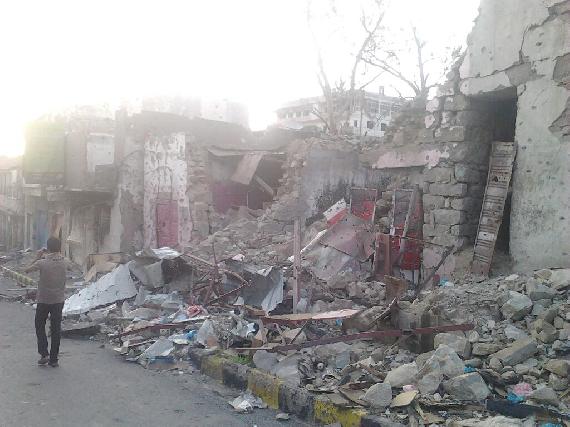
A destroyed residential block in Taiz
There are no accurate estimates for the damage. The Yemeni government is pressed hard to put an estimate on the size of the devastation in Taiz. Often it is based on its own resources, media and social networking sites. There is no precise documentation, or picture and details, but there is agreement that what happened and is happening in Taiz is a humanitarian and economic catastrophe by all conventional standards. Some unofficial sources estimated the total damage and losses to Yemen as a whole until the end of 2015 at $85 billion (USD). This number will not stop from rising as long as the blockade is applied and continuous armed conflict.
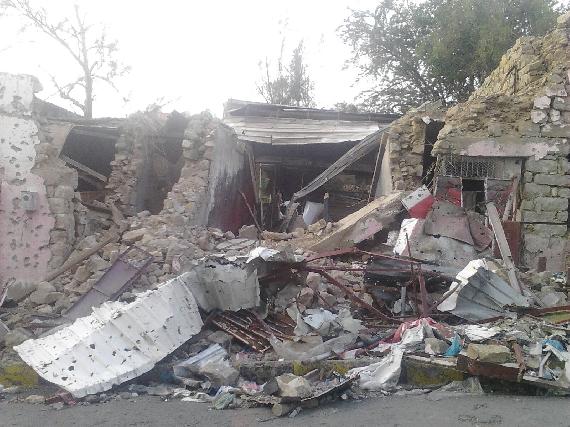
Residential homes destroyed in Taiz by shelling
The satellite application program, UNITAR, of the United Nations Institute for Training and Research published satellite images revealing the extent of damage to buildings and infrastructure in the cities most affected by the war, namely Sana'a, Aden, Taiz and Saada. UN Institute Bureau official in one of his statements said that, according to the analysis of the initial satellite images, they have identified, from the start of war in March to May 2015, at least 328 buildings destroyed in the city Taiz. In addition to public and private structures, also destroyed were markets, roads, bridges, schools in whole or in part and health centers. The UN official said 33 medical facilities in four cities have been identified as in danger of being hit, where within 100 meters there are buildings damaged or destroyed by bombing and fighting.
The International Committee of the Red Cross (ICRC) has also expressed deep concern about the fighting and indiscriminate shelling of residential neighborhoods in Taiz which is exposing civilian infrastructure to destruction.
It is difficult to get official statements about estimates of educational institutions which have been damaged or destroyed but some reports, such as one issued by the Houthi militia in the capital Sana’a, indicate that over 1634 schools were partially or fully destroyed, as well as 44 professional and technical institutes and six universities.
Salem is a teacher in one of the schools in east Taiz. He told us the public schools have turned into shelters or training camps for fighters. It is generally believed that more than 90% of the schools are no longer able to open their doors to students.
Dr.Fawzi worked in Taiz university. He said, “Some of the buildings in Taiz University have been exposed to artillery shelling from pro-Hadi government forces. It is still under the control of the Houthi militia and has become an arms cache. Private universities are also subjected to heavy losses in buildings and equipment."

Exterior damage from shelling to a secondary school in Taiz (Citizen cell photo)
T. Mohammed worked in a professional and technical institute in Taiz. He also talked about the stationing of Houthi militia fighters in three branches of professional and technical institute (Alhwban, Almror and Hayfan) of the Ministry of Technical Education and Vocational Training that led to the targeting by the Saudi-led coalition forces and the exposure of its contents to which are estimated at more than a million dollars for plunder and theft.
For athletes in Taiz there is only one club, Alsaqr. Most athletes were trained in it. Alsaqr club is in west of Taiz, but the club too was bombed in midst of the armed conflict.
With the continuation of the conflict, Yemeni Ministry of Health, a follower of the Houthi militia, issued statistics that show number of losses and human casualties and infrastructure. In the report, it says 110 hospitals were targeted, 232 health units, 2 oxygen factories and 61 car ambulances.
D / Yasser is a doctor in Al-Thawrah Hospital. He said, "I do not have accurate numbers but I think that more than 95 hospitals and health clinics in Taiz were closed either for reasons of violence or lack of oil derivatives and medicines."
Mohammed S. told us, "I had been injured in my hand by gunfire and I was transferred to Al-Thawra hospital. When I entered into the operating room, artillery shells fell. Everyone (patients and doctors) in hospital were afeard. Some people died. It was a panic day. I cannot forget it."
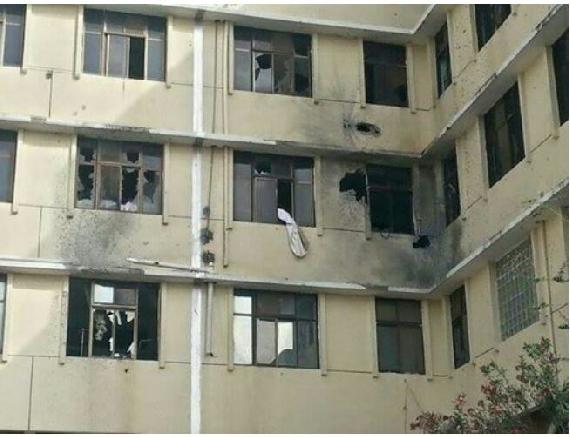
Exterior damage from shelling to a building in Al-Gomhore Hospital (Cell photo from Fatma)
The war in Taiz threw its repercussions on the trade, industry and private sectors. The private sector in Yemen contributed more than half of GDP, about 65% of total investments, according to official pre-war government statistics. Most of institutions and factories exposed to destruction, sabotage, theft, looting and extortion by armed groups which led to the flight of most of the capital outside Yemen and an exodus of national industries.
A fire at one of the factories in Alhsb area of western Taiz lasted four days, and residents and firefighters could not extinguish the fire because it occurred in the area of the clashes. The columns of smoke affected the residents of the surrounding areas, including children, and resulted in a rise in respiratory illnesses.

Smoke from a fire at a factory in Alhsb area of Taiz (Citizen cell photo)
In this context, a director of one of banks in Taiz, whom asked not to be named, told us, “We are exposed to threats, extortion and forced to pay protection money to the parties to protect our facilities or we are otherwise will be exposed to theft, looting or bombing”.
M.N was angry and he said, “the Samsung agency where in Gamal Street had been broken into and all its contents looted, although the region is under the control of the Popular Resistance. There is no difference between the two parties. All [armed] parties should leave away from us and let us live in safe and security.”
Muhammad is a worker in a well-known company in east of Taiz. He told us, “I present my company's card to the Houthi militia in order to allow us to cross and go to work and return to my home. The company's directors pay a sum of money to the parties and if they are late in paying, they prevent the workers from crossing the street to the company.
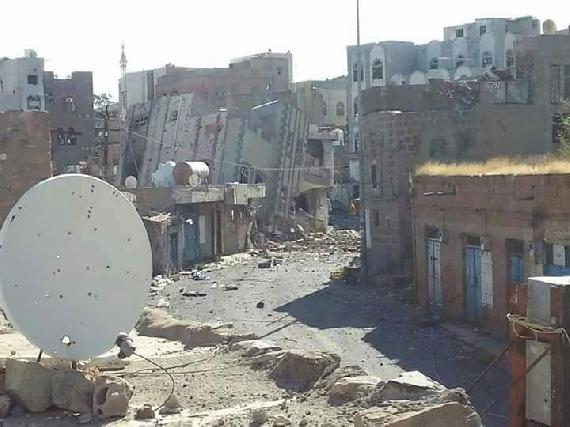
Damaged residential block with collapsed building on its side in Taiz
The statistics which were issued from the Road Maintenance Office cited the damage which occurred on the network of roads and bridges. It revealed 29 roads damaged (842 km) and 34 bridges were totally or partially destroyed. In addition to these damages, included damage to the headquarters of the General Corporation for Roads and Bridges and associated warehouses and equipment in various regions of Yemen, including Taiz.
The historic Al-Qahira Citadel (also known as Cairo Castle) is one Yemen’s prominent archaeological and historical landmarks. The citadel was bombed and substantially damaged from an airstrike by the Saudi-led coalition on May 12, 2015, and subsequent shelling.
:
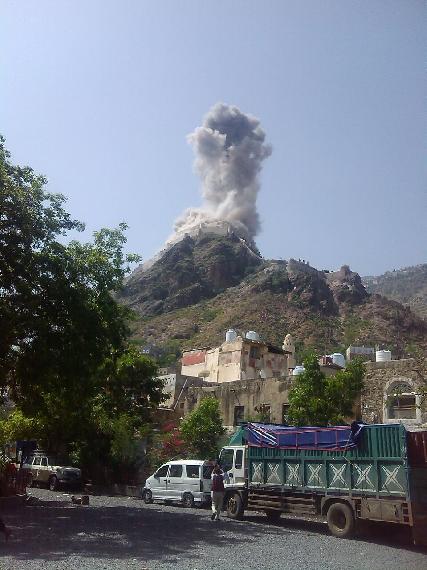
Image of the Bombing of Al-Qahira Citadel on May 12, 2015 in Mostashfa Alsowany area (Citizen cell photo)
Sawsun is an older woman, she said, “my house is next to Cairo's historic Citadel. When rockets and bombs fell on it, my house was shaking, window glass and door was damage and ground and emeries fell from the Citadel's mountain on our houses, damaging some houses."
The National Museum of Taiz was reduced to ashes after being shelled on January 30, 2016 by the Houthi Militia whom accused the Popular Resistance of using the museum to shelling Houthi positions.
The power plant was destroyed by the Houthi militia, so power supply for the governorate of Taiz stopped more than nine months ago, which resulted in cutting the water supply to residents of Taiz.
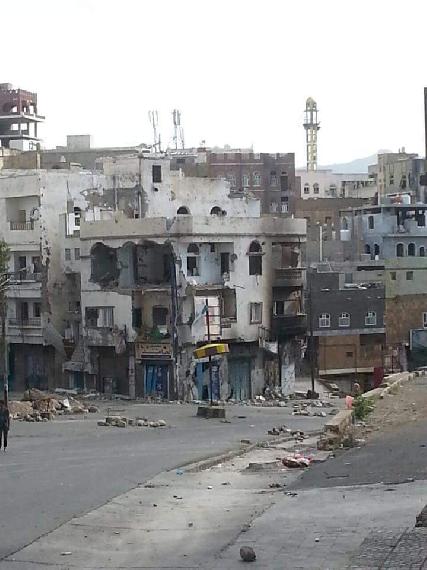
Mixed residential / commercial building destroyed in Taiz
Press reports said 2 million residents in the Taiz governorate were suffering from lack of water, while thousands of others in need of urgent medical care. According to the same reports, the 1.5 million residents in the governorate are suffering from food insecurity, with 13 million citizens suffering from the same problems in the country in general. Previous numbers are only part of a very moving suffocating crisis experienced by Taizian families in various fields which they are alone and trapped by the Houthi militia.
Kamel is one of the citizens of Taiz, He said, “There is cutting off electricity for all inhabitants and areas of Taiz, which will entail also water cuts for hundreds of thousands of Taizians. Water is a serious problem in Taiz. International and local organizations have published reports of mindboggling number of water tanks but it does not reach us. Kuwait Watering project which sponsored by the State of Kuwait, some people told us that they gave to our region 6 water tanks a day, but what we receive is one water tank on every 3 days. They told us to follow Kuwait office but no office here we do not know whom we complain to."
The Aldabab facility "Sdd Algblin", a state-owned natural gas facility, was targeted by shelling, which led to its complete destruction. A spokesperson declared that 65 thousand cylinders of cooking gas had been destroyed due to the fall of one of the shells which caused the outbreak of massive fires, explosions in the cylinder of cooking gas store and left a smoke cloud dense in the sky of Taiz. That led to a crisis and high price of cylinder gas to 600%.
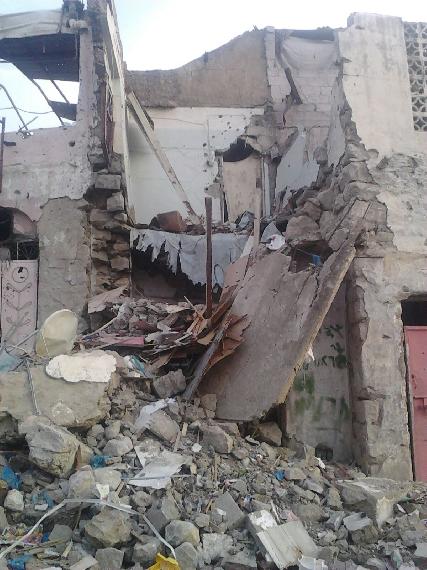
A residential home in Taiz destroyed by shelling
Ministry of Communications and Information Technology estimated the losses which the telecommunications industry has incurred by tens of billions [riyals], while the total number of targeted networks and communications towers rose to 190 towers and network connections in a number of governorates including Taiz.
Slama is a 50 year old woman. She talked being sad about her phone landline. “It was cut off for more than seven months. I cannot communicate with my relatives. My eldest son lives in Saudi and I can't hear his voice. I am sure my son calls to my telephone but the line was destroyed”, she said
Mohammed is one of active youths in the neighborhood. He said, "We need dozens of years to recover, after events of war have ended, which devastated neighborhoods in the city as uninhabitable at minimum, everything is destroyed, homes, schools, electricity and telecommunications networks, even the conscience of surviving was destroyed.”
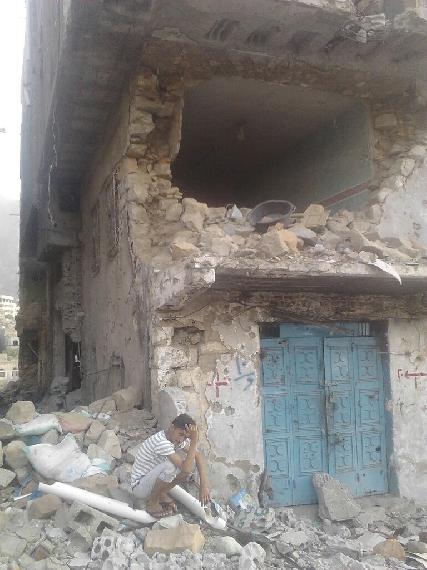
Ahmad outside of destroyed residential building in Daboa area, Taiz left uninhabitable by shelling
To talk about what a Yemeni crisis caused by destruction at the level of State institutions or at the level of personal properties, we will find ourselves in front of unimaginable numbers caused by the violence which made destruction to a level that only other countries' efforts could now rebuild the demolished. Also what if we consider that the conflict does not stop! We talk here about warplanes, missiles, shells, as well as a variety of other weapons used by all combatants of the conflict. I think the size of the losses has not reached its maximum. There is more than 70 percent of Taiz devastated along with dozens of giant enterprises.
Dreamy city (Taiz) is turned to home of epidemics and daily theater of death with the hands of the Houthi militia, Saudi-led coalition aerial bombardment and diseases are growing in force, amid official international silence, and amid a lack of an operational health sector in Taiz, which has forced many of the hospitals and health centers to close their doors, which means a worsening of the tragedy and opened the door wide to die daily due to these diseases and growing threat of spread of epidemics.
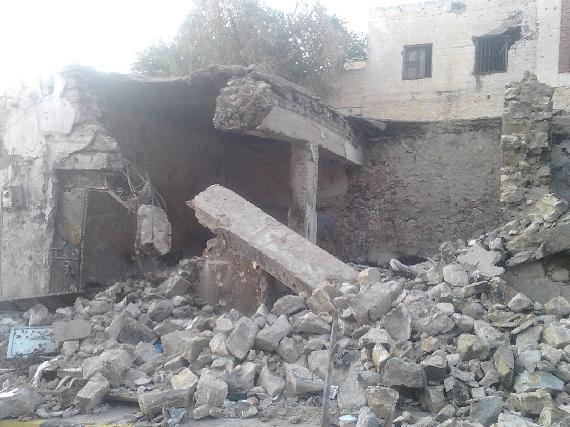
A residential home in Taiz demolished
Everyone should pay attention to Taiz, because they live the worst humanitarian crisis which was passed to them all, and the human numbers and reports are still in dire straits and onfolding in the largest Yemeni populated governorate.
The citizens of Taiz are simply awaiting their turn at death.

Taizian citizens walking through streets with blood soaked stains of those whom have perished before them in Daboa area
Yemeni reporters Trapped between Airstrikes and Abduction

Devastated house of a Yemeni reporter in Sana'a (Photographer: Ali Ibrahim Al-Moshiki)
by Ali Ibrahim Al-Moshiki - Correspondent (Sana'a), February 29, 2016
Yemeni reporters are currently living miserable lives due to the threats they face and violations against them by parties involved in the conflict in Yemen. Both the Saudi-led coalition and the Pro-Hadi civilian fighters on one side, and the Houthi Militia and their ally, the former Yemeni President Ali Abdullah Saleh, on the other side, have committed violations against journalists and the freedom of media and press.
Several Yemeni reporters have been either pulled from the rubble of their houses due to the coalition's airstrikes or abducted by the Houthis and pro-Saleh military forces. Those who survive have become determined to quit their job and succumb to hunger and poverty rather than being bombed or abducted.
Daily Life of Reporters in Sana'a
Saleh Abdulla, a 28-year-old freelance reporter in Sana'a, has received threats to be killed or abducted by both the Houthis and the Saudi-led coalition as a result of his job.
"Each party accuses me of betrayal. The Houthis accuses me of helping the coalition in Yemen and so does the coalition. I'm a reporter and my job is to tell people the truth. I don't work for any party but they would never believe such thing," he said.
Despite the threats he receives and the daily stories he hears about his colleagues, Abdulla is still in Sana'a writing news pieces and features about Yemen.
"Several of my colleagues have been either struck by the coalition's warplanes or abducted by the Houthis. About seven months ago, I left with my wife and two-year-old daughter to my village in the countryside in fear of their safety. However, a few months later, I decided to return to Sana'a and resume writing," he added.
Abdulla has taken precautionary measure to avoid being arrested by the Houthis, who are controlling the capital Sana'a currently.
"I stay all day at home and rarely go out to a market near my house and often, due to the lack of electricity, go to a nearby café to charge my cell phone and laptop. I also leave my smart cell phone at home because I have many contacts of both parties." he said.
Being a reporter, Abdulla is facing several problems in the neighborhood. His neighbors have requested him several times to leave and move to another house.
"I rented this house for $125 per month but the landlord and my neighbors demand that I leave because they are afraid that the airstrikes may target me or the Houthis may storm the house any moment. I can't leave because I have nowhere else to go," said Abdulla.
Reporters Shifting to Other Jobs
Ali Abdullah Sa'ad, a Yemeni reporter, quitted his job and left with his family to the countryside since the beginning of the conflict in Yemen. His life has completely changed since then.
"I'm a farmer now and I help my father in farming the lands here in my village. Although I get a scant amount of money, I'm satisfied because I would prefer to be a farmer rather than being bombed by the coalition or abducted by the Houthis," he added.
Journalists Killed by Coalition and Others Killed by the Houthis

Al-Hakemi and his wife (screen capture)
Muneer Al-Hakemi, his wife Suad Hujaira, and three kids have been all killed under the rubbles of their house.

The Al-Hakemi Family (screen capture)

Remanents of Remanents of the devastated house of Al-Hakemi
Al-Hakemi's relatives kept searching for a whole week until they found his body because the house was completely destroyed in a coalition's airstrike in Feb. 9th, 2016.

Funeral of Al-Hakemi family.
Al-Meqdad Mujali, a Yemeni reporter who reported extensively on humanitarian issues in Yemen, was also killed in an airstrike of the coalition in Jan. 17th, 2016.
Abdulla, Mujali's brother, said that Mujali was killed south of Sana'a while on duty.
"He went to Dhamar to report about an area that has been bombarded by the coalition but unfortunately the coalition launched new strikes and he was killed in that area," he added.
The Houthis have also abducted some reporters and killed some others in different governorates in Yemen.
Ahmed Al-Shaibani, a Yemeni reporter, was shot by the Houthis while covering the armed clashes in Taiz governorate, according to his family members.
In some cases, the Houthis and the coalition have been involved in killing Yemeni reporters.
Last May, the Houthis kidnapped the Yemeni reporters Yusuf Al-Aizary and Abdulla Al-Qabel in Dhamar governorate and kept them in a building that was targeted by the coalition airstrikes a few days later and both reporters were killed.
Since early 2015 to date, 15 reporters have been killed, including five who have been killed early 2016 by both the Houthis and the coalition.
Abduction, kidnapping and Torture
The abducted reporters are kept in secret jails of the Houthis. There are over 14 reporters in these jails and know body knows there whereabouts.
The Houthis have been regularly abducting reporters since last year. In its annual report of 2015, the Network of Media Freedom Defenders in the Arab World indicated that the Houthis have abducted 44 journalists in 2015 and some of them have been released.
Several journalists have sustained physical assaults in Sana'a and several other governorates since Jan. 2016 and they accused the Houthis.
Closure of the Yemeni Journalists Syndicate
Early February, a court in Sana'a issued an order to close the Yemeni Journalists Syndicate because, according to the order, the syndicate didn't pay the financial dues of some employees.

The Yemeni Journalists Syndicate
A source at the syndicate, requested to be anonymous in fear of his life, asserted that the Houthis have closed the syndicate through the judiciary system that is under their control. However, the Houthis deny this.
By the closure of the syndicate, Yemeni journalists lost their only resort despite its minor role in issuing statements of condemnation against the abduction or killing of any journalist.
Civilians Besieged in Taiz - Surviving Tanks, Shelling, Mortars and Machine Gun Fire

Car crushed by pro-Hadi operated military tank in Al-Shamasi neighborhood (Photographer: Fareed Al-Homaid)
by Fareed Al-Homaid - Correspondent (Taiz), February 26, 2016
Mortar Damage to Our Apartment
To be honest, before the current conflict in Yemen I didn't fully realize what sorrows and tragedies could wars’ cause. Civilians including myself have been through very tough and hard times. I have personally survived death several times. My family consists of my mother, father, younger brother and sister have been terrified as our small rental apartment located in the besieged part of the city was partly damaged when a mortar hit nearby killing two of our neighbors while we were having lunch inside. As a result we moved to a safer area but couldn't afford the high rent of the apartment there so we came back to our apartment only two months later.

Neighboring Apartment damaged by Mortar
Military Tank Crushes into our Apartment
Another tragedy happened to us as a military tank crushed into our apartment damaging one of our rooms. Fortunately, nobody was in that room then. I can't forget the way my mother cried and fainted when we saw a part of the tank in our room. Now we are living in an empty house. The house my family is living in now, belongs to our neighbor who along with his family fled to Saudi Arabia months ago. It's furnished and in a good condition.
Damage to Apartment from Tank
When our house was damaged our neighbor called my family and told them they can stay in his house. We are lucky to have such a kind neighbor. Actually, about 70 % of the houses in the besieged parts of the city are empty. In safer places out of the besieged parts of the city, many families share houses and many others are living in schools and empty houses and buildings. Very few people can afford to rent houses and get them furnished or stay in hotels.

Our attempt to close off the damage to the apartment using a large blanket
Many Killed
What happened to us is nothing compared to what happened and still happening to those who lost their beloved ones in this forgotten conflict. A number of my neighbors, friends, and fellow students were killed before my eyes. Crowded residential areas are being shelled on a daily basis. Many civilians in the besieged parts of the city don't have safe shelters out to flee to.
Shelling
Our neighborhood, Al-Shamasi hilltop, is located in the eastern part of the besieged city of Taiz, which is under the control of pro-Hadi government forces, and just few meters away from one of the hottest fighting fronts in the city. As its name suggests, it is a hill controlled by pro-Hadi fighters. It's opposite to the positions and barracks of Houthi fighters and pro-Saleh army in the Special Security Forces Camp, the Republican Palace, Al-Saeed Hotel (Sofitel), Yemen International Hospital and Al-Harair area.
All the aforementioned places are also located on hills. Houthis and pro-Saleh forces shell it almost every day using heavy and light machine guns, different types of mortars, and tank firing. The worst are mortars. Mortars kill still too many civilians all around the city. All the houses located on the edge of the hill are badly damaged, nobody lives there anymore. We are lucky as both our old and current houses are located on the edge of the hill - about ten to fifteen meters away.

Holding unexploded mortar that landed near us.
The Tank
The tank that crushed into our house first crushed a car then our house. Fortunately, nobody was hurt. The pro-Hadi fighters, who appeared to lack military experience, used it to fire at Houthi barracks in the aforementioned positions. The crew told us they lost control over it and crushed the house and the car. The military tank originally belonged to pro-Saleh forces but pro-Hadi fighters took over it in a battle against them earlier.

Car crushed by pro-Hadi operated military tank in our neighborhood
Based on what is happening in just one front, you can imagine the amount of damage and the number of casualties all over the city.

Street view of damage where we live
Now I fully realize the importance and value of peace. Actually, this war made me change my goals regarding my higher studies plans. Before the war I wanted to get the MBA but now I am eager to do the masters in Peace Studies, Conflict Resolution or international Relations. In the near future, I will do my best to get a scholarship to accomplish my goal.
USA/UK at odds with EU over Yemen Conflict

Air strike in Sana'a, Nov. 15, 2015 Ibrahem Qasim (CC BY-SA 4.0)
by Andrew Martin (Seattle) - Staff, February 25, 2016
Today, the EU parliament adopted a non-binding resolution for an arms embargo against Saudi Arabia over breaches of International Law over its air bombardment of Yemen. As reported by BBC News, the motion passed 602 to 212.
On the same day, Prime Minister David Cameron of the UK was described by The Guardian, ‘has [David Cameron] boasted of his efforts to help sell “brilliant things” such as Eurofighter Typhoons [to Saudi Arabia]', while talking to employees at factory visit in Preston at BAE, a UK arms manufacturer.

A Royal Saudi Air Force Typhoon fighter near Luqa - Malta International airport, December 9, 2010 (Gordon Zammit / GFDL 1.2)
On the same day, the AirForceTimes, widely read by current and former members of the US armed forces, reported,
Since beginning an air war against in Houthi rebels in Yemen last year, the Saudis and their allies have relied on U.S. tankers to refuel their aircraft in flight.
They quoted their conversation with US Air Force Major Timothy Smith, spokesperson for the Air Forces Central Command, as saying about US Airforce air tanker refueling support of the Saudi-led coalition air bombing campaign in Yemen,
"We've flown 709 sorties involving 3,720 receivers," Air Force Maj. Timothy Smith, spokesman for the command, said on Feb. 17. "And we've offloaded 26,591,200 pounds of fuel" to foreign aircraft, he said.

F-15C Eagles from the 67th Fighter Squadron at Kadena Air Base, Japan, are refueled by a KC-135R Stratotanker from the 909th Air Refueling Squadron during joint bilateral training with other U.S. forces and the Japan Air Self Defense Force Feb. 25, 2010. (Public Domain)
Back in March 25, 2015, as Saudi Arabia entered into the Yemen conflict, ABC News quotes US Whitehouse Press Secretary Josh Earnest,
“The White House does continue to believe that a successful counter-terrorism strategy is one that will build up the capacity of the central government to have local fighters on the ground to take the fight to extremists in their own country,” Earnest told reporters at the White House. “That is a template that has succeeded in mitigating the threat that we face from extremists in places like Yemen.”
On April 21, 2015, MSNBC quotes US President Obama saying to their reporter Chris Matthews,
“Right now their [Iran] ships are in international waters,” Obama said Tuesday in an interview with msnbc’s Chris Matthews, which aired in full on “Hardball.” “There’s a reason why we keep some of our ships in the Persian Gulf region and that is to make sure we maintain freedom of navigation. And what we’ve said to them is if there are weapons delivered to factions within Yemen that could threaten navigation, that’s a problem.”
On Oct. 27, 2015 the US publication Huntington Post reported, ‘The White House won't admit that the U.S. is even "in" Yemen.’
The official position of the Obama administration is that the US is not involved in Yemen, citing it has no troops, advisers or aircraft in the zone of conflict.
For Taiz's Children – The Siege Continues

Many children with adults getting water from water truck (Photographer: Correspondent #14)
by Correspondent #14 - Correspondent (Taiz), February 17, 2016
Children's Health
Many children die in sanitary facilities for lack of medicines and cutting off electricity. Vaccination programs are also starting to collapse and diseases that can be prevented - as paralysis of children - are reappearing and increasing the mortality of premature babies. The Supreme Medical Committee in Taiz confirmed that 148 children were killed by indiscriminate shelling of residential neighborhoods in Taiz, in addition to hundreds of injured who Taiz's hospitals in their current state are unable to handle their reception.
Mahmoud, 17 years old, is suffering from kidney failure which forced him and a lot of patients to leave city and travel to Sana'a after the hospital closed that had the last operating unit for dialysis. Mahmoud told us about his suffering with death more than once when he went to the hospital and along the way a mine, which Houthi militia planted it in road, exploded in one of the cars that were next to him and claimed the lives of three people.
Munira, 37 years old mother, expressed her fear of her second baby dying after her premature first baby died a few days ago. She has appealed to all compassionate hearts to care for premature babies and present aid to them.
Mohammed's mother told us story of suffering of her child of seven years of age. She said, "I admitted him to the hospital when he was suffering from asthma, but his health deteriorated because of a medical mistake of a volunteer.” She completed saying, “I do not blame volunteer. He tried to save my child whatever he can but I blame all doctors who left Taiz. I wonder where conscience of humanity and where human rights from crimes that occur every day."
Children's Education
A large number of schools are closed and some have become ammunition stores or training yards for fighters. This situation prompted people to open other places for their children's education. But it continues that large numbers of children do not go to study either for economic situations or security reasons.

Children and Families getting water from water truck
Mohammed , a 15 year old boy, said, "I and my family fled from our house through the bombing. There was not time to take my books and games. Instead, I learn to read and write, I learned names and types of weapons. I know types of bullets, guns and Katyusha, Ballistic and Toshka rockets."
Sami, a 9 year old boy, told us, "I was the first in our class but now I can't study my subjects. In the morning I go to school, in the afternoon I go to get water in long queue and in the evening there is no light and electricity cut off. I asked my father if he could buy us solar energy but he told me it's very expensive."

Reading by candlelight
Ahmed is an 8 year old boy we found playing in street. We asked him, “Why are you not going to school?” He replied that, "the school administrator gave students vacation until conditions improve because three shells landed near the school."
Fahad, a 14-year-old, was angry and sad. He talked with a school administrator and said, "He asked why is he not allowing students play in the arena? And why are we not doing the morning routine? The school administrator's told we fear form shells. It is better to stay in the classroom."
Ali S. is a father for 4 children. He justified his decision to not let his children to go to school by an incident which happened at the Zainab school. He said, "When a shell landed on it and caused dead and injury to children. He said in a whisper I am afraid to lose one of my children."
Samia is a teacher in one of Taiz's school. She said, "I struggle not to lose control of the children in classroom. I sometimes see signs of fear on their faces and sometimes children are crying and screaming when they hear sound of shells, anti-aircraft or fighter jets whose sounds penetrate the building."
Mohammad is an administrator of one of Taiz's school and father of five children. He talked to us about the suffering of children, lack of safe places and equipment. He said, "They are sitting on floor in a very cold season. Sometimes threats reach us to close school and some of shells landed near school so we forced to grant leave to students. I am very afraid from the armaments for children and young from both sides of the conflict. The consequences are going to be a very disastrous for the whole world."
Children's Games and a Culture of Violence
Taiz's childhood do not have anything. Childhood, distinguished with innocence and spontaneity, robbed of Taiz's children by the machines of war. A life of oppression, siege and hunger overshadowed to play and a fun life which must enjoyed by any child in world. For different plans, events of the real violence in province turn the fact that children are drawn with no hopes or dreams. Children make up groups which are fighting among themselves in plastic or wooden weapons. All their dreams abbreviated to kill their opponents than their peers both in their own way.
Rashid is 11 years old. He feels with joy when he kill his opponents with his phantom gun and feel with ecstatic victory against his friend or his brother who killed him. All of this is a hypothetical scenario to Rashid, as does to a majority of children in Taiz. Rashid's father said, "my child became liking violent and gladiatorial games with his friends. I read about its negative effects but I failed to persuade him, especially all children play. I do not know how I should respond. There is no psychologists specialize in cases of children to consult them."
Children's drawings are also not devoid of weapons, murder, and violence. This is what we saw in children's drawings at our visits to one of Taiz's schools.
Children's Work
The suffering of f children in besieged Taiz did not end. It has forced children to go into the labor market for a little money (Sometimes 100RY=0.46$ per day).

A boy gathering firewood from available brush
Khadija is 12 years old. She works in grazing sheep and lives in Al-hawgalh east of Taiz. She told us I can't go to school because, "I don't have 400 RY ($2 USD) to pay to school and I don't have big brother or sister so I must work to help my family."
Mohammed, a 15 year old boy, talked about his suffering from climbing bumpy and hard mountains. He told us, "I am carrying heavy merchandise upwards of 20 kg. I need the money to help my father to provide food and water. It is not necessary to complete my education. I have become a man and I must help my father. What did holders of doctoral degrees do? They did not benefit anything. Today they have lost their jobs and have no place to work."

A boy transporting merchandise in wheel barrow
Parents' Challenges in Dealing with their Children during Wars
There is difference between children who live in war and children who watched it. Children lost their childhood and increase their suffering. What did wars do in our children? And what we can do with them to decrease its negative effects? It is easy to talk about effects that afflict children from war either lived through or witnessed, but parents’ experiences with these children is a challenge for every family. It may be easy to say to parents: Do not let your children see scenes of death and destruction on news, but what can we say to those who live the experience for real? What is mother say to her children when their house trembled from bombardments, neighbor's house collapses and colleagues and friends of her children die? What was her answer for children's questions about them? It seem that living reality is more complicated than all the theories analysis and theorizing.
Mayyasa is mother of four children (4, 6, 8, and 9 years). She talked about her children: "When my children hear the sound of the air raids, I told to them that sound is of fireworks which are used during weddings, but this lie was short-lived. Children saw raids and hear it at the same time. Everyone in Taiz usually speaks only about war and destruction which hit Taiz. In the end I am forced to tell them what is going on despite their young age."
Maha is mother of 3 children (2, 4, and 5 years) said that: "wars have become in our times characterized by battles and brutal. Fighting rages in streets immediately and don't leave anything. The suffering of children from war does not stop when shells of death have stopped, but it continues to affect the children as they age. I suffer a lot from dealing with my children. I do not have enough experience. I wish from local and international organizations to help us, training us and providing psychological counselors."
Saeed is a father of nine children. He said that: "In these situations parents’ preoccupation does not become to protect the children from scenes of violence and death, but to protect them from death itself. I stop them from leaving the house, playing in the streets or go to school."
Ahmed is teacher and father of four children. He stressed that children get their abundant share, due to the blockade, in its negative image on health, social and psychological situation. He pointed out that they aren't able to perform school and family duties. He told us, "The aches began to invade their bodies. I noted low energy of children because of malnutrition. The suffering of children from the blockade does not stop at this limit. Fear, anxiety, tension signs and sleep, study and behavioral problems appear on children's faces. The ratio of students' absenteeism from school seats increase because of the harsh blockade, while a large number of students are suffering from problems in focusing during study. I appeal to implement researches to determine size of those tragedies and to urgently find solutions to them before they worsen and turn into a humanitarian catastrophe which will bear its results to the world."
Mohammad, a school administrators at one of the schools we visited and father of five children told us, "This was a devastating year for millions of children. Children were killed when they studied in school or they slept on their beds. The war and conflicts in Taiz's besieged for 10 months, left pains of all innocent children. They need for special assistance to help them to emotional discharge, and make them aware of what happened to them during war which will impact them with trauma. We need to keep up scientific development with regard to the latest theories of psychological and behavioral therapy in order to reduce the effort and time needed to feel."
Dr. Nadia who is a mother of two children said that, "the physical and psychological effects of violence on the children cannot be under described. We saw children killed, injured, maimed and burned, as we see them suffer panic that fills their body. The results of violence in this time is much deeper. We need to unite everyone, especially international and local organizations to do studies, researches and find solutions."
Salah works at one of the local aid organizations. We asked him about the organization's role and responsibilities towards children? He talked about the current situation for most organizations, "Most organizations abandoned the goals they established for themselves. They changed their activities towards succor and food aids, which is distributed unfairly and according to unclear criteria. The neutral organizations suffer from disorder and conflict in the governorate. Most of them lost their headquarters and equipment and are working with scarce resources." Salah added, "the neutral organizations refused to join any party which impacts their ability to complete their projects and activities.” He stressed, “they are doing their best to implement psychological support for children and support youth programs and are in process of searching for international partnerships to start."
The children of Taiz are facing a very grim future because of shocks they face. What happened to the loud cry that would awaken the conscience of the world and feelings of shame about the silence of the crimes against children, remain several important questions arise in this context, namely: What about this children’s generation, which are collectively punished? And how will their relationship with the outside society evolve when they become young men and Industries of the resolution in their community? How will they look at the world, whom abandoned them and their vital needs and isolated?
Taiz's Children Under Siege

Women and children collecting water from a water station (Photographer: Correspondent #14)
by Correspondent #14 - Correspondent (Taiz), February 9
The conflict in Yemen has created physical and psychological damage for the children of Yemen. These children have witnessed awful events which can't be described. They are struggling to forget them. Shells from Houthi militia artillery and missiles from Saudi-led airstrikes have destroyed their homes, communities, schools and they have killed their friends and family members, sometimes in front of their eyes, as the two opposing sides engage heavy weaponry for control of Taiz. A large proportion of the children have been affected directly by acts of violence and they are deprived of their most basic rights which are enjoyed by their peers in other countries. They are suffering from bad living and security situation, psychological conditions, hygienic diseases, do not have access to clean drinking water, and sometimes they are working to get some money to support their families. This is a dark legacy that will effect several generations.
Children from all ages, ranging from babies to teenagers continue to be exposed to a wide number of risks and suffering, some of which is hard to imagine. When you look at children in Taiz, you'll see the fear and panic in their eyes and you will listen to conversations and stories of death and destruction and you will find thoughts which the war has distorted them. You will not see innocent dreams for any child. Children in Taiz, although they appear strong and adaptable, they remain more vulnerable than adults. The weight of one of the most violent armed conflicts in the world put on their small shoulders, crushing their childhood and inflicting psychological scars that might never heal. Taiz's children find their life has become more hard; hard life which dissipated their dreams and lives slowly, instead of enjoying by expanding their horizons. They are trapped in a virtual prison.

Women and children collecting water from a water station
According to UNICEF statement in November of last year, more than half a million children under five years of age in Yemen are suffering, "from acute malnutrition threatens their lives" because of the difficulties in supplying and sending humanitarian aid to Yemen. UNICEF stated that the effects of violence against innocent civilians cannot continue further. Children make up over half of the internally displaced people in the conflict who number 2.3 million people, and half of the 19 million people struggling daily to get their rations of water. About 1.3 million children under the age of five are also at risk of acute malnutrition and respiratory infections, and about 2 million children are out of school.
What do we see from children whom find their parents have become tatters, and their homes has become a desolation? What do we see from those innocent children? And what they felt after seeing their family die of hunger and thirst, and their neighbors from shells and missiles? What is their feeling on their minds and souls when a massive bomb explosion is detonated, and quaked and demolished their houses? What is their sense when they hear sounds of planes which go through the sound barrier? What is the effect of all this on them and what is size of their reactions after they became homeless, lost people, no food, no school, no game, no football, and no book and after the war destroyed all a little dreams, ran over all their ideas about life, and remained the stench of death and blood?! Many questions we try to answer them through our interviews with children, parents, teachers and others interested in protecting children.

Women and children queued up for water

Women and children filling water jugs from water distribution truck
Artillery and Missiles
The sound of shells and planes is deafening to the ears and terrorizes their hearts, as scenes of death and destruction are renewed before their eyes every day. This is what is suffered by children in Taiz, while other children of the world watch television. The unified pain became conversation of each family and child in Taiz.
The children in Taiz are on the front line of this conflict and are able to account for their own stories and talk about details of their tragedies they live. We talked to several of these children around Taiz.
Mohammed, a 13 year old boy, describes Taiz, saying, "we sleep and wake up to the sounds of rockets, artillery bombardment and screams of women and men to rescue injured people."
Salem, a 10 year old boy, is talked to us about the sounds of missiles and planes. “They scared me. I can't sleep. When I hear them at night I cry and ask my mother to sleep with me. When they start bombing, we hid in the downstairs of the house. My mother told us that the sound was a wedding at our neighbors, but we grew up and we know it's war, a sound was very scary when some shells fell in our neighbors’ houses. My younger sister cried a lot and urinate without feeling . I could hear the screams of women and men and I saw the devastation of houses."
Rami, a 12 year old boy, told us how he was screamed when he saw a scene of an assassination in front of him and how the killer killed the victim, where the killer was riding a motorbike. "I throw my body on the ground and screamed and cried. Blood was everywhere. One of cadger pulled up me behind a wall and saved my life. When killer was fled, I saw a man bloodstained and the woman who saved my life was hit by a gunshot wound in the leg. I remembered everything and I can't sleep now in the dark."
We heard the story from a mother of Ibrahim, a child of three years, no less heinous than those suffered by any child of the children who seen and lived events of a conflict in Taiz. When a person listens to the details of what happened in words of his mother, one wonders how Ibrahim was spared and escaped with his life and continued to wait for 5 hours beside his father's boby after being hit by shrapnel from a missile strike, when his father and the child were passing through car in Kalabah Street. Families and paramedics could not save the father’s life because of violent clashes and contented themselves to watching Ibrahim and his father in midst of armed conflict. Ibrahim cried and tried to wake his father. The situation continued until nine o'clock in evening until some of fighters, who are still in their hearts, something of a mercy decided to form military force and could grab Ibrahim and his father's and took them to hospital. But his father bled a lot and died. Ibrahim's mother described to about fear and horror on Ibrahim when he is looking for his father in home, crying a lot and no longer able to speak.
A mother of a seven year old child where living in west of Taiz. She said, "My daughter was running into the house, crying and covering her ears with her hands whenever she heard a plane – ‘Camp 35’, where in west of the city is controlled by Houthi, and they launch missiles from it so it subjected to aerial bombardment, which effects children of the neighboring regions and which do not find money and place to move to a safe place."
Many parents agreed that the war in Taiz had a lasting impact on their children, including sleep disorders , injury and horrific memories as well as urination during sleep and cause problems to speak. Death and horror has become the permanent story every day until they are children without a childhood. Parents are trying in vain attempts to mitigate the impact of this armed conflict on their children.
Food, water, baby milk
The suffering of Taizian families with children are continuing with high milk prices and lack of availability during times, expose children to many dangers of negative effects on formation of bones, autoimmune system and malnutrition.

Early morning - a water truck prepares for distribution

A water truck distributing water
Baby Shihab's mother strives to provide milk for him although their bad living situation does not permit her to buy milk for her baby. She said that, “His father lost his job 6 months ago after the facility where he worked closed. A milk bag (500 grams) lasts enough for 3-5 days and the cost is very high, ranging between $3.5 to $5 (USD).
Hinda is mother of five children, with the oldest 12 years old. She said to us, "I have to keep my four older children from drinking the milk, so I can give it to their small sister whom is one year and a half years old. I am understanding that all my children need it, but I can't buy for all them after losing my job nine months ago. We do not suffer only from price and lack of milk, we also suffer from buying fruits and vegetables. It is considered a luxury of living in Taiz, if you buy some fruit or chicken. We suffice by rice and some types of beans."
Sami is a shop owner who sells food. We talked to him about the price of milk. He said it was between $6.5 - $8 USD per kilogram, and a baby needs at least 4-6 cans of milk per months. He believes that buying milk decreased to approximately 65% compared to previous periods. He said, "I think that because a city is under siege prices are rising.” Sami talked about their suffering in food entering into the city, including milk and chicken, “We bring food over rough terrain above camels , donkeys and sometimes children."
Dr. Amani, pediatrician confirmed that malnutrition among children in Taiz is increasing dramatically, due to high cost of living, loss of jobs and blockade on the city imposed by the Houthi militia. The siege dramatically reduces the purchasing rates among Taizian families, so less consumption of protein, as well as for milk shortages and iron, which in turn affects the health of children.
On the other hand, and despite the announcement by MSF (Doctors without Borders) that medical aid being delivered for the first time to the city of Taiz, which suffers from the disastrous humanitarian situation, the aid came by two landings of medical supplies and medicines by the Arab-led coalition.
However, the Supreme Medical Committee in Taiz had to continue to request from the King Salman Center and international aid organizations the need to provide infant formula because it does not exist in the market .
Water is the other real suffering for children, whom at times fight each other to get it. They stand in long lines to get small amounts of water.

Several families obtaining water from distribution point
Activists on social networking sites published a picture of children on Sunday, January 31 . The children were accompanied by a number of stray dogs and shows children in a Taiz's street. The children and the stray dogs share the water that they drink. This is another image of the city under siege imposed by the Houthi militia.

Children sharing water with stray dog
Taiz Under Siege

Children attending an improvised school in Taiz (Photographer: Correspondent #14)
by Correspondent #14 - Correspondent (Taiz), January 30, 2016
Killing, destruction, bombardment, running out of medicines and oxygen tanks, accumulation of waste, the spread of diseases and epidemics, disappearances, severe food shortages, rising prices, cut off from electricity, oil and natural gas shortages, bands of mass exodus, roads cut across by checkpoints, and the near complete disappearance of public services... a disaster greater than can be described with these words in the province of Taiz. Every patch of territory has seen heavy fighting and civilians continue to suffer from the scourge of conflict and the silence of the international community.
Taiz, which is the most densely populated, now suffers from fear, hunger, siege, continuously since August when the Houthi militia laid siege to the city of Taiz, 2nd largest city in Yemen, after it was captured by government forces loyal to President Hadi and Saudi-led Arab coalition. For civilians, it is hard to find a secure and safe place in the province. Taiz will be a living testament about the tragedies and massacres committed against unarmed (non-combatants) civilians, children and women. It is hard to move from one place to another and not be aware of the brutal ugliness of the conflict that was once the province which had inner peace and culture.
In Taiz the humanitarian condition is in terrible deterioration, because of the continued violence, conflicts and on the continued regional and international silence. Much of the residential housing, medical facilities and other civilian infrastructure is exposed to continuous and indiscriminate shells and Katyusha rockets, which has killed thousands of them women and children, and left thousands of wounded (editor’s note: UNICEF representative in Yemen was quoted on January 23 saying; ‘about 1,900 children were either killed or injured since the conflict began, with most of the current deaths in the provinces of Taiz and in Saada’).
Most of Taiz hospitals are closed, due to lack of medicines and oil derivatives. There are four hospitals that remain open out of 60 hospitals in the province. Two of the four open hospitals refuse reception of injured civilians because one of them is for Houthis militia and the other one forces loyal to Hadi and they only received their fighters.
Cutting off electricity has also affected all walks of life and have had a significant impact on the local economic, where an estimated 90% of stores, factories and other commercial entities have their doors shut. I is believed that more than 85% of workers have lost their jobs and they are living in a difficult living situation. The continuation in cutting off electricity is prompting some families and commercial facilities to resort to the use of solar energy. Some traders are exploiting the proliferation of solar energy trade and the price of solar panels has increased upwards of tenfold.

Roof top solar panels in Taiz
The lack of natural gas, used for cooking, has forced a lot of people into indiscriminate logging which has led to disappearance of perennial trees which threatens a potential environmental disaster.

Another view of solar panels on roofs in Taiz
A huge problem, it is believed that approximately 70% of the city's population has been displaced from their houses and become guest on host families in the countryside which consider the area safest from the conflict, with upwards of 30 people living per home. The situation has become harsher after the conflict extended into the rural areas, where people find themselves unable to find secured places to save their souls from death. Many Taizian families find themselves in continuous movement from one area to another.
A lot of waste mountains have accumulated. The Houthi militia does not bemoan the case of the residents of the city and have tightened its siege on the remainder of the city. The waste situation threatens environmental and health disaster, which has already resulted in the spread of dengue fever, killing dozens of people, including women and children. Fears and appeals have been launched by doctors of fear of the spread of epidemics, especially cholera.
Furthermore, education is not immune to the conflict. Most schools are closed and being used as the stores of guns and training yards for fighters, which has prompted the parents of children, after waiting for more than 8 months, to open their homes, mosques and public yards as alternative locations to teach the children. Although of the absence of essential school equipment, school supplies, less teachers, cold of weather, sounds of missiles and pumps, daily death of civilians, students resist all problems and try to continue their education.


Images of excited children in an improvised school
The only government university in Taiz has closed its door because of the violence. The president of the university recommended students to transfer to another city but most of students could not travel to continue their courses because they don't have money and it is dangerous to travel from place to another.
The rainy season this year was carrying more humanism than the combatants. It was the first to take the initiative to help the affected and needy people before any party or organization. The water of the rain was not pure, but the helpless was forced to use it because it was better than nothing or die from thirst. The conflict is longer than the rainy season, so it left city but promising Taizian families to return next year. People were finding themselves living adventures and tales of their struggle to get water.
When you moved from one area to another you will see the long queues for getting water. Women and children are standing for long hours amid the scorching sun to get a quantity of water, sometimes they get not more than 60 liters per household and some come back empty-handed.
In a time that the world is talking about humanitarian aid to Taiz, the reality of displaced, afflicted and needy persons discloses the fact that much of the aid is diverted away from the targeted assistance. Instead, much of it reaches the hands of the parties to the conflict, which sell the aid at high prices, or redistribute only to the regions and citizens loyal to them. There is difference between the arrivals of a great aid to the city and between the arrivals to the targeted assistance.
What has happened in Taiz is the biggest crime that history will indicate for a long time. Approximately 4 million live in the large prison prevented by its jailers to access any basic services as water, food and medicine. If they could prevent airdrops to arrive to Taiz they will do it (editor’s note: The Saudi-led coalition airdropped a first 40 tons of humanitarian aid into the city on Jan 14, 2016).
Taiz is a witness about betrayal and international silence, bias and corruption, international and local organizations whom sold their conscience and traded Taiz 's children’s future in order to obtain financial transactions. Too many, Taiz will be a stain in the face of human rights.
Yemen Conflict Enters a Second Year: Situation in Taiz

Two pictures state a clear comparison between Taiz the Past and Present (Courtesy of facebook.com/EndTaizSiege)
by Hisham Khalid - Correspondent (Sana'a), January 27, 2016
In Taiz, the ripped in agony city, the situation is even more desperately worse than the capital Sana’a. Gunfire, explosions, air strikes (by the Saudi-led coalition) and the siege (by army forces of the former president Salah and Houthi militia) which this city is almost suffocated in, demonstrates the hardship the people of Taiz live through. Not only do all those tribulations haunt the city with chaos and stagnancy, but also they excruciate and kill innocent human beings. In such circumstances, even animals cannot live.

Youth movements to support some villages around Taiz (Courtesy of facebook.com/EndTaizSiege)
In the hospitals of Taiz, premature newborns are being suffocated due to oxygen deficiency. Mr. Essam Al-Batraa posted in (End Taiz Siege, community page' in Facebook) "Newborn infants are dying every day. In fact, the incubators do not function due to the continuous blackout, oxygen deficiency and lack of fuel, unfortunately, what comes as a result is seeing a father carries with grief his sole dying baby." He also wrote, "We visited the incubation section at The Yemeni-Swedish hospital. We asked the doctors, there, what would it take to reopen the section? They said all what they needed is some oxygen and some diesel for the generators." He continued, "We promised that we will work and support the reopening of this section and we will supply it with all needed requirements, oxygen canisters, diesel ...etc."

A picture presents the failure of the incubators due to oxygen deficiency and lack of fuel (Courtesy of facebook.com/EndTaizSiege)

With medical devices and equipment stuffed in some rooms shows how useless are these equipment when there is no electricity! (Courtesy of facebook.com/EndTaizSiege)
A picture presents the failure of the incubators due to oxygen deficiency and lack of fuel (Courtesy of facebook.com/EndTaizSiege) " />
With no electricity and with no fuel to operate generators, hospitals find it difficult to handle patients and wounded casualties. With no fuel, food deficiency and few medical treatments are being offered, living in Taiz these days is almost impossible.
Relatively, people find difficulty going in or out through its borders. National initiatives and some international organizations, too, suffer from the inconvenient reactions of those who control the borders. That is why it has been said that it is hard to send supplies to Taiz through Houthi militia checkpoints leading into the city.

Waiting access through a checkpoint that is controlled by Houthi militia, "we suffer like this every day" one says, "we cannot get through any checkpoint unless we are entirely scanned" (Courtesy of facebook.com/EndTaizSiege)

Children of the siege manage to smile (Courtesy of facebook.com/EndTaizSiege)
Around Taiz city, there are many villages. In one of these villages, lives the young man Wa'el Ano'mani who I could barely make contact with over the Internet.

Jabbel Habashi village (Photographer: Wa'el Ano'mani)
He said, "We are under siege. Our village lacks all the basic factors of life. Our children and the people here suffer from famine. Barely can we find some food here, and necessarily should we walk a long distances to bring water and food."

One of the empty groceries in the village (Photographer: Wa'el Ano'mani)
He continues, "Most of the residents of this village are laborers, and due to the cruelty and mercilessness of this conflict, they do not have any work to do and money gained anymore. We only have one medical facility here, which is unfortunately out of service. It is completely empty; even a pill of aspirin cannot be found there. The patients should wait for what fate has elected for them. We were obligated to apply the traditional medical treatments when dealing with some critical diseases. I think that we are somehow in a better condition comparing to some other areas."

An image that show long and exhausting the distance is to get water into the city and villages (Courtesy of facebook.com/EndTaizSiege)
Their faces and bodies reflect the agony they live within.
The future is unknown and cannot be anticipated, but, as heaped with more hardness and pain.

An old man struggling his way up the mountain heavily loaded to make sure that his received food! (Courtesy of facebook.com/EndTaizSiege)
Yemen Conflict Enters a Second Year: Situation in the Capital

The houses surrounding the Local Security facility, which is located in Al'adle Street (Photographer: Hisham Khalid)
by Hisham Khalid - Correspondent (Sana'a), January 27, 2016

The Local Security facility, which is located in Al'adle Street
2016 is a new year! As was hoped for, it is the year of peace and relief; it is the end of grief. Yet after all that patience and after all that suffering during the past five years, Yemenis still face the exhausting reality with tolerance. To the hope that flew from the hearts of those poor people, the New Year reply was devastating. Yemenis could stand no more; the situation is sharply deteriorating, and hope vanishes by its own. The new year comes with more agony, with more pain, with people still displaced and mistreated, where lives have no value, being annihilated, and with no gleam of hope.

Another house next to the Local Security facility, which is located in Al'adle Street
Sana'a is the heart of Yemen and the less harmed. Among the other provinces, it is the city believed to be the most important. Whoever controls it, is deemed to be controlling the whole country, till now. However, the sky is opened for jets that are heard every day. Air strikes mostly hit the surroundings of this city, military depots and militia's fortifications; but that does not mean that some places, in the midst and most populated parts, would not be targeted. Any place suspected to be occupied by the Houthi militia or other opposing soldiers is targeted.

Rooftop view of the remnants of the Local Security facility (source unknown)
This month, Jan, 2016 comes with intensive air strikes launched by the coalition; many places were targeted. Among those places was the “Ethneen Wa’eshreen Mayo” (The Hall of International Conferences and Olympic Games) beside the Local Security facility, which is located in Al'adle Street, in the middle of the city. Many innocent people were injured and some have died.

Rooftop view of the neighborhood near the Local Security facility (source unknown)

Street view of the neighborbord near the Local Security facility (source unknown)

Damage to the The “Ethneen Wa’eshreen Mayo” The Hall of International Conferences and Olympic Games building (source unknown)
In Sana'a, people are afraid of what is coming. They think that if the situation remains as it is, life will become even harder. Already, it is! With continuous blackout, with air strikes by the Saudi-led coalition, even in the middle of the city, with unresolved tension among the political entities and with the stagnant economy, one can imagine how hard it is. Yet, private generators and solar panels alternatively provide houses, shops, hospitals and other facilities with the least needed amount of electricity. People independently could barely manage getting life requirements. Gas cylinder containing 20 liters, which is mostly used for cooking, now cost 4000 riyals (about $18.60 USD). It is one of the fundamental elements of life. Due to the fuel shortage and its high prices, transportation, food and health requirements all became a bit expensive and scarce.

Taking a picture after the strike that hit The “Ethneen Wa’eshreen Mayo” The Hall of International Conferences and Olympic Games
Al-Kuwait hospital is one of the government-owned hospitals in Sana'a. It operates quite well despite the fact that there is no electricity. In fact, the hospital has its own huge diesel generator, and it generates power throughout the day. A great amount of diesel is needed every day for the generator.

The Generator that supports Al-Kuwait Hospital with electricity inside the hospital
Hundreds of medical devices and medical treatments, surgeries, and operations normal or critical cannot be done unless electricity is available.

Another view of the Generator that supports Al-Kuwait Hospital with electricity
Abdullah Al'adhal, a fifth-year student of the Faculty of Medicine, General Medicine Department, Sana'a University, is having his practicing courses in Al-Kuwait Hospital. He said that whenever any medical device stops functioning, they leave it there not fixed. Just like the CT scanner. "Though they have only one in this hospital," he stated "they either don't put any effort into fixing it or do not possess the ability to fix it." In general, governmental hospitals demand only a small fee for any medical treatment, and the patient has to buy his own medicine. Nevertheless, there are some patients who come and ask for free medical treatment due to their poor financial situation.
Life after the 26th of March: What was it like to be in Yemen

Women and children filling containers from water tanks (Photographer: Esra' AlNajjar)
by Esra' AlNajjar - Correspondent (Sana'a), January 20, 2016
A distant sound woke me up at 3am, March 26th. It was a rainy night so I took it for thunder. Then a second and a third followed. I heard my family leaving their rooms so I followed suit. We were all gathered in the living room when the phone rang. It was my aunt, "Are you all alright? Yemen is under attack!"
By the end of the Houthi insurgency that started in 2011, I was relieved that the troubles of Yemenis have finally come to an end, sadly I was wrong. It was only the beginning of a series of misfortunes. The electricity blackouts, the shortage of oil products and most importantly the many deaths that occurred during those dreadful days of the insurgency were only an introduction to what is to happen in 2015.
The dream of a new Yemen that surfaced during the Houthi insurgency of 2011 was demolished entirely on the night of the 26th of March 2015, the night the air strikes by the Saudi-led coalition started. It is true that by the time the fighting parties and the coalition strikes broke out the country has already been suffering for four years, but this attack was the icing on the cake.
At first, I thought that it was a matter of days like all the other riots (Arab Spring) that have been rising since 2011. This was different. This was a real local war that will extend until those with the heavy weaponry decide to end it.
Gradually, my life went from bad to worse. It was not only the air strikes that showered us morning, noon and night, but also the suffering that came along with it. For those who lived in Faj Attan area of Sana’a, things were so unfortunate. Needless to say, Faj Attan, where I live, has been and still is the most targeted area in Sana'a. The strikes were thundering in the first weeks, but knowing that the attacks were on arms storage depots in the surrounding mountains made it bearable. Despite that, we could not sleep well and we lost our appetite. I would gather with my sisters in the living room and we would spend the night there. My parents would join too when the strikes intensified. The nights were very hard but we would eventually fall asleep with the first rays of sunlight. Mornings were so quiet at the beginning to the extent that it was so hard to believe that my country was being struck by air strikes. It was that huge air strike, which happened in broad daylight, that made me realize that my life and that of those around me were in real danger. My house was damaged and we had to move out to a more secure place. We moved twice among friends and family. Both areas were targeted so we had to look for another haven. Of course it was unrealistic to consider this since no place was now safe. Finally, we left for Beit Bouss, a better area but not too secure either. Those shifts were very tiring. It has affected my family both emotionally and financially. Personally, it was hard to adapt. I was annoyed by the fact that the minute I settle in one place we would have to pack and leave for another.

Children adapt to playing in rubble
This, however, was not the worst part. After the first three weeks of the war, we woke up in total darkness. The electricity had been cut off. The nightmare of living without electricity that we suffered in 2011 was renewed, but on a much higher level. There would be no electricity for six days in a row then we'd get half an hour, or an hour if lucky. The blackouts got worse day by day and after a while I forgot what it is like to have the lights on. It was really hard to absorb the fact that I am part of a world that existed in the 21st century when I was deprived of the simple pleasures of life represented in TV, internet, water heaters etc. During the winter, it was very hard to wash my hands or take a bath. The water was so cold I would have to boil it for my regular use. As an adult, it was very hard for me to cope alone when there are children to take care of. I always wondered how mothers managed with their children. Heating water before use also bore expenses on the behalf of gas. Gas cylinders – now purchased for 5000YR (~ $25 USD) – would be consumed faster than usual because of this issue.

A Yemeni child looking out a window shattered by explosions from air strikes
The problem does not end here, electricity blackouts came hand in hand with the shortage of oil products. Since 2011, the alternative to electricity was generators. We used our stored petrol for the generator, but no matter the quantity it was bound to end. The prices of oil products increased dramatically and the black markets made their grand entrance to the streets of Sana'a. When generators could not be fueled by oil nor by gas, we were confronted by darkness. People who could purchase from the black markets would do and leave the little amount of fuel for water pumps. Others would have to carry gallons of water all the way up. No electricity meant no refrigerators. Refrigerators were emptied and the food was spoiled. The shortage of oil reflected negatively on many other things. Prices of rations and vegetables as well as that of transportation doubled immediately, and so the necessities were all that is to be purchased.
The same scenario of 2011 was repeated through the petrol stations queues. Stations were empty at times for months and those that had petrol would have cars line up waiting for a refill. Every once in a while, the stations would fill up with fuel. The queues would go as far as my eyes can take me. One of the stations was limited to women's use. My sister would take the car and wait in a very long queue. If she is lucky she would it would only take 8 – 10 hours, or she would just leave the car until the next day.

Long queue of vehicles waiting for petrol
The air strikes continued to affect us. My three sisters lost their jobs due to the closure of schools and the layoff that some companies had to do given the circumstances. There was no other place to apply since jobs barely kept up with their former employees. I also had to stop my work as a journalist trainee because of the war. The financial problem that we faced was not the only problem. Waking up every day with nothing to do had its effect on my sisters and myself, as it did to many other Yemenis.
All this was not my main concern. What worried me the most that I had to stop my year at university. I was half way through my third year when this started. Classes stopped and my exams were postponed many times. When classes resumed I had already moved many times and my life was a total mess. Moreover, the circumstances made it harder. There was no electricity to study and the transportation was too expensive and too far to attend. Not to mention the untimed strikes all around Sana'a. So I was forced to drop when I was so close to graduating. I had to put my dreams on hold till politicians shake hands and decide they have had enough.
The news was also an issue. International media turned a blind eye to what was happening in Yemen. There were no figures and not a sign of any attempts to stopping the air strikes or at least a chance of fruitful negotiations.
I spent the first nine months of war at home. Staying at home kept me isolated from the world outside. I was not only afraid of being too exposed to the air strikes, but I was also afraid to see what the war has left behind. The war was evident on the streets. The faces of people, the long queues at petrol stations and the piled garbage reminded me of the tragedy my country has been suffering since March. Even children looked different. They played aimlessly in the streets. After all, schools were closed and there was no place for them to go. Adults too roamed around the streets absentmindedly. Stress lined their tired faces. But Yemenis would always surprise others with their attitude. With all that is going on, they never lose hope. You would hear them promising that things will be okay again and life would go back to normal.
At last, I was lucky to get a chance to leave. Leaving one's own country and under such circumstances was never easy. One leaves the life she/he has always known for the hope of a better one somewhere else. Leaving my friends and other members of family behind was hard, but living the life that was imposed on us back home was even harder.
Today, the civil war and air strikes exceeded 9 months, and there are no signs of it ending anytime soon. Life in Yemen was never perfect, but I was content with the little I had. Yemen lacked a lot of things of the current century but I loved it. The things that were considered as necessities in other countries were farfetched luxuries in mine, but we did manage until 9 months ago. The situation is terrible now, but the dream of a better future and a decent life never fades away. We dream of a Yemen where justice prevails and equality has its way. This dream will only materialize if all fighting factions stop and the prevailing regime put the will of the people before its own.
Resilience of the Yemeni People

A child's smile narrates a story of potential calmness and prosperity (Courtesy of Refed Development Team)
by Hisham Khalid - Correspondent (Sana'a), December 29, 2015
In Yemen, there is no place in which you would not witness anguish and pain. War always mainly participates in devastating memory and hope. For no reason and without differentiation, it annihilates souls and precipitates society into disintegration. Yemenis have always been known tolerant throughout their history, and whatever happens, this nation will rise up and contradict the negative anticipations of the media.
The country has been under a near complete blackout for more than seven months.
The Saudi-led coalition had launched air strikes against the Houthi militia and various military fortifications and arm depots.
Taiz, the capital of one of the governorates engulfed in the conflict, is a city that has been experiencing tragedies and pain. The brutality of war has attacked it, fear and anxiety have found their way into the heart of the city, while the world watched and remained silent.
Against the odds, Yemenis have been attempting to rebuild life with all its former colors and decorations. Yemenis believe that the despair will be replaced with hope.

Inside one schools that sheltered displaced families. (Courtesy of Relief Team - فريق إغاثة اليمن – صنعاء)
Yemenis have found that solar energy is the best alternative and solution for power producing, since the countries power stations and grid had been severely damaged by the conflict. Solar panels are everywhere now, on the roofs and in the streets, providing the residents with electricity as much as only to satisfy their simple needs. Likewise, the tablet I used to write this article was charged by a solar panel.

A solar panel on rooftop in Sana'a (Hisham Khalid)
Many of those who have lost their jobs found their own ways to regain their strength and moved on struggling for alternative sources of income. Mr. Ahmed Alghubari is one example of thousands: he had his own private job. He worked in Sana'a airport's Customs and had his own customs clearance agency. Mr. Ahmed used to clear merchandise for different local businesses. That was before the flames of war started. Now, he is a grocer; he owns a small grocery in which he and his very young son sell candies, chocolate cakes and various kinds of sweets for children.

Mr. Ahmed Alghubari with kids in their grocery store (Hisham Khalid)
Yemenis in general are trying to ignore thinking of the deteriorating situation and live their life as simple as they can. Whenever you ask anyone about the status quo, they reply saying "it doesn't matter" "don't care" "God knows" and so on ... as if they are trying to hide their bitterness with the current militias acting as authority, and they cannot express it out of fear they will be faced with severe response. Many people are afraid and hungry at the same time. Everything now is getting more expensive and scarcer, food, fuel and even life itself.
Mr. Naif M. Alnajm, the Media Manager of Rikaz Yemen and the administrator of Save Program, said, "Only after the incident of A'ttan, the enormous missile explosion, young movements started to appear. Only then, people started to believe that they should do something, and they are committed to volunteer." He added, "Actually, when we first released the first call for voluntary work, responses accelerated to comply. We were divided into three teams: the first one is called Relief Team. It has established a shelter for refugees located in the Olympic Games stadium of Ethnain Wa'shreen Mayo under the supervision of Labor and Social Affairs Ministry. And moved to one of the governmental schools in Sana’a"

Inside the school. (Courtesy of Relief Team - فريق إغاثة اليمن – صنعاء)

Inside the school. (Courtesy of Relief Team - فريق إغاثة اليمن – صنعاء)
"Most people were supportive and cooperative. It is a "pre-death" stage when we start thinking about being virtuously obligated to offer help." He stated.

A child inside the school whose injuries are being attended to (Courtesy of Relief Team - فريق إغاثة اليمن – صنعاء)
He continued, "The second team is called Takaful Ensan. This team has reached some areas that were almost impossible to be reached. Sincerity and bravery could not be seen but in their faces. They could reach Lahj and Aldhale'. Places haunted by war; places that feed on flesh, are thirsty for blood and hunt down only souls. These young volunteers could distribute about 11-15 million rial ($50K-$70K USD) worth of food baskets and relief supplies. Sadly, some of them died and others were injured."

Outlying areas reached by Takaful Ensan (Courtesy of Takaful Ensan - https://www.facebook.com/TakafulEnsan)

Distributing some life supplies.
The third team took a different direction. "With a program called Save, their aim is to train locals to perform sufficiently in emergency medical care. They succeeded in training more than four hundred and fifty individuals. Three hundred of them showed their interest in joining other organizations and working on teams. It was really a huge breakthrough."

Volunteers are Save Program (Courtesy of Save Program)
"We were not the only initiative. Tens of them were established. She/he who was worker, farmer, student, businessman etc... became a volunteer. They have agreed on rejecting sectarian and doctrinal divisions and work within a team without any discrimination."

Volunteers are Save Program (Courtesy of Save Program)
Refed for Development is another team holding the torch of cooperation and hope. It was supported by Alamal Psychiatric Hospital. Ahmed Salih, one of the team members, said, "We took some training courses in Alamal Hospital and went to some shelters." He wrote, "For me, it was a rewarding experience because we got to learn a lot of new techniques and methods in dealing with the afflicted ones. It felt dramatically touching when sharing some of the troubles and worries of those displaced people. It felt even better when drawing smiles on children's faces, playing with them and making them feel that the world is not abandoning them and that there are people who care for them by trying their best in offering them joy and happiness. Consequently, that would certainly strengthen their hope and prove to them that the world is still a good place to live in.”
Nowadays, the whole country is almost quiet except Taiz and its people. Since this city has been under siege for almost seven months, catastrophes found their ways into it. Piles of garbage and waste are found everywhere. Food shortage led to famine. Moreover, lack of medicine is threatening people's health, and most of the health care facilities were closed. Those who suffer from renal failure could not receive any proper treatment. People with diabetes must endure misfortune since insulin could not be found. The inadequate medical treatment, too, have led to a number of serious diseases. Dengue fever is spreading in the city. People with the illness suffer from fever and pain in their heads, muscles and joints. It has been reported that 27,530 of the residents are infected and 832 have died due to lack of medical treatment. That was before two months, now the situation is even worse. What make it even more tragic is that it is hard to flee out of the city and harder to bring supplies in.
This is only what could be officially reported within the city. The Authority of Althawra Hospital Taiz, precisely the Dengue Fever Unit, which was established by several doctors, published its final report a week ago. They stated that this unit has received more than 17 thousand patients since 3 Sep. 2015. Fifty three percent of them had dengue fever, 18% had malaria and the rest had other different diseases.

Volunteers are Save Program (Courtesy of Save Program)
Despite the corrupted authority and stagnant economy, Yemenis live through, the spiritual and physical demanding for life is still active. You cannot depict how it is hard to accommodate with such situation, yet they have faith in life. They overpass all tragedies and hurdles that troubles their steps and look toward the future with eyes filled with hope.
Yemen Conflict : Cooking Gas Shortages
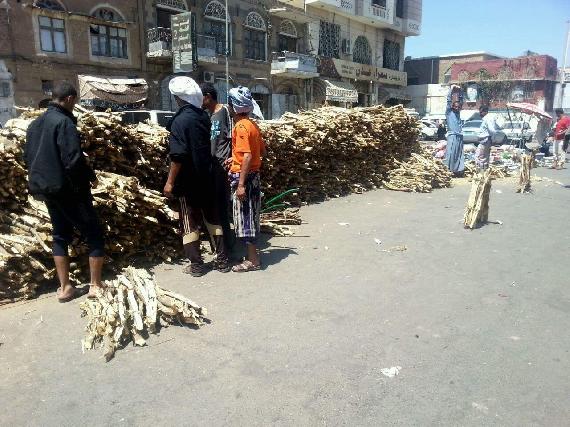
Firewood in place of cooking gas being sold in capital Sana'a (Photographer: Husam Alziady)
by Husam Alziady - Correspondent (Sana'a), October 23, 2015
In a country which has over 70 trillion square foot of spare natural gas, the population lives on firewood these days as the conflict in Yemen continues. Domestic gas is almost nonexistent and is sold mainly in the black market with extremely high prices, in a community that an individual's income does not exceed the five dollars per day. A visitor to Yemen may think one is back to the Neanderthals' era. One would find what ancient people used to use in their daily lives for cooking on wood in rudimentary life (editor’s: according to the Worldbank, the average per capita annual income in Yemen in 2013 was $1408).
You may find this expression so exaggerated but in the twenty-first century – the era of technology, space researches, and quantum physics – you find a spot in this planet where the simplest necessities of life are not available. This is one of war results in a country suffering from extreme poverty which borders with some of the richest countries (Gulf States) in the globe.
Yemeni citizens equally suffer in all Yemeni governorates when it comes to finding domestic gas being an essential need in daily life and daily cooking. On the other hand, it seems more in governorates that are exposed to blockade by the militia because they are not subjected to their control. Taiz governorate which is located in the western south of Yemen and in which over three million of citizens live is a typical example for these governorates that lack the simplest life needs as cooking gas and water.
The cost of the twenty liter gas cylinder is normally sold in Sana'a's streets and other cities costing around three dollars (USD) only. Nevertheless, these days and the current status of the internal and external blockade; you are lucky if you find it for eighty dollars.
Since the crisis began, most of the gas dealers started to monopolize it and sell it in the black market with high costs started as twenty five dollars and ended as eighty dollars per gas cylinder in front of the militia that has taken over the capital, Sana'a – in September 2014. Gas centers and stations closed their doors and their owners went to the black market for the sake of more profits compounding the difficult financial status of citizens because of the war.
Employment of over 70% of the citizens have been lost during the conflict and many cannot afford to buy a gas cylinder at these black market prices.
I live in a neighborhood in Sana'a in which most of its residents are from the middle class. Days ago, I noticed smoke rising from the house of one of my neighbors. I rushed to know what was going on with them and found them cooking using firewood.
Ameen Mohammed - my neighbor who lives a few buildings apart from my house - feeds a family of four members and he is single. He says, "I used to be a taxi driver and could manage to get an income that feed us from this work. However, since benzene is no more available and 70% of its derivatives stopped in Sana'a and other cities, my taxi along with my income stopped as well.”
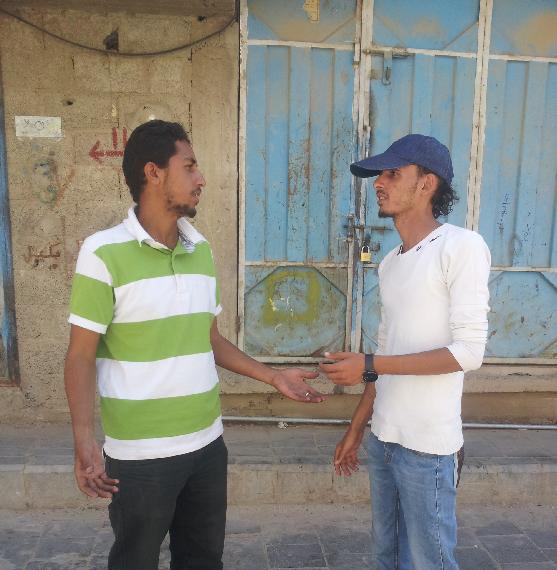
Ameen talking to correspondent
When I asked him about the reason why they prepare food using firewood, he said, "we have only one gas cylinder which is empty and I cannot afford to fill it from the black market because of the irrational high price.”
He adds, "I went to Haddah street a few days ago where there is a store selling gas with its normal price of 7 dollars. Being 3:00 a.m I am telling myself that I will be the first in line. It was the opposite. I was shocked when I arrived and saw the very long line of people sleeping in the street waiting for their turn to fill their empty cylinders. Someone there told me that he has been there for three days and gave me my number in line which made me even more shocked . My number was 473.
Ameen continues telling me his sufferings. I sat with him, talked, and became friends. Ameen continues, “more and more people were arriving in line until the number of those waiting to fill gas cylinders reached 1500. Finally, the truck of gas arrived at 10:00 a.m containing only 200 cylinders.That is the number that reaches that place every day.”
As Ameen describes, “people started to push each other to get a cylindar. Suddenly, another truck with fourty empty gas cylinders and six armed men on it arrived. They took fourty filled gas cylindars . People got angry and I had gone with them and shouted. The armed men shout at us and we got more angry.
A police car arrived and we got happy that they will hopefully prevent these robbers from taking the gas cylinders, but they allowed the men to leave with the forty gas cylinders. I screamed with a group of young people at denying what happened while we have been in line for three days.”
Ameen continues with anger expressions on his face, "then police men arrested me and three more and took us to the police station after they hit us and accused us of inciting people to disturb and riot. Then, they had us sign on a pledge that we never come back to that place or mention or repeat what happen.
I came back to the line and found almost half of them left and gave up. I did not find my empty gas cylinder. I searched and asked people about it but they said they did not see it.
So, I returned home feeling so angry, defeated , and pained after what happened. I felt sad for losing my only cylinder that we own and we cannot afford buying another one.”
Ameen continued, “therefore, I started collecting firewood from the streets from the second day. That was difficult to find as we live in a capital city . Most trees are for ornamental and are not allowed to be cut.
I wanted to get some wood for my mother to cook using it instead of gas to feed ourselves.”
.jpg)
Ameen cooking with wood
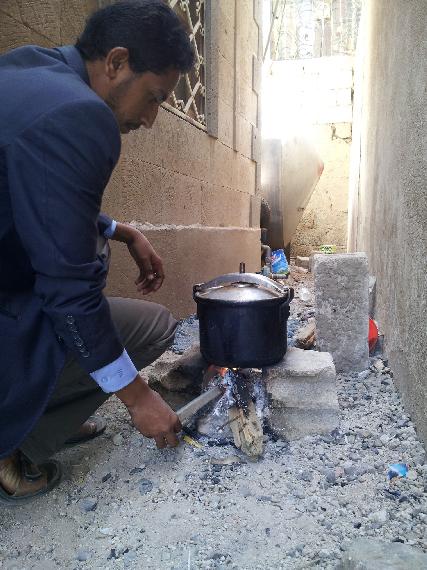
Ameen cooking with wood
“How long will we continue this way?!”, he asks.
This way, lots of Yemeni people have returned to the era of before discovering domestic gas.
I said bye to Ameen and his mother who was cooking lunch that its delicious smell reached my nose and wished all the best for them.
Ameen's story is a typical example for thousands of similar stories where Yemenis live in difficult situations in the war; who die of hunger before they get shot or attacked by weapons' fire.

Closeup of Ameen's makeshift wood stove

Another closeup of Ameen's makeshift wood stove
Near to my house is the residency of the legitimate president that is occupied by Houthies since he left Yemen to Saudia Arabia and since the war started. In the street opposite to it , the firewood is sold after it brought from villages that are near to Sana'a. People congregate to buy it as it is the only substitute of domestic gas.
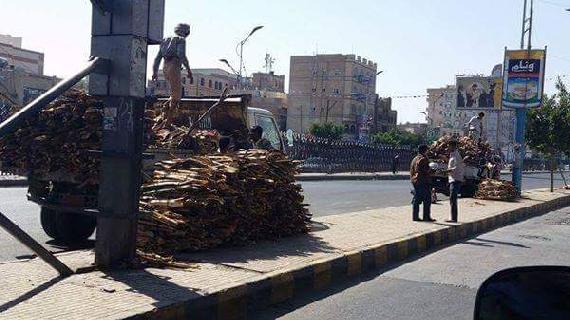
Firewood brought in from the villages to sell in the city
People here wonder about the reason behind the isolation they live; and about the world's role in what is going on waiting to come back to the twenty first century again.
War in Yemen Devours Memories and More Lives

This is one of the streets in the middle of the capital Sana'a. (Photo: Ahmed Jumaa)
by Hisham Khalid - Correspondent (Sana'a), October 20, 2015
Indeed, it is considered “being alive” what we are experience here in Yemen but not “living a life!” Merely and scarcely do Yemenis attempt to keep their body and soul together. For many, the sole concern has reduced to acquiring water, to strive to have some gas for cooking and to search for an alternative way to earn money. Sadly for those who lose their chance to get some important life needs they are living to die another day. In fact, Yemenis risk life and limb as long as we live here. For many, a sense of happiness is only felt when finally obtaining five gallons of petrol or a gas cylinder. However, we are still alive despite all of these obstacles.
The university students have recently completed their finals. The basic needs are not accessible for grading well and there was a diversity of tumultuous distractions like explosions, fire fights and people we know experiencing tragedies. It could not be more tragic because sadly we knew that some friends had lost relatives, others are in seek for safe shelter, and the rest (we) are awaiting.

Explosions after targeting an ammunition depot. (Photo: Mohammed Ezz)
That is just a result of a war among people who seem to lack a sense of reason. It is a tragedy not to find a place for peace or fun, to only think whether we will die by staying or running. The number of refugees and displaced people are increasing with each air strike and explosion. We do not know when we will have relief from the conflict, and until then, be able to regenerate a generation of happy children.
After 45 Emirati soldiers, part of the Saudi-led coalition (“the Alliance”), were killed by a Houthi rocket attack that hit a weapons cache in a military base in Marib province, the capital Sana’a is under constant air assault by the Alliance targeting various places. Among the main targets are missile depots and the dwellings of some high-ranking military officials, commanders and politicians who support the militia leader Abdul Malik al-Houthi and the former president Ali Saleh. The bombing of multiple targets, including missile depots in the capital Sana’a, has created chaos mixed with horror among civilians who flee for their lives, bare of clothing and possessions, leaving their homes and memories behind.

The targeted military base in Marib province, which led to the death of 45 Emirati soldiers and some others from Bahrain and KSA (Photo: unknown)
However, the coalition commits the “misaimed strikes” which are resulting increasing and large number of civilian casualties (editor’s note: As of Sept 29, 2015, according to the UN Office of the High Commissioner for Human Rights, 2,335 civilians had been killed in the last six months from air strikes by the coalition and indiscriminate shelling by Houthi militia).
The building Al-Badwi lives in is one of the residential buildings struck by misaimed strikes by the coalition. It is a four-floor building; all the families, lived in that building, were psychologically wounded but two families were physically injured and some killed (Al-Badwi's and Al-Hakeem family (a Syrian family).

Al-Badwi's building after having been “mistakenly” targeted by the coalition. (Photo: Ahmed Jumaa)
Al-Badwi’s daughter Sana, a girl who just lived waiting to graduate from the elementary school, was killed in the strike. Her parents had a hope that their girl would be someday a physician. Her teachers and the people around her have always praised her.
A friend of the girl Sana shared with us a post presenting the fact that Sana was filled with anxiety on that particular night; she felt that something bad would happen. The post is a WhatsApp chat between them two, prior to their building by struck.
Sana says "I dreamt that I'm fighting ... I might die".
Her friend replies "don't say so, please".
Sana continues, "please, I beg you, forgive me if I die and tell everybody to forgive me."
Her friend, "forgive you! For what ... you've never been mean to me or to anybody, please stop it! and be yourself".
Sana went on saying “we live near to The Central Security Forces in the middle of the street, and I heard that our house is in danger since it might be targeted. My parents didn’t want to leave the house ... I swear to God I’m going to die.”
Those are the last words known to be spoken by Sana.

Al-Hakeem’s family was in the fourth floor and Al-Badwi's was in the third. (Photo: Ahmed Jumaa)
Ahmed Jumaa lived in the same damaged building. He and his friends were fortunate to live in the second floor in the backside of the building, which was only slightly affected. "At 1:00 am", Ahmed said, "The Central Security Forces was targeted with three missiles one after the other before the fourth [missile] changed its mind and decided to hit our dwelling." He said, “that the third was very horrifying; they have never felt so terrified and worried that they opened all windows and doors and gathered in a hall in the middle of their department.”

The backside of the building. (Photo: Ahmed Jumaa)
"We could not believe that a missile hit the front of our building until we heard shouts and screams coming down the stairs and someone saying ‘help! our mother and brother are dying’”, Ahmed continued. He described that they went upstairs. They could not believe what they saw. The place was filled with dust. There were rooms that happened to be not there now; rooms with huge holes inside. Everything was destroyed. Their memories have vanished. The room, in which Sana was killed, in the third floor, looked like as if it was bitten by a giant creature, and there were papers and books scattered about.

One of the rooms upstairs. (Photo Danya Al-Hakeem the daughter)
Ahmed continued, “From which we heard the shouts on the fourth floor, where lived a Syrian family, parents, two young daughters and a very young son. Once we were there, we saw what could not be more vicious. One could not imagine how tragic that was. The mother and the five-year old son were stuck under a pile of concrete and furniture. We thought that they were both dead. We started digging gently. Unfortunately, the mother died shielding her son with her fragile body, and he miraculously survived."

The room in which the son and his mother were found buried under a pile of concrete. (Photo: Danya Al-Hakeem the daughter)
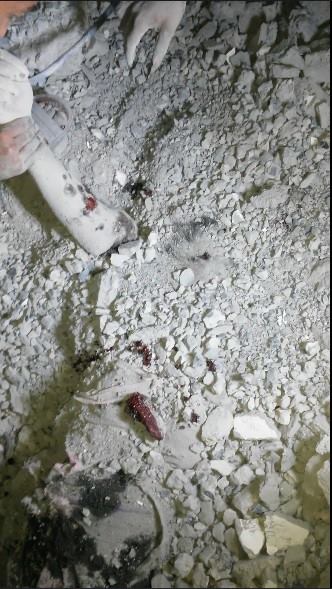
Cell phone image of digging by hand through the concrete pile. (Photo: Ahmed Jumaa)

The Syrian mother and her son Yazen. (Photo: Ahmed Jumaa)
As if she knows, something terrible would occur at that night. The son is in the intensive care room, and thankfully, he is gradually recovering. Then they left to live somewhere else so they avoid being exposed to harm and danger, just like many other people have done.

Yazen, the son in the intensive care room. (Photo: Ahmed Jumaa)
All those incidents have revealed an escalation by the Alliance in targeting civilian infrastructure in Yemen. Recently, the Alliance has started destroying road tunnels and bridges, and even sport clubs. The Alliance Countries have gone way beyond war principles, and they have stepped over human rights of Yemeni population. They have killed thousands of civilians who have no connection to Houthis in any way, and they still claim to represent human rights in the United Nations.
Concisely, Yemeni people are suffering from both sides by the oppression of the Houthi militia on one side and the escalating air strikes on civilian infrastructure by the Alliance countries.
What comes as a shocker to Yemeni civilians is that both sides claim that they are protecting the country while actually they are the ones destroying it. Now, the world knows that Houthi’s is a dangerous group of gangs and mercenaries who have killed and tortured many people in Yemen. On the other hand, the world is still blindfolded regarding the fact that Alliance Countries air strikes have killed thousands of men, women and children indiscriminately.
The Houthis and Alliance Countries are two enemies who can never reconcile with each other in anyway, but they can come to one agreement, which is to incinerate and exterminate Yemen.
A close eye on the suffering of Women and Children on Yemen's Free Governorates
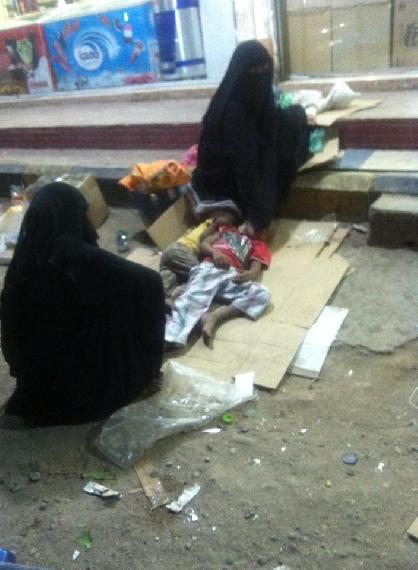
A woman with her children sleeping on the street in Aden. (Photographer: Rabab Ayash)
by Rabab Ayash - Correspondent/NYN (Sana'a), October 18, 2015
In a homeland where security has been robbed, even walls start to tell stories of peoples' sufferings in this conflict ridden country. Yemen has recently proved to be easy breeding ground and havens for heartbreaking stories.
It is believed that the ongoing escalation of the war in Yemen has crossed the point of no return.
As the war escalates, several dozen civilians, including children are killed every single moment because of the Saudi-led coalition almost-continuous airstrikes on Yemen as well as the mortar shells and rockets fired indiscriminately by Iran-backed Yemeni Shiite Houthi rebels and their allies into populated areas, such as in Taiz (editor’s note: While Taiz is in government hands, it is besieged by Houthi militia).
Many are burned alive by the inferno of fear, hunger, displacement, illnesses and all the gloomy scenes that results from the rapidly escalated crisis in Yemen.
Recently, All what you can hear in Sana'a is people calling residents to leave the city which is heavily targeted by the Saudi led coalition airstrikes.
Sana'a is one of the most populous cities in the world with approximately 3 million residents. Therefore, evacuating the city from this huge number of residents is of great difficulty. Only handful of residents answer the repeated calls that ask people to leave Sana'a to save their lives.
Yemeni Women and Children Escape the war zones to the unknown.
Ali's family decided to leave the city of Sana’a after their neighbor's house was bombed on the 19th of September. The family was extremely horrified.
“It was 2 am when we started to hear the war plane roaming on the city as usual. We did not feel afraid as we become accustomed to this situation. It wasn't until we heard a huge explosion that we have never heard before. Our house was strongly shaken. We decided to leave the house and travel to Aden to stay with my brother there”, said Muna Ali, a 23 year old lady.
It was an escape to the unknown. That is what we understand from the hardships that faced Muna and her family during their journey to Aden.
Many of Ali's friends had warned them not to travel to Aden which is 184.8 miles from Sana'a as they do not allow anyone from the northern part of Yemen to enter the south.
In Yemen, It becomes hard if not impossible for northern people to enter the cities in the South. Many security check points have been appointed by the southern movement along the road from Ad Dali to Aden. We were left hopeless until a man from Ibyan ( a southern city ) offered to help us reach the city of Aden. We were all females except for the driver.
The road was all fine and we traveled safely until we reached the first security check point in Ad Dali.
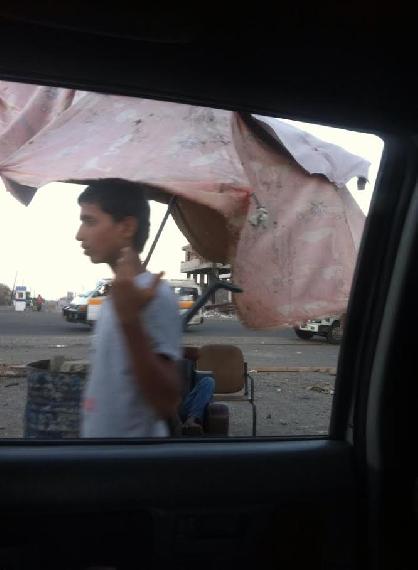
A young security checkpoint member in Al Dali
About four fully weaponed, very young men stand next to the old flag of the South part of Yemen.
Socially, In Yemen, it is a taboo to stop a car that has women and children in.
"I was astonished. Those guys should not stop us. It was my first time to be stopped in a security check point. I was very angry," said Muna.
.jpg)
A Southern family stopped in a security checkpoint in Al Dali and forced to go back to Sana'a
Muna continued, “we stayed for a long time till our turn came. Approximately all the cars that were ahead of us were forced to go back. I heard an old woman shouting and swearing with tears filling her eyes that she is from the south. No one paid her any attention.”
“One of the guys told her to go away from his face as he wanted to do his job. She did not listen to his warning and angrily the guy took his gun and threatened her. All the men in that checkpoint gathered around the guy and stopped him. They all condemned his harebrained behavior”, said Muna.
Muna continued, “the guy’s friends came and apologized on behalf of their friend for the old woman and the men gathered.
It is hard for me to describe my feeling that moment. Gazing at that horrible scene I started crying. Our driver though he is one of those who call for independence of the South could not bear the scene. He got out of the car and started to shout on the guy. The two men began to clash with hands, upon that, everyone rushed to break up the clash.”
When Muna witnessed all that she thought for a moment not to continue their journey to Aden.
Muna continued, “when our turn came, I took a deep breath. My heart started to beat a bit fast. I will not be exaggerating if I say that it was the darkest moment in my life.
A man came closer to the car and asked the driver for his identity card. The driver handed it to him. Asking the driver several questions, he left him go.
We were happy that we passed that checkpoint safely, but, to our surprise that checkpoint was only one of hundreds to come.”
Muna said, “all the checkpoints were asking the same questions. Where are you from? Where are you going? Is there anyone from the north?
Luckily, they were not asking for the official documents of the passengers only they asked for the identity card of the driver.
We were starving of hunger. The driver decided to look for a restaurant to have dinner. It was 3 am. We looked for a restaurant in the whole city of Al Dali. All were closed as they all were owned by people from the north.
Al Dali is a city where it is impossible to find a person from the north. They kicked out all the Northern people.”
“After all the inconveniences that we have received throughout our long journey from Dali to Aden, we reached Aden to see what we have never expected to see. Aden is no longer a beautiful city. Damage is everywhere.” Muna adds.
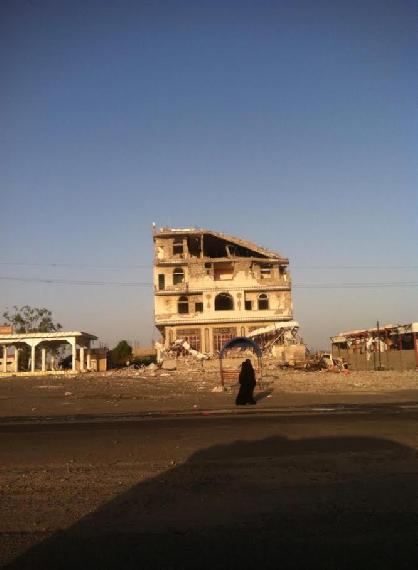
A woman standing in front of her damaged house in Aden
The number of needy people in Aden has increased rapidly. Most of the beggars you find in the public places and streets are woman and children.
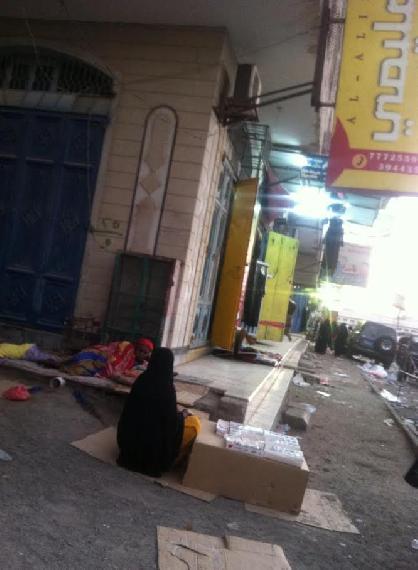
Homeless women with their children sleeping on the street in Aden.
Hundreds of families here lost their breadwinners in the war. They are in desperate need and have nowhere to go.
In Yemen, many people have so far been directly killed by the violence, but thousands more face death and impairment due to the secondary effects of this war – not least of which is hunger, malnutrition and disease.
Talking about those who lost their lives in the war, “They are lucky.” Said Leena Al Yafiai, a 33 year old breadwinner women from Aden who has lost her husband in the war.
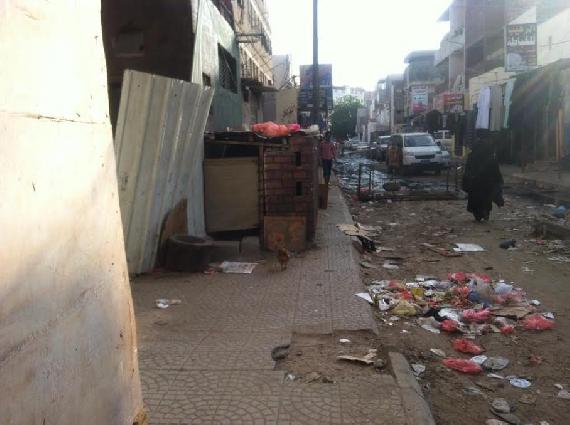
Leena's home. A single room house.
“To die a quick death by bullet is way better than a slow death from starvation. If they die once we die several times every day”, Leena said, sadly.
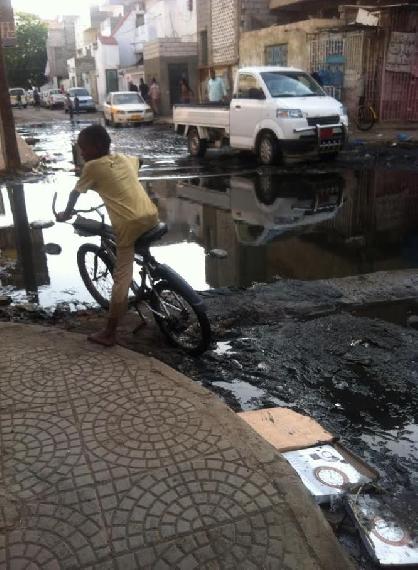
The overflow of cesspits in a popular market in Aden. Leena's child moving in the dirt
“I go to street every morning to collect money and food for my family. I wouldn’t do this if my husband was alive. What should I do? Should I leave my children die of hunger?. Leena asked.
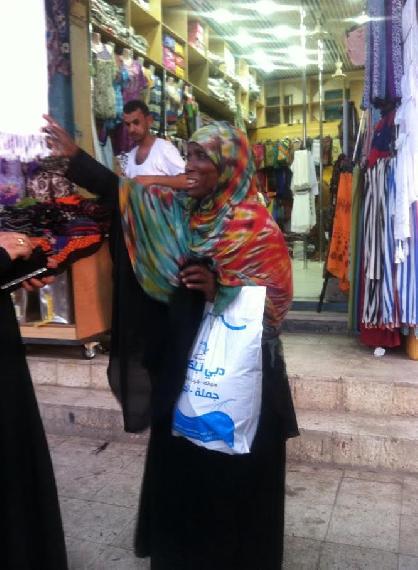
Leena's poor relative asking for money
Women in Aden face many challenges, “The overflow of cesspits on the city streets is one of the most challenging problem that irritate everyone here. It results in the spread of many serious diseases among the city residents. It starts to hinder our movement,” said Alaya’a Mohammed a university student from Aden.
“Quick actions should be urged to stop this problem otherwise the city is likely to witness a series of endless diseases”, she adds.
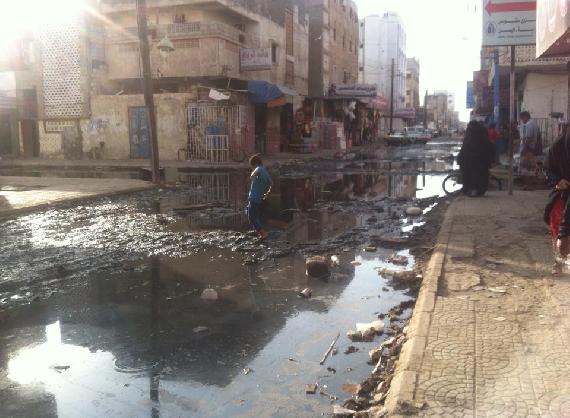
Women and children find difficulty walking on the street as they are filled by the overflow of cesspits.
Women Fighters Join the Popular Resistance in Taiz
In Taiz, the first batch of women fighters which consists of dozens of women who received military training in the use of weapons and martial arts have recently graduated and will be joining the ranks of the Popular Resistance in the province of Taiz.
“We are left with no other solution. We should fight to dislodge the siege. Protecting Taiz and kicking out Houthi rebels is the responsibility of everyone here, men, women and even children. Taiz deserves nothing but our souls and bodies“, said Amal Naji, a 24 year old lady from Taiz who is looking to enlist herself in the popular resistance.
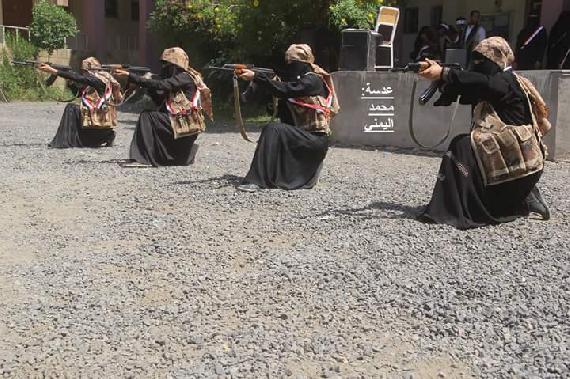
Women Fighters Join the Popular Resistance in Taiz
Women and children in Taiz suffer the most in this war. They suffer from the lack of the very basic things most of which is the lack of drinking water. In Taiz, according to international reports, about 830 children are left with no breadwinner. Women and children in Taiz are witnessing a slow death. Water trucks are not allowed in.
“It's been over two hundred days. How much longer will they wait? They'll probably be in the same place for a few more months until any outside help gets there. That's a long time”, Amal comments on the crisis of drinking water in Taiz.
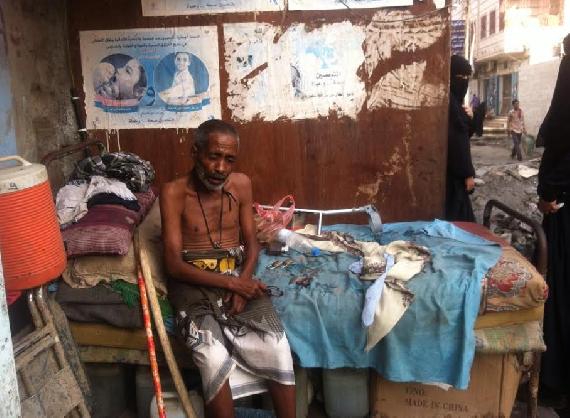
An old poor man sleeping on the street as his house was burned during the war in Aden.
War Forcing Yemenis to Leave Their Houses

A displaced child from Sada'a. Abduallah was crying because her mother couldn't give him 20 Riyals to buy Lollipop (Photographer: Asma al-Mohattwari)
by Asma al-Mohattwari - Correspondent/NYN (Sana'a), September 17, 2015
Internally Displaced Are Struggling To Survive After Escaping Death
Sada'a is a city under siege. Six months of Saudi-led coalition airstrikes day in and day out. Constantly, the citizens hear the scary sound of the attack aircraft that raise their worries and concern because they know what will happen later, a flash in the sky followed by the explosions' sound caused by rocket fire.
Since the beginning of the Saudi Arabia led Arab coalition offensive against the Houthi militia and armed forces of former president Saleh on May 25, 2015 and until today, the city of Sada'a has suffered the bulk of displaced people where they are found everywhere. Thousands of families fled their homes with their clothes only searching for a safe place to avoid what seems to many of them to be random bombing in civilian areas.
Women and children are the most affected, especially the poor that do not have any fault in the war and is of no reason to them. Fatima and her six children were displaced from Sada'a due to the bombing, which seemed indiscriminate to them. Fatima said, "I remember the first day of bombing, the aircrafts bombed thirty raids in one day. They madly bombed us, they even bombed cars, animals and stones," said Fatima.
Fatima and her family were living in Razeh, border area, so they were affected also by the shelling from artillery.

Displaced children are playing ignoring the aircrafts
They left their home and hid inside the mountains’ caves, but the bombing was so heavy, "I couldn’t stay anymore in Razeh. My children couldn’t sleep and all the night they put their hands in their ears to avoid hearing the aircrafts sounds. My husband had suffered a heart attack [stroke], I was afraid that his condition may deteriorate because of fear."
Every day they woke up thinking that there is nothing alive, everything was burning and thanked Allah they are still alive. She was afraid that her husband, the heart patient, could suffer another TGI (transient cerebral ischemia) clot from his fear.
In the fourth month of bombing they decided to leave Sada'a and traveled to Sana'a because the bombing was not intensive as in Sada'a. To flee out of Sada'a was not easy as the Saudi-led coalition announced the area as an active military zone, with continuous bombardment on the homes and neighborhoods of local residents.
"We did not expect to get into Sana'a safely [due to bombardment] from the planes in the sky and cannon from the ground," Fatima said with tears in her eyes.
Like all the displaced people, Fatima and her children arrived to Sana'a but they have no relatives to stay with. Everything was closed, only the schools were open to stay in. Fatima, her husband and six children were given a classroom to live in. The life there was so difficult; they shared one bathroom, kitchen and outside yard with hundreds of displaced people.
They couldn't continue to live such a life, so they decided to find a house. A benefactor agreed to provide them a house with a small rent in Bani Hewat area in Sana'a. The home consisted of one room, bathroom and kitchen. "At least we can move [somewhere] comfortably. Until now we didn’t pay him any money. I am so afraid that he may send us out," she added.
Fatima's suffering and struggling to survive is one of 1.3 million people who have been forced to abandon their homes.
According to OCHA report on Yemen, many of the internally displaced people (IDPs) have experienced multiple displacements. Now 21 out of 22 governorates are hosting displaced people, with most of them coming from Aden, Al Dhale’e and Sada'a.
Not all displaced people are lucky like Fatima. Safia said that she did not find shelter for her and her kids only a classroom in an Althawra school, "it is better than living in the street."
Safia's family left her home after bombing destroyed a large part of her house and even if the war stopped, they have no home to go back to. "War destroyed our homes, killed our men and this classroom has become my home and its four walls is a shelter for my young children," she added.
Since the conflict in Yemen escalated in late March, OHCHR has documented some 6,631 civilian casualties, including 2,112 civilian deaths, and 4,519 wounded (Sept. 2, 2015), with the actual number of civilian casualties are likely higher.
Also children bear the brunt of the crisis in Yemen. Rahiq is a child of 11. She escaped the rockets from Sada'a with her family. School was her only concern, "I wish the war [would] end and I could be back to my school, having exams and meet my friends and teachers."

Rahiq escaped the rockets. School was her only concern, she wish the war end and could be back to her school, having exams and meet her friends and teachers
Unlike Rahiq, Malak, 9, said that she doesn't want to go to school because she is afraid if she goes they may bomb it while being inside, "they bombed a school in our village before".
According to UNICEF’s Sept. 3, 2015 report ‘Education Under Fire’, since March thousands of schools have closed, and many damaged leaving 1.8 million children in Yemen without an education. This is in addition to 1.6 million children who were out of school before the conflict escalated.

Malak doesn't want to school because she is afraid if they bomb it while she is inside
Displaced people are suffering the shortage of food and water. Nassera and her two daughters go to a remote area to bring water from the street, operated by a charity. "We are trying to eat one meal a day to save food for days of rest until the charities arrive to [help] us", said Nassera.

Nassera goes to a remote area to bring water from the street, charity water.
Peter Maurer, the head of the International Red Cross (ICRC), visited Yemen for three days. He called the world to wake up and see the siege, destruction, hunger and killing of civilians in Yemen.
Maurer described the situation in Yemen as catastrophic and is getting worse, "goods have to arrive to Yemen urgently without any restrictions and facilitate the supply of rationed materials, water and medicines."
In his statement in Geneva, Maurer said that after his three days visit to Yemen he found the situation is getting worse day after day, "the world should wake up and see what is happening in this country". He was further quoted as stating to the Associated Press (AP), "So Yemen after five months looks like Syria after five years."
Recently, Amnesty International has accused the Saudi-led coalition of aggression against Yemen by targeting densely populated areas and call for the United Nations to form an international commission to investigate the possibility of war crimes in Yemen.
In its report, Amnesty International said that the air strikes carried out by the military coalition on Yemen that left a bloody series of civilian victims. "Eight attacks by the coalition during June and July caused 141 dead people, mostly women and children. The attacks targeted the populated areas with non-military targets", the report added.

Grandmother is struggling to survive and take care of her grandchildren
Much of the international community was not fair in reporting the unfolding of the Yemeni tragedy. United Nations Watch organization said that the High Commissioner for Human Rights (OHCHR) is supposed to be non-political and respect the highest standards of integrity in its report about the crimes committed by the Saudi-led coalition in Yemen since March.
The report that was published on the UN Watch website said of the other United Nations humanitarian organizations’ set agendas and issued reports on Israel's crimes in Gaza and ignored the war crimes in Yemen.
The report alluded to the need to form a committee to investigate allegations of Saudi's crimes against Yemeni civilians, the same as the committee investigated allegations of Israel's crimes against civilians in Gaza.
Bombing is targeting all the governorates, especially Sada'a, Taiz, Aden and now Sana'a. Some citizens left their homes to escape the bombing, some refused to leave and prefer to risk dying in their homes and others are under continued bombing because they didn’t have money to move.
Bombing targeted everything, lives, institutions, markets, homes, farms and animals. Yemenis are still struggling to live and waiting for the day of having an end for what seems to many civilians an injustice of war.

A Yemeni women carrying water
Yemen in Conflict: Heath Care System in Collapse
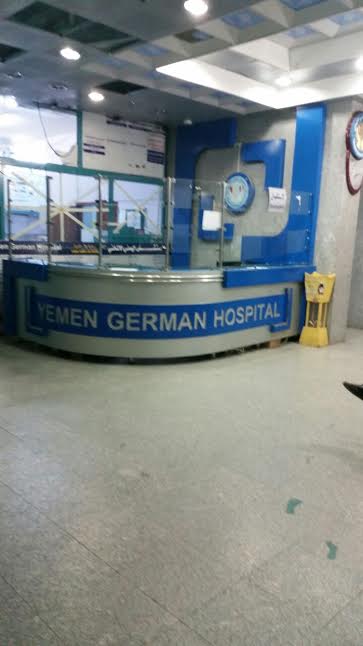
Staff lacking for checkin at Hospital (Photographer: Ahmed Yahya)
by Najat Mohd - Correspondent (Sana'a), September 14, 2015
The ongoing airstrikes and blockade/restriction of land air and water transportation has led the health care system to suffer critical shortages in medical supplies. Hospitals lost major percentages of their foreign working staff after they fled the war to their respective countries leading some hospitals to close down. Easily curable diseases have started to become a challenge and performing many surgeries has become almost impossible. Malaria, bloody diarrhea and malnutrition are becoming increasingly prominent among children below the age of 5 and women, and where as hotter areas like Aden have festered with epidemics of dengue fever and hygiene related diseases.
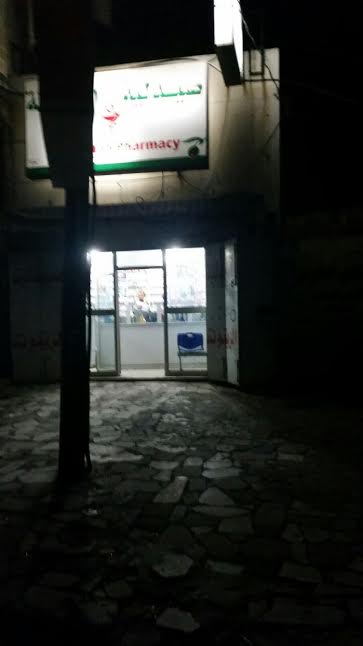
Pharmacies are almost empty
A high ranking health official in one of the major NGOs working in Yemen described the severity of the situation and in their own words, “The lack of electricity has caused damage to many departments in hospitals, the unavailability of fuel doesn’t help either, operation theaters work under difficult circumstances and have almost stopped performing major surgeries as there are no specialists and enough staff, injuries have increased and the lack of staff have made it hard to cope with. Performing simple tests such as blood work and other diagnostic measures like EKGs and ultrasounds are getting harder by the day. Nurseries are facing difficulties in incubating premature babies. Renal dialysis patients face the grave danger of death because of the lack of electricity and medication." The lack of electricity is causing the most damage to the health care system in Yemen. Recently, neighboring countries have expressed concerns on the efforts to prevent the outbreak of polio in Yemen, as it is necessary to provide immunization to millions of children but the absence of electricity has caused the vaccines to go out of use as they need to be kept cool at all hours of the day, thus increasing the chances of an outbreak. The official added, "Usually in war torn areas a safe zone is isolated for the international and national NGOs to provide basic health care and drop off necessary medication and help. During the war in [city of] Aden no such zone was provided and we couldn’t reach out to the people to help as no one felt safe enough to go and no staff could be brought to work in such an area. All this accompanied with the lack of water caused outbreaks of Dengue fever and hygiene related diseases."
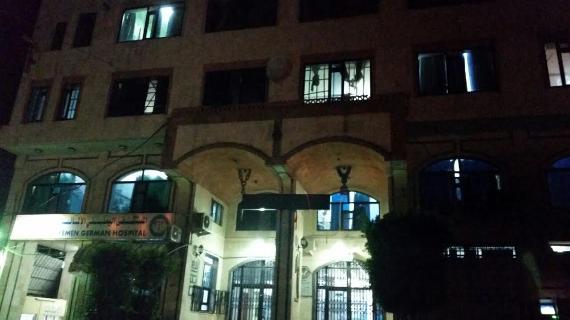
Most of the hospital building is without light.
When asked what the solution was in their opinion, "The quickest solution is to provide the needed equipment and facilitate the reach of help so that the hospitals can start working again. And of course for that the imposed blockade should be lifted. Specialists and sub specialists should be brought back along with whatever help that can be provided. This is a humanitarian crisis and people are feeling depraved of their simplest rights which is access to basic health care."
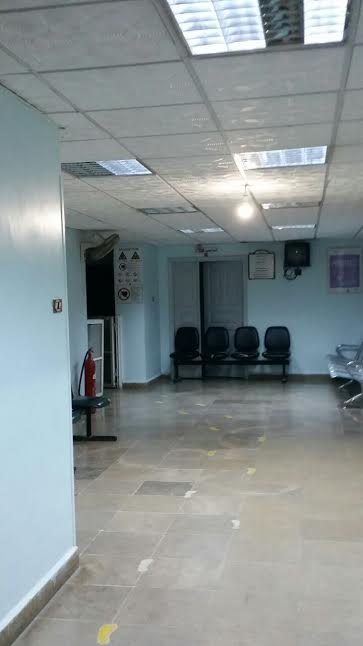
Empty halls in the hospital
We visited some hospitals in Sana’a city and to our dismay most of the hospitals were almost empty of staff and patients except for a few nurses, and everyone seemed alarmed and cautious on seeing someone asking questions and they all had one similar request which was not to mention the name of the facility and the person answering to us. One of the nurses in one of the hospitals said, “We fear media coverage because hospitals are being targeted and we do not want to bring focus to ourselves and cause harm to the patients.” She added, "we come here every day knowing that there is a possibility we might not make it through the day but we are dedicated to provide as much help as we can to those poor people, at least those of them who find it in their hearts to leave their houses and come here for medical care."
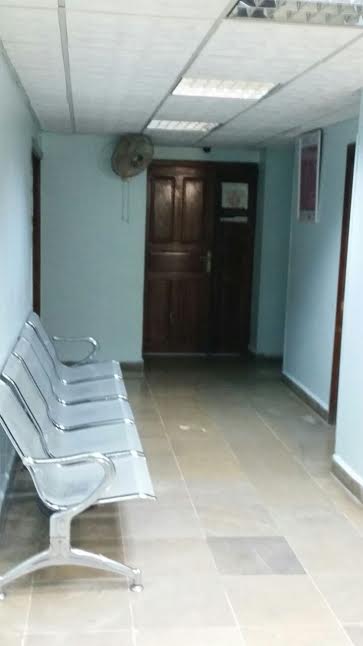
More empty hallways in hospital
We headed to another hospital and again the sight was similar to the previous one, empty halls, empty rooms and very few staff, we spoke to one of the doctors willing to give us their name, Dr.Manal Abdullah. In her own words, “One of the problems we faced was the sudden fleeing of the foreign doctors and nurses, we couldn’t fill the gap it created all we could do was increase the salary of the present staff and decrease the shift hours which causes the hospital incapable of functioning 24 hours a day. We also faced difficulty with the whole electricity situation as it kept going off in critical timings and the lack of fuel made it even worse. We cannot receive patients in critical situations anymore. If we do we transfer them to other hospitals, which in turn transfers them to another and so on and so forth. Most patients don’t even reach [the hospital] in time to be saved after an injury because they fear the short journey to the hospital, one such case was an old woman that came in late one night but she didn’t make it because they didn’t get her here in time. We need help and we need it fast.”
Patients that require immediate surgery and intensive care have been affected tremendously, the death toll has increased in operation theaters and intensive care units, doctors have had to resort to primitive solution to keep patients alive, nurses manually pump oxygen to patient’s lungs because there is no electricity to work the respirators. Cardiac patients die due to the lack of immediate defibrillation while staff always resorts to performing CPR, which seldom succeeds in saving the patient. Renal dialysis patients have had it the worse as they need to go for treatment up to 3 times per week or so, but due to the situation and absence of medication and electricity, they go only once a week, and most of them don’t make it through.
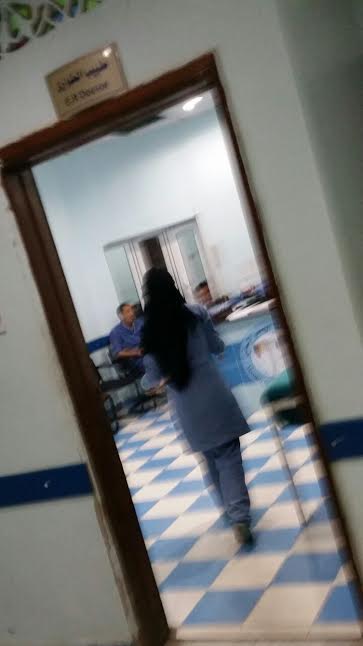
Number of staff has decreased significantly
Samah, a mother of one who fled the conflict in Aden and came to take refute with family in Sana’a was at the hospital with her son, she said, ”Two months ago the health care system in Aden was not there, there was no health care system at all, we had no medicines, there was no electricity and my son got rashes all over his skin from the heat and sweat, the water was polluted and everybody was sick with something. We had to flee the dengue fever that broke out before it got to us from the stagnated water and dead bodies that accumulated in the streets. Many of us were malnourished because there was no food. It’s not that we had no money but there was nowhere to get our own money from, the banks were closed, and grocery stores wouldn’t sell you more than one or two items so the left out products can be enough for everyone. We sometimes ate biscuits only and slept with no dinner. Pharmacies were empty and hospitals were full of injured people and there were no nurses or doctors to look after us. It was we either stay there and die or we risk the journey and come here but it seems as though the situation is following us here too."
Last week’s airstrikes targeted weapon storage units in the mountainous areas around the city and between Seventy and Haddah streets where the “Seventy Mother and Infant Care” hospital causing causalities and damage among the staff and patients. The new born babies and their mothers along with prematurely born infants had to be carried by the staff to other hospitals just to keep them safe. The air strikes along with the almost collapsed healthcare system have caused an alarming increase in the mother infant mortality rates as the non-medical experienced assisted home births have increased and neonatal care has virtually collapsed. Mothers have died due to miscarriages caused by sudden fright or sustained injuries, while hundreds have been buried alive under the rubles of their own homes as a result of the conflict.
In one of the biggest hospitals we spoke to a resident nurse who told us he told government officials the hospital needed insulin and they couldn’t provide it for him as the market has been short on it because of the blockade. Pharmacies are almost empty and people have to circle the whole city just to find a basic cardiac drug like Atenolol. The national oxygen production company has been affected badly as is now unable to supply the required amounts of oxygen tanks due to the lack of fuel, and as it is almost the only remaining oxygen company in the city, leaving hospitals forced to deal with the lack of oxygen for emergency purposes.
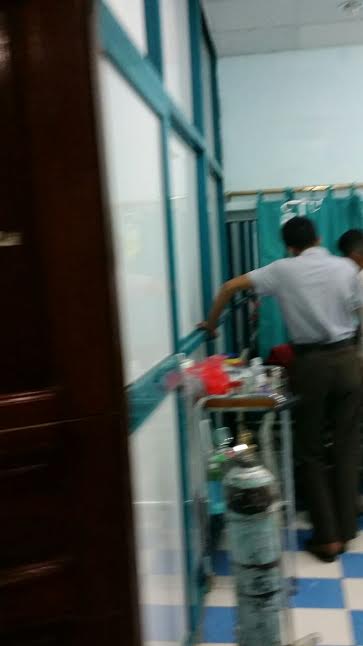
lone oxygen tank in hospital room
Help has been next to impossible to deliver to some areas. NGO staff face the danger of assassination every time they enter hot zones to provide help. A horrific incident took place last week when two staff members of the Red Cross were shot by an unidentified assailant as they were traveling back from the city of Sadaa to Sana’a. Such incidents have caused a lot of organizations to refrain from sending help to affected areas to protect their workers becoming causalities in the conflict.
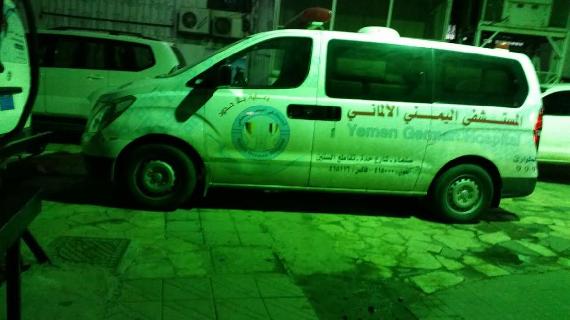
Ambulancesn seldom used due to lack of fuel
Yemen needs humanitarian help and solution before any political approach as the death toll has increased by many folds. It has been months since we all feared the inevitable collapse of the health care system. Now, we fear what will happen since it has collapsed and how much will the citizens have to endure more than they already have.
Electricity and its impact on the deteriorating situation in Yemen
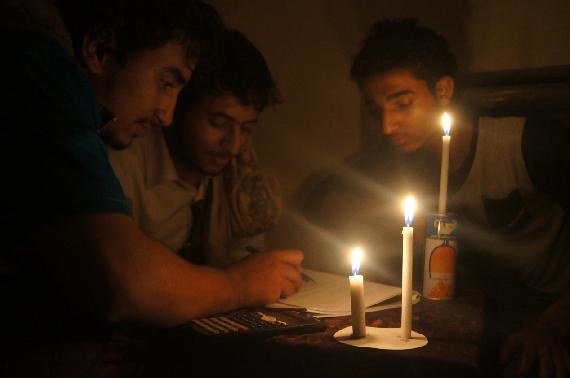
Yemeni students study for final exams, under candlelight, in Sana'a (Photographer: Hisham Khalid)
by Hisham Khalid - Correspondent (Sana'a), September 6, 2015
One would logically consider that electricity is an easily accessible key factor of life. One would not think that electricity, one day in the 21st century, might go out of service. Ironically, fate has awarded Yemen with power failure; it has bestowed this country with darkness. People do not suffer, they do not need electricity; they like it when it is dark. Moreover, medical equipment is not required in hospitals for they depend on herbal medicine. In case one wants to contact with another, one must send the other a letter unless one has a profitable income to buy a power generator fueled with petrol, so they can charge their phone and call whomever. However, it is not that easy because most satellite bridges are out of service due to fuel deficiency, which make it difficult for any call to be transmitted. Anyway, many sarcastic stories can be narrated but let us uncover reality.
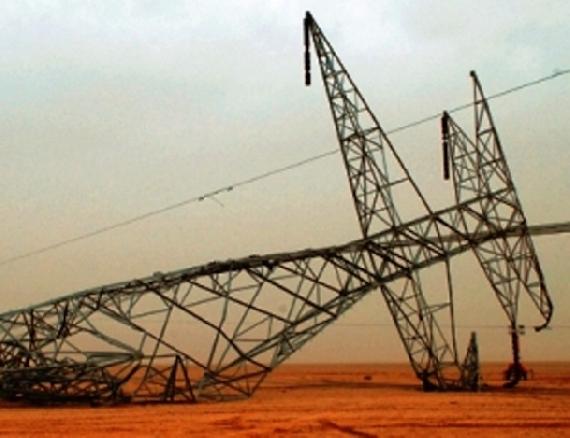
a downed power transmission tower
Waleed is a technician engineer who works for the Ministry of Electricity in Yemen. He is one of those who expose their lives to danger in order to feed the electronic devices with electricity. Unfortunately, since there is a high electricity consumption rate, along with a limited running-power time, frequent damages strike parts of the power cabling system that lead to power outage.
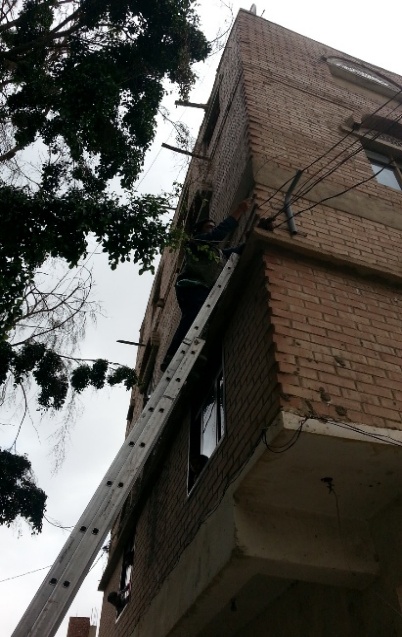
Waleed doing his job repairing power lines
He says that the main source of power, located in Ma'rib city, is no longer working, and alternative limited power sources took place for that. Those sources provide all the districts, inside the capital, with scheduled-system power; every "electric cell"1 is operated solely. Consequently, according to the excessive use of power that lies on the alternative small power generators, electricity might not continue flowing for more than an hour supplying one "electric cell" per each two to three days. (A group of substation step-down transformers)
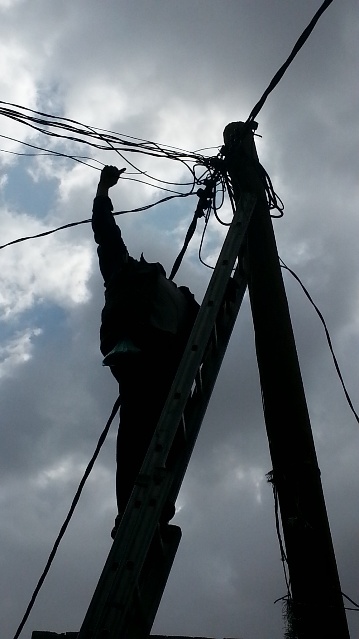
Waleed working on power lines A group of substation step-down transformers " />
"We have a lot to do; with the intense desire people endure, for acquiring power, many people directly operate their refrigerators, vacuums ……etc. That leads to considerable stress and damages on cables, fuses, and even transformers. We almost encounter several problems each day; we attempt to fix every possible damage that strikes either cables or safety fuses. There are dangerous missions we might face but for the sake of our society, for them to enjoy at least the hour scheduled, we sacrifice to access that short period." Waleed added.
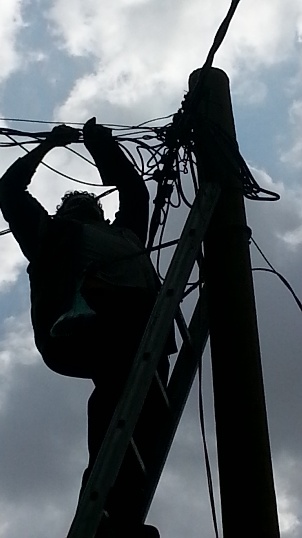
Waleed repairing a power line
On the other hand, some shopkeepers claim that they are required to pay electricity bills although they spend much money for their petrol-operated generators. One of them, a cafeteria owner, says that the time electricity was permanently working, he did not spend money as much as nowadays; in contrast with the present, he said, he used to spend in the past almost 10% of what he does now. A customer, in the same cafeteria, commented that the money he has is not enough to get him a complete meal for it is more expensive than it is supposed to be.
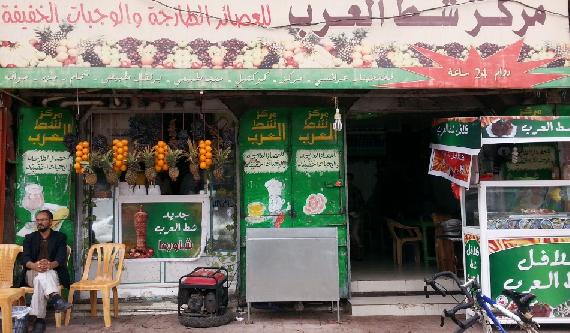
The cafeteria works based on a 3kw generator
Mohammed Abdulaziz, a university student says, "that the presence of electricity is an essential element in the life of students. Students use online resources to do research and to find other resources that help them study. Electricity is also the source of light at nighttime. Without it, studying is limited to daytime only. In addition to that, students need to let off steam and have sometime for entertainment, which is mostly done on a computer or a game console. Unfortunately, since the start of the all-time blackout of electricity, Yemeni students, such as myself, find it rather suffocating. We are limited to studying to only at daytime and we are almost unable to do any type of research. We are obligated to study and present materials in a limited time, which is frustrating for most students whom cannot afford spending money to get those assignments done, and the only source of entertainment is, as well, limited to daytime. The electricity blackout is causing students to get frustrated and depressed in this country."
Mohammed Ezzadeeen, a student at the Faculty of Arts and Humanities, English department, wrote in his timeline "I still remember how the streets of Sana’a were glittering with bright lamps, and how I could see that there was a visible city a normal camera could recognize at night. I could see the splendid lights through the gloriously colored 'kamarieah' of the houses (i>(The colorful upper part of a window, especially designed in Yemen). How the streets of that city were full of life, and how people happily and safely were walking in those alleys and pavements. I still get flashbacks of how their faces reflected the shining lights of the city, and children would play in their neighborhood blocks chuckling and jumping. Those were the days of stability and peace."
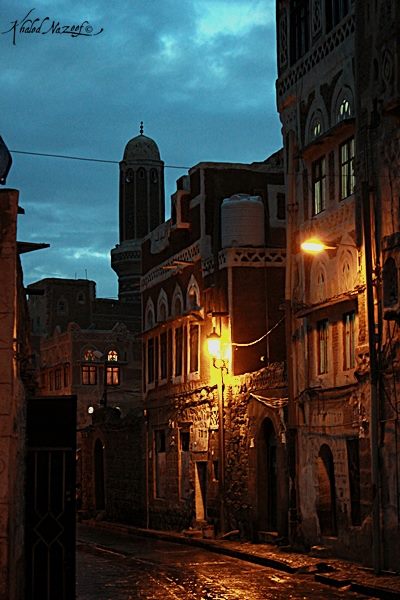
One of the alleys of old Sana’a before the conflict, (Photographer: Khaled Nazeef)
Mohammed continued, "the days of stability were when we would not worry about having to queue up in the local laundries to wash or iron our clothes. The days when we would not look for electric resources to charge our electronic devices, like phones. At that time, factories were operating, and all facilities were available as supposed. Alas, those are times of the past; the past we wish, 'we could get back.'
Besides, the city streets are no longer safe at night. Darkness allows thieves and armed gangs to exploit the moment robbing, kidnapping, and murdering. Sana’a city is just one example of many other cities around the country. Nevertheless, what comes as a shock is that the capital of this country drowns deeply into complete darkness. Unluckily, I live now in the dark city. I live in the dark country. I live in Yemen."
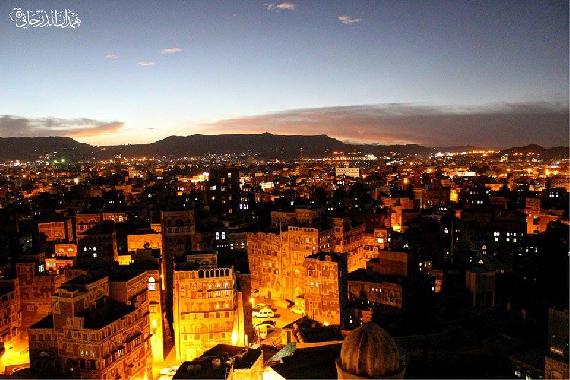
Days of stability and peace, Sana’a, (Photographer: Hamdan Altharhany) .
Power outage is also considered a fatal issue violating our public health concerns. Hospitals deteriorate because of the frequent blackouts, which have recently reached a semi-permanent power outage. As known, electricity is the prime element in hospitals for it runs various required medical devices. In the emergency rooms and the intensive care sections, there are different medical devices essential to many patients. For example, if the artificial respiration device, as well as any other medical device, is disconnected for several minutes, the patient will definitely die.
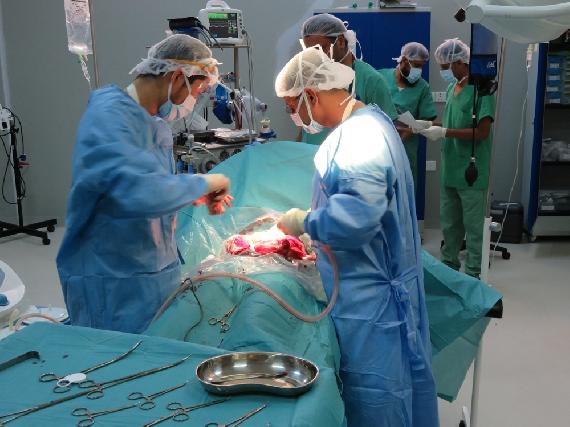
Inside hospital in Sanaa
Electricity is important for the intensive care section as well. Normal and critical surgical operations cannot be performed under these circumstances. Renal failure is a serious disease; the patient afflicted with the disease finds difficulty in having Kidney dialysis two to three times a week because the hospitals that perform such treatment are now a few. That is in the past, let alone in the present in which there is almost no electricity; the patient is not only going to line up for having the treatment but also he is going to pay a lot of money. There are thousands of patients in Yemen and all are in need for this treatment.
As a result of power outage, hospitals purchased enormous electricity generators which need a very large amount of diesel to operate, and diesel is very expensive and almost hard to find. The ministry of health attempts to provide some hospitals with diesel while some others are counting down to close.
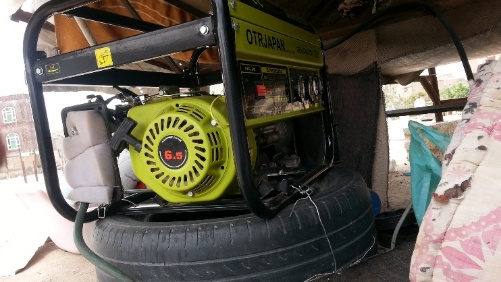
A generator and inverter being used at the hospital
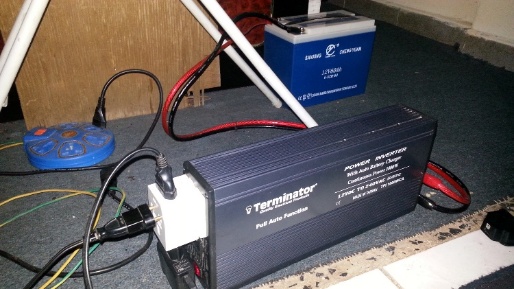
1 to 5 kW generators and a battery charged by a solar cell are the only accessible power sources these days in my country. However, that needs money, and our country is in deep recession at a time when policy makers have no options to revive growth; some people are suffering waiting for their salaries and others have been given the layoff notice. Our country is like a patient infected with fever receiving no any sort of treatment. The longer it lasts the worse it become.
Displacement in Yemen is an area rich with heartbreaking stories

Children struggle to pull the heavy water cans (Photographer: Rabab Ayash)
by Rabab Ayash - Correspondent/NYN (Sana'a), September 2, 2015
The civil war and collapsed economy are two struggles that face the poorest country in the Arab World – Yemen (editor’s note: World Bank statistic for pre-conflict [2013] annual per capita income: $1473 USD in contrast to Qatar [richest] at $92632 USD).
The displaced fled the "quick death" by missiles and air raids to find themselves in a countryside that promises them with a "slow death". They look for the basic life saving materials in the absence of the role once provided by concerned officials, as well as neglect and absence of the international and local humanitarian community organizations.
Violence has destroyed many peoples' lives. The plight of civilians continues to worsen with the diminished hope of an agreement on a ceasefire in the country.
The suffering of hundreds of displaced Yemeni families, who were displaced from their homes in town of Al Baydha, as the conflict in the country escalates further, was increased at areas of shelters due to the many challenges. With the absence of international and local humanitarian groups as a result of the threat of the security crisis, many forcibly displaced families suffer securing water, bread and other food.
Many families are demanding the concerned of authorities to rescue them from hunger. The demands came due to the cruel living situation that they live in such as the high prices, the lack access of financial income for most of those families who were forced to leave their houses (editor’s note: according to the UN World Food Programme datasheet for Yemen: 'Yemen Emergency - In Yemen, millions of people. Yemen is on the brink of famine.').
Displaced families at Sana'a have had to evacuate their homes. Some of their homes got bombed while they were inside their home and they survived by some miracle, while others lost their houses after evacuating them.
Salim Mohammed family from Al Byadha has been displaced from their house for three months. "Three months ago, I had to leave my house at Al Bydhaa as a result of the threat of having my house being bombed by the Saudi-led coalition airstrikes or the Houthi shelling. My family was scared when we witnessed the death of our neighbor family in Al Bydhia who were all killed by one artillery shell that burst in their house." It was hard moments for Salim's family.
"It was my first time to see real blood", said, Ali Salim an eight year old child. "We were playing in the afternoon and now they all are bodies without souls." Ali adds.
After they left Al Byadha, they were not able to make a decision. Where to go? Until a friend advised them to go to the capital Sana'a where they can find good shelter, food and other lifesaving things. Salim took his friend's advice and took a car and went to Sana'a.
Salim said, "It was the city of ghosts. Nobody could make an offer of help. We slept in an empty yard. It is a parking lot of a car sale center. The owner of that empty yard permits us to stay in a small mobile house inside the huge yard." Finding a place to stay in was the best thing that happened that happened to Salim and his family since they left their house in Al Byadha governorate.

A displaced man using old ways to move in the city of Sana'a.
"We lost our house during the war and we evacuated to Sana'a. We thought that we are safe. It was after three days of staying in Sana'a, we heard bombing in the city. We are close to Nahdien mountain in Sana'a and the explosions were very strong. We were shocked. Where should we go now? We have no other safe place", says Arwa Al Awadhi, Salim's wife, in a desperate voice. “My children screamed as if it were their first time to hear explosions”, added Arwa.
Though Salim found a shelter for his family, many challenges have arisen, such as water and food shortage and the lack of cooking gas. They try to find solutions to these problems.
The family depends mainly on the liters of water their children fetch in cans on their heads from a very far away water pump. They could not offer to buy cooking gas. Therefore, they use wood instead. "We will not give up. We should continue”, said Arwa.

The family youngest child carrying a bottle of water.

The family cooks in the air using woods as a result of the shortage of cooking gas.
During the ceaseless cycle of violence in Yemen, it is the vulnerable who suffer the most, especially young children.
"My youngest child talks in his sleep and sometimes screams in pain during the silent dark nights. He always has nightmares about his friends who were killed innocently by a chance shell", explained Arwa, with tears.
Painful memories, unknown psychological sufferings, and inhuman traumatic hardships along with hunger and sickness are some challenges that face most displaced families.
All these sufferings are brought about by the unending and fast spreading battles in the country.
Forcibly displaced families want to talk about the pain they are enduring more than their needs for food. They need to tell their pains for all to hear. Shelters are a rich place of heartbreaking stories. The greatest needs among the forcibly displaced are for clean drinkable water.

Another photo of the children hardship of water pulling.
"Days here are extremely long. We miss many things in our homeland. We miss our neighbors, the playing yard, even the dishes my mother used to cook when we were in Al Baydha”, said, Majed Salim, a 10 year old boy.
Displaced people conditions are increasingly deteriorating. Since the beginning of the war, displaced people find themselves at a loss. And they wait eagerly for the final whistle, which is likely would put an end to their unprecedented sufferings.
"I wish I could go back to my house and play again with my old friends. I wish I could see the water goes out of a water tapes. I want to see my mother cooking on the cooker. Carrying water was interesting at the beginning but now it turns to be one of the worst things in this world", said Majid.
"We did not get any support or aid from any organization, we live on the simple aid we receive from the good people and donations of expatriates." replied Salim when we asked him about the aid they receive.

The family is raising chickens
Displaced life is a real hardship. They had to leave their houses with nothing other than the clothes they wear. Displacement generates many tragedies with every family fled with a tragic story or issue to tell.
Arwa added, “I am very disappointed for what we reach to. I used to have a good life and we were happy. It is really shocking to find everything destroyed in a blink of an eye. It kills me when I watch my children carrying those heavy containers of water on their head. It hurts me to see my children cooking on the air.
You know, our story is not the most heartbreaking. We know many affluent families who own big houses and cars and suddenly they were forced to look for shelters. We know nothing about what has happened to them.”
“I hope that the issue of displacement comes to an end and we have the chance to go back to our neighborhoods and homes. I would prefer to live in my destroyed house among the people we love than living in isolation from the world here”, Arwa concluded her speech.
While the focus of the world’s eyes are on the political crisis in Yemen, the picture on the ground is extremely bleak. Many concerned authorities stress that unless rapidly resolved, the crisis could lead to mass displacement in the wake of heavy and ongoing fighting and airstrikes.
Yemen in Conflict: Exploring painful memories in a country devastated by war

Ersal's newly born baby (Photographer: Rabab Ayash)
by Rabab Ayash - Correspondent/NYN (Sana'a), August 31, 2015
During the ceaseless cycle of violence in Yemen, it is the vulnerable who suffer the most, especially women and children. It is hard to tell with any certainty exactly how many women are suffering various forms of hardships in Yemen. Assessments, done by local and international organizations, identify women and children as among the most vulnerable.
While the Yemen government receives a huge amount of military aid from the Saudi-led coalition, it is a country where food programs are being cut because of lack of funding; a country where one in three people are chronically hungry. Many reports and assessments about Yemen show only part of the unfolding scope of the tragedy. Unlike people in the other parts of the world, people in Yemen try to hide their sufferings. It is only when you walk on the streets you see extent of their sufferings.
Yemen is a very conservative society governed by tribal traditions. A society where women are almost invisible and have no say in what goes on in their country. It is difficult to talk to a strange woman in the public places in Sana'a even for female journalists and it is more difficult if not impossible to take photos of them.
The security situation in Yemen is another obstacle that makes it difficult for interested groups to reach out to all the civilians who were affected by the war. The political crisis overshadows the needs of millions of Yemenis. It is believed that without sustained commitment to help the innocent civilians, Yemen will continue to face tragedy while their stories continue to be lost amid the complexities of political war and national security which is the focus of most of the media.
Only a handful of stories have been highlighted by the media. These stories reflect the magnitude of the destruction and tragedy inflicted on the Yemeni people, while the majority are being buried under roofs and in the streets of this war-torn country. Stories of suffering in Yemen do not need the hands of a talented writer to be impact the reader. The stories alone are complete tragedies.
On the 17th of August 2015, Ersal Albadani, a 21 year old woman, died soon after giving birth to her first child as a result of the lack of medicine. Ersal was diagnosed with toxaemia "poison" during the last four months of her pregnancy. She tried her best to not show her husband the pain she felt. It wasn’t until she fainted and was rushed to the hospital. Her husband is a motorcycle driver. He spends on his family from the little amount of money he earns from his motorcycle. It becomes hard to work these days as a result of the oil deprivation crisis.

The father ( Ersal's Husband ) as he queues at a petrol station to buy fuel.
Unfortunately, medicine for Ersal's illness was not available and Ersal, like many others, did not have the chance to travel abroad to receive medicine. Death did not wait long to take Ersal's life.

The last moments in the Ersal's funeral
In Yemen, this is not one of the most painful stories to read. It is only one of a very long list of similar stories.
As conflict escalates here and with the absence of civilian protection, people's lives turn to be hell-like.
Another story that has not seen the light is the story of a big family from Ibb who were forced to leave their home in Sana'a in a single night forcible decision. When leaflets where anonymously distributed to residents of Hazeiz neighborhood at the south of Sana'a calling the citizens to evacuate the neighborhood in a period of 8 hours, as it was said it will be targeted for air strikes by the Saudi-led.
On the 17th of May 2015, 19 women and 27 children were forced to leave Sana'a to Ibb after they received a warning which commanded them to leave the place cause it was said to be targeted by the Saudi-led coalition air strikes in Yemen.
"That night was the worst night in my life. Everyone in the house was crying and children were screaming. The scene is hard to described. For a moment, I thought it to be the day of judgment. I looked out at the scene around me and started asking the questions that naturally comes up at such point which are usually full with total despair, What shall we do? Where to go? Is this the last night?", said Fatima a 17 year old girl and a member of Taher family, with tears filling her eyes.
The men of the family hurried to the streets to look for cars to drive them to the village before the area would be bombarded.
It took them hours till they found a bus because of the crisis of oil deprivation in the country. It was hard moments for the Taher family. Where to go is the question that all ask.
The family's women and children left the place at 1:30 am while the men decided to stay in Sana'a. Until here the story of Taher family has not started yet. On their way to the village, the bus broke down. The women did not know what to do. They stayed for four hours waiting for someone to drive them to the village. They asked many for help. All their tries went in vain for nobody in the village had petrol to fill a car and come to drive them. Then they were left with no solution other than walking by foot to the village, which was still miles away, carrying all the heavy luggage and the young children.
That is a single family story and we may find more painful stories if we just look around us. The war in Yemen forced millions of women and children to leave their houses in the areas of conflict and walk to the uncertainty of the refugees' shelters in a complete silence, far away from the sight of any humanitarian organizations.
After escaping death in the areas of conflict, many vulnerable families start to struggle with new phase of the battle. They struggle to cover their basic needs; food, clean water and many other lifesaving necessities. They face the war’s grave consequences which govern every aspect of their life. Sadly, many sufferings of the people do not make their way to the world's headlines. Many people are buried along with their stories of sufferings with nobody to hear or to cry their loss. There are new incidents every day which insist to remind us of just how tough and painful peoples' life in Yemen is.
One sentence that hurts me so much while working on this report is a sentence of Ersal's mother saying, "I am happy that my daughter story will be known to all." She told me the story of how her brother's family whom were killed in a Saudi-led airstrike on Faj Attan area in Sana'a three months ago. To my surprise, I discovered that Yemen becomes an endless chain of painful stories. And death is no longer a strange guest that steals our love ones' lives; rather it becomes a close friend that visits many Yemenis houses. One point that we can take for granted in Yemen is that, it is impossible for a single report to give a clear picture of the scope of the humanitarian disasters affiliating Yemeni people as a result of the seemingly everlasting war.
UNRWA commemorating the first anniversary of the War

Gazans expressing their feelings outside the offices of the UNRWA (Photographer: Sarah Sobhi)
by Sarah Sobhi - Correspondent (Gaza City), August 23, 2015
One year after the Israeli-Gaza 50 day war, things are getting much more complicated for the Gaza people
It is one year after the war and the Gaza people are still suffering the harmful effects of the Israeli airstrikes. It is one year later and Gaza people are commemorating the loss of their siblings, homes, children and souls. It is one year later and Gaza people are just writing about their experiences and grief; they are just writing what they could not orally tell or physically do. It is one year later and the dilemma is getting bigger in terms of education, health, policy and society.
UNRWA is a United Nations agency established by the General Assembly in 1949 and is mandated to provide assistance and protection to a population of some 5 million registered Palestine refugees. Its mission is to help Palestine refugees in Jordan, Lebanon, Syria, West Bank and the Gaza Strip to achieve their full potential in human development, pending a just solution to their plight. UNRWA’s services encompass education, health care, relief and social services, camp infrastructure and improvement, and microfinance. More than 50% of Gaza people are Palestinian refugees and depend partly or completely on the UNRWA services. UNRWA has taken responsibility of those refugees since the end of the 1948 the Catastrophe (Arab)/War of Liberation (Hebrew) which resulted in 700,000 Palestinians fled or expelled from the area that was established as the State of Israel. The UNRWA provides educational, medical, social and psychological services in a periodical way. UNRWA has affected the life of many Gaza people especially after the damage they had, physically and psychologically. Here we have interviewed some people who have been directly affected by the 2014 Israeli airstrikes and touched the difference UNRWA has made in their life.
(editor’s note: The UN estimated 20,000 residential homes were destroyed, 1492 civilians killed of which 742 fatalities came from 142 families, who suffered the loss of 3 or more family members in individual bombing incidents on residential buildings).
Iman Juma`a Abu Qun says, “Life became so difficult; I was hoping to find employment to support myself and not be a burden for my family. I really wouldn’t mind working in any job, anything that helps me to survive. Life in Gaza is really tough. I gained a Job Creation Program (JCP) opportunity with UNRWA, and this is the first time that I actually found work, though I have tried so many times before. The high number of graduates and the tough economic situation in Gaza had made this dream seem impossible.”
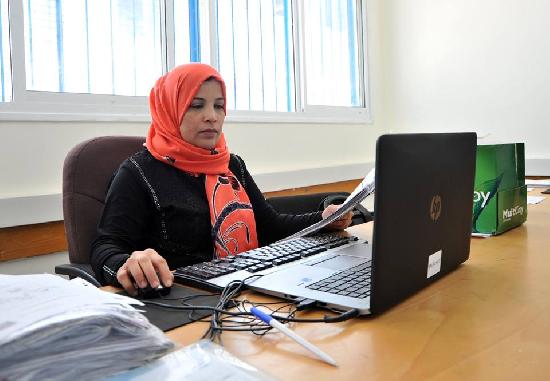
Iman Juma`a Abu Qun
Hekmat el.Faiomi from the Women Committee Zaitoun Collective Center has said, "Our house was totally destroyed during the conflict, and my family and I moved to an UNRWA collective center where we lived until they all closed in June 2015. In the collective center, I started working in various positions, as a handicraft teacher or as a cleaner for example. I was trying to give support and advice to the displaced. Living in the shelter was especially hard for women; they felt bored and anxious, and it was difficult for them to find privacy and a place to rest and be calm. I started to offer handicraft courses to give them a purpose and occupation to pass the time. When families started to move out of the collective center, I always felt happy and sad at the same time – happy because they would be able to gain their privacy back, but sad because over time, and in these difficult circumstances, we all became very close friends."
Yousef Mansour, a child who has directly injured in the 2014 Israeli airstrikes. He happily talked about the role of UNRWA employees in getting him stronger and able to face all the hard circumstances he had to overcome despite his lose for his leg, in particularly he is still a young child and always eager to participate in football games with his colleagues. When we met Yousef he said, “I was playing with my friends when I suddenly felt blood running down me. The next thing I knew, I woke up in a hospital with a great pain in my leg. I was sad seeing my friends going to school and my brothers playing outside in the street, while I could only watch them, unable to run or play football like the others. After the UNRWA teacher started his home visits, I was willing to learn again. In the future, I want to become a dentist, but my biggest dream is to walk to school again."
After all that support UNRWA used to provide to the Palestinian people in general and Gaza people in particular, UNRWA has recently decided to decrease its services to refugees in the four countries, i.e. Lebanon, Syria, Palestine and Jordan. Financial support to UNRWA has not kept pace with an increased demand for services caused by growing numbers of registered refugees, expanding need, and deepening poverty. As a result, the Agency's General Fund (GF), supporting UNRWA’s core activities and 97 % reliant on voluntary contributions, has begun each year with a large projected deficit. Currently the deficit stands at more than US$ 106 million and officials of UNRWA have reported the decreasing of UNRWA services especially in the education sector. However, many employees of UNRWA have rejected that decision; the popular unions and committees in the four regions have held demonstrations in front of the UNRWA headquarters to protest the decrease of services provided by UNRWA to the Palestinian refugees and displaced.
In the Gaza-strip, the protesters fear that UNRWA`s scaling-down its services is an attempt to eliminate funding the refugee problem. The protest was organized by the representatives of different Palestinian groups who support the refugees issue; they have urged UNRWA to reconsider its decision to scale back its services.

Gazans protesting UNRWA decision - "Education, Red Line"
Talal Abu Zarifa, a senior member of the Democratic Front for the Liberation of Palestine, warned UNRWA against the “anger” of the Palestinian refugees.“UNRWA needs to be careful not to enrage our refugees,” Zarifa said, at the Gaza protest. “Our people will erupt because they realize that this is a conspiracy against refugees, and not a financial matter.”
UNRWA spokesperson, Adnan Abu Hasna, said his agency was suffering from a severe financial crisis, explaining that UNRWA needed about $101 million.“Unless we obtain this sum, UNRWA will be forced to take harsh, measures and decisions, including postponing the opening of the new academic year”, Hasna said.

Gazans protesting UNRWA decision - "Education, Red Line"
By this decision, the Palestinian refugee students will lose a complete academic year. Sociologists say that this a harmful decision against the Palestinian society since children will have no schools and they will seek for illogical ways to spend their times and for sure that would expand crimes. The result will be poverty, crimes, siege, unemployment and darkness- physically and mentally. Physically for the lack of power and the often electricity-cut Gaza people are suffering from; mentally, for the UNRWA decision to delay the academic year for more than 700 schools in the Gaza strip.

Gazan Children with handwritten banners

Protest Procession
Yemen in Conflict: Children's Letters to the World
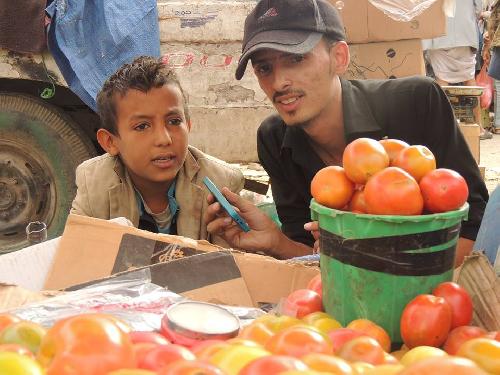
Children in Conflict: Abdulrahman(Photographer: unidentified)
by Hussam Alziydai - Correspondent (Sana'a), July 24, 2015
I want to be alive
The world follows the news which carries millions of stories to them from various regions around the globe. Millions of these people saddened or disheartened when they knew that Paris Hilton had a cold, or that some Chinese eat dogs. On the other hand, many of these millions of people do not know about a country located in southern Arabian Peninsula called "Yemen". People die there from starvation or from the war, such topics which can describe as humanitarian disaster. Unfortunately, the international media usually gives less attention to these events where there is painful suffering for millions of people in this country.In the southern Arabian Peninsula is the same place that overlooks the famous strait called "Bab al-Mandab". This strategic strait in the world, this land was called in ancient times by the Romans and the Greeks “Arabia Felix “, and was first country for growing coffee in the world.
While you read the letters sent to you by some of these children from “Yemen” to hear their voices, maybe one of them will perish by rockets of F16 of the Saudi-led Arab coalition airstrikes or by artillery bombardment by the Houthi militia.
As frightening, some of the older children may be coaxed into joining a militia, to get money for his family for they can live.
Yemen, one of the poorest developed countries in the world, ranks in the bottom of the list in human development indicators. Nearly 1.4 million children are used in child labor, with even a greater number who are not in schools.
I passed on a street in Sana’a that looks empty, because of the war, but I found some of the children and I talked with them and they asked me to send their letters to the world if possible. There are there letters from children in the midst of the conflict in Yemen.
Abdulrahman Saif, 12 years old, his clothes were not tidy because of poverty. His facial features seem to be tired. He said,
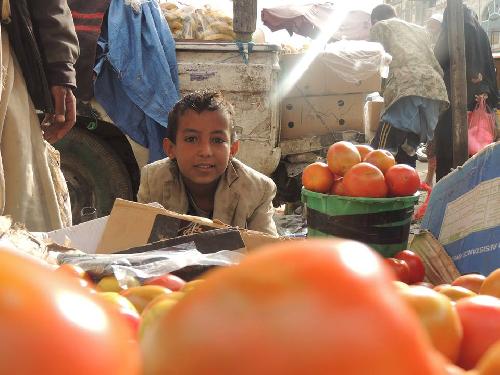
Children in Conflict: Abdulrahman
"I am Abdulrahman Saif., I am 12 years old and I am tomatoes seller. I have four brothers and I am middle one. We are working all to save money for a good life for our family.
Before the war exploded and the worsening security situation in the country , selling tomatoes was very profitable. I share with my brothers to buy food for my family, but now work is so bad there is no profits because of the war, now we are threatened by hunger.
Before the war, I go to the farms and buy from the farmer directly. The price was comfortable for both, and then I go to the market to sell the tomatoes. The work was great and I got good profit too , but now the situation is changed . The price increased twice than before. Farmers told me about the reasons for the high tomato price but these things I can’t understand it. The farmers said there is no fuel and there is no transportation means. Now when I sell my tomatoes to people with new price which higher than before, some face me with rejection and indignation. But they don’t know that high price resulted from the current situation in which we live, so the numbers of people became a little compared with numbers before the war.
Perhaps , you ask me , do I feel fear of war! I am not afraid of the sounds of aircraft and explosions now it has become something normal for me, but I really frightened to lose my family forever. I'm a child. I have rights, my place is not here, my place should be at home with my mother and my brothers. I hope from the world to work to stop this war urgently , in order to let me back to my normal life .”
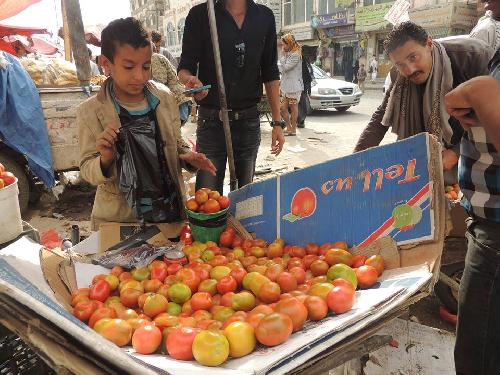
Abdulrahman
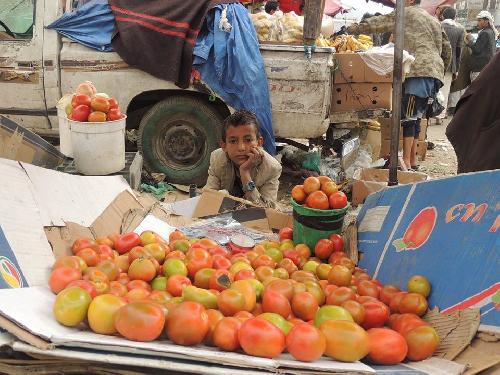
Abdulrahman
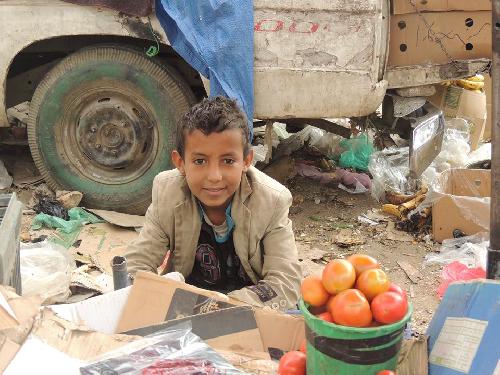
Abdulrahman
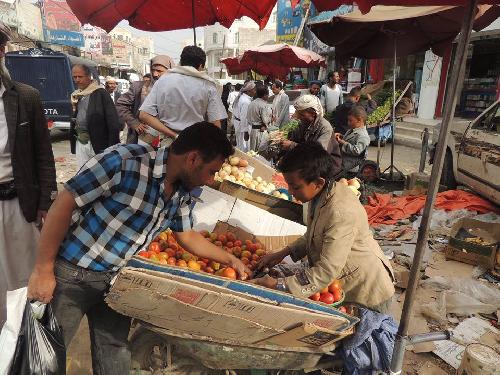
Abdulrahman
Hamza Ali Omar is a nine years old child . Hamza works as sellers for prickly pear says:
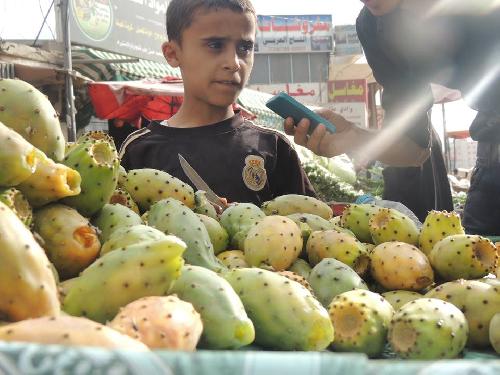
Children in Conflict: Hamza
"These days I sit alone with myself and think deeply about why as Yemeni children nobody cares about us. Why the rest of the world's children go during the wars to shelters to save their life but the Yemeni children go out to work under bombardment. I am a child, like me a lot of children here from Yemen. The work was good before war and you get a comfortable profit which enable me to go to school, but now profits have become almost non-existent an addition to the daily fear that I live. During my work I hear explosions and aircraft bombing clearly. Before I go to my school, but now the doors of the schools have closed because of the war. I miss my school , my teacher, my books and I miss the courtyard of my school and I miss so much play with my colleagues
Please, stop the war. I want to go back to my school.”
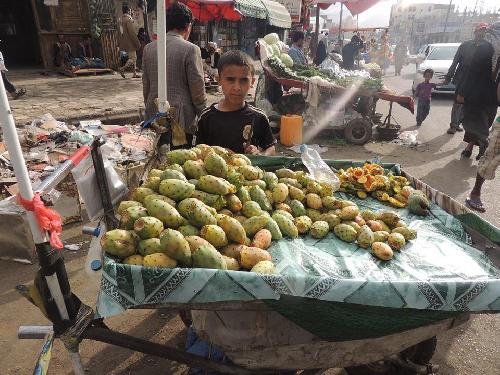
Children in Conflict: Hamza
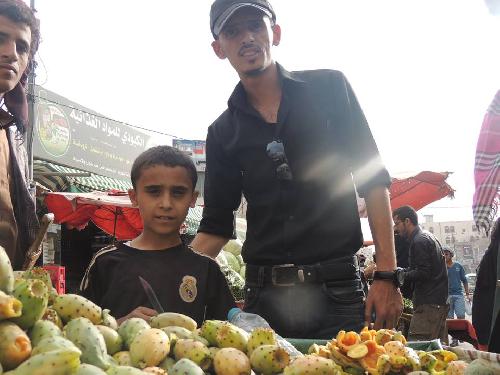
Hamza
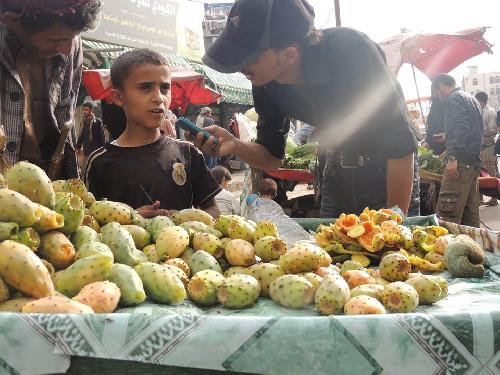
Hamza
Another child, Abdul Jalil Farhan says that his school was destroyed after being used to store militia weapons in it and taken by military positions before the Saudi-led Arab Alliance air force bombarded his school:
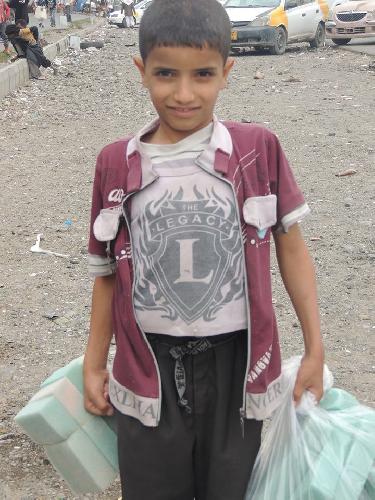
Children in Conflict: Abdul
"in that area my school was there", indicating with his hand to a place just several kilometers away, "I'd go to it in the morning and met with other students at school, I miss my teachers and my friends, I miss my desk, but it seems that I will not see my school again, it becomes desolate, and everything destructive, I want to go back again to my school to learn arithmetic and science."
Abdul Jalil works in the sale of sponges also adds "I sell sponge using my feet. I get out early in the morning to work and come back in the late hours of the evening, I study and help my father at the same time. Before the war I get out actively and have trust that I will work hard and will sell all sponges I have and come back to home , but now everything changes than before , I left my house and I feel fear from the sounds of aircraft and explosions. My normal places is not in the market, my place should be between my father and mother arms.
One day I was working in the evening. The sounds of aircraft and anti-aircraft can be heard clearly. The un-exploded bullets of anti-aircraft weapons came down and affects the number of cars and people in the streets. I saw that it almost caused me to be killed that evening., I was so frightened, I ask why this war ? and what they want from us ? I am a child and I have a dream to live safely in my home. My dream to be a doctor but tragedy situation of my country .the war shattered my dreams I hope that this war stops in order to realize my dream , and I hope from the mighty of Allah to save Yemen and Yemenis from all harm.”
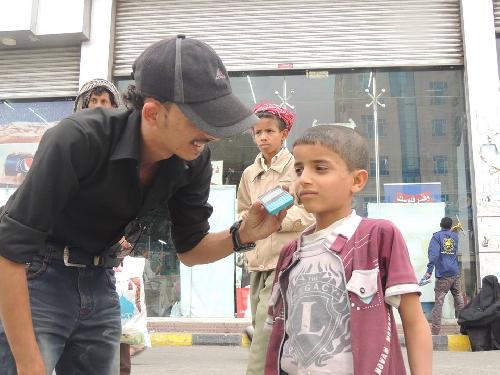
Children in Conflict: Abdul
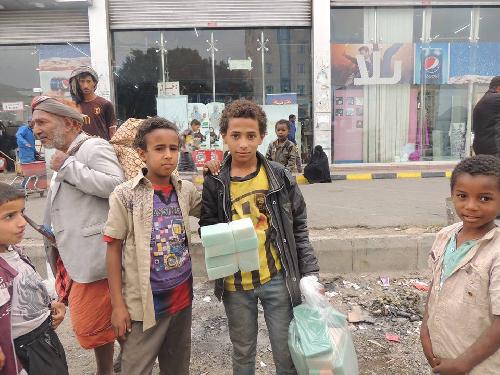
Abdul
Tawfiq Abdel Saif is a child. He said,
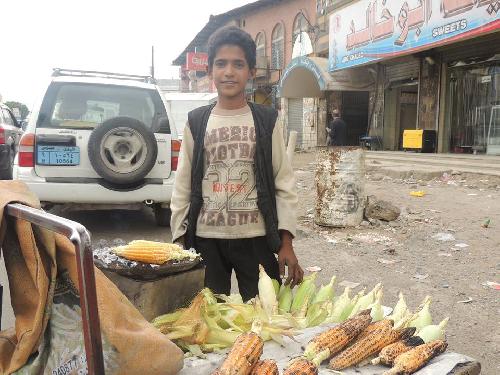
Children in Conflict: Tawfiq
“I am thirteen years old. I work in the sale of corn Sham. I work in this business for six years. I have a large family living in the village, and I work in the city. In order to provide my family with what they need for their life ,I go to my work in the early of the morning until the latest hours of the night. Tthe work was profitable, but now the profit became very little. I am a child and the rockets and bombs explosions make me frightened . I fear for seeing blood.
I remember when it Attan Mount was bombed by chemical bomb, which has killed hundreds of people and wounded , I was close to the target bombing place.
Suddenly , I feel the ground shaking under me after that I heard the huge explosion. I run quickly to hide under a vector to protect my life from death.
The explosion resulted in broken buildings windows which fall down above people. Serious injury due to flying glass in the place happens among the people where I was. Then I saw a father embrace his son and takes him to the car and drive away. In this moment I remembered my father and I asked myself why I'm not at home ? why this war ? we want to live in peace,
Please, stop this war children of Yemen do not deserve all this.”
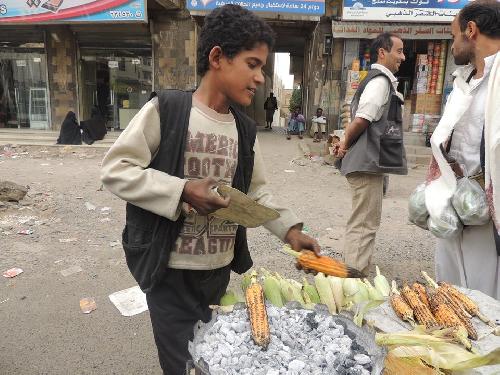
Childrwn in Conflict: Tawfiq
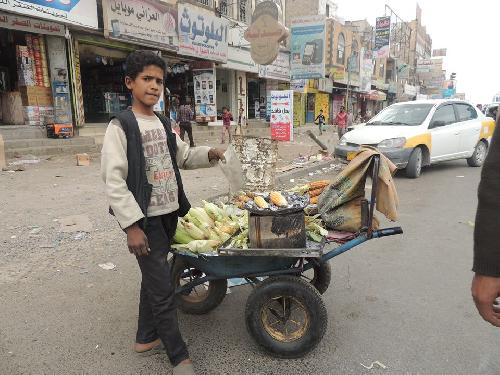
Tawfig
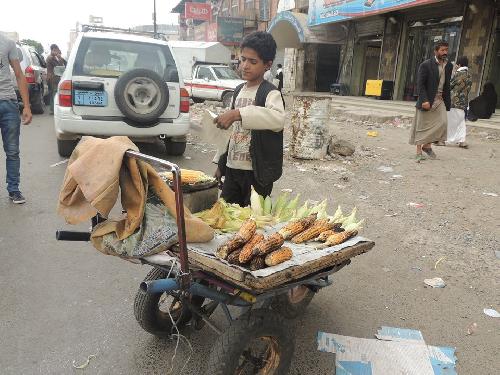
Tawfiq
Another older child talked to me , how militia offered him with a big sum of money for his family for engaging him in the war. It is very big amount than the earning money the child earned from his current work - a collection cans and sell them . Abdullah thought, if he will agree to engage with them or not. Then he realized if he went he probably will not back and that his survival with his current job is better for him.
Qahtan Showai, 11-years-old says,
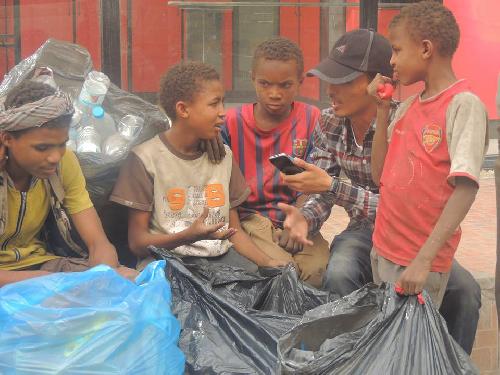
Children in Conflct: Qahtan
"I have eight brothers, I am the oldest. The people look to me for nasty work the ill-treatment and discrimination being marginalized, or from the black-skinned sons, before the war. I used to sell what I am collecting in cans, plastic plants, recycling and re-manufacturing and get a good amount, but now most of the recycling plants’ doors have closed because of the war and because of the crisis of oil derivatives, go out and I'm afraid for myself and my family, especially that our house is located near one of the camps controlled by Houthis [militia] which the coalition aircraft bombed. Afraid to go back into the house nor I find my family, once I was searching between waste for boxes, my hand hold a strange thing , I have dug up among the plastics boxes , my hand hold strange thing. I said to myself, ‘what is this strange body?’ Then I was surprised with suddenly by a man shouting loudly. He asked me to run from the place , later he told me it was an explosive device.
I am a child, and children at my age normally they do not see things like this.
When I watch the children of the world on television, study and play and go to the gardens that make me cry and say why I do not live like them
I want to live as children of the world, who I watch them and see on the TV”
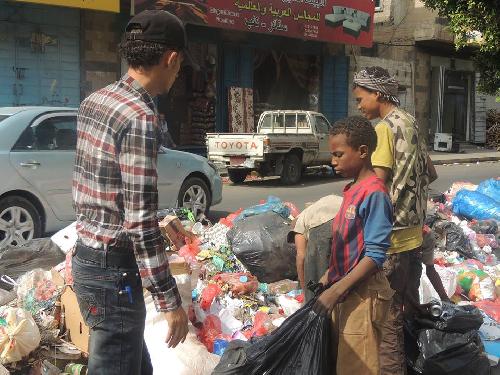
Children in Conflict: Qahtan
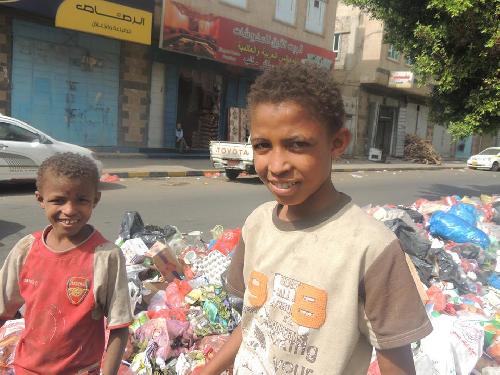
Qahtan
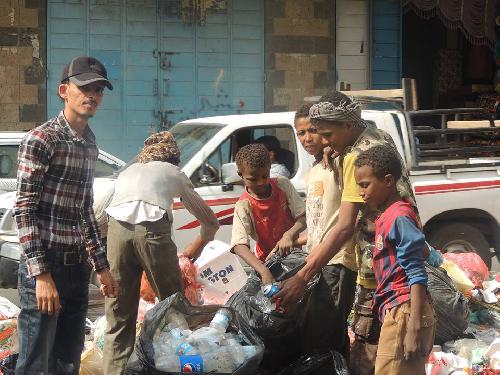
Qahtan
These and others have lost their schools, and some have lost their parents, others may lose their life at any moment. These children wish that to enjoy in a beautiful day at Disney World, but a day find themselves in a world of military action surrounded by death on every side. It is the world made by ignoring them for future projects devastating to them and to the world around them.
Freelancing: the Key Solution for Unemployment in Gaza
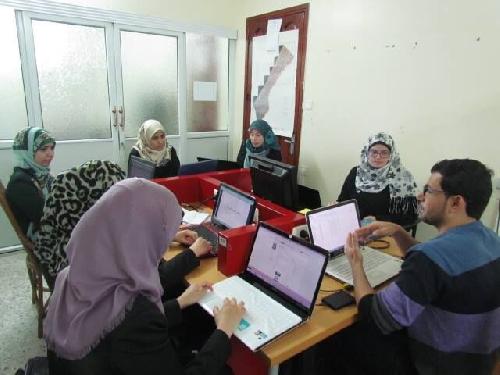
Students training at Mercy Corps (Photos Courtesy of Mercy Corps), July 19, 2015
by Sarah Sobhi - Correspondent (Gaza City)
Gaza freelancers have overcome the siege ONLINE.
The Gaza-Israel 50 day war and ongoing land and sea blockade by Israel and Egypt have resulted in severe economic conditions for youth employment. More than 8 years of blockade have caused a gap in the Palestinian economy, particularly in Gaza. In addition, the latest Israeli air assault on Gaza caused considerable damage causing a substantial increase in unemployment. The World Bank report says that the joint Israeli-Egyptian blockade and 2014 Israel air assault have left 43% of people out of work beside the dangerous financial crisis Gaza suffers. According to the World Bank, Gaza has highest average of unemployment rate in the world. According to the UN: “It is expected that labour market conditions in Gaza will further deteriorate following the conflict, exacerbating the impact of the blockade and the longstanding access restrictions imposed by Israel which have been preventing any meaningful economic activity."
Palestinians in Gaza have a strong commitment to education with high post-secondary education graduation rates; while the surrounding circumstances have created the highest level of unemployment in the world. However, a new path has been opened to the Gaza graduates – Freelancing-. Freelancing is the process of working online through some special online platforms that connect the client and the freelancer in a way that protects both rights and creates a professional business atmosphere. Freelancing was and still the only solution for unemployment due to the simple equipment it needs to be real. Beside freedom, competition and comfort; freelancing has become a full-time job for many of the Gazans and a part-time job for others.
Gaza freelancers have made this career real from simple equipment, i.e. a laptop or PC, internet connection and a skill due to their willing and determination. They insist to dig their future by their own hand and confirm to the world that Gaza people have a lot to serve and can compete in the international market.
Some institutions here in Gaza have supported this new field and tried to increase the awareness of the youth about the importance of their skills and the way they can invest them in a creative way. The first institution that has launched a program that support freelancing and its techniques is Mercy Corps. MC has given Gazans a unique insight about freelancing that it has become a lifestyle than a career.

Mercy Corps
Mercy Corps is an American aid agency that supplies the conflict regions like Palestine, Syria and Yemen. The agency focuses on connecting to both government and business for the changes the world likes to see. MC was founded in 1979 as "Save the Refugee Fund" and then it was expanded to be Mercy Corps with broader missions including long-term solutions for hunger and poverty. The global headquarters of MC is now located in Portland, Oregon, U.S.A.
The freelancing project MC has launched targeted the graduates whom have no opportunities because of the shortage of the job vacancies in the Gaza Strip. Its main target is to create employment for all those of the creative minds and talents who do not have a hand to enlighten them their path to the business market. This project is applied under the funding of the USAID. It is 3 months duration for each round. It supports postgraduates from all specializations, especially those who have creative skills that work online, i.e. writing and translation, IT including graphic design, web design, PHP and multimedia, virtual assistance and data entry.
MC targeted the youth who are well adapted to use internet services and ready to learn new skills, but at the same time do not have a job. MC worked to support the freelancers with different professional courses by professional trainers, who are already successful freelancers, in order to refine their skills to be ready to compete with their international colleagues. The freelancers have taken different courses for communication skills, writing, design, typing and many other courses. In addition, MC could determine different courses according to the need of the freelancers; if the mentor sees that his/her mentees need a specific course, he/she could ask the administration for an intensive course in the needed topic and everything could be managed within 24 hours.
One of the most difficult problems those mentees have faced is electricity. The Gaza Strip in general suffers a shortage in electrical power. Consequently, Gazans see electricity 6 hours daily –maximum-. Some of the Gazans have solved this problem by having the power generators or UPS, but still these solutions are not cheap and not all civilians can afford this. However, MC has helped its mentees by providing them with halls that supply them with electricity and free Wi-Fi, so freelancers can go to the center of MC and do their tasks freely.

Students accessing a computer equipment at MC
Some other freelancers have faced a problem in using English as the freelancing platforms deal with English as their main language. Therefore, MC tried to improve their language skills by providing them intensive courses in English language by a professional mentor and linguist. Moreover, the different fields' mentors are all fluent English speakers and writers, so they try their best to instruct their mentees to the right way of learning English, at least, the communicative English that enables them to communicate with their clients. Actually, MOOC programs were the recommendation of most mentors in learning language and even other related and unrelated skills for instance Alison.com.
On the other hand, Mercy Corps put into consideration that those mentees have to write a professional cover letter in order to be able to convince the client, so it supports them with special courses and workshops in how to write a professional cover letter that fits the job application. You would be amazed of the way those people begun marketing of their skills and services. Each one now has a client-base that they earn a temporary salary from, which vanishes their fears of the unknown future. They now know what they do and what they will gain.
If you ask, "Those people are besieged, how they get their payment from their international clients?" I would answer that they have had many solutions for the payment issue. Some found in the Payoneer MasterCard their best payment method, however, some prefer using skrill, and others use a bank account. On the other hand, they still suffer the inability of using PayPal as it is a cheaper method and solves the problems of the previous mentioned ones.
Gaza freelancers are working on the online platforms like Upwork, Elance, Freelancer.com and many other Arabic platforms like Nabbesh.com, Khamsat and Mustaqbal.com.
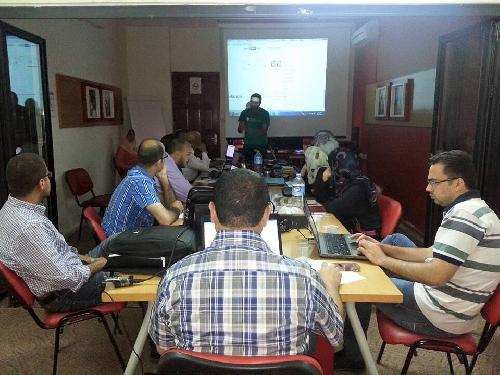
Student Training at Mercy Corps
Unfortunately, some platforms have blacklisted Gaza, considering it as a terrorist organization, for instance Proz.com. If you are Gazan and have created your own profile on Proz, spending days and nights establishing this profile with all its processors, you would receive an apologize email from the admin support of the platform that they do not support Gaza freelancers and they have to block the profile. Proz is one of the wide spreading and distinguished freelancing platforms, so it is a big loss for the Gazans for not be available there and benefit from the amazing business offers. This activity started to be implemented against the Gaza freelancers and agencies after the 2014 Israeli-Gaza 50 day war.
Despite this bias, Gaza freelancers have achieved the highest ranking and they all have distinguished profiles on the other platforms. Most of them have linked up with their clients outside the platforms and started working on long-term projects.
These freelancers have created their own success stories from nothing. They suffered, but they have worked hard and gained their fruits. We have, in Gaza, the highest-ranking PHP freelancer; we have credit translators and content creators. In addition, we have creative logo designers that gained the satisfaction of clients from all around the world. You could see the Gaza services in Turkey as a Gaza freelancer has created a bunch of logos for a series of Turkish restaurants. You would also see the Gaza print in a contract between a Saudi and American businesspersons as a Gaza freelancer has translated them the conditions of their contract and worked as an online interpreter for them.
There are success stories form both genders and all domains. Aya Kishko, an architect, is one of the engineers who benefited from this program. Aya has created her success by her willing and proactivity. She describes her life before freelancing as a life full of fears and ambiguity due to the difficult life in Gaza, but now she has unlimited creativity and could get her regular financial income without any fears. Aya has created a short video that demonstrates her experience with freelancing and we are happy to share it with her. https://www.youtube.com/watch?t=10&v=3NzJVezhvyw
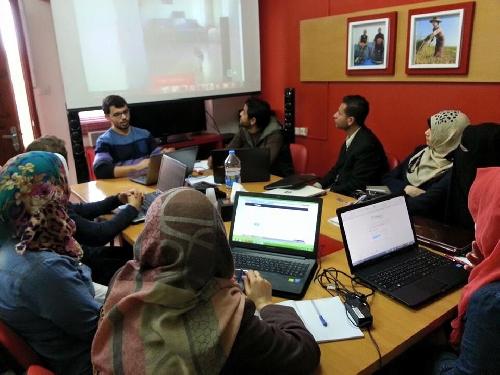
Student Training at Mercy Corps
Omar, a software developer, has created his own seat among the most successful freelancers who have spent years to create their reputation. He has become the fifth freelancer in his field at Elance, one of the massive international freelancing platforms, in spite of the short time of his membership.
Morals beside proficiency are the main reasons that attract the clients from all over the world to work with Gaza freelancers. They have succeeded in drawing a beautiful image about Gaza through their honesty and virtue. Waseem, a web designer and developer, has narrated a story happened with him as a freelancer that can be summed up in: The American client has rehired because of his honesty. It is worth mentioning that Waseem is one of the most professional web designers, a mentor at MC and the owner of the attitude of "drag your client outside the platform".
Rana, a writer and translator, has succeed in drawing the attention of an Indian client by her attractive way of writing her cover letter for the job application on Upwork. Rana has won the job and is working now as an hourly writer for a beauty and health agency in which she writes daily articles that are published in the agency blog.
The interesting about those freelancers that they do not just work as freelancers, but they have started working within the sector of outsourcing and provide jobs to other freelancers. You could astonish how they have become successful entrepreneur and overcome all obstacles that faced them as Gazan at the first stage specially the financial transaction issues. You could not be but proud of those people who are a model of the insisting proactive minds.

Gaza Freelancers example listings
Yemen: The lack of fuel, electricity and water

Cars lined up in a fuel station in Sana'a (Photographer: Ahmed Yahya)
by Najat Mohd - Correspondent (Sana'a), July 15, 2015
Since the start of Operation Decisive Storm’s airstrikes on march 2015 the humanitarian situation in Yemen has only taken a turn to the worse, as per the United Nations Office for the Coordination of Humanitarian Affairs, the death toll has exceeded 3000 civilians and 21 million people, 80 percent of the population, have been affected and are in need of immediate aid. The blockade of air, land, and sea transportation has caused a catastrophe in the public services sector thus affecting the livelihood of the civilians as the import of food products and fuel has ceased.
Even though the fuel shortage started months before the blockade, it became worse and the prices doubled in fuel stations and increased by above 300% more than the original price in the black markets during the times it was completely unavailable. As the OCHA’s report says,” Fuel has run out in many areas. Where fuel is available, prices have skyrocketed – Oxfam estimates that fuel prices have quadrupled in some locations. Fuel is urgently needed to pump water from the ground and to maintain services at hospitals and other critical facilities facing frequent power outages”.
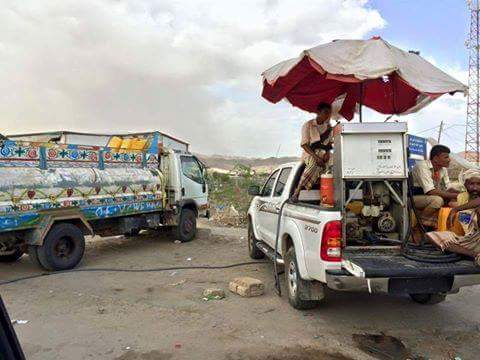
Fuel being sold in black market at extremely high prices (uncredited photographer)
The unavailability of petrol, diesel, and mazut (heavy fuel) eventually led the electricity power plants to almost go out of service. Today they only supply an average of one and half hours of electricity every week, that along with the on land clashes between tribal militias on the area along with the Saudi-led coalition airstrikes have led to the damage in several if not all electricity power plants and poles situated in Mareb and its surroundings which is the only electricity plant that feeds the whole country. The shortage in electricity has affected major vital requirements of the country including water and health care systems.
Petrol stations have been working over capacity to provide the available fuel to the citizens; however the supply never reaches the increasing demand as people have become dependent on petrol or diesel powered generators to go about their day to day needs. The sight of cars standing outside fuel stations extends to miles ahead blocking major streets and paralyzing traffic in cities. Fights, gunshots and sometimes killings are a common thing in these queues. At times unidentified armed gunmen come along breaking the queues to take the remaining petrol or diesel from the stations by force.
One of the queuers in the fuel station was Mohammed Salem Bataher, in his own words, “I have been in line for over 5 hours now, usually it takes from a few hours to a week of queuing to get fuel depending on its availability in the stations. Even though there are places that sell petrol (black market) over 10 times its original price, its way too expensive for the average citizen so we come here and queue then siphon the petrol out of the car and use it for our generators as there is no electricity ”. The lack of fuel and long hours of lining up have caused many disturbances and acts of violence, Mohammed commented on the issue as follows, “Sometimes people pay the station officials so they can go ahead in line and finish faster than everybody else, others just try to cut ahead in line, which causes fights that sometimes end in bloodshed and sometimes armed gunmen take the remaining of the fuel by force”.
Nasser Abdulmalik is one of the many unemployed citizens who has found a rather new way of earning a living, as he described his new found job,” People pay me about $10 (USD) to wait in line with their cars for fuel, I sometimes wait for hours or even days, times are hard and there are no jobs and this is how I have been getting an income for the past few months.”
The increase in violence in fuel stations has led the authorities to start a women only fuel station in the capital Sana’a. A young lady by the name Khulood Khalid describes her experience as follows, "I woke up Friday morning at 4 am to catch the petrol station queue by 6 am because my Aunt and I heard there is petrol. We went to the station and it was already flooded with women queuing, the line was really long and we knew we had to wait for hours if not days. It was only my Aunt, her friend and I, we stayed in line for over 15 hours. We were all fasting and under the sun, what really frightened us was that we were three women alone with no food except dates, biscuits, juices and a bottle of water, I had a teaser and my Aunt had a dagger hidden just in case we need to protect ourselves. Occasionally cars kept over crossing other cars which caused fights among the women. To make it all worse, when we were third in line and almost done, a pickup truck full of armed men came to take the remainder of the petrol from the station, so they lied and told us all that the station has closed down. The woman who was first in line came out of her car to protest the unjust situation and she went into a verbal conflict with one of the armed men. He then pointed his gun at the station owner and the woman too got her gun out. They calmed down and finally and let us fill up our car and we left in shock, and scared. We don’t know until when we have to fight to get our day to day basic needs."
Since electricity has been cut off from the whole country, people have started using diesel or petrol powered generators, solar energy or even car batteries to generate electricity. The shut down has also affected the water supply system as the generators lack fuel to run. This caused an increase of 400% and above in the prices of water tanks which forced many families to depend on public water taps and mosques for their daily water needs.

Women and children at a public water tap.
Ameera, one of the women awaiting her turn, a mother of 5 says, “We have no water and can’t afford to buy a water truck anymore as the price has tripled, and my husband lost his job. There is no electricity either, so even if we have water in the tanks we cannot get it to the taps without electricity. Since the schools closed 4 months ago, I have been sending my children to fetch water everyday but today they all slept so I had no choice but to come myself”. A large portion of the population cannot get access to clean drinking water since the start of the conflict.

Public water tank in Sana'a.
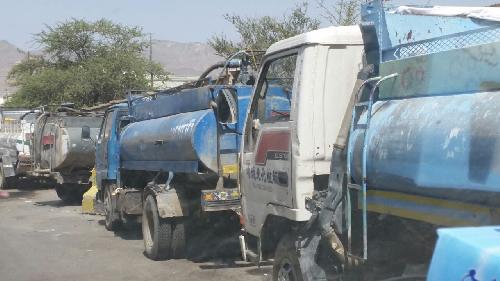
Water trucks prices have more than tripled.
It has been 104 days since the complete electricity blackout in Yemen, and the power plants supply about 1 hour to 1.5 hours of electricity to the citizens every week, sometimes every other week. This has led the health care system to crumble and slow down as hospitals started running completely on fuel instead of electricity. The shortage has lead some hospitals to shut down and go out of service while others offer only emergency services, and most have stopped complicated surgeries as the lack of equipment remains an obstacle.
The lives of patients in hospitals whose survival depends on the availability of electricity have been put in grave danger. Kidney dialysis patients and the neonates sections in most hospitals are barely working and over capacity to provide the care they need. Medicines that need refrigeration have gone out of use as there is no electricity and the country is short of fuel. Some hospitals even asked people to donate the little fuel they have so they can use the generators for emergency situations.
The lack of fuel has also caused the garbage disposal services to slow down which has caused mountains of garbage to be piled up on the corner of almost every street.
Hotter areas like Hodeida and Aden have had it worse after the electricity black out as the temperature reaches a frying 40C degrees during the day. “The electricity blackouts have been devastating in Aden, since it is really hot and the air conditioning doesn’t work and water is cut off.” says Noor. Another mother of one says, “My son is 10 months old and he got rashes all over his body from the extreme heat and humidity of Hodeida. There is no way of cooling the room for him and I do not know what to do”.
A humanitarian cease fire has been declared by the United Nations till the end of the month of Ramadan on the 17th of July in order to reach the affected areas. Yet the lack of fuel remains a hurdle to overcome, as organizations will have a problem in reaching those places without adequate fuel.
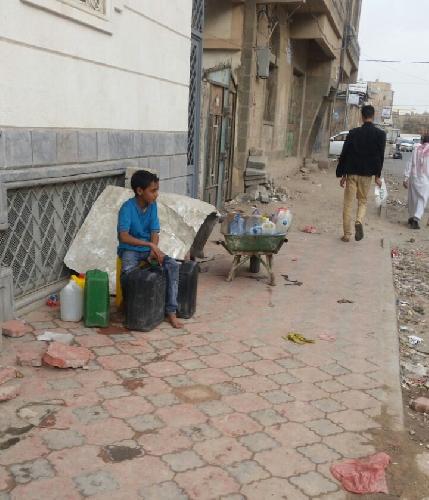
A young boy getting water for the family
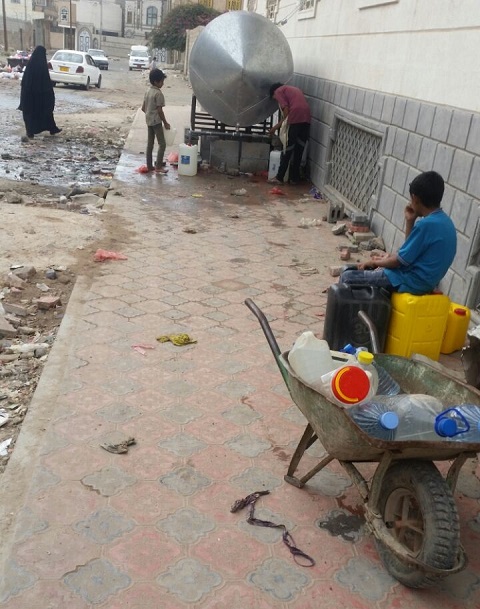
Children getting water from public water tanks
Faj Attan: Ghost District in Sana'a, Yemen
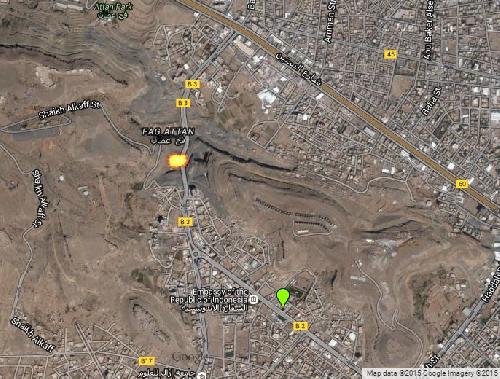
Faj Attan location (Photographer: Najat Mohd)
by Najat Mohd - Correspondent (Sana'a), June 24, 2015
The political and military conflict in Yemen between the Saudi led coalition of Arab states and the elected president, against the Houthi Militia and the former president Saleh has left major vital areas of the capital city Sana’a abandoned and paralyzed, making them almost ghost districts within the city. Neighborhoods have been demolished to ruins, houses flattened down to nothing and many innocent civilians lost. The intensity of the coalition airstrikes varied according to the weapons used, and so was the irreparable damage. This article covers one of many districts that were severely destroyed beyond repair due to the heavy weapons used against weapon storage bunkers on the hill above it, and continues today to remain a target of coalition airstrikes.
Faj-Attan, a district in western Sana’a, was one of those places that lie right in the heart of the capital yet far enough to be calm and serene. Prior to the conflict, it was quite new but it expanded quickly over the years and became one of the city’s fanciest neighborhoods. Aside from all this, it was also one of the army’s largest weapon storage units in the whole city. Legends are told among locals of how the storage unit was built by digging deep into the mountain undisclosed caves for eight years and how it has nine blast-barrier doors, making it impenetrable to break through by any means.
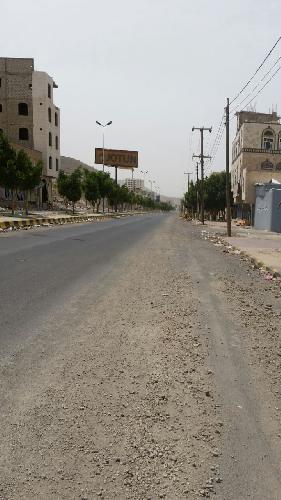
Abandoned streets in Faj-Attan
The presence of a large portion of Yemen's R-17 Elbrus (Scud-B) missiles and Transporter Erector Launchers (TEL) are believed to be in the storage units in the mountains, which is now under the control by the Houthi Militia, has made it a recurring target to the coalition airstrikes since the first week of the conflict to this present day causing a large scale damage to property and overall, civilian lives.
The type of missiles dropped on the site varied in intensity and number since the start of Operation Decisive Storm in Sana’a on the 25th of March 2015. There were days when the airstrikes would target the mountain overlooking Faj-Attan for days to demolish layers of the mountain to uncover the weapons storage.
The airstrikes on Faj-Attan did not only impact those who live in the vicinity but also those who live miles away. Salwa Al-Abiad, who I meet and lives in the old radio station neighborhood, was immensely affected by the constant shaking and noises the aircraft and anti-aircraft guns produced. In her words, ‘every time they raid the city we live in extreme anxiety, stress and fear. We have no political affiliation what so ever, I don’t understand all this hate, I am scared for my son and my family and its impossible for anyone not living here to understand our suffering or what we feel and go through every day. We used to empathize with Iraq, Palestine and Syria but its different when we live this every day. Besides feeling scared we feel wounded, hurt and betrayed by the world”.
In the beginning of the airstrikes, families started fleeing Faj-Attan in hopes of finding refuge with a relative or friend’s house for a day or two, but when it took too long and the situation didn’t seem to be getting any better many of the families went back to their houses. The sudden start of the airstrikes and blockade of air, land and sea transportation have turned the civilians’ lives upside down. The lack of proper evacuation plans for the residents in the targeted areas, along with the absence of crises control centers, and the already deteriorating services of health, water and electricity worsened the situation and put the residents in grave danger. But all that did not stop them from coping with the situation and living with the minimal possible a human being would need.
In the morning of the 20th of April 2015, the whole city shook like an earthquake hit it, and after a few seconds it witnessed the strongest explosion since the start of the attacks. The sky was filled with black smoke and mushroom clouds. The Scud missile storage units started spitting out exploding armaments which sparked a series of explosions, houses in the district were destroyed, windows of buildings miles away shattered, cars burned, pedestrians on the streets were injured and killed by the flying debris and others thrown back by the pressure and intensity of the explosion - 46 innocent lives were lost, and 300 more were wounded. Almost two months after the incident and Faj-Attan is still taking airstrikes.
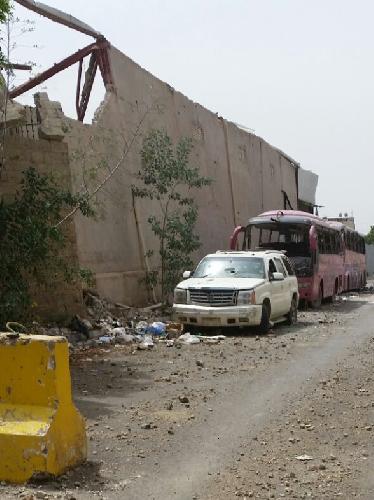
Burnt out cars and buses from the explosion
I went to visit the district. It is almost a ghost town, every now and then I saw a car passing by or a person rushing as if to avoid any sudden air strikes. The whole neighborhood lurks of death, abandonment, injustice, and fear.
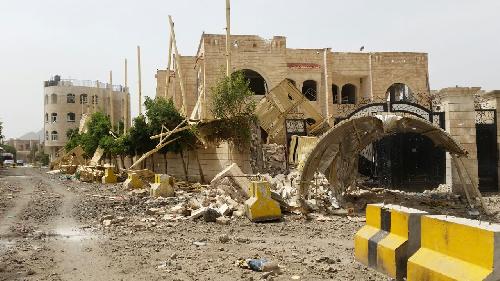
One of the many damaged houses in Faj-Attan
I managed to find one particular young man by the name Fares Mohammed. His house has been destroyed and almost reduced to ruins after the attack on the Scud missile storage unit. He said, “Before the crises, we did struggle a bit with the necessities of life like electricity, water, and fuel as there was constant shortage, but we always found our way around. We worked hard to make our dreams of getting educated, having jobs and building families with the little resources we had.”
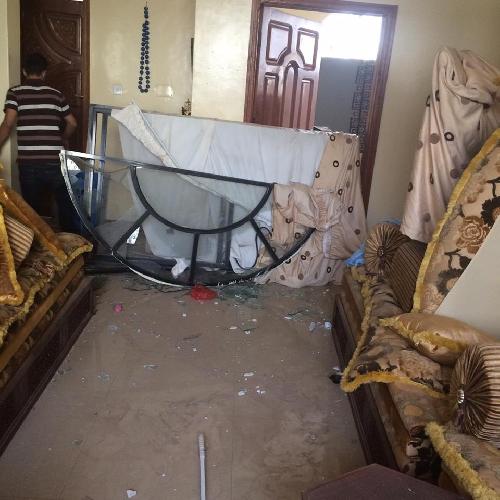
Interior damaged to Fares Mohammed's home
As Fares explained, life was not as simple even before the conflict, it only took a turn to the worse. In Fares’ words, “but now we don’t even have the little hope we had a few months ago. Universities and schools have closed down till further notice, students lost a whole academic semester, year 12 examinations have been put off, many companies closed down and thousands of jobs were lost leaving a lot of families without a source of income…and due to the absence of running water, our kids are being used to fetch water from local mosques every day. More than half of the neighborhood houses and buildings have been destroyed; there is no way anyone can afford to rebuild what was destroyed. The building I live in has taken a pretty bad hit too, after the big explosion three rockets exploded out of the storage unit and hit the building, the apartment above ours has been destroyed completely, my neighbor and his wife were still in it, they were no causalities, but his wife got a miscarriage from the scare. The building on the other side of the street was cut in half by the explosion, a whole family died leaving behind a 12 year old orphan girl. Pedestrians lay dead on the streets and cars were burning, despite this I still live here and we still get raided every now and then but I can’t move away to a safer area because of the absence of jobs and a stable income. I hope this gets resolved fast so we can start rebuilding our lives again”.
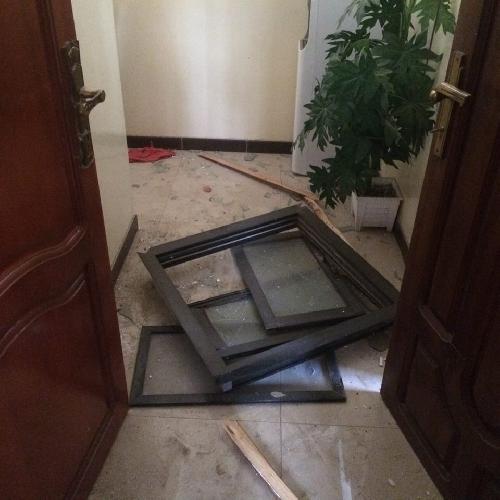
All the windows shattered or blownout on Fare Mohammed's home
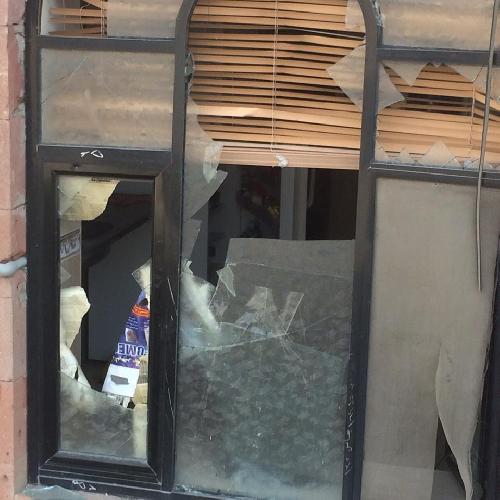
Exterior shot of shattered windows on Fare's Mohammed's home
Ahmed Yahya, a resident near Faj-Attan said, “The hardest part of the raids Faj-Attan took was the noise of the huge explosions and not knowing when to expect them. The worst, when the windows shattered and filled the floor, we saw people running out of their houses because it was not even safe to stay indoors”
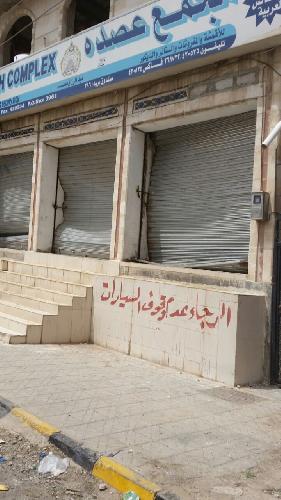
The intensity of the explosion bent the metal doors of storefronts
The Yemenia Airways office was one of the severely damaged buildings, a staff member who chose to remain unnamed narrated her story as follows, “I was catching up with my colleagues when the windows suddenly exploded, I watched as the glass from the window flew into one of my co-workers head and blood rushed from his mouth and head, the other was thrown back by the explosion pressure, I stood in shock and didn’t know what to do”
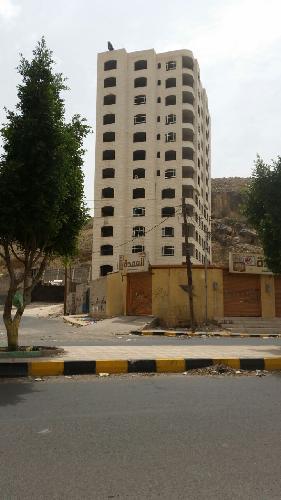
Commercial building with all windows blown out
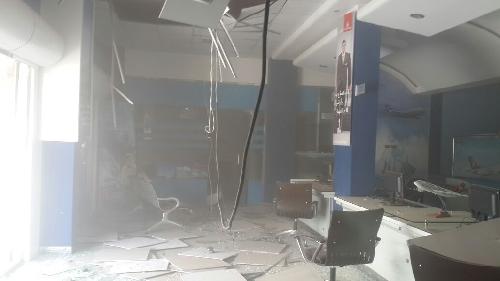
Interior damage to Yemenia Airways office
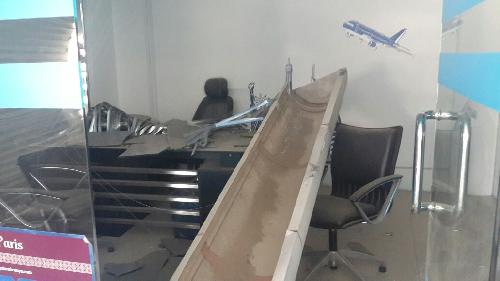
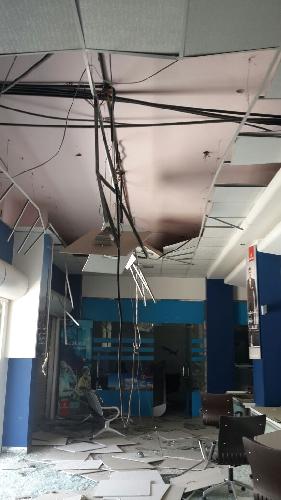
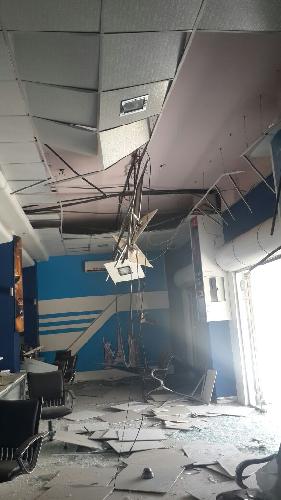
The impact of the explosions in Faj-Attan has gone beyond the district and reached houses over 7 miles far, stores, malls and show rooms windows landed shattering on the streets and women and children were heard screaming from almost every house, some ran to the streets uncovered because glass from the windows stabbed their bodies. The fear that there might be a series of similar explosions has made a large population of the city migrate to the villages on the outskirts of Sana’a. While some chose to cross the borders under hard conditions for safety in the Kingdom of Saudi Arabia, some succeeded and some remain stranded on the borders waiting for approval to cross. The population left inside the country hope for a humanitarian cease fire, truce or soon a solution to the conflict.
Even with the start of the holy month of Ramadan, the situation hasn’t gotten any better. Life under siege has only made it worse for the citizens living in airstrike prone areas like Faj Attan. Even though charities and initiatives have been trying hard to meet with the needs of the displaced families, international organizations have not yet been able to provide the help needed to the majority of the population in need. The current humanitarian situation in all the targeted areas and the rest of the city are deteriorating quickly.
Yemen in Crisis - 25 million civilians cannot escape the Conflict
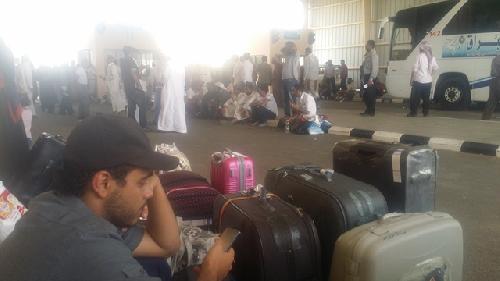
Civilians awaiting to cross at Alwadia'a Border Outpost (Photographer: Husam Alziady)
by Hesham Alziady - Correspondent (Sana'a), June 14, 2015
Yemen has become a country without any ports or active passage ways that allow civilians to get in or get out from Yemen, which means that Yemen has become a prison for 25 million people, as well as leaving overseas Yemenis stateless whose visas in different countries have expired and are stuck in International airports.
The air strikes by the Saudi led Alliance were so sudden that none of the Yemeni outside of the country, like students who study in foreign universities or patients getting treatment in Egypt, Jordan, and Germany expected it, all of a sudden, they found the return home to Yemen completely closed.
The first air strikes were on the Sana`a International airport, followed by successive airstrikes against all Yemeni ports of entry, leaving them inoperable.
The Saudi led Alliance’s air and sea blockade has left Yemen’s civilian population in desperate need of fuel, food and medical supplies. Ahmed Asiri, spokesperson for the Saudi led Alliance, has said, “the blockade was imposed to prevent military supplies from Iran to the Putschists [Houthi militia]”.
Currently, passages through border posts are rare. The border post between Yemen and Oman is very difficult to pass through. There are two border posts between Yemen and Saudi Arabia, Harad and Alwadia’a. The Houthi militia have taken control of Harad and the armed forces and groups supporting the elected president, who is residing in the Saudi capital Riyadh, have taken control of Alwadia’a.
We headed into Harad which is hours far from where we are in Sana’a, the Capital of Yemen, to find out the humanitarian situation of the Yemeni citizens who are stuck and can’t get out of Yemen. However, only one hour after we started our journey we were warned that this area is witnessing a serious military engagement, between the armaments of Saudi Arabia and gunmen from the Houthi militia and followers of the previous president Salah. Further news reached us that the Houthi gunmen are preventing civilians from leaving Yemen, so we would not be able to pass thru there. We immediately changed our way to the Alliance controlled border post at Alwadi’a, which is 12 hours faraway from where we.
We passed thru several check points between Mareb and Sana’a where Houthis are gathered nearer to Mareb. The bus driver advised us to tell them [Houthis] we were going to Almahara in east Yemen, not Alwadi’a, for the Houthi not to consider us infiltrators and prevent us from passing through the check points. We did so and could pass the check points and started entering Hadramot city which is under control of the armed forces of the elected president.
From Hadramot, we can reach the Alwadia’a border post, and we finally reached it at night, 12 hours after we left Sana’a.
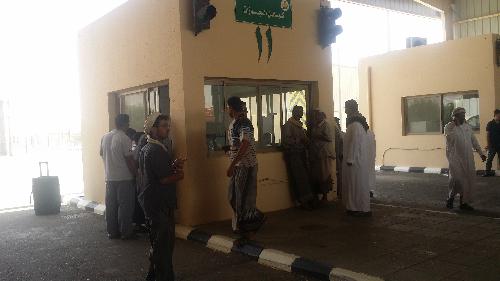
Men wandering at Alwadia'a Border Post
We got shocked by the miserable situation of the Yemenis who are stuck and waiting for permission to pass from the Saudi side, despite having all the proving papers and documents. Many children, old men, students and patients had been waiting upwards of weeks for the permission to pass through Saudi Arabia to other countries.
Yemenis Awaiting at the Alwadia’a Border Post
An older women in her seventies lies down inside their car’s trunk waiting for the permission to pass and get a flight for any airport to Jordan for medical treatment. She came from Shabwa at the eastern part of the country and tolerated the travel’s efforts and expenses to unfortunately find herself stuck at that border post despite having the proving papers and documents.
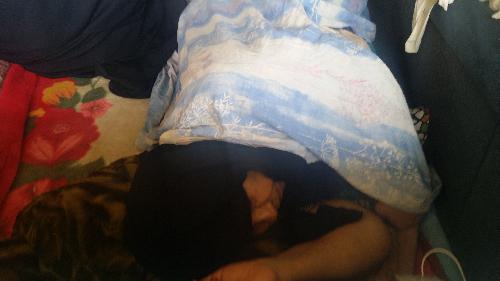
Sick woman awaiting permission to cross for medical treatment
Her son said they had been waiting at the border post for two days and had been rejected to enter, upon the arrival there by Saudi governorate. Her son said, "her health status is getting worse every moment, and she is in danger of death". We could hear his sick mother groaning. While the son is telling about their suffering to the recorder, lots of other stuck people were attracted to this scene and accumulated to share with the man when he continued talking and blaming the Yemeni embassy in Saudi that could have some procedures to solve this problem in cooperation with Saudi government.
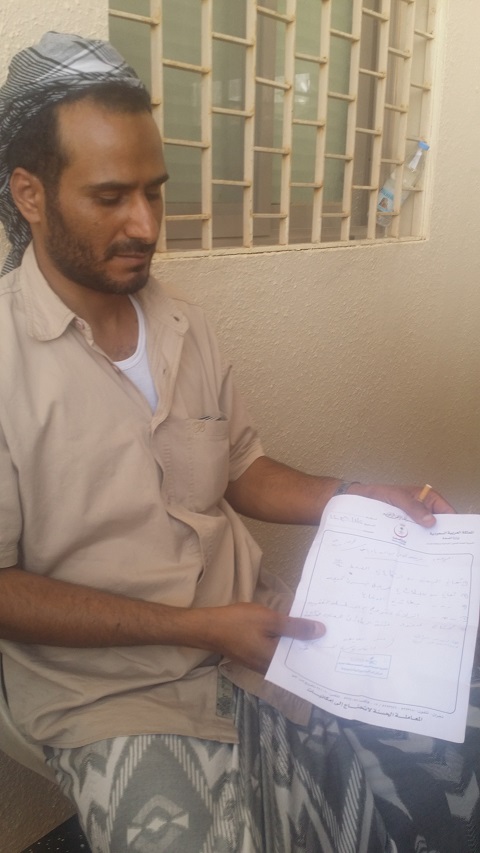
Son of the sick woman showing her papers.
Another suffer story details were found in the eyes of one of the youth, a well-dressed student, Missly Bhibih, who is originally from Mareb, the land of oil. He has been preparing his master degree in business in one of the French universities in France. He was at the border post waiting for the permission to pass in order to attend an appointment with the French embassy in Saudi for him to go back to France to complete his final year of study. He was planning to come back after he finishes to put what he studied to practice in our homeland.
He was rejected entry and wondered why Saudi Arabia was stopping him from passing.
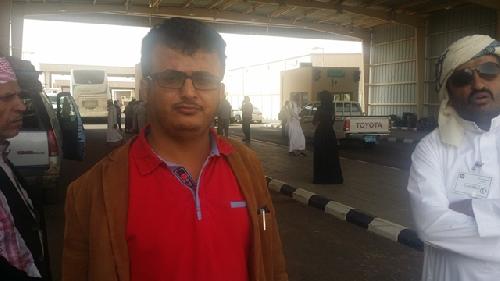
Missly Bhibih waiting for permission to pass through
Many others stories were scattered all over the 500 meters square place. Each person was hoping of passing to either go back or travel outside breaking down the barrier that has been built between Yemen and the outside world making Yemeni totally isolated specially with the Yemeni ports suspended.
Foreign Embassies are Closed
With the bad security circumstance in Yemen, foreign embassies have closed their doors and left their offices in Yemen. Leaving many people finding themselves in a bad situation that they could not obtain a visa to go to Europe, Middle East and other countries, to get medication, medical care, official business and studies.
Will the Yemenis Issue Get Solved?
Ninety days have passed and these situations are happening daily for thousands of Yemeni citizens who lost any contact with the outside world and their families.
Whenever new
s spreads about an armistice between the armaments of the Saudi led Alliance and the Houthi militia and previous president, Saleh, it heralds the hope for an improvement in the situation of Yemeni citizens inside and outside of Yemen.
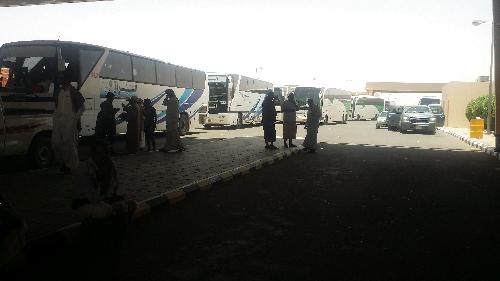
Buses awaiting at border crossing for permission to pass through.
A mass wedding is celebrated in Gaza on the anniversary of Marmara
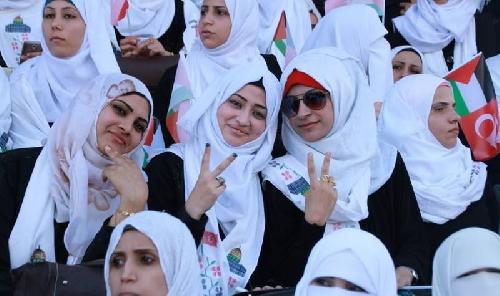
Several Brides awaiting the group Wedding Ceremony (Photographer: Sarah Sobhi)
by Sarah Sobhi - Correspondent (Gaza City), June 13, 2015
After the Israel-Gaza 50-day war of 2014, the civilians living in Gaza began to feel the damage of this war on their psychological, social and material life. When walking in the Gaza streets, I see how people are covered with masks of confusion and ambiguity.
The impact of the 50-day war between Israel and Hamas combined with the economic blockade by both Israel on land and sea and Egypt along the Sinai Peninsula, has resulted in a deteriorated life and living conditions for Palestinians in the Gaza Strip.
The inter Palestinian conflict between Hamas and Fatah factions complicates the situation, leaving many of the afflicted people whose homes were destroyed and family members killed feeling forgotten. The severe plights of the Gazans (people) after the 50-day war have been largely unnoticed and forgotten. Psychologically, many civilians suffer from thantophobia (fear of losing someone).
On May 31st, the Turkish charity institution “Tika” sponsored a mass wedding ceremony as a healing for the injuries of the civilians who suffered most during the 50 day-war from the air strikes and shelling by the Israel Defense Forces (editor’s note: The UN estimated 20,000 residential homes were destroyed, 1492 civilians killed of which 742 fatalities came from 142 families, who suffered the loss of 3 or more family members in individual bombing incidents on residential buildings).
Tika coincided the event with the anniversary of Israel interdiction of the Turkish Mavi Marmara Freedom Flotilla aid mission to the Gaza Strip on May 31, 2010, which left nine Turkish nationals dead (editor’s note: The UN report cites the deaths as a result of excessive force by the commandos when they unexpectedly encountered violent, but unarmed, resistance to the boarding).
Tika promoted the event as healing an injured nation in the memory of their own injury. The wedding drew an estimated 2000 brides and grooms in the Gaza Strip. This ceremony was held at Al. Yarmouk Stadium in Gaza city.
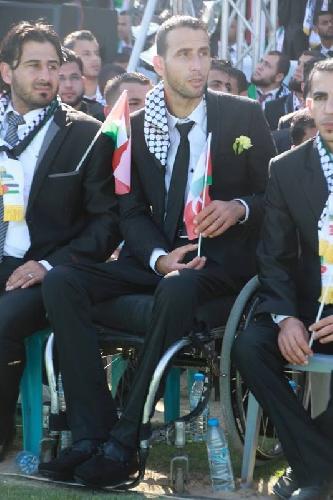
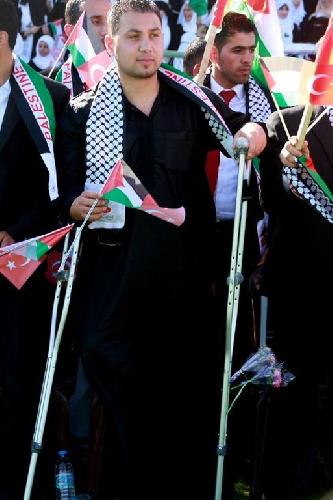
Civilians disabled from the conflict awaiting the marriage ceremony
The ceremony was attended by distinguished figures of the Gaza community, and attended by Dr. Mehmet Görmez, the Turkish President of Religious Affairs, who declared in his first visit to Gaza the funding of the wedding. Ismail Haniya, former Prime Minister and the senior political leader of Hamas, delivered a speech in which he congratulated the couples and confirmed on the Palestinian willing, i.e. "whatever Israel intended to do in Gaza, we are still alive and fight, we will marry, make families and have new babies and bring them up on the love of life and land", he said.
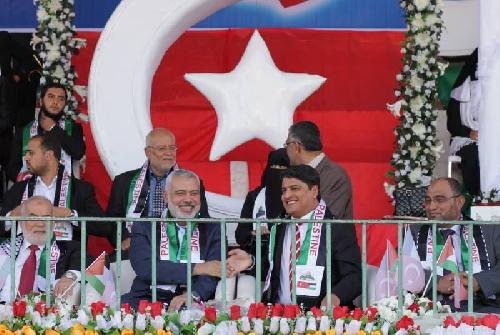
Hamas Leader, Ismail Haniya, with others in attendance at the ceremony
"Thank you Turkey" was the common slogan among the audience and the couples. You would see that phrase in the streets and on the walls of the facilities. We saw children carry banners holding this slogan in Arabic, English and Turkish. In addition, the speeches began with the same phrase as a way of appreciating the Turkish efforts in drawing smiles on the Gaza faces. Officials declared that this wedding is the biggest of its type in Palestine and the Middle East as a whole.
Ashraf Zeyad, a member of the preparatory commission of the mass wedding , has said that selecting couples was according to certain criteria. They were decided in accordance with Tika; he indicated that the chosen couples were the poorest and the people in most need. A special committee who surveyed their social and financial status decided them. They used their own employers from the institution to collect the information and categorize the priority of need in an objective way.
A mass audience attended the wedding and was pleased and delighted as Tika supported the ceremony with beautiful Palestinian traditional shows like dabka and plays. Children shared the event delightfully, as they missed such atmospheres from long time ago.
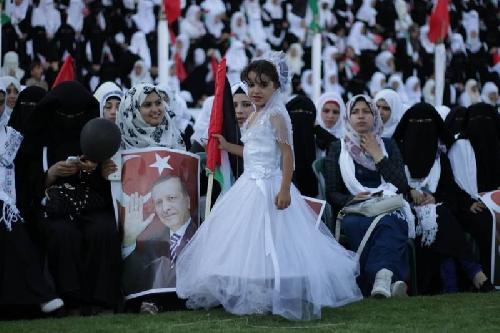
A young Palestinian girl performing customary function comparable to Flower Girl in Western-style weddings
Majd, a ten-year old boy, was over-excited when he saw the dabka show and told us "this event is the best I witnessed since my kindergarten graduation ceremony. I liked the brides, they are like princesses. The couples are just great; I wish the security could allow me to shake their hands one-by-one and say "Mabrouk" (congratulation) for all of them" Majd tried his best to do so, but the security prevented him. Majd wanted to show his support of the couples and he wanted to tell them a certain massage of "this ceremony may not compensate your loss, but we all love you and we all here for you, celebrate your new life and wish you a fruitful life away from any new loss or grief".
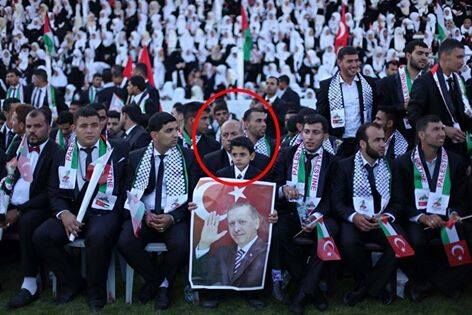
Ten year old Majd holding poster of Turkey President Erdogan
When interviewing some couples who were benefited from this event, we met D.K. She was pregnant and sitting at the stage as a bride. We all got astonished of how a pregnant bride could celebrate her wedding that late, especially where having a baby before the marriage is not a customary in the Palestinian society. We asked her about her circumstances, she said: "At the latest war, my husband lost his entire family, so it was illogical to celebrate a wedding while he was in mourning over his loss.”
D.K., continued, “He has lost them in a horrible massacre. The IDF dropped an F16 missile on their home where the family had gathered. My husband was at the mosque and some people in the neighborhood told him after 3 hours of the massacre of his family."
She added, "My father helped my husband and supported him to make him feel that we are his family and he encouraged us to get married as soon as possible." They got married without any parties or celebrations, but to help the only survivor of the family from getting lost from the shock of his lose. Tika categorized those couples as the most needed people for happiness and support. D.K expressed to us her pleasure mostly for having her husband smile once again. "Look at him, he joins the dabka", with tears she added.
Qdaih, 50 years old, was one of the grooms. The audience was astonished of Qdaih attendance among the grooms due to his age. Qdaih, from Khozaa-Khanyoinis, has lost all his family except one of his children, in an airstrike on the family home, who only survived because he was with his father out of the home. Qdaih has lost his family, his home, land and all his belongings. Therefore, he is unable to create his life again or take care of his 3-year-old son. He has lived in an UN/RWA school as a shelter ever since the war. Tika officials said that their main priority is people like Qdaih. The boy needs someone to take care of him and his dad, so the best solution is to help him get married to start his life from scratch again.
Turkey has promised to construct 20 residential buildings, including 340 apartments on a space of 19 acres. These apartments will be specialized for the civilians who were afflicted the most by the Israel-Gaza 50 day war and whom have neither received help for their lose from UN/RWA nor from the Palestinian parties.
Suad, one of the benefited from this honor, expressed to us her happiness of that great help as she considers, "No more tents, we will find a clean place to take a good shower, I will cook for my family again, we will have comfortable place to sleep", she said. These people are happy because they are given the basic rights a human being could ask for.

Grooms seen celebrating the ceremony.
Yemeni Displaced - Conflict and Danger
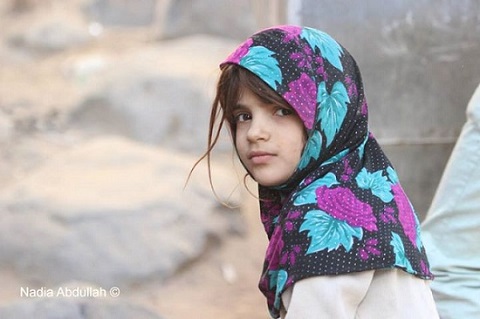
A Child Displaced by the Yemeni Conflict (Photographer: Nadia Abdullah)
by Hesham Alziady, Correspondent (Sana'a), May 14, 2015
The suffering of the displaced people is increasing day after day due to the conflict intensifying between Houthi militia and ex-president Saleh on one side, and the armed forces and groups supporting the elected president, who is residing in the Saudi capital, Riyadh, on the other side.
In the conflict map of this country, which has intensified with the Houthis`s coup against the elected president last February, violence has spread in several Yemeni cities and villages.
The capital city Sana`a is getting daily intensive air strikes by Saudi-led coalition forces against the coup, While in the other cities in south, middle, and east of the country, the people are fighting expansion of Houthi militia and Al-Qaeda forces into their towns amid numerous deaths and injuries.
Civilians top the list of victims who perish on the streets or in their homes by artillery from military vehicles belonging to the coup, or errant strikes that occur by fighter planes of the coalition forces.
A lot of cities have no shelters for sheltering civilians from coalition bombing on their towns, or the incursions of Houthis and the forces of former President using heavy weaponry hitting populated districts. The cities of Taiz, Ibb, Aden, Dalea, the number of civilians who are dying every day is increasing from indiscriminate bombardment by coup forces.
According to official statistics that say hundreds of civilians have perished, including 115 children, in one month, while UN data says that the conflict has displaced 150000 people.

Multi-family Residential Building Damaged from the Conflict
Displaced people inside the cities
A lot of people displaced from their homes in the capital and other cities that are exposed to violence, have fled to villages and safe areas, and others who can`t get out to their villages, they preferred to move from areas of the city to other areas less dangerous.
In Attan zone, which is located beneath Mount Attan, has gotten a several air attacks on arms stores that were hidden by the army in the mountains that surround the capital Sana`a.
We went to there and found empty homes, and most of the people who own these homes have left before the last explosion on their zone on the twentieth of April, which affected half of Sana`a. Around us were some dogs looking carelessly to us, looking for food in garbage places, and no people in sight.
After we have arrived, we meet Ahmed Shuga`a Aldien. Ahmed, whom graduated from a law college, had returned to his home to gather the remaining belongings. He showed us the extent of the damage to his home, and told us his story about the displacement of his family.
Ahmed says, while walking among the wreckage of the house: "Look at the impact of the destruction in the house, we were living me and my family here, we are eight persons. We were displaced from our home on the twenty-seventh of March, after several air strikes on brigades missiles, in the mountain behind us. We found a most safe place in center of the capital which is my brother`s home".
The remnant of debris on the house date back to the twentieth of April after the air strike on brigades of rockets that killed more than 30 people from the civilian who lives in many places in Sana`a.
Ahmed says that most of his neighbors have left from this zone because of air strikes on weapons stores and bombardment of civilian homes. Stories of those who have been displaced from this zone are similar with Ahmed`s story. The tragic situation is becoming increasingly common from one family to the other.
Ahmed is much afraid for his parents. He says he loves them too, and in this situation he is concerned they may perish.

Ahmed removing his family's remaining belongings
During our conversation with Ahmed, his friends 24 year-old Abdulmalik Albeshari, and 22 year-old Mosa Shamiri came to help him to carry the remaining belongings. When they overheard our conversation they began to tell their own stories, and they insisted to take us to their zone which is adjacent to this zone.
Abdulmalik`s brother has died, as well as a number of people who live in that zone, from chemical gas that leaked from the army`s weapons stores after a direct air attack by the coalition forces.
His family is still suffering from shock after the death of their son, Akram, who lived the last moments holding hands with his brother. Abdulmalik was telling his soreness as he spoke into our recording device about how he tried to help his brother to breathe in that day, where he was with him in the same zone, after their families left and relocated to the house of one of their kin in another part of Sana`a.
Abdulmalik was telling his story after he closed his eyes "I remember: it was 10 PM , the gas was leaking from the weapons stores. People began to flee hysterically gasping for air, as oxygen decreased in their lungs. I immediately went to look for my brother, who was five buildings away from here. The people abandoned their homes, there were no ambulances and no medical relief, just self-initiatives from the people who can help the old men, women, and children, the situation was tragic".
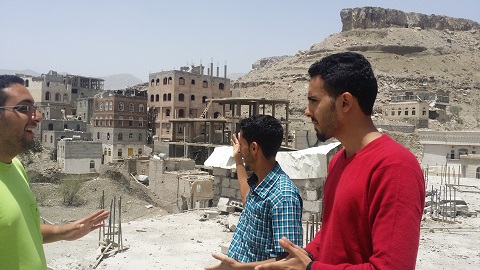
Ahmed and Abdulmalik discussing with Correspondent
It does not seem that Abdulmalik desires to leave the house, despite the dangers of the place, he says: "We have done everything to build this house. We do not have any place to go to. It is difficult now to find another place in short time, especially with the lack of fuel and no money"
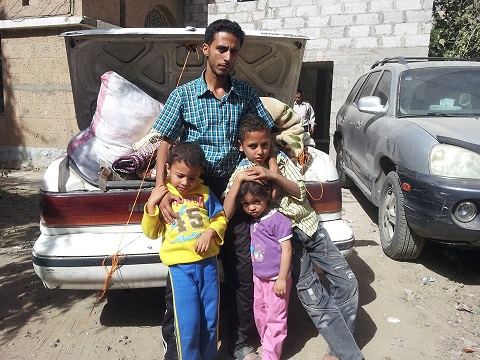
Abdulmalik with his children
During our conversation with Abdulmalik . we heard some anti-aircraft fire targeting a reconnaissance plane and he said "We must hurry up, the place is not safe".
His family lives now in an area not far from here, and every 10 minutes his mother calls out to him to make sure that he`s safe. His mother is in a bad psychological case after her son Akram got killed. She`s afraid to lose Abdulmalik, and for now his family is staying in a relative's home, and they are waiting for the battles to end to come back to their home.
Not far from the house of Abdul Malik, Mosa took us to show us the damage that happened to their house, which was toppled by boulders cascading down from the mountain after the big bomb, as they say. By good luck, Mosa`s family were not present that day, just a guard who was protecting some empty homes. There were initiatives made by the families who live in this zone, that decided to leave some younger adults to protect their homes, and the families relocated to safe places. There`s no government to take care to the security side for the population, just social customs as they said, which it protects them from the other consequences of the conflict, such as theft, and rape.
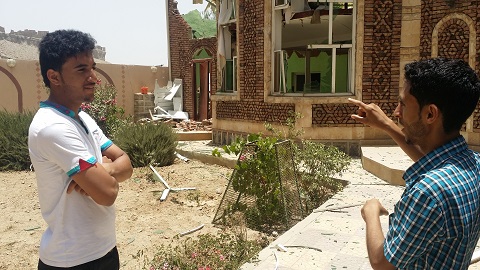
Exterior Damage to Mosa's home
The population are victims of air strikes by the Saudi-led coalition forces in support of the elected president on the cities under the control by the coup, and in the south, middle, and east cities where the displacement movement has abound because of the atrocities carried out by the coup against the population of those supporting the elected president and the cities which are not in control by the coup.
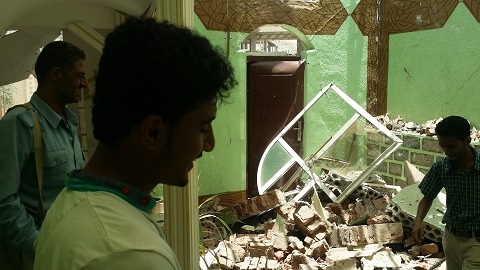
Interior Damage to Mosa's home
The displacement people outside Yemen
A few days ago, it was quoted that ships with thousands of Yemeni refugees arrived in Djibouti on the other side of the Red Sea after being displaced from their cities in which they live, which is the only country so far that have received Yemeni refugees in its territory. Somalia announced that it can`t accommodate the number of Yemeni refugees because of the lack of equipment that Somalia has. But even without the assistance, those refugees in Somalia prefer staying instead of dying in Yemen.
Humanitarian organizations and their role in providing aid
In the current situation, there is an the absence of an effective role of international humanitarian organizations in providing for the displaced people services and aid. This is for several reasons as one activist relief in one of the local organizations says: the air strikes to Sana`a airport and other airports that happens daily by coalition forces and that is difficult for humanitarian aid to arrive by air. Some of the aid has been seized by coup forces for their fighters. Several times news has come that some aid has arrived by the Red Cross organization, which the doctors and activists say it is not enough for such a large numbers of displaced and affected.
There are no government or internal refugee camps for displaced people from the conflict zones to receive and work with the aid organizations to provide aid to them, just the displaced people going to their relative`s and others homes.
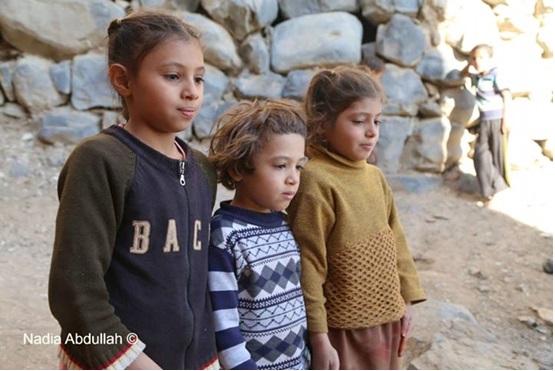
Displaced Children from the Conflict (Photographer: Nadia Abdullah)
The hope of displaced people to return
In the meantime, where the displaced people are living in a dramatic situation in renewed fighting between the warring sides, an optimistic view will not appear for a long time in the displaced whom I have interviewed about the situation. But the people of this country will come back to reconciliate again, and return to rebuilding their homeland again.
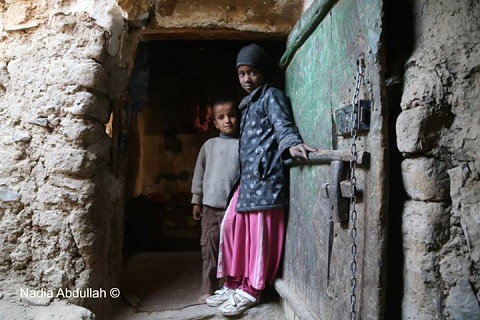
Children Waiting (Photographer: Nadia Abdullah)
Copyright(c) 2015-16, Sincere.Global